
about
faculty members
students
dates
publications
application
news
innsbruck
contact
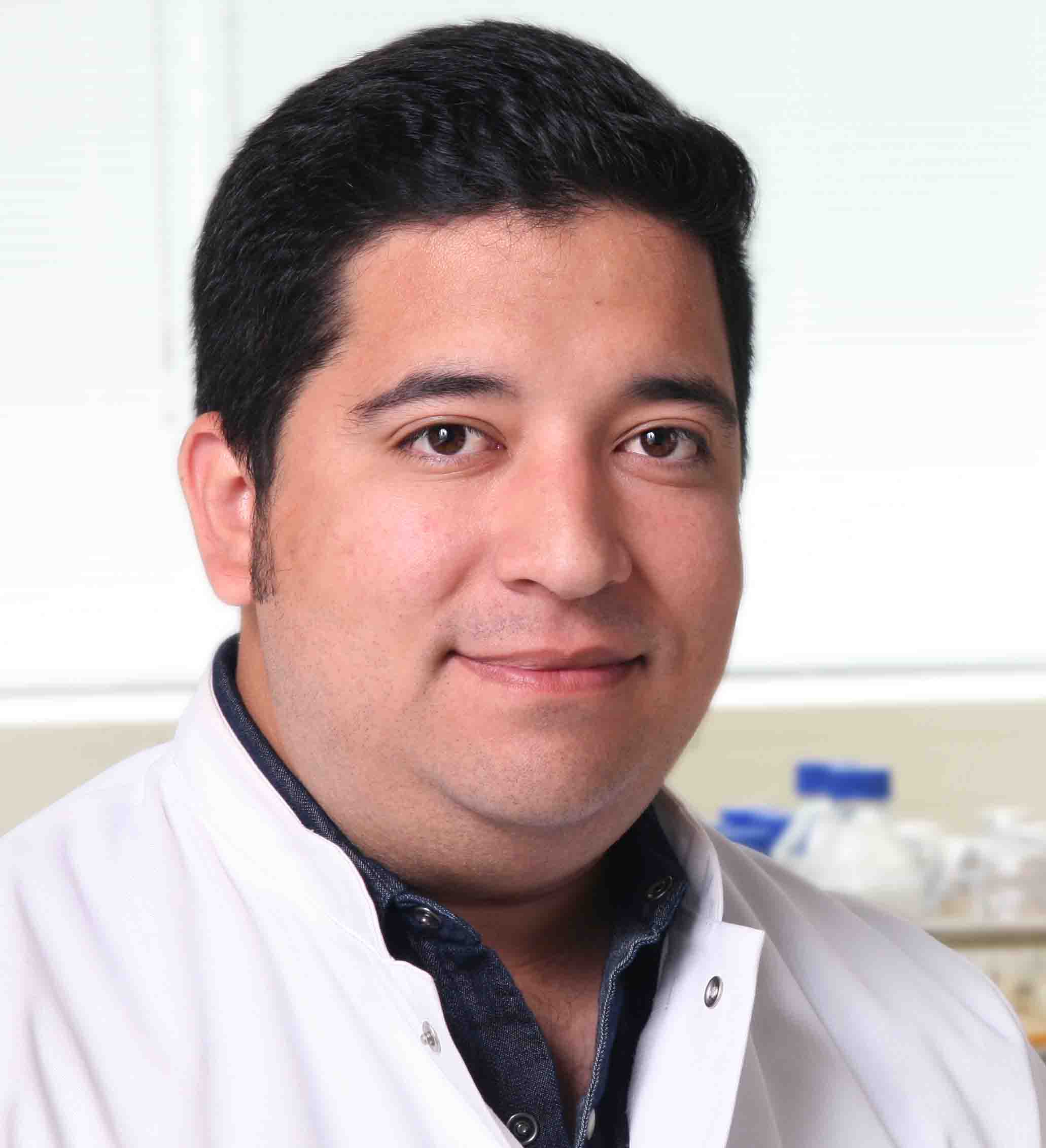
November was Enrique’s month to shine and finally finish his PhD studies by defending his thesis. In the past years, he was developing novel 5-flucotosine-based antifungal therapeutics under the supervision of Prof. Fabio Gsaller at the Department of Molecular Biology, Medical University of Innsbruck. Congratulations Enrique! Good luck with your future work life in the pharmaceutical industry.
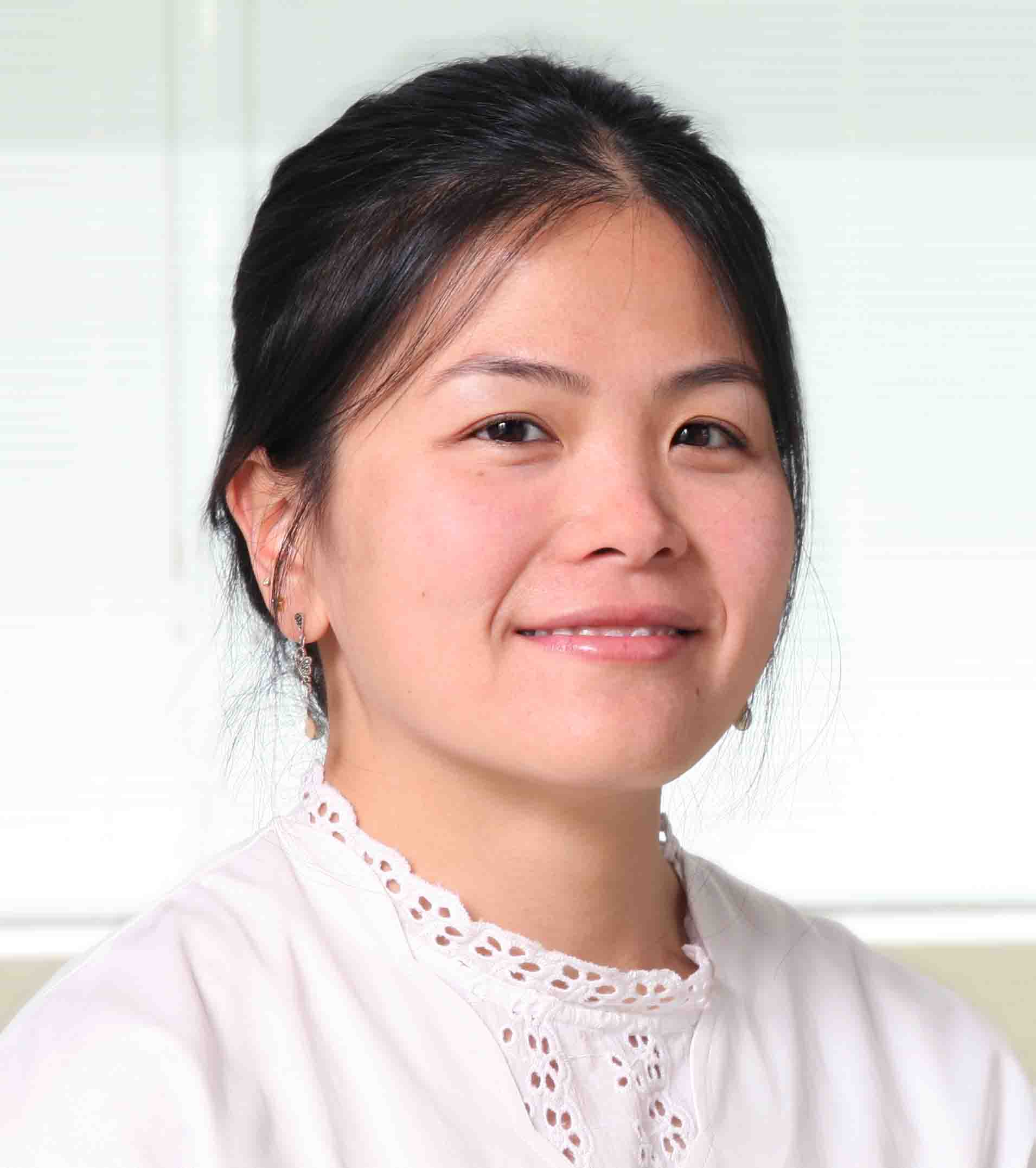
In October 2023, it was Annie’s turn to defend her PhD thesis. Under the supervision of Prof. Hubertus Haas, her work at the Department of Molecular Biology, Medical University of Innsbruck was focused on analyzing molecular mechanisms for the adaptation of Aspergillus fumigatus to iron starvation. We welcome Annie to the club of Alumni and wish her all the best for her future.
https://www.i-med.ac.at/molbio/CVs/copy_of_copy_of_CV-annie_yap.html
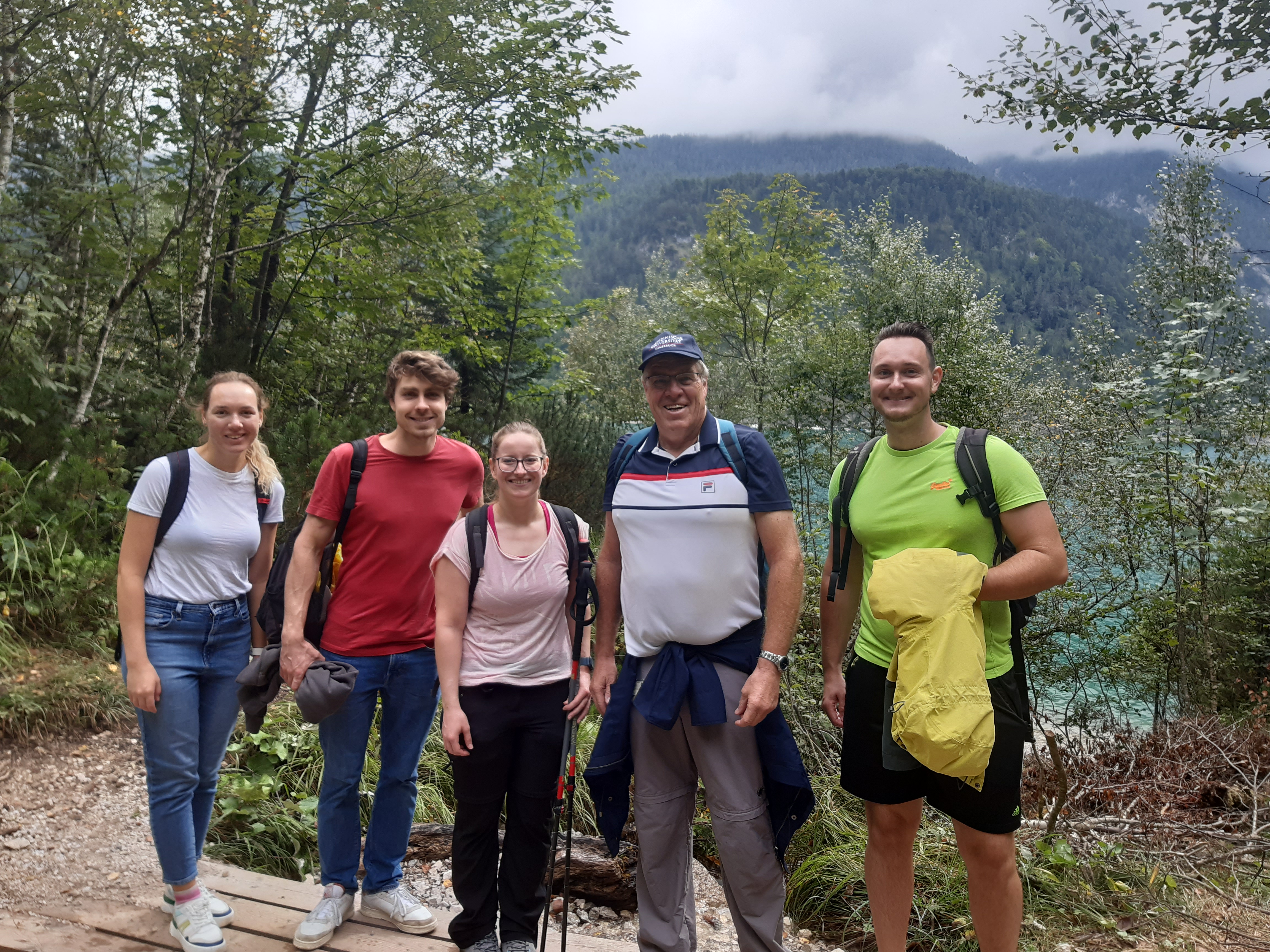
This year's summer retreat indeed lived up to its name. It was cozy, warm, and exceptionally beautiful—a description that perfectly captures the feelings we experienced while conquering the mountain trails. The day before our departure, it had been raining incessantly. However, as luck would have it, good people tend to have good fortune, and the weather transformed from dreary to irresistibly sunny.
Though we were only a group of five, we initially thought that postponing the retreat to September, when all the PhD students had returned from their vacations, was the right decision. But no. Despite our small number, there was no shortage of lively conversations and a fantastic atmosphere. Our journey commenced with a boat tour from Pertisau, finishing at Scholastika station. During our hike, we enjoyed breathtaking views of Achensee, with its deep blue and turquoise waters. The Mariensteig trail provided a viewpoint higher than the lake, offering an especially captivating view. To the left, the rugged and gray Karwendel mountains contrasted with the vibrant colors of Achensee.
After walking approximately 5 km and immersing ourselves in the Tyrolean landscapes and panoramas, we indulged in a well-deserved meal at a local restaurant in Gaisalm. There, we savored soup with Knödel and each relished fresh trout, undoubtedly fished from the nearby lake.
Without a doubt, we couldn't resist the allure of the lake. Statistics suggest that 6 out of 10 of us dipped our toes in its refreshing waters. It was an undeniable success, and following our swim, we embarked on a further run to warm up. Upon reaching the parking area, we decided to take a break at a café by the embankment to reflect on our tour and discuss upcoming scientific plans, all while savoring delicious ice cream.
Seven hours later, we returned to Innsbruck, brimming with great emotions and invigorated by the abundant oxygen. Such a delightful and vibrant trip would not have been possible without the meticulous organization of Frederik Radvan and Prof. Würzner.
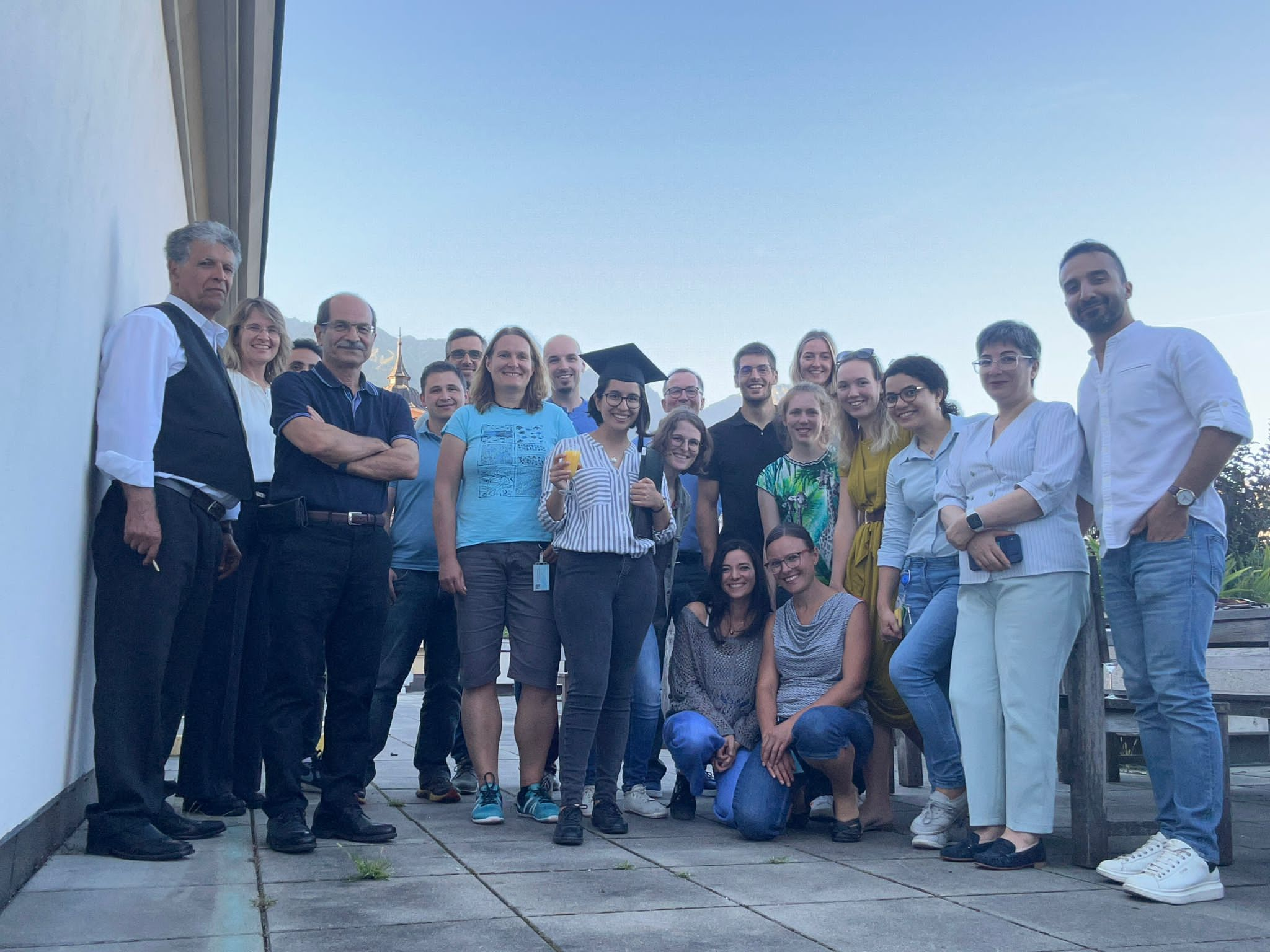
We are thrilled to announce that Azin has successfully defended her PhD on the 5th of September. This long-awaited moment marked the culmination of her studies, and it was truly a cause for celebration. Surrounded by friends, family, and esteemed colleagues, Azin's achievement was met with great joy and pride. Azin was supervised by Prof. Florian Kronenberg, Institute of Genetic Epidemiology. Over the last years, her research has been centered on PCSK9, leading to significant findings that have enhanced our understanding of its regulation and impact on disease. We congratulate Azin on her impressive success and wish her all the best for her future.
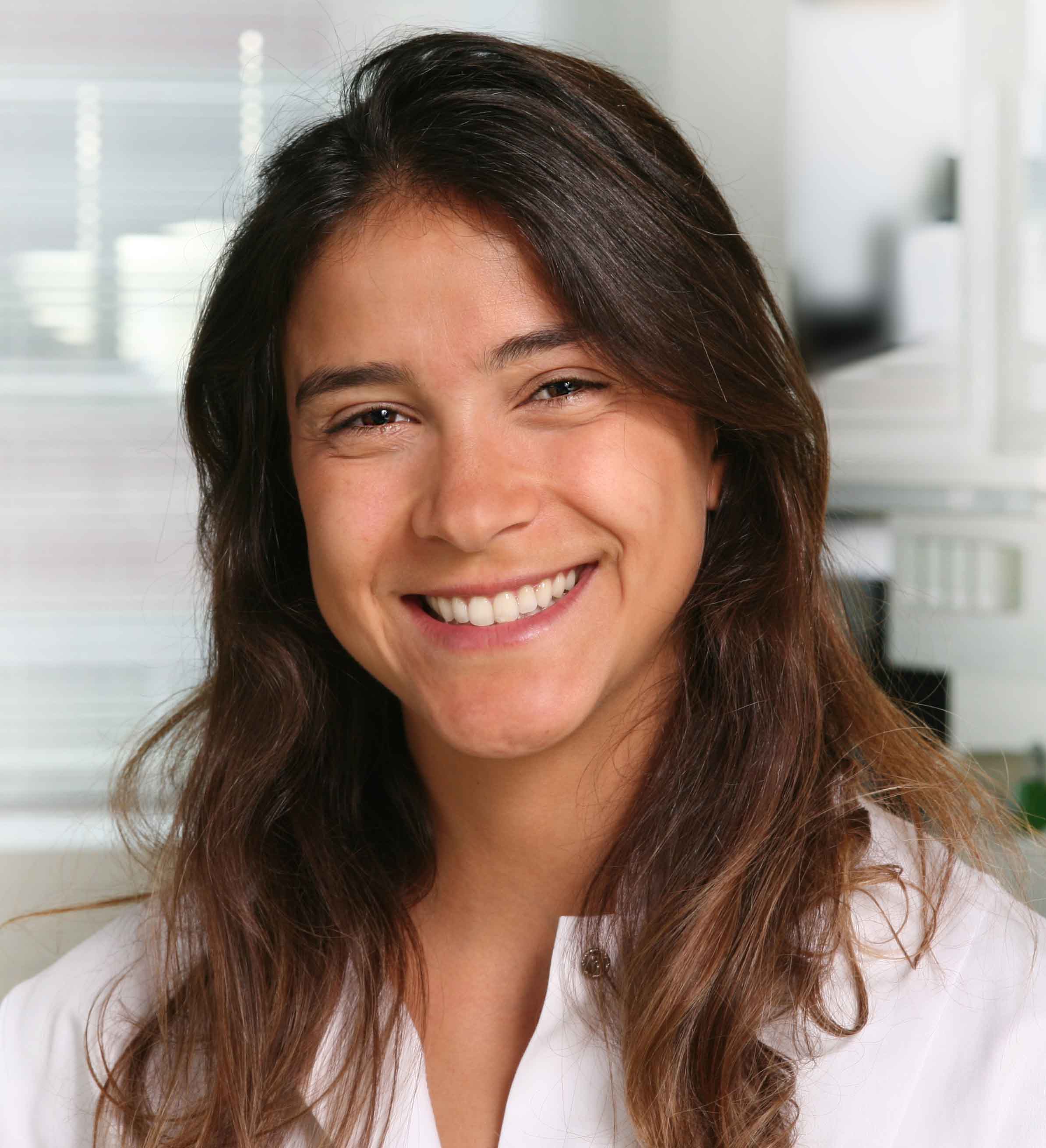
In the past years, Lara performed comparative analysis of pharmacokinetics and therapeutic efficacy of new oral and intravenous iron preparations in anemia of chronic disease (ACD) with and without combined true iron deficiency. Some days ago, Lara could successfully defend her PhD thesis to join the growing group of HOROS Alumni. We are very happy for you and wish you good luck for your future path.
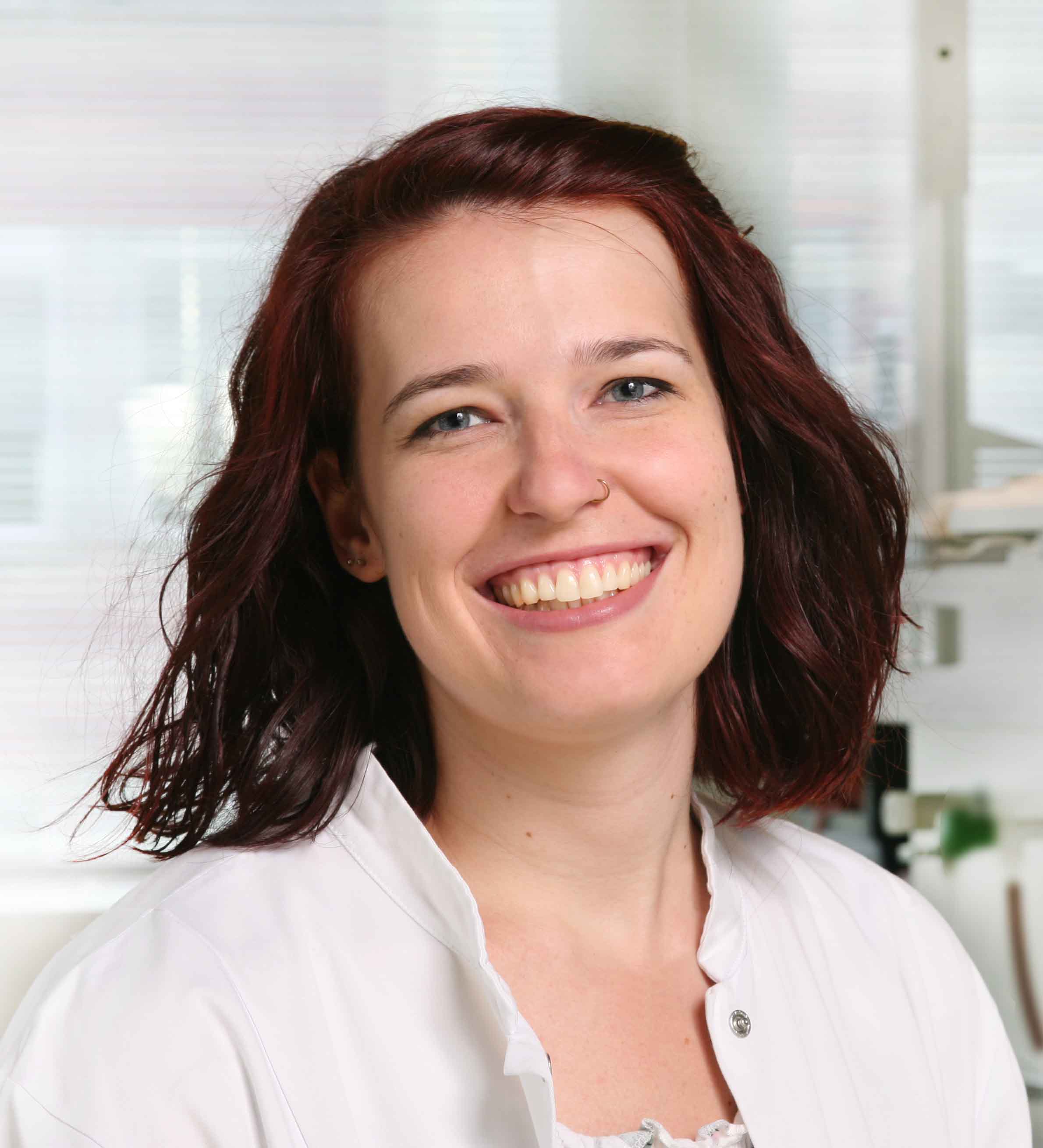
In the middle of August 2023, the day of Natascha's defense finally arrived. Natascha's reserach focused on infection with the intracelluclar bacteria Salmonella to uncover molecular mechanisms leading to an inhibition of certain genes which favours infection. Congratulations and all the best for your future!
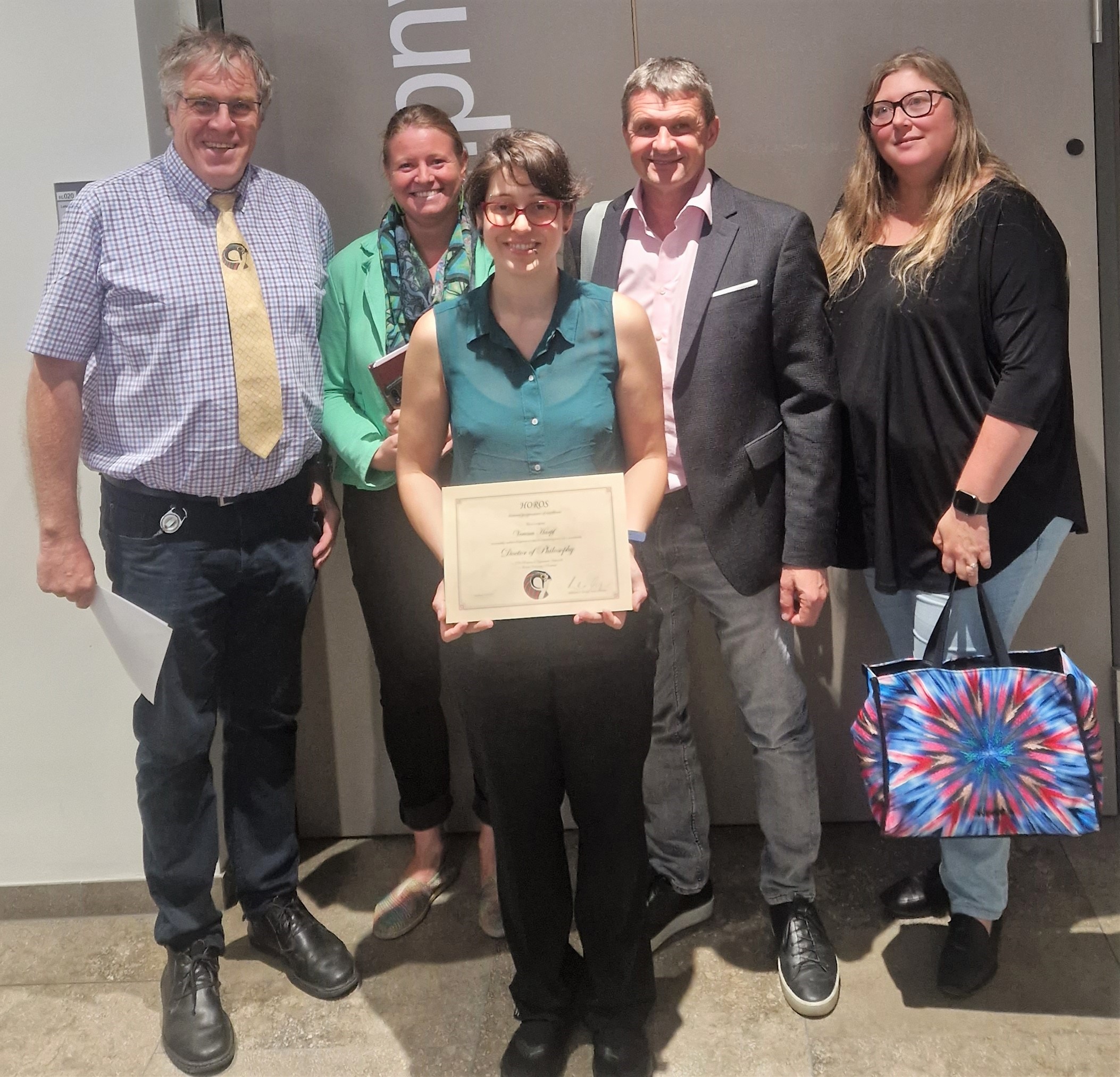
In the middel of summer, Verena had her defense and subsequent celebration to her newly acquired PhD title. How what an amazing journey you spent the past four years and congratulations to this excellent defense within the field of medical mycology. Thanks to connections made via HOROS and CORVOS, Verena got the chance to pursue a postdoc fellowship in Copenhagen - all the best for that.
September 21st, 2023 - the day of Mario's defense. After doing reserach about the molecular characterization of siderophore uptake in Aspergillus fumigatus for the past couple of years, this summer it was time for Mario to shine and proudly present his thesis to the public. Well done and all the best for your future.
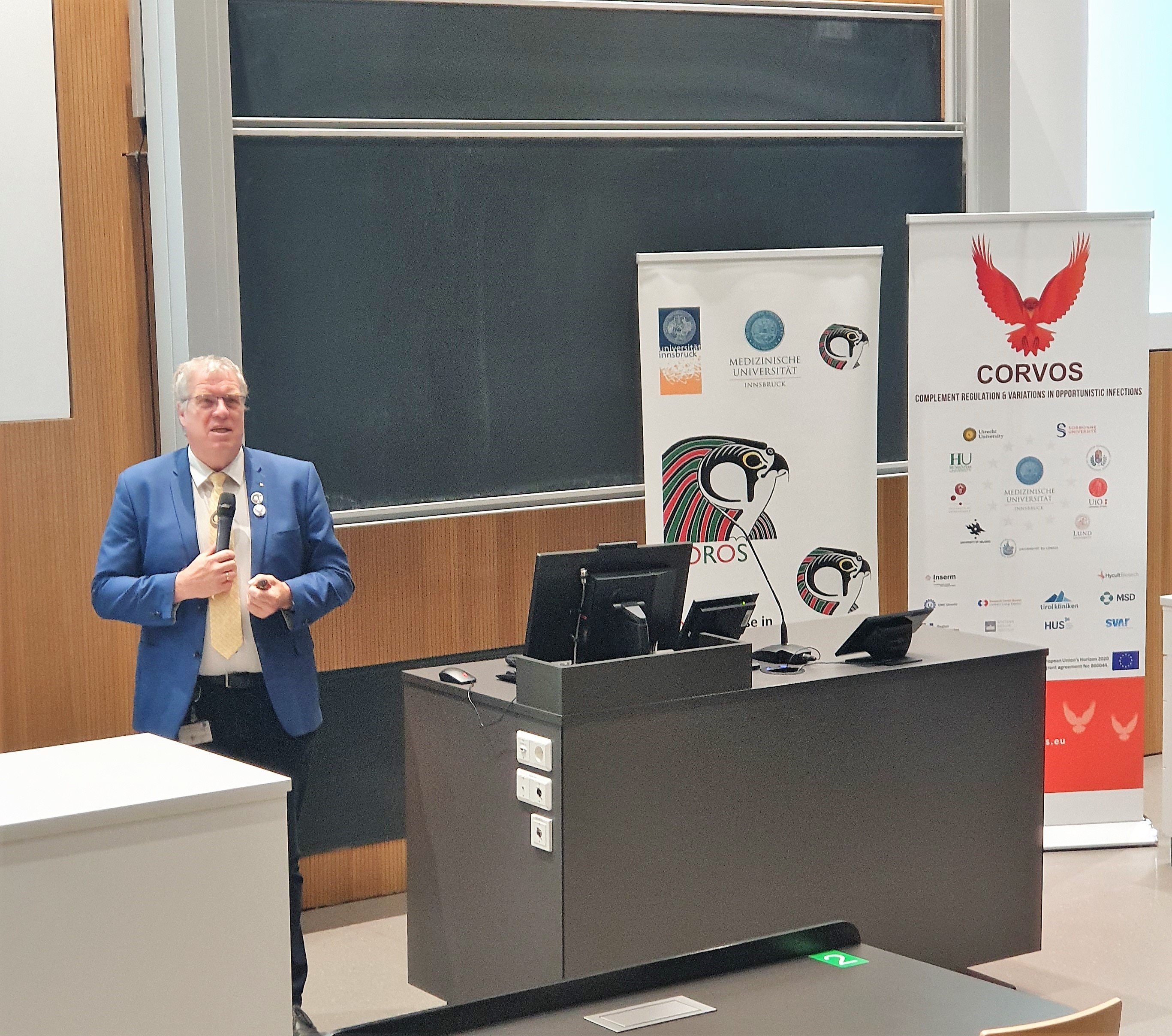
The doctoral programme HOROS (host response in opportunistic infections, www.horos.at), coordinated by the Medical University of Innsbruck, which was approved by the Austrian Science Fund FWF in 2013, later successfully re-evaluated for another four years, and finally granted a transitional phase of 18 months, will now officially end on 31.08.2023. To mark this occasion, the HOROS Faculty invited to a ceremony on 30.06.23 at the AudiMax. Thanks to additional financial support from the MUI, HOROS, whose logo is the falcon, will be able to "fly" for another year until 31.08.24.
HOROS investigates the host-specific factors in infections with pathogens that usually do not kill immunocompetent patients but often cause life-threatening complications in immunocompromised individuals. In the multidisciplinary excellence doctoral programme HOROS, the genetic basis and molecular causes of these so-called opportunistic infections have been increasingly studied for 9½ years. Seven lecturers from the Medical University and Birgit Weinberger, who followed the retiered Beatrix-Grubeck-Loebenstein, from the Leopold-Franzens University, formed the dedicated teaching staff of natural scientists and medical doctors.
At the ceremony, which was musically accompanied by the Anna Schnegg Duo, HOROS speaker Reinhard Würzner from the Institute of Hygiene and Medical Microbiology welcomed all those present and presented small gifts to three of the four previous or present administrators, Benjamin Hetzer, Marco Grasse and Silke Huber, as well as to the pioneer of doctoral programmes in Innsbruck, Bernhard Flucher, whose signature is also visible in the HOROS programme. He and Francesco Ferraguti gave short presentations on the first two FWF-funded doctoral programmes integrated at the MUI, MCBO and SPIN. Flucher also shed light on the beginnings of the doctoral programme culture at the start of the millennium and what it was like before. HOROS benefited from both programmes, but especially from MCBO. Following these two presentations, Würzner presented the special features of HOROS in his short talk, such as
HOROS as a model for CORVOS: Würzner detailed how HOROS became more and more international and how the experiences of HOROS were helpful in applying for CORVOS. CORVOS, with the raven as its logo, is now conducting international research in host response focused on the complement system in opportunistic infections. This programme, approved in 2019, supports 15 PhD students across Europe in an EU-funded Marie Skłodowska Curie Horizon 2020 Innovative Training Network at 10 European universities. Two of the MUI students spent half a year each in Budapest or Lübeck, while three students from Budapest and Lübeck, but also Oslo, spent half a year in Innsbruck - all of them are to receive a "Double PhD" degree from two universities each after successful completion of their studies.
Bridging HOROS to the clinic and the Leopold-Franzens University: A trademark of HOROS is to build a translational bridge between basic research and clinical application. Günter Weiss, Director of the Innsbruck University Clinic for Internal Medicine II (focus on infectiology, immunology, pneumology and rheumatology) and Cornelia Lass-Flörl, Director of the Institute for Hygiene and Medical Microbiology, stand for this. Hubertus Haas and Florentine Marx-Ladurner from the Institute of Molecular Biology are on the team for basic mycological research. Florian Kronenberg represents genetics, another MUI focus. Beatrix Grubeck-Loebenstein from the Research Institute for Biomedical Ageing Research at the University of Innsbruck, who has been the deputy spokesperson for many years, and now Birgit Weinberger, have bridged the gap to the LFU.
Benchmarks for HOROS: HOROS was ultimately supported with over 5 million euros, with 60 students being financed with congress trips, stays abroad at renowned institutes - often for several months. Furthermore, some received transitional funding after completing their studies, 14 students were financed for the entire 4 years with salary and research consumables. In total, even more than 100 students at the Innsbruck campus have benefited from this PhD programme and especially from the practical training. "The feedback from our PhD students has mostly been enthusiastic," explains HOROS speaker Würzner, "so we are pleased to be able to look back on almost 10 years of successful PhD training.
Students' view and look into the future: The last presentation was given by the students, represented by Hussam Abd El Halim and Cristina Schöpf, who reported on the various retreats, excursions and company visits in a beautifully illustrated talk. Würzner also presented them with a small gift. At the end of the festive programme, as in between, harmonious pieces by the musical duo, most of which were also about birds, rounded off the festive programme. There was an opportunity for personal exchange and a look into the future - during which the importance of the HOROS badges for the 'corporate identity' of the emerging alumni network was emphasised - at the subsequent standing reception in front of the AudiMax with buffet, where many celebrants enjoyed themselves for a long time.
Tasks of a Doctoral College: Doctoral colleges (DKs) are intended to form training centers for highly qualified young academics from the national and international scientific community. They should support the development of scientific priorities at Austrian research institutions and promote the continuity and impact of such priorities. A doctoral college can only be anchored at research institutions with the right to award doctorates. Further information: https://www.fwf.ac.at/de/forschungsfoerderung/fwf-programme/dks/
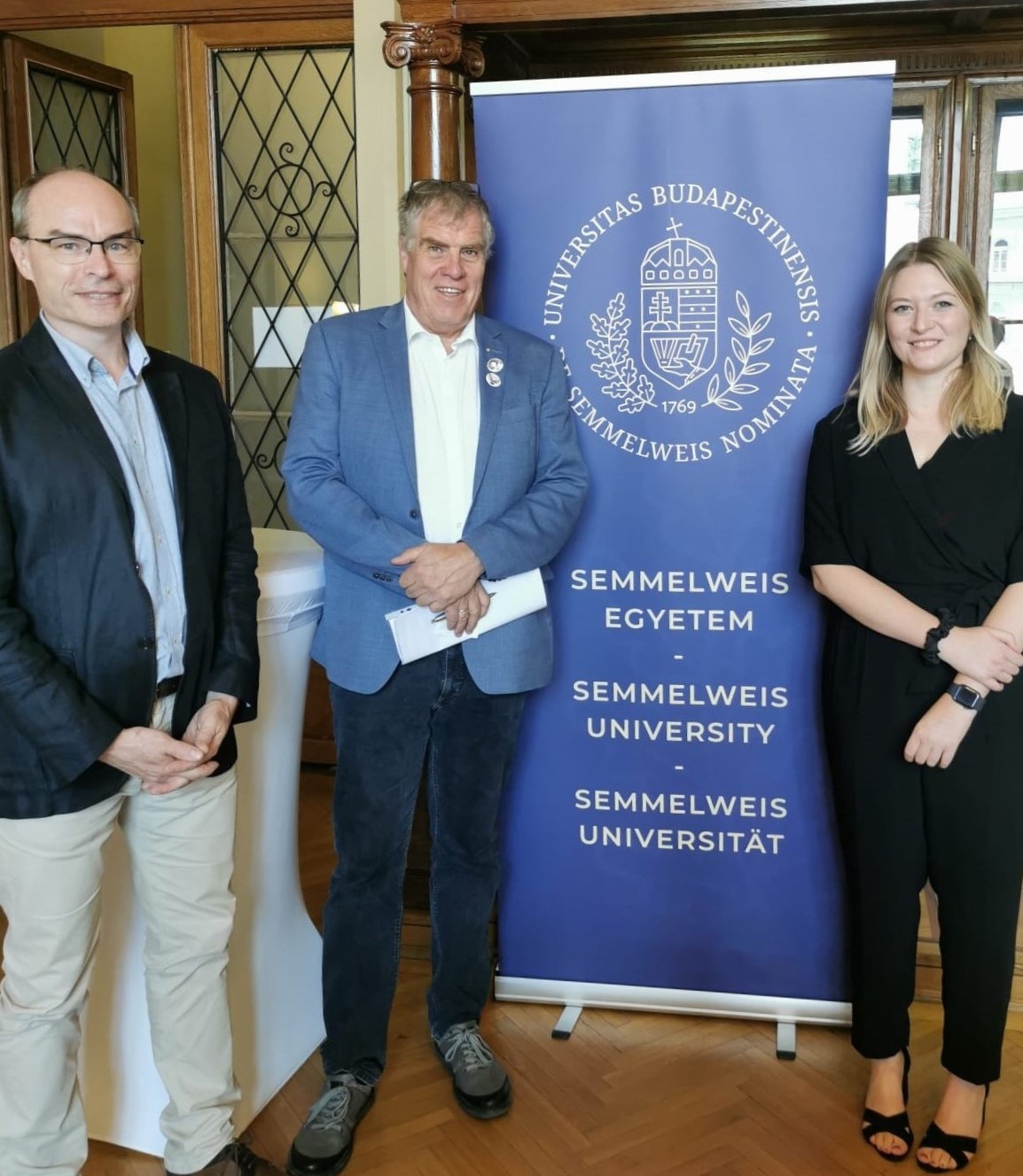
On June 19th, 2023 Lisa was the first of our excellent CORVOS students to defend her thesis. In the past three years, she developed immunoassays for the measurement of C1s/C1-INH complex and MASP-1/C1-INH complex in human serum and plasma. Finally, these assays were characterized and validated in cohorts of COVID-19 and sepsis patients. Both complexes were proven to be specific biomarkers for early classical and early lectin pathway activation. Lisa was supervised by Prof. Zoltán Prohászka, MD, PhD from the Doctoral School of Theoretical and Translational Medicine Semmelweis University, Budapest, Hungary and Prof. Reinhard Würzner, MD, PhD from the Institute of Hygiene and Medical Microbiology, Medical University of Innsbruck, Innsbruck, Austria. In addition to her main studies in Budapest, Lisa spend 6 months at the Medical University of Innsbruck (Austria), did 1 month clinical training at the University Hospital in Helsinki (Finland), did 1 month of industrial entrepreneurship and 6 months industrial secondment at Hycult Biotech (The Netherlands). Congratulations, welcome to the Alumni club and all the best for your future.
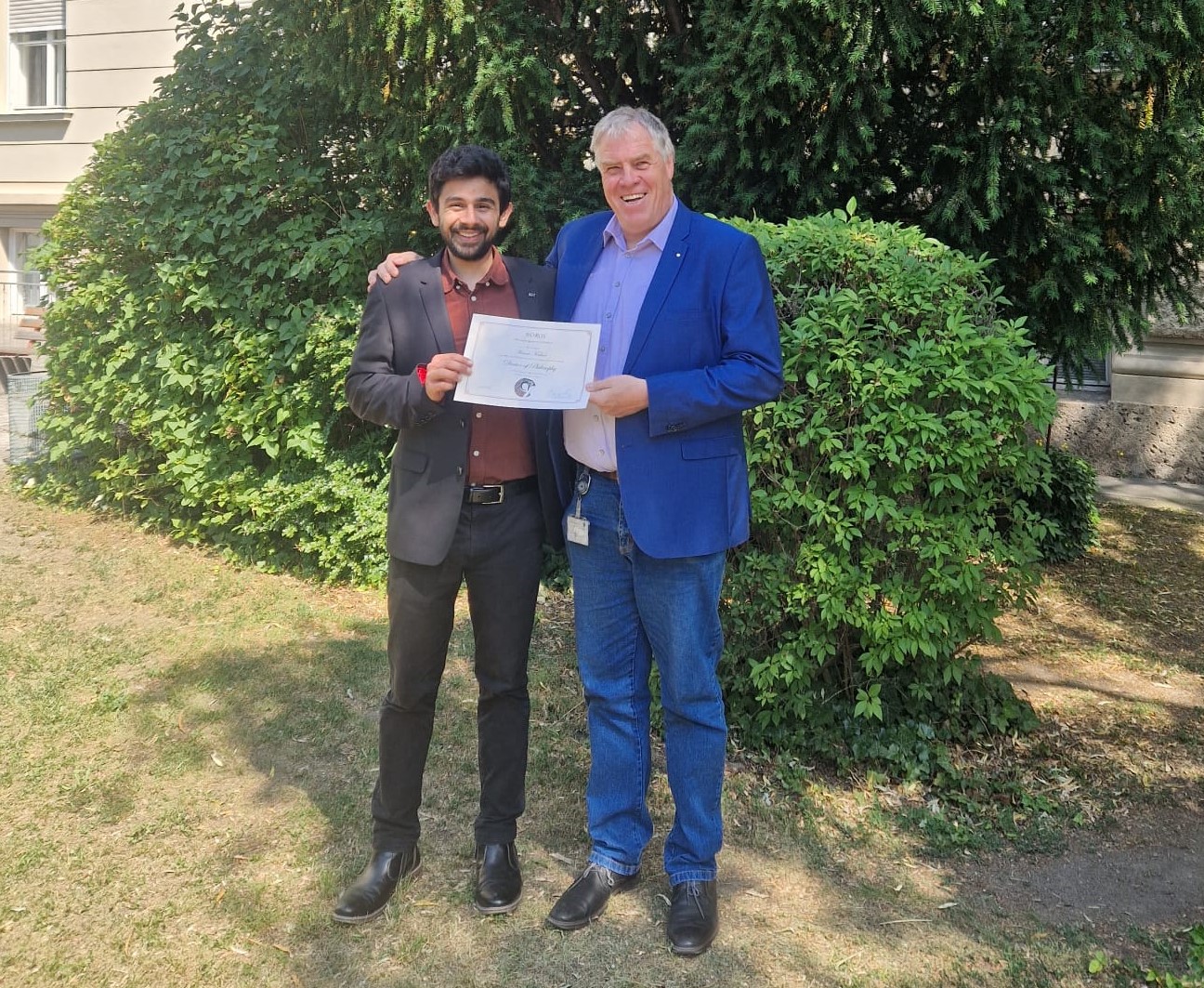
June 14th, 2023 was Anant’s big day!!! He finally defended his PhD thesis. after many years of hard work in the lab where he tested fungal-derived antimicrobial proteins and small antimicrobial peptides as potential treatment for fungal infections. Anant was supervised by Prof. Dr. Marx-Ladurner, Institute of Molecular Biology, Medical University of Innsbruck. Congratulations!!! We wish you all the best in your future industrial career in Munich and hope you come back for a visit.
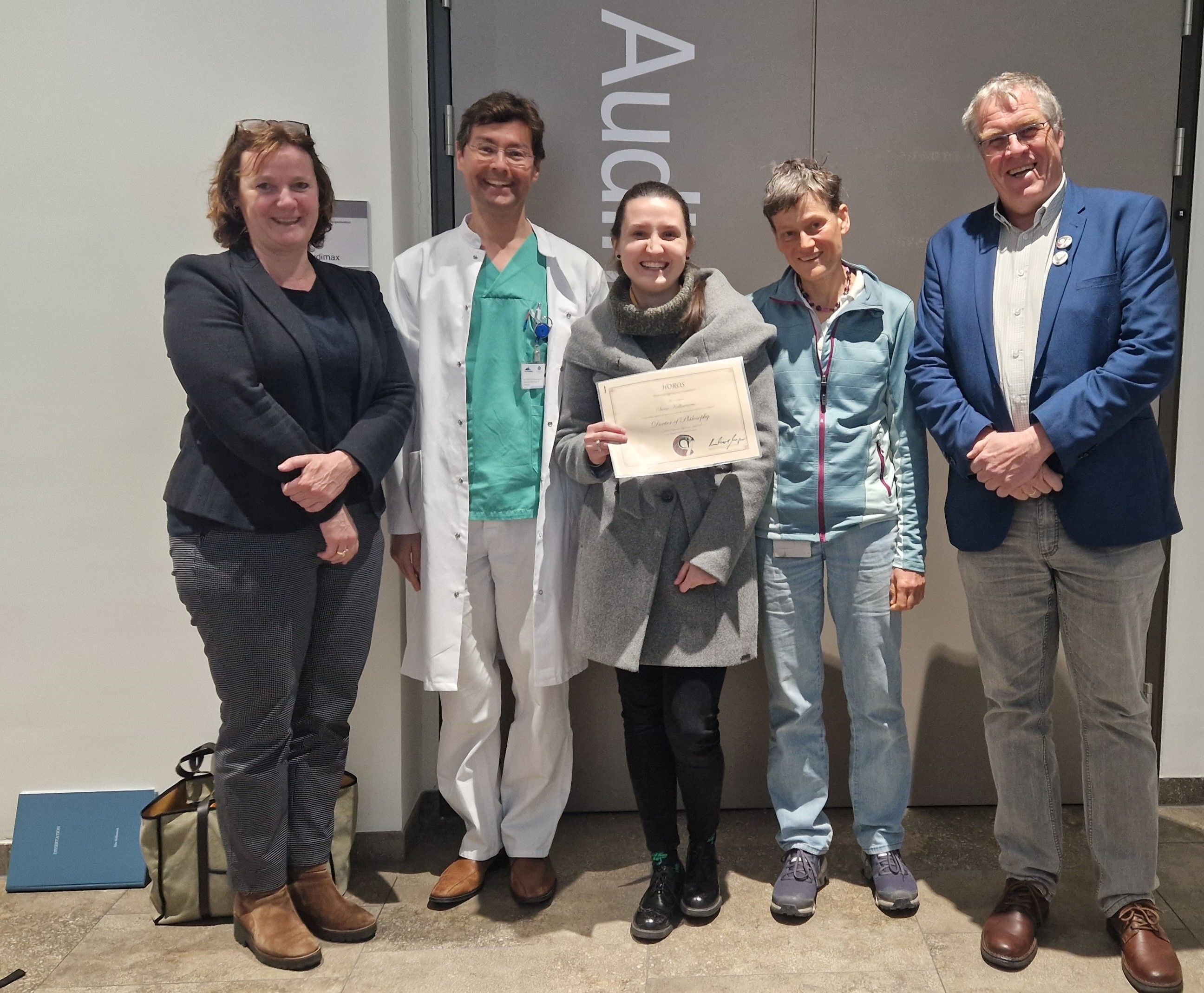
In March 2019 HOROS Student Sára started as a PhD candidate at the Institute of Hygiene and Medical Microbiology. Her studies were focused on the structure of Shiga toxin 2a, the main virulence factor in EHEC infections potentially causing severe disease, and their interaction with human host factors. On the 20th of April 2023, the long-awaited moment of the end of her PhD studies in the form of her defense happened. With an excellent talk and a great discussion, she successfully finished her PhD studies. We wish all the best for your exciting future in Vienna.
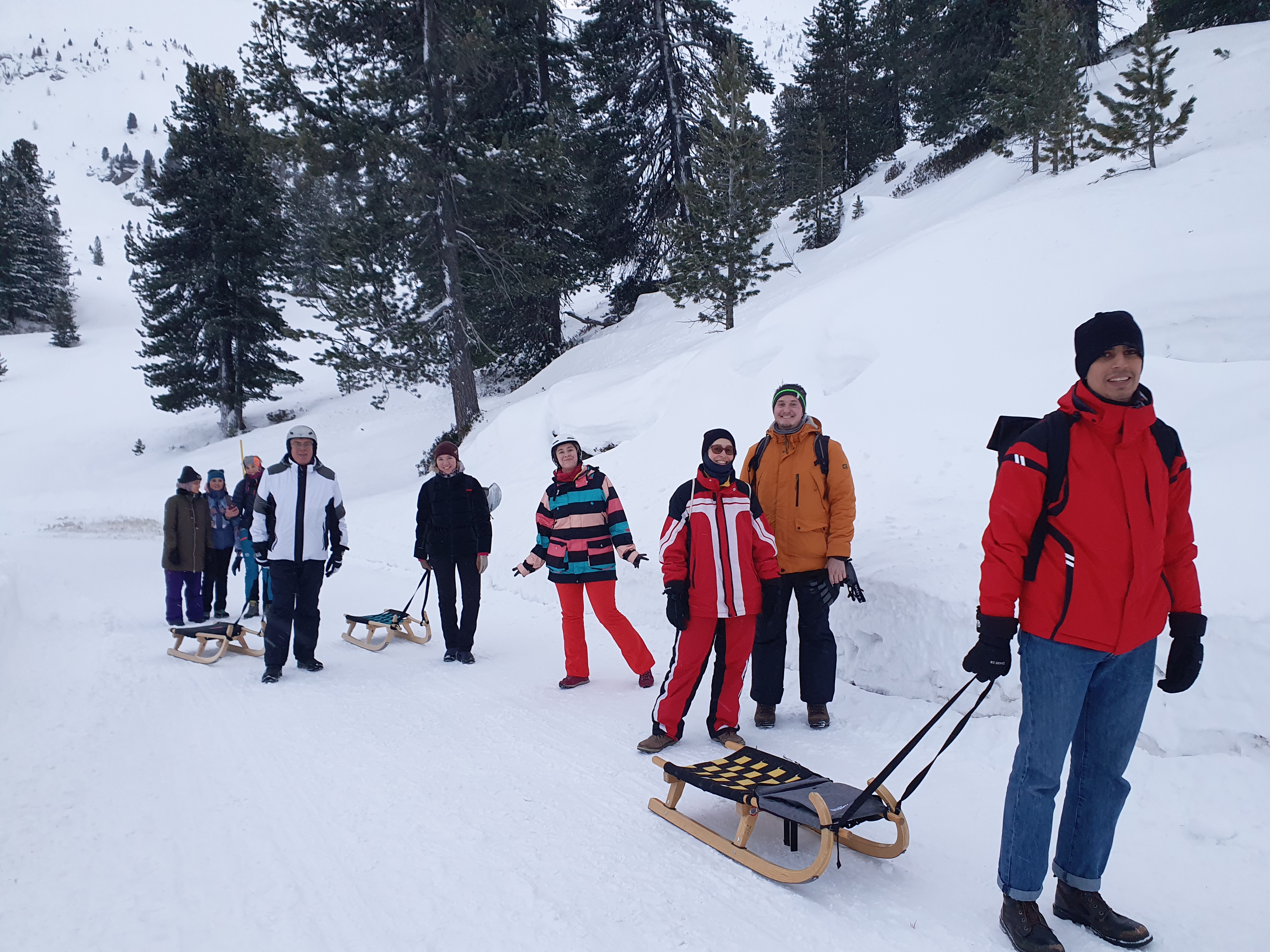
We started our retreat with a scenic car ride to the charming Kühtai and then walked for 45 minutes to reach the Graf-Ferdinand-Haus. The walk was enchanting with the snow-clad surroundings creating an idyllic winter-wonderland experience. After Prof. Würzner conducted an enlightening lecture on tick-borne encephalitis, we had a cozy dinner and engaged in some friendly conversation. We were already looking forward to the sledging adventure that awaited us. As expected, the exhilarating sledging downhill was an absolute blast!
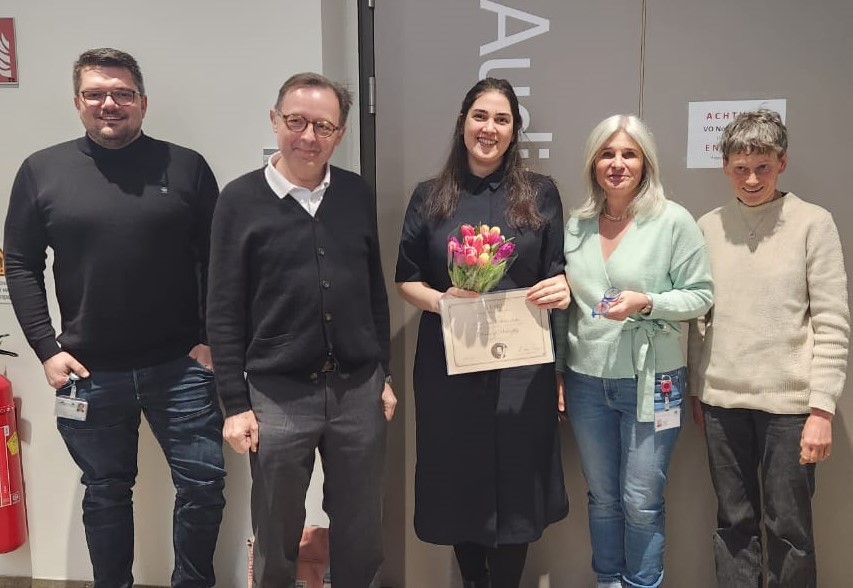
After 4 years, on 25th of January 2023, Roya successfully defended her PhD thesis. Supervised by Prof. Dr. Cornelia Lass-Flörl, she investigated Aspergillus terreus using a model to study in vitro and in vivo persistence, tolerance, and resistance to drugs at the Institute of Hygiene and Medical Microbiology, Medical University of Innsbruck. Thanks to HOROS, Roya was able to spend 6 months at collaboration partners at the Westerdijk Fungal Biodiversity Institute, Utrecht, Netherlands, were she focused on the description of species within the Aspergillus section Terrei. However, congratulation Roya, we are happy that you did this great job and will keep on working on this project as a postdoctoral researcher.
With great pleasure, HOROS can report from the latest Entrepreneurship visit at MED-EL in Innsbruck on Thursday 2nd of February. The company is world-leading in the design and production of hearing implants supporting people suffering from hearing loss to (re-)enjoy sound. Their hearing solutions for young and old include a wide range of products, from cochlear implants to bone conduction systems.
To learn more about hearing, hearing loss, and respective solutions, we visited the Audioversum Science Center beforehand and enjoyed a great tour throughout this interactive exhibition. Lastly, we entered the MED-EL world and got familiar with mission, history, and products of this company. To discuss our impressions and experiences we had dinner at a very nice restaurant in the heart of Innsbruck.
The next day, Mrs. Ursula Bayer, Project Manager for Education & Training at MED-EL, hosted us and gave us an interesting and interactive presentation of the company followed by a fascinating factory tour. The latter gave us insights into the technical background of designing and producing hearing implants. Lastly, we had the chance to talk to Mrs. Caroline Schenk and Anna Himmler from Human Resources who showed us interesting career options in different departments at MED-EL.
We are grateful that MED-EL hosted us and organized such a pleasant event – we’ll be back!
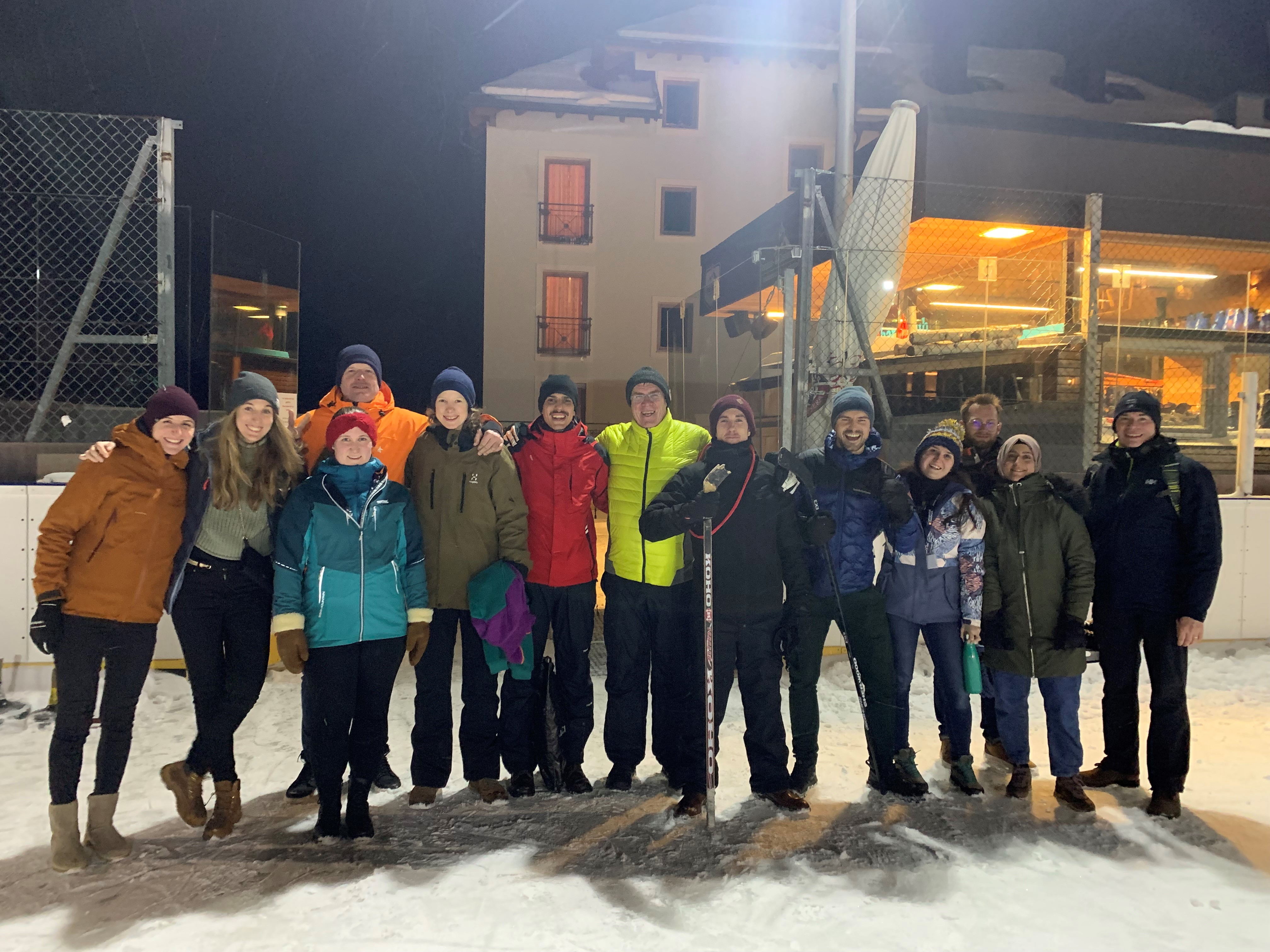
For the first time after 3 years our annual Retreat to the beautiful Obergurgl could be held from 07th to 9th of January 2023 without restrictions. Once again members of two PhD programmes of excellence, HOROS (Host response in opportunistic infections) and CORVOS (Complement regulation and variations in opportunistic infections) as well as local PhD candidates from the IIT (Infection, Immunology, and Transplantation, Innsbruck, Austria) program came together to enjoy scientific discussions and do networking to push their research projects forward. Renowned scientists from across Europe, including Jörg Köhl (Lübeck, Germany), Seppo Meri (Helsinki, Finland), Tom Eirik Mollnes (Oslo, Norway), Peter Garred (Copenhagen, Denmark), Zoltán Prohászka (Budapest, Hungary) Mohamend R. Daha (Leiden, Netherlands) representing CORVOS as well as Christian Karsten (Lübeck, Germany) and Mikkel-Ole Skjødt, both member of the HOROS advisory board, participated and inspired with their talks. Especially for our PhD candidates it was a perfect environment to prove their scientific and presentational skills in front of experts in the field of opportunistic infections and immunology in a relaxed and private atmosphere. Additionally, representatives of the CORVOS industrial partner Hycult Biotechnology (Uden, Netherlands), namely Loek Willems, Eirik Toonen, and the CEO & Owner Ronald de Niet as well as of the company Novartis (Schaftenau, Austria), Marco Grasse (former CORVOS Administrator) were present.
Besides a tight schedule, there was still time for networking and team building with PhD students and principal investigators. The majority of participants enjoyed skiing at the lovely nearby slopes or assisted one another in learning how to ski while some went hiking or sledding. Another highlight was ice-skating were we played the popular Hungarian “catch on ice” game. No matter the favorite sport, they were all ideal for interacting with other scientists.
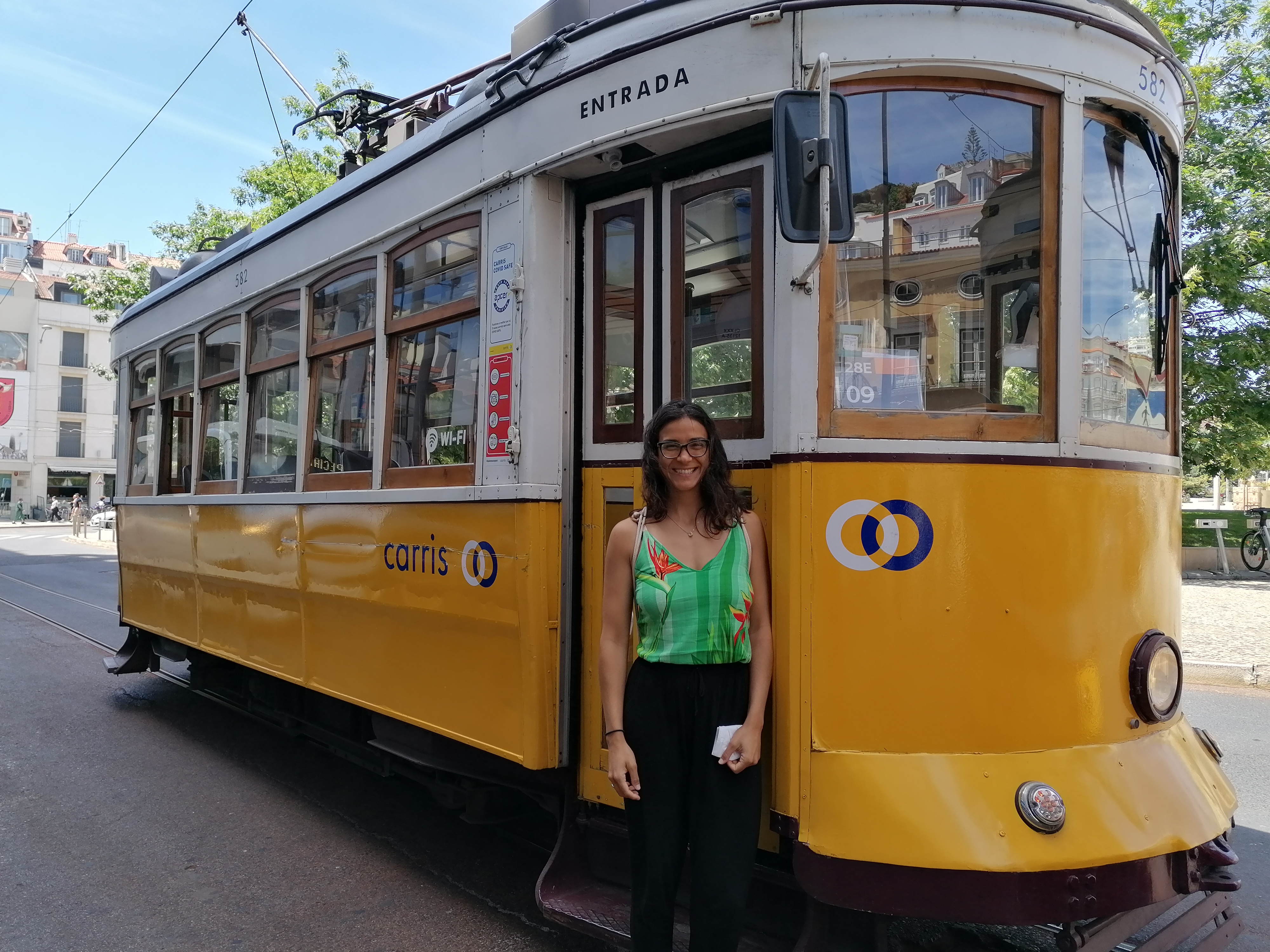
After one year of incertanty concerning a stay abroad due to the COVID-19 pandemic, I could succssefully go to Oeiras-Portugal for 3 months , from April to July 2021. There, I was lucky to join the Inflammation Laboratory of Prof. Miguel Soares as a HOROS Student, in the Instituto Gulbenkian de Ciencia. I worked aside with the post-doc Qian Wu, in an interesting project about the interaction of Primary Renal Proximal Tubule Epithelial Cells (RPTEC) and malarial anemia.
The whole group from Prof. Miguel Soares was very nice and welcomed me with opened arms, as I was one of their students. Especially, Qian Wu taught me a lot about his project and I quickly became a part of it. I was able to perform previously known methods as flow cytometry analysis, RT-PCRs, Western Blots, c-DNA preparation and quatification, as well as new methods like the isolation of kidney macrophages and RPTEC. Most importantly, I learned a lot about their malaria mouse model, which was a new animal model for me.
I am happy to say that my stay in Portugal allowed me not only to reinforce the use of previously known methods in another laboratory with other equipments, but also to acquire theoretical and practical knowlegde about malaria and a malaria mouse model.
The country and the people treated me very well and I felt every day very lucky to be there!
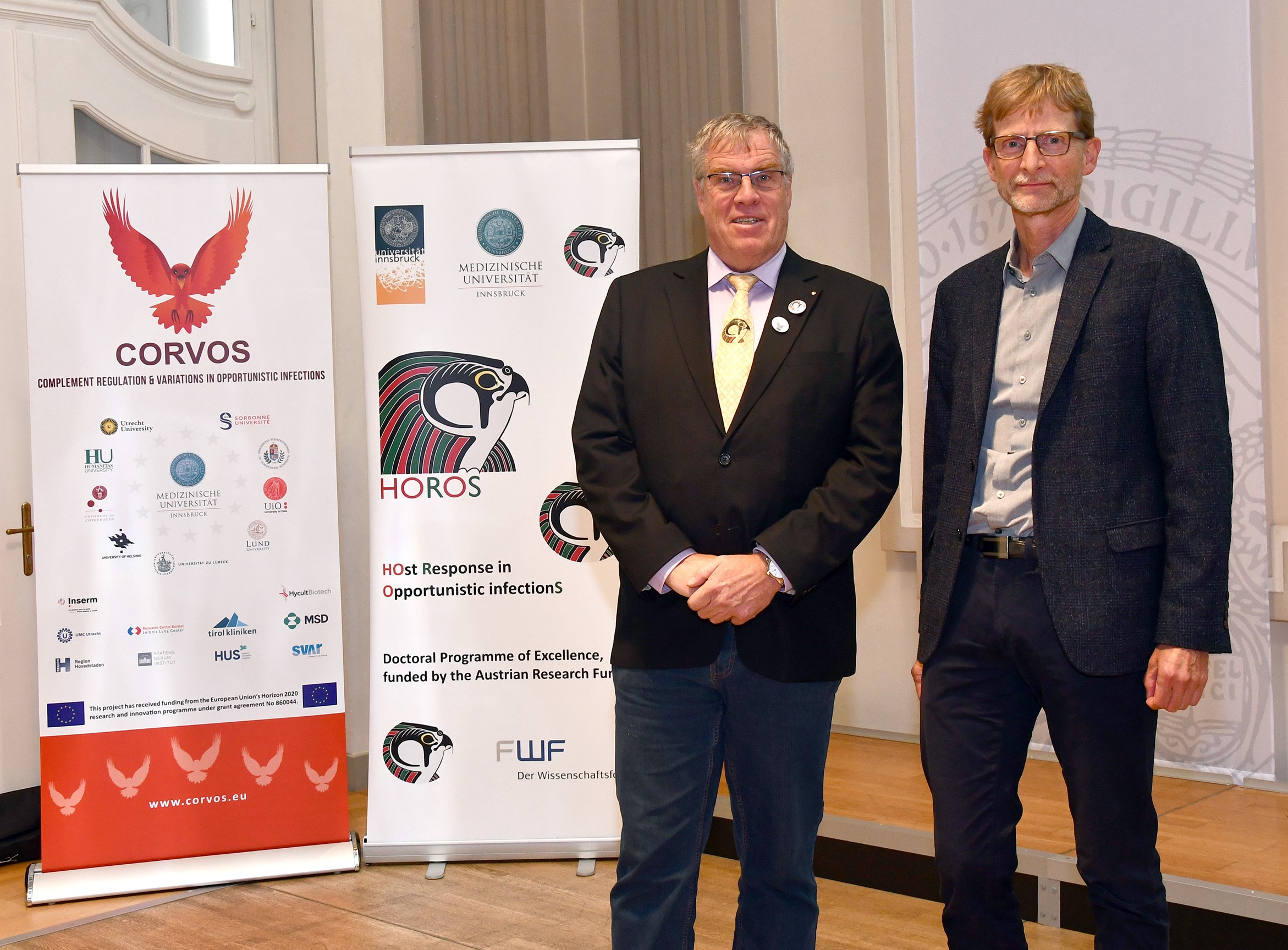
Innsbruck has a long history of training PhD candidates in biomedicine. Initiatives to build an "international state of the art" in PhD education were started even two years before the Medical University of Innsbruck was founded in 2004. Last week, 20 years of effective PhD education in Innsbruck were celebrated!
Vice-Rector Bandtlow emphasized Georg Wick's exceptional achievement in convincing the relevant ministry to fund doctoral programs at Austrian institutions between 2003 and 2005 while serving as the President of the Austrian Science Fund (FWF). After all, the Medical Institution of Innsbruck was the first Austrian medical university to provide an FWF-funded Doctoral College, and the program's success ultimately helped universities to further establish organized doctorates.
The doctoral programs at the Medical University of Innsbruck that have been and are still being funded by the FWF and the EU are known by the acronyms MCBO, SPIN, HOROS, CORVOS, as well as CavX, IGDT+, and CBD. Some of these programs have been run in collaboration with the University of Innsbruck, hastening the internationalization of doctoral training.
Besides Bernhard Flucher whose PhD college MCBO was seen as a “role model” for other Austrian medical graduate colleges, Reinhard Würzner’s dedication to doctoral education by being the speaker of HOROS and the first EU doctoral college in the life sciences sector coordinated by an Austrian university, CORVOS, was particularly highlighted.
Photo: D. Bullock, MUI
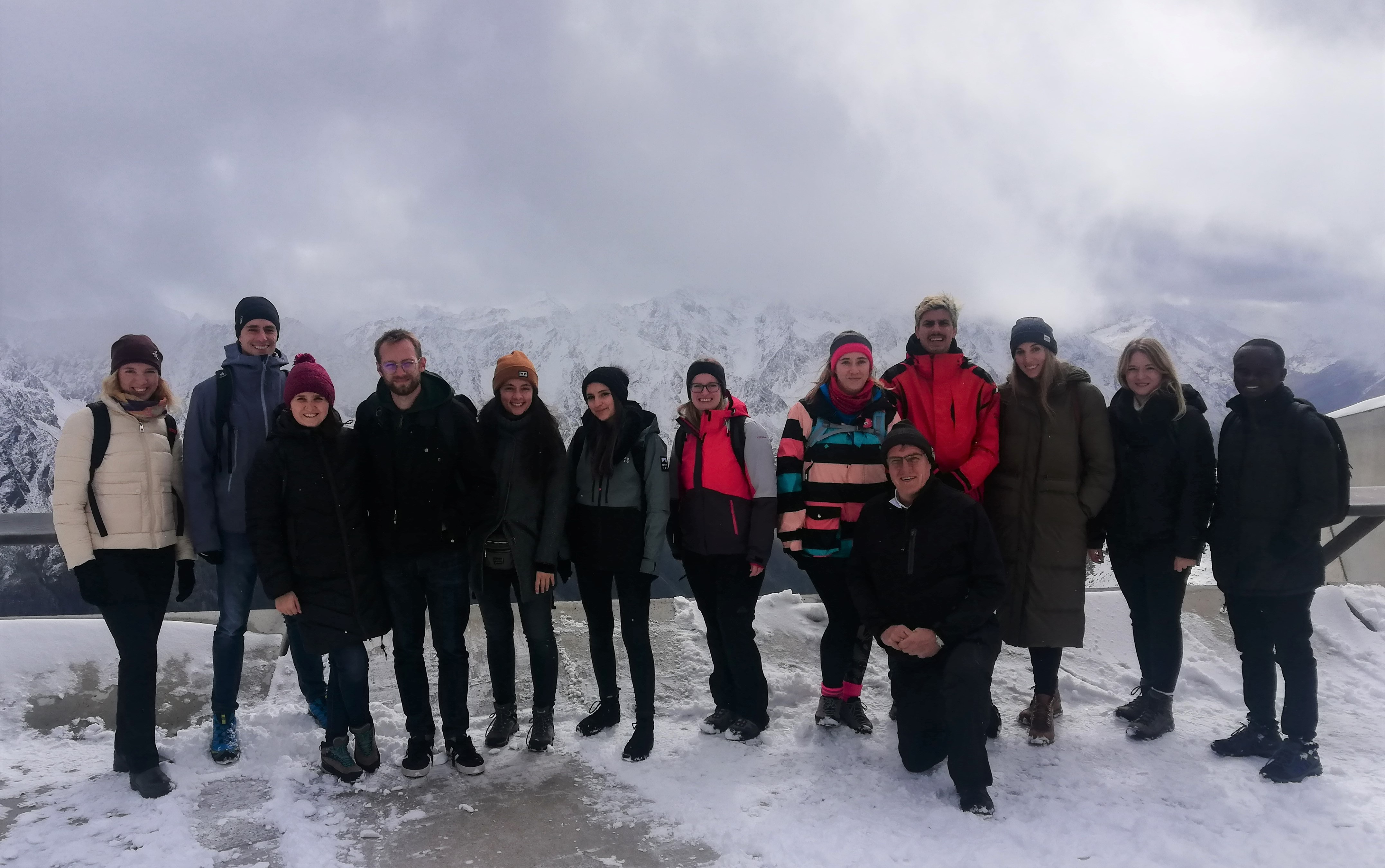
What better occasion to walk in the snow for the first time of the year than a Summer Retreat? On September 28th HOROS/CORVOS/IIT students embarked for the annual retreat, in the direction of Sölden in the Öztal valley, Austria. Their mission? The 007 Elements, a James Bond cinematic installation on the top of Gaislachkogel.
As they arrived in the valley of Ötzi, they were led to a local pizzeria minutely chosen by Hussam (HOROS) where they had early meal. This pit stop was also the occasion for Prof. Reinhard Würzner to update students on various matters such as lectures, publications, social media or secondments.
After refuel, the group headed to the gondola to access the 007 Elements, overhanging the valley at 3.040m. Originally, it was planned to hike up to the top, however, it had snowed during the week in Sölden and therefore, the idea was abandoned. And indeed at the Bergstation, some realized that actually skiing clothes could have been a serious option.
007 Elements stands as a memory of the James Bond movie SPECTRE scenes that were filmed in Sölden. The premises take the visitors through different rooms to discover the James Bond saga origins but also reveal the making of some iconic stage sets or action scenes, with a focus on the SPECTRE movie. Fans would have also appreciated the display of famous objects such as the golden gun or the explosive watch.
Ending the visit, the group was greeted outside by snowfall. Probably a good way to signify the end of this lovely Summer Retreat.
On the 16th of September 2022 researchers from the Medical University of Innsbruck met at the 8th CIIT Science Day with HOROS & CORVOS, which had been organized with great commitment by Thomas Sonnweber, Doris Wilfingseder and Wilfried Posch. In the seminar rooms of the MZA, allocated researchers and PhD students presented almost 50 current research projects in demanding poster sessions. Additionally, Univ.-Prof. Dr. Andreas Bergthaler from the Institute of Hygiene and Applied Immunology (Medical University of Vienna) was invited to the event and delivered an exceptional keynote lecture. The lively scientific exchange followed by a light buffet with drinks made this year’s Science Day a resounding success. We want to thank all people involved in the organization and the participants for this interesting and stimulating meeting.
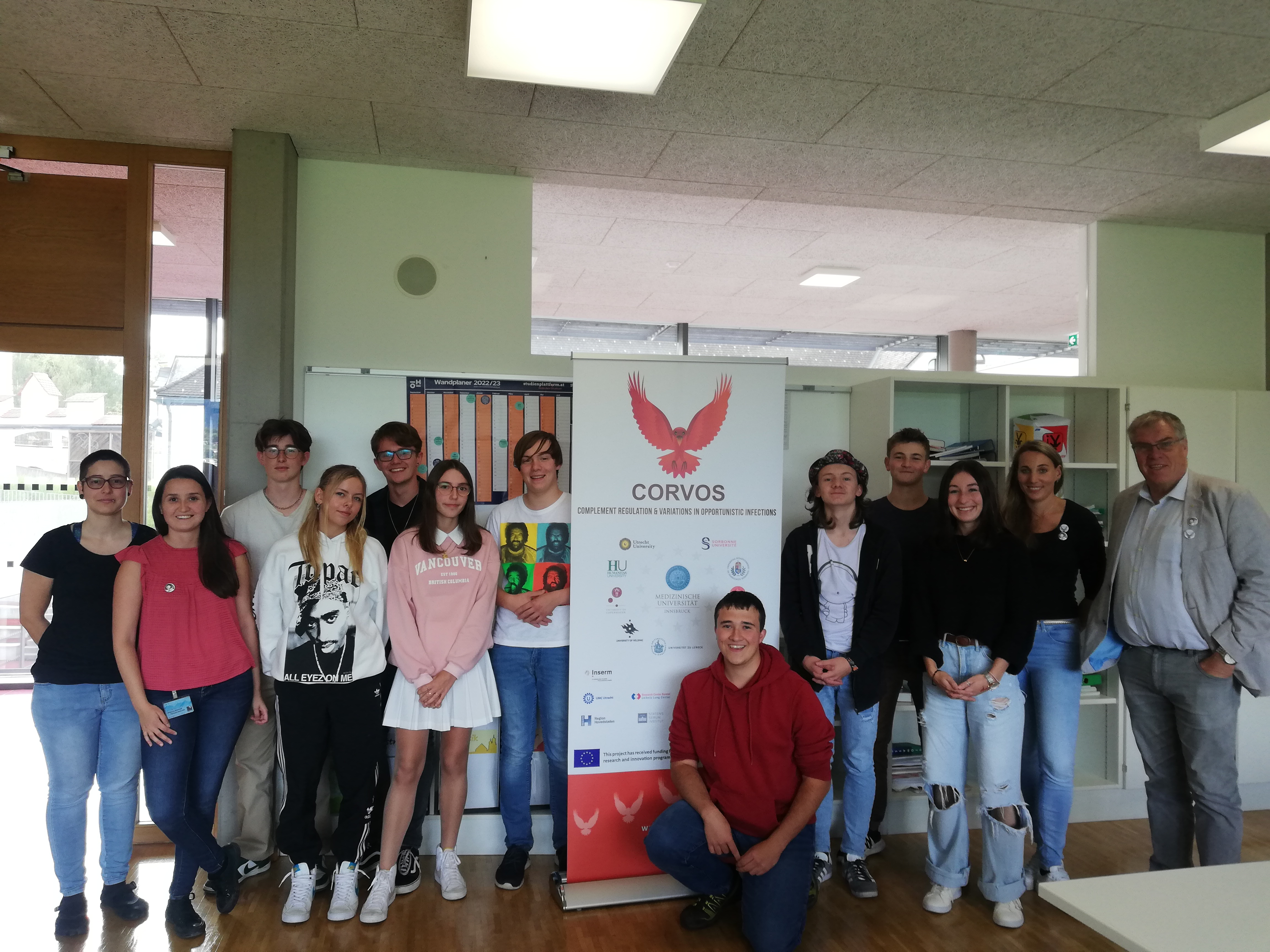
On September 19th, 2022, members of the CORVOS and HOROS programmes visited the Meinhardinum in Stams, a high school located in the heart of Tyrol, Austria, to bring pupils closer to research and scientific work. After an introduction about the CORVOS and HOROS programmes by Prof. Würzner, the speaker of CORVOS and HOROS, in front of three final-year classes, PhD students individually presented their cultural background and their motivation to achieve a PhD. This was done in smaller groups, i.e. in three class rooms. Since all PhD students were female, pupils got the view that everybody, independent of gender, can find a place in science. In addition, the role of females in science was particularly discussed. Furthermore, students talked about their experiences and acquisition of subject-specific and soft skills during their studies. Finally, pupils had the chance to ask any questions regarding their potential scientific future. We hope that our enthusiasm for research inspired some of the pupils to strive for a career in science and to aim for a doctoral degree. Overall, it was a very nice experience for both sides, pupils and PhD students.
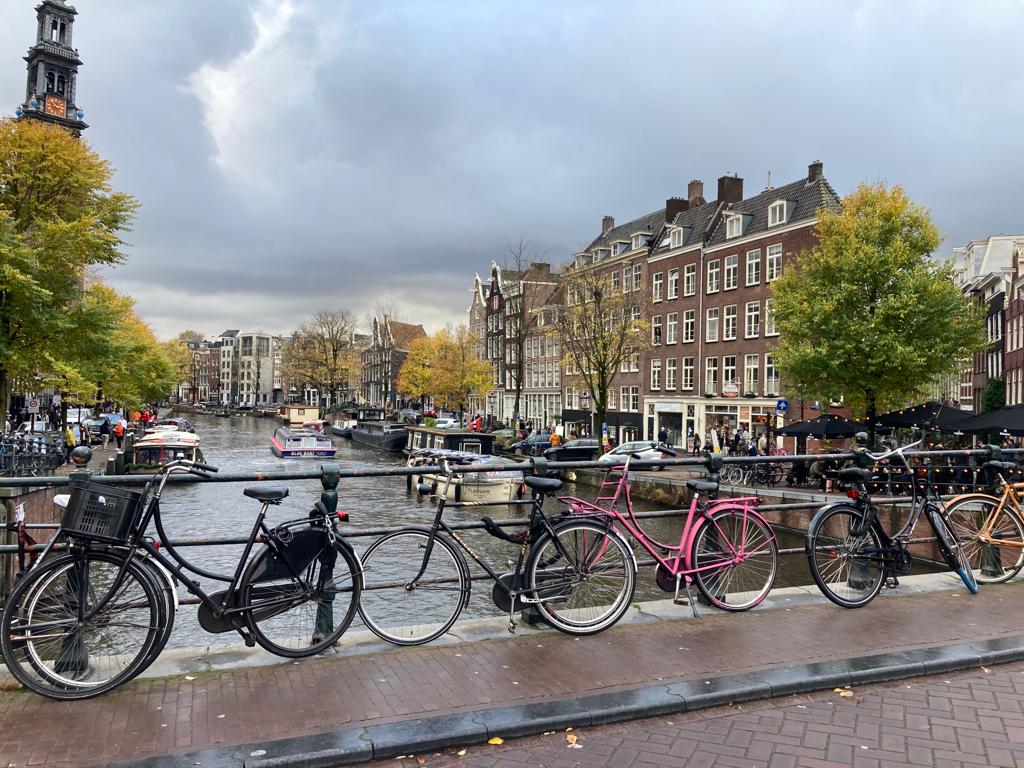
In 2021 I had the chance to travel to Amsterdam for a 3 months secondment (October-December). As HOROS associate student I was excited to join the lab of Pr. Teunis B. H. Geijtenbeek at the Amsterdam University Medical Centers. Their expertise lies in dendritic cells-pathogen interactions that they investigate using infection model such as ex vivo human tissue or relevant cells. For instance, a really cool technique they do is an extraction of primary Langerhans cells from human skin to better understand the role of this specific subset of dendritic cells during mucosa-associated infection. My stay was an opportunity to learn about dendritic cells during infection and signaling but also to witness the exciting environment and opportunities the close connection Lab – Hospital setting brings. Thanks to Marta Bermejo-Jambrina, PhD, who helped me, I could start working with our 3D cystic fibrosis lung tissue model to characterize cytokines and other genes expression upon SARS-CoV-2 infection.
Not only could I enjoy the lab and the lovely people, but I could also wander in Amsterdam and surroundings. The city is beautiful and very lively as well as international, which make it easy to live in. Definitely, I will remember at least canals, bikes, cheese, tulips and oliebollen (taste much better than it looks). I was happy that family and friends could come and enjoy with me, and despite tough regulations due to COVID-19, I felt lucky being there.
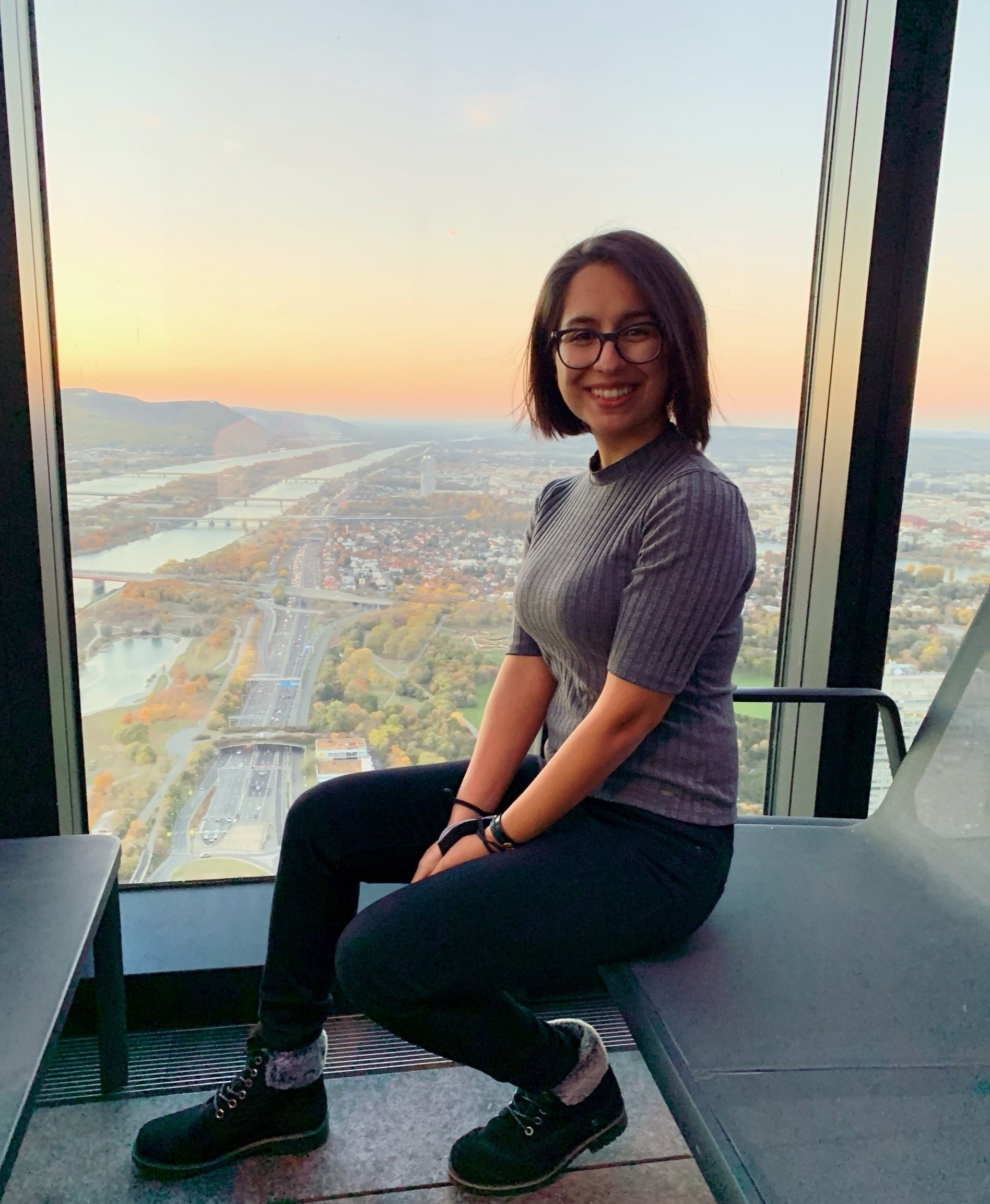
As a HOROS associated student, I was given the chance to go for a 3 months exchange program (October to December 2021). This was brilliant, because I had the opportunity to join Prof. Christoph Binder’s group at the Medical University of Vienna. Joining Binder’s lab was a great experience for me as I could learn tremendously from their expertise in the role of immune responses in atherosclerosis. Therefore, in Vienna I worked on a different research topic: OSE-specific immune responses in patients with age-related macular degeneration and controls from the AugUR study. During my 3 months stay, with the help of Mrs. Maria Ozsvar Kozma, we performed six different ELISA assays on approximately 2,000 samples. Although my stay in Vienna was for a short period, I successfully achieved my aims and made the most out of it. I could only achieve this because of the friendly environment in the laboratory. All members of Binder’s lab were very welcoming and always involved me in their social activities.
Aside from work, I also had some time to explore Vienna. It has now become one of my favorite cities. Some of my friends from Innsbruck visited me, which made it even better! Overall, I am grateful for this opportunity as it allowed me to gain a new set of skills in one of the best labs in Vienna. Additionally, I also made wonderful friends with whom I will stay in touch and hope to see them very soon.
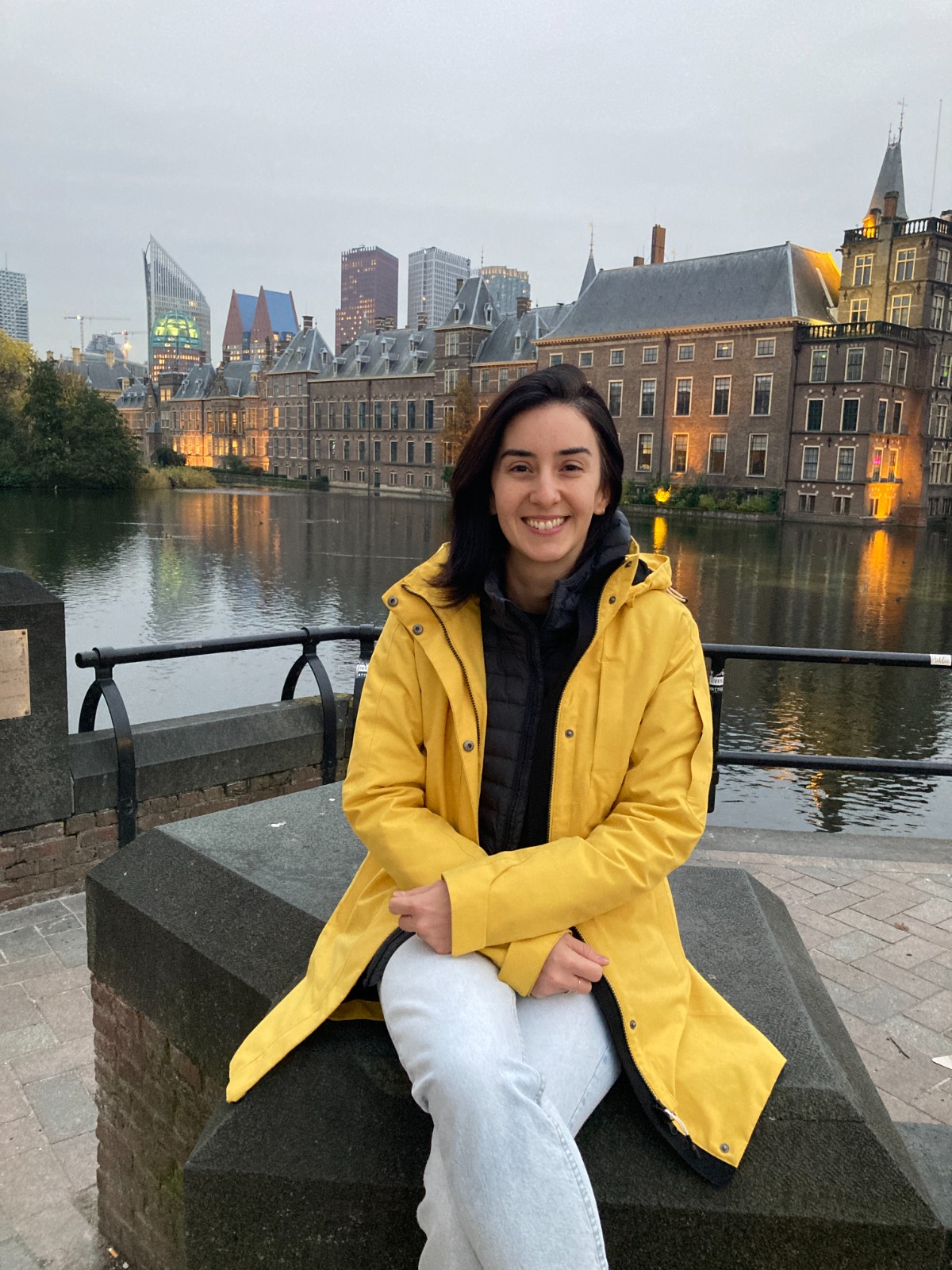
From July to December 2021, I had the chance to do part of my Ph.D. thesis in the Netherlands. I joined Prof. Dr. Patrick Rensen’s group at the Leiden University Medical Center. As in Innsbruck, I work with cholesterol metabolism in infectious diseases, and being part of Patrick’s group for six months was the perfect opportunity. The Rensen Laboratory focuses on glucose and lipid metabolism and its connections with metabolic diseases. They have the APOE*3-Leiden.CETP mice, a unique tool in the study of cardiovascular and metabolic diseases. I could use this model in my research and obtain very interesting results. I learned many new techniques there and had a great time with Patrick and all the other people from the group, who are all very kind.
Life in the Netherlands was great, despite the rainy weather. I enjoyed the food, the nature, the architecture, and the culture. Leiden is a small but very international university city, which carries a lot of history. Although I worked there, I was living in The Hague, the administrative and royal capital of the Netherlands. Also, I could visit a lot around, as many interesting cities are nearby and the country has an amazing railway network.
I feel very lucky for this great experience, and especially for being able to have my family there with me.
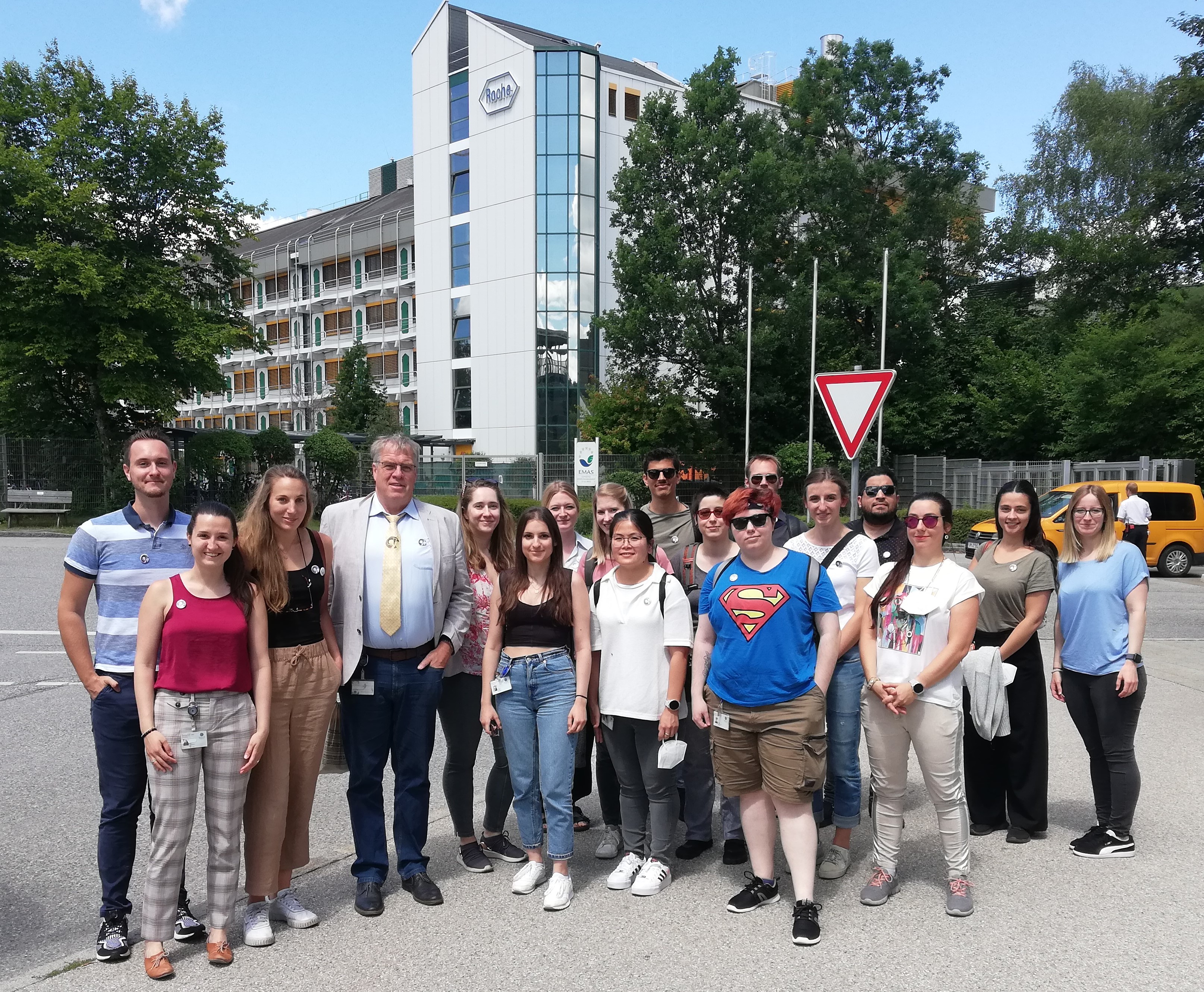
On Tuesday 12th of July, the HOROS, IIT and CORVOS PhD students went on a trip to Roche, located in Penzberg, Germany. Our excursion started with a general introduction about the history and the enterprise philosophy of the biotechnology company that by now has over 7,200 employees in Penzberg. We learned that Roche is one of the world’s largest biotech companies that is well known for providing a broad range of pharma products and in-vitro diagnostics. Dr. Klaus Reichert guided us through the campus and we got to see where the manufacturing processes take place. At the end of the guided tour, we enjoyed the view over the campus from the top floor of one of the main buildings.
As the last item on the agenda, we enjoyed a very interesting talk by Dr. Pavel Kubalec who gave us insights on in-vitro diagnostics. He demonstrated the entire process of an assay development and we had the chance to ask all of our questions. We have learned that the company provides a broad spectrum of perspectives for us as PhDs, starting with Manufacturing, Data Science or Research and Development. After a two hours bus ride, we arrived in Innsbruck again and discussed our visit at Roche over dinner at Stiegl-Bräu.
Special thanks to Frederik, Silke and Reinhard for organizing this event and of course, we want to thank the team at Roche for providing us interesting insights into their company.
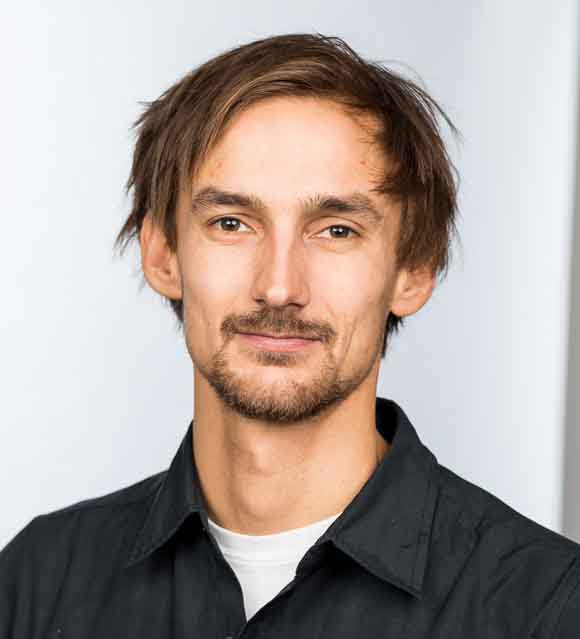
On 07th July 2022, it was time for Alex to be in the spotlight for his final challenge before receiving his Ph.D. degree – the defense! Under the supervision of Prof. Dr. Günter Weiss, he achieved his degree at the Department of Internal Medicine II, Medical University of Innsbruck, by investigating differences in a host’s metabolic response pattern and the effect of iron supplementation when infected with intra- or extracellular bacteria. Great job, Alex! We wish you a lot of fun on your well-deserved trip.
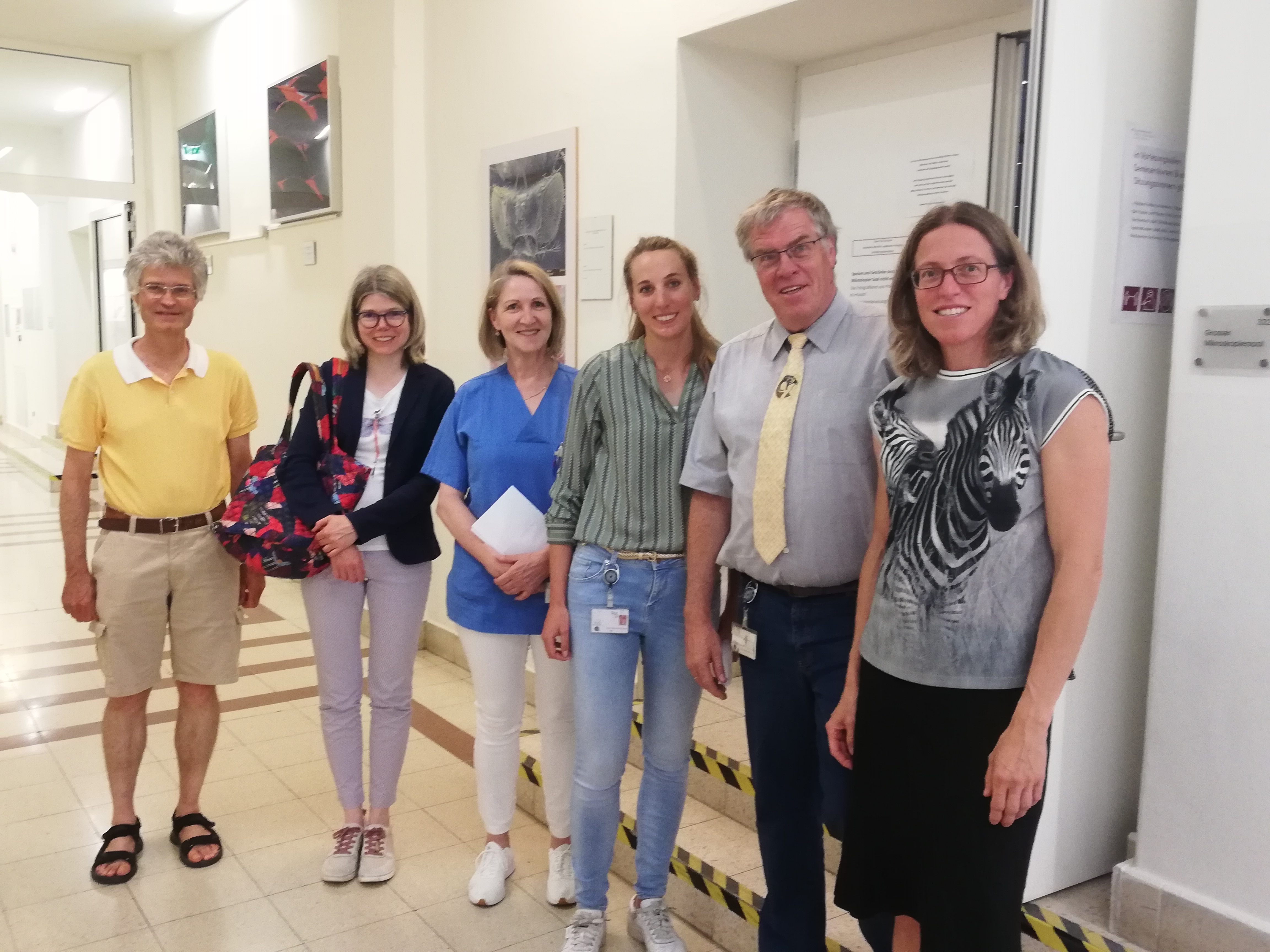
Despite technical challenges caused by the cyber attack on the IT infrastructure of the Medical University of Innsbruck, Silke was able to defend her Ph.D. Thesis on 20th June 2022. Her work was focused on improvements and novel insights into the diagnosis of bloodstream infections (BSIs) by identifying blood components interfering with a certain molecular-based assay, investigating extracellular vesicles as a potential biomarker for BSI, and the genomic and phenotypic analysis of linezolid-resistant Staphylococcus epidermidis using whole genome sequencing. Silke will continue working in the same research group as the new administrator of HOROS after Marco has started to work in the industry.

On the 20th May 2022 the doctoral programmes of excellence, HOROS and CORVOS, joined the Long Night of Research, where teams of researchers made the fascinating world of science visible for the interested general public through experiments, workshops and live presentations in different institutes all around Austria.
At our booth at the Centre for Chemistry and Biochemistry (CCB) in Innsbruck we guided people into our world, showing what our research can do and to which innovations we contribute with our everyday work. From establishing tridimensional lung models to distinguishing healthy or infected tissues under a microscope or checking how many microorganisms we have on our hands, everybody, from children to adults, could actually play with science.
In addition to this, HOROS students Christina Schöpf and Verena Harpf and CORVOS student Giulia Bertacchi presented their PhD programmes together with the coordinator Reinhard Würzner, explaining what it means to be a PhD student and guiding people, especially young women, and made them interested in pursuing a PhD of their choice.
.png)
The Pint of Science festival strives to provide engaging and relevant discussions on cutting-edge research to the general public — and this in bars, pubs, cafes, and other public areas. Beginning of May, scientists from the Medical University of Innsbruck, including Dr. Guido Wollmann, Dr. Zlatko Trajanoski, Dr. Hesso Farhan, Dr. Oliver Schmidt, Dr. Doris Wilflingseder, and Dr. Victoria Klepsch presented their research topics within the fields of Cancer, Immunology, Virology, and Mycology in a relaxed atmosphere at Tribaun. HOROS was part of this unique event by providing organizational and financial support.
This year, the Life Science PhD Meeting could be held again as an in-person event at the Center for Chemistry and Biomedicine (CCB) in Innsbruck from the 20th to the 22nd of April. Students presented their projects and findings during these days in the form of posters or short presentations. One of our IIT students, Viktoria Zaderer, was awarded first place for her poster presentation and one of our HOROS students, Anant Kakar, reached third place in his poster session.
In addition to the students' presentations, Jerome Mertens (University of Innsbruck), Ulrike Schleicher (Universitätsklinikum Erlangen), Diether Lambrechts (KU Leuven Center of Cancer Biology), Peter Penzes (Northwestern University, Chicago), Charlotte Simmler (Mediterranean Institute of Marine and Terrestrial Biodiversity and Ecology, Marseille) and Manuel Mayr (King’s College London) were invited to give plenary lectures on their fields of expertise. The HOROS program welcomed Thomas Orasch as speaker for the HOROS Alumni-talk. He provided insights into his current field of research at the Leibniz Institute for Natural Product Research and Infection Biology - Hans Knöll Institute by giving an excellent talk on the potential use of nanoparticles in antifungal applications.
Hereby we would like to thank our HOROS students Franz Melzer, Natascha Brigo, Cristina Schöpf, and Hussam Abd El Halim for contributing in the organization of the event, which also means that HOROS represented more than a quarter of the organization committee. We were all really looking forward to this being an in-person event after the long drawn COVID-19 pandemic and we are happy to say it was a resounding success.
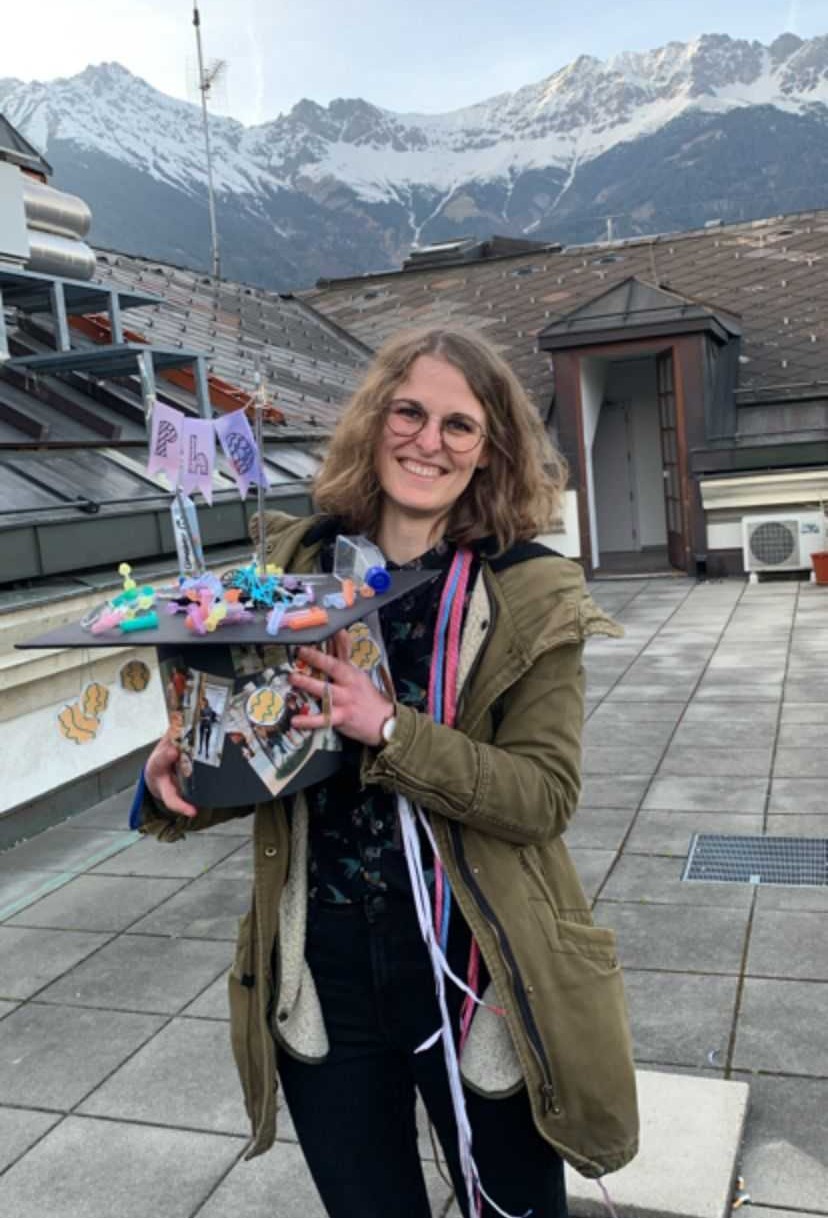
Congratulations Johanna – you did it! 11th April 2022 was the day of Johanna’s defense in which she presented impressive data about her research over the past four years. Her studies about reverse cholesterol transport and its impact on a host’s susceptibility to infection were performed at the Institute of Genetic Epidemiology, Medical University of Innsbruck under the supervision of Prof. Florian Kronenberg. Johanna became an indispensable part of the group and will continue her work as a PostDoc. All the best for your future as a postdoctoral researcher.
.jpg)
Plan A for my HOROS abroad stay was Seattle, but due to COVID-19, it was postponed and postponed until it finally was canceled. As an alternative, I was able to visit Prof. Bumann’s lab in Basel. Here in Innsbruck, I work with bacterial infections and iron metabolism with a focus on the host side. In Basle the work on the same field but with the focus on the pathogen side. Therefore, it was the perfect complement to my research. I learned a lot about bacterial iron metabolism, how to knock out genes in Salmonella and how to create reporter plasmids to get a better understanding of the gene expression under specific conditions.
Basel itself is a beautiful old and international city that is placed in a border triangle of Switzerland, Germany, and France. With a bike ride, you can visit within 30 minutes all three countries. As it gets quite hot during summer the river Rhein is a perfect cool down and “Rheinschwimmen” is kind of a local tradition. Even at the registration for the university, you get a dry bag for Rheinschwimmen.
A special experience was the EURO2020 as Switzerland reached the quarterfinals and everyone was in the streets until late at night celebrating the success of the national team.
The area around Basel itself is flat, but with a short car or bus drive, you can reach the hills of the Jura that are perfect for climbing, hiking, and paragliding. I was able to get some airtime with a fabulous view of Basel.
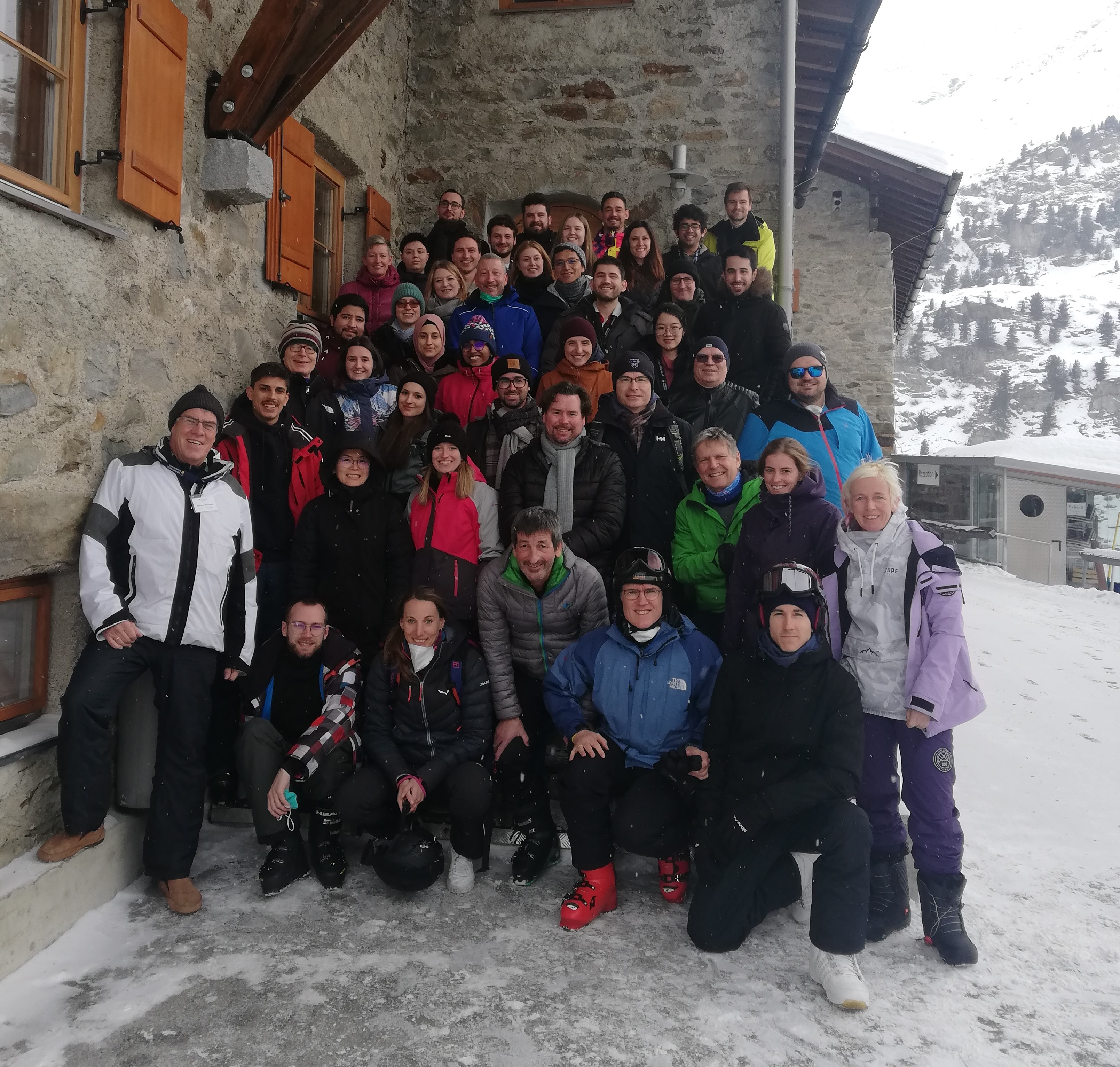
COVID-19 restrictions made it unclear, whether the Obergurgl Retreat could take place from 5th -10th January 2022 after a one year break. After all, the existing regulations at this time in Austria made this event possible under specific hygiene concepts. Due to the organization efforts of Reinhard Würzner, Marco Grasse and Silke Huber, CORVOS (Complement regulation and variations in opportunistic infections) and HOROS (Host response in opportunistic infections) members could meet for the first time together with the students from the IIT (Infection, Immunity and Transplantation) program at Obergurgl. It was a great occasion to also welcome the new HOROS, CORVOS and IIT students. Together with the other PhD candidates as well as the HOROS and CORVOS faculty, they had the opportunity to present and discuss their research. Guest talks were held by renowned scientists such as Stefan Niemann (Borstel, Germany), Seppo Meri (Helsinki, Finland), Rafael Bayarri Olmos (Copenhagen, Denmark), Jörg Köhl (Lübeck, Germany), Tom Eirik Mollnes (Bodø/Oslo, Norway), Serena Bettoni (Lund, Sweden), Peter Garred (Copenhagen, Denmark), Zoltan Prohaszka (Budapest, Hungary), Willfried Posch, Doris Wilflingseder and Heribert Stoiber (all Innsbruck, Austria) and by an industry representative Loek Willems (Hycult, Uden, Netherlands).
This year’s talks were mainly related to the current COVID-19 pandemic as well as the complement system, however, other topics like fungal infections or clinical aspects in the specific fields of the members were covered.
A special occasion this year was the extension of the HOROS program until 2023 and the presentation of the Gold medal of the European Complement Network (ECN) to Tom Eirik Mollnes for his exquisite scientific works on the complement system. The committee of the ECN was thereby virtually present.
Despite a strict program, there was some time for networking under the CORVOS, HOROS and IIT students as well as among the other scientists and to perform or learn activities such as skiing, sledging, snowshoeing or ice skating.
Hereby, we want to thank the program coordinator Reinhard Würzner, as well as Marco Grasse and Silke Huber for the great organization and execution of the retreat and the huge occasion to meet and to interconnect with respected scientists and with students of other PhD programs.
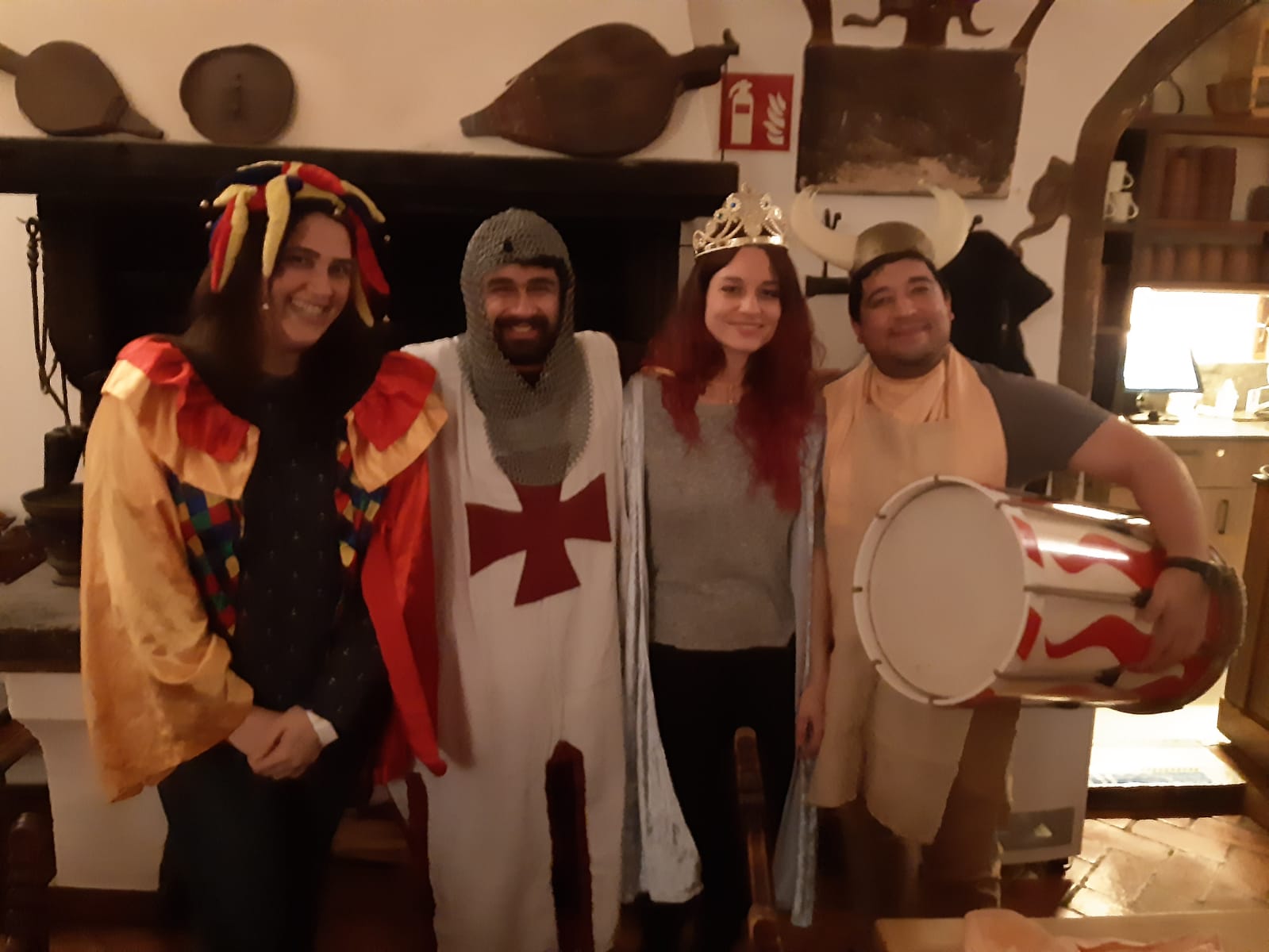
Tuesday, the 14th of December marked another successful date on the HOROS/CORVOS/IIT social calendar, which turned out to be an extraordinary event! In order to keep in line with current COVID related safety guidelines, only fully vaccinated people were allowed to participate. In addition, every participant was tested (RT-PCR) the evening before the event. There was a nice nip in the air when we congregated at the City Center of Hall in Tirol, a small town near Innsbruck. We started by warming ourselves up with Glühwein, a delectable mulled wine which was served steaming hot, before getting transported back to an archaic era through a Medieval dinner at the renowned Ritterkuchl restaurant. We were joined by two clinical lecturers for the CORVOS PhD Program, Dr. Moritz Kummann from Radiology and Dr. Peter Kaiser from Traumatology. Sitting in mixed groups to facilitate the interactions between the students from all the three different PhD Programs, we indulged in exquisite food and drinks in traditional medieval style, using our hands instead of silverware.
The most entertaining part was being led through medieval practices and customs by a Noble, who sang old, hilarious songs with his guitar-like instrument and chose diners at random to participate in various skits for the evening. The first participants were Enrique and Anant who had to arduously compete with each other to win the title of “The Strong Man”, who was made to beat a large drum every 15 minutes. After his expected defeat, Anant was awarded the title of “Knight” as a consolation prize, and to preserve it he had to swig down an entire jug of ‘The Sacred Elixir’ , better known as Mead, in order to embolden himself to be able to court Vicky, a beautiful damsel ,who had no choice but to resign to his serenading. To close the exciting event with a flourish, our mighty Knight Anant designated Roya as a Harlequin, who enraptured us with a traditional medieval dance, symbolizing joy and hope for the future. On a more serious note, this dinner earned yet another five-star accolade for the HOROS/CORVOS/IIT social event records. Thank you very much Franz, Marco, Silke and Reinhard for organizing this marvelous, memorable event!
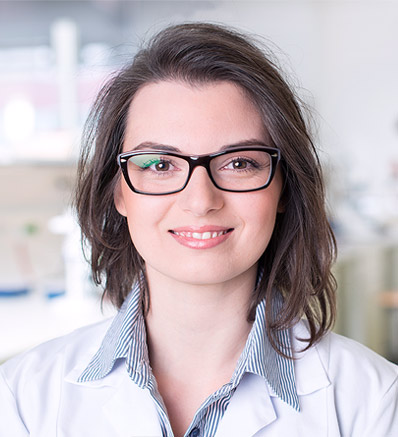
Damia’s research was committed to identifying variants within genes encoding complement proteins C3 and C7 as well as complement regulatory protein Factor H predisposing individuals to develop cardiovascular diseases or infections as well as their association with aging. On 18th October 2021, Damia defended her work in an online meeting where she presented her work to her thesis committee, examiners, and fellow Ph.D. students. Well done – we wish you all the best for your upcoming steps!

From the beginning of May until the end of July I was fortunate enough to go abroad to Erlangen, Germany. I was able to join the group of Prof. Dr. Christian Bogdan, institute chief of the Mikrobiologisches Institut - Klinische Mikrobiologie, Immunologie und Hygiene Universitätsklinikum Erlangen.
The group around Prof. Dr. Bogdan focuses on the function of the innate immune system and the control against intracellular pathogens like Leishmania. They discovered a central regulatory mechanism in the immune system through the deactivation of phagocytes by the cytokine interleukin-10. In addition, they determined that a deletion of Arginase1 and the corresponding upregulation of inducible nitric oxide synthase reduces pathogen levels.
My supervisor Prof. Dr. Weiss suggested to join the research group of Prof. Dr. Bogdan due to the fact that my PhD project is focusing on macrophages and Salmonella infection. The very talented technicians in the research group showed me a new way of generating bone-marrow derived macrophages by using Teflon-bags and not normal cell culture dishes. Moreover, I was able to perform experiments with peritoneal macrophages to determine if the infection profile is similar to bone-marrow derived macrophages. I was shown various techniques how to measure Arginase1 activity in vitro and in vivo. In addition the scientific exchange between myself and the group of Prof. Dr. Bogdan was very enlightening. During my stay in Erlangen I was able to dive deeper into the mechanism how macrophages try to kill pathogens and on the other hand how pathogens try to evade their killing.
Erlangen is a relatively small city in Germany. I enjoyed walking through the old town and seeing some sights. In the first month of my stay all shops and restaurants were closed due to COVID-19 governmental regulations. However, as soon as everything opened. I really enjoyed the city with its good food and beer breweries. I was even able to go climbing with members of my research group. On my last day in Erlangen, I was fortunate enough to join the institute on their annual company excursion. The motivated ones rode their bike to a small town next to Erlangen, where we enjoyed a typical Bavarian dinner and some good company.
I am grateful to the PhD program HOROS for giving me the opportunity and possibility to spent 3 months in Erlangen. Furthermore, a huge thank you goes to the research group of Prof. Dr. Bogdan for giving me a wonderful working environment with lots of laughs an scientifical exchanges. Last but not least, I am thankful to my supervisor Prof. Dr. Weiss and Prof. Dr. Bogdan for supporting me in my decision to go abroad.
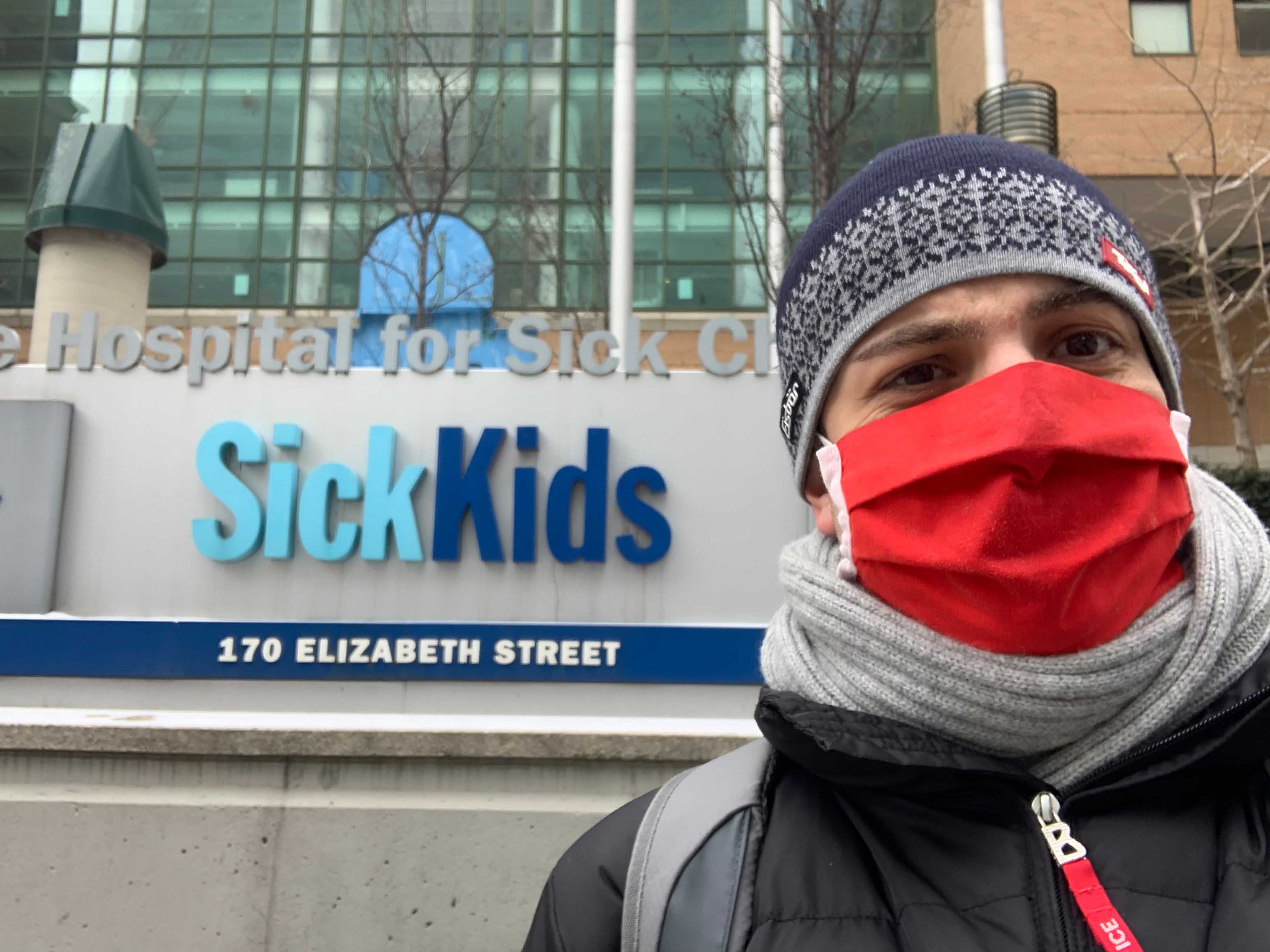
When the Covid-19 pandemic arrived Europe, we had the desire to transfer my PhD project of CD8+ HLA-DR+ Regulatory T cells in old age into children. HOROS enabled me to connect with the largest research hospital in North America “SickKids” – part of the University of Toronto - located in Toronto, Ontario in Canada. I am more than grateful that Prof. Dr. C. Licht, the director of Nephrology at SickKids, agreed on a collaboration and he invited me to work with him in the department of Cell Biology in Canada. However, the spreading of the new SARS-CoV-2 virus made it very hard with bureaucratic matters and it took me almost a full year to arrive in Canada.
After I got the green light from the government to entry Canada, it took two negative tests in Europe and two weeks of quarantine including a final negative Covid-19 test in Canada to start my first day of work for the coming six months. Back then in February 2021, I made my walk from the student residency I stayed in through the snow white Downtown of Toronto and the famous Canadian freezing cold to get to the clinic. From the first day, Dr. Licht and his team welcomed and integrated me as warmly into the team as one could wish. I directly felt at home surrounded by very kind and dedicated international students and researches from all over the world, same as in Austria with HOROS.
With establishing CD8+ HLA-DR+ Regulatory T cells in healthy children, we wanted to compare the new insights with our data from healthy young and old adults in Austria. As we and Dr. Licht got interested in the potential role of autoimmune disease in my cell subset, especially in regard of nephrology, we worked and gained ethical REB approval in Canada to include SLE suffering children as well as IgA Nephropathy suffering children. Besides that, I collaborated in several complement research projects: Covid-19, aHUS single case iPSC generation to study rare kidney diseases and skeletal muscle injury and repair via C3. With all these projects I was able to learn and get licenses for newest techniques of cell culture in handling endothelial cells and iPSCs from fibroblasts, immune fluorescent assays as well as WesternBlots, scratch assays and FACS sorting with most modern FACS systems.
The city of Toronto is known to be highest diverse in ethnicity all over Canada, as thousands of immigrants come via Toronto to Canada and often remain living in this beautiful and green metropole. The best thing is, that every resident is not only aware of the high immigration but also really wants to help newcomers in the kindest way as possible. It´s the biggest city in Canada in residents but not its capitol. The industry and expansion of new café´s and restaurants is incredible, although the pandemic caused a long lockdown until June 2021.
All in all, it was an amazing time and a life experience, that I will never forget. I am more than grateful to HOROS, to Dr. Reinhard Würzner as supervisor and contact creator, my supervisor Dr. Birgit Weinberger and of course to Dr. Licht and his great team to realize my stay abroad at such a well-established institution during the pandemic. I am also really grateful for my new friends I was able to get to know there and can´t wait to see all of them again, hopefully sooner than later.
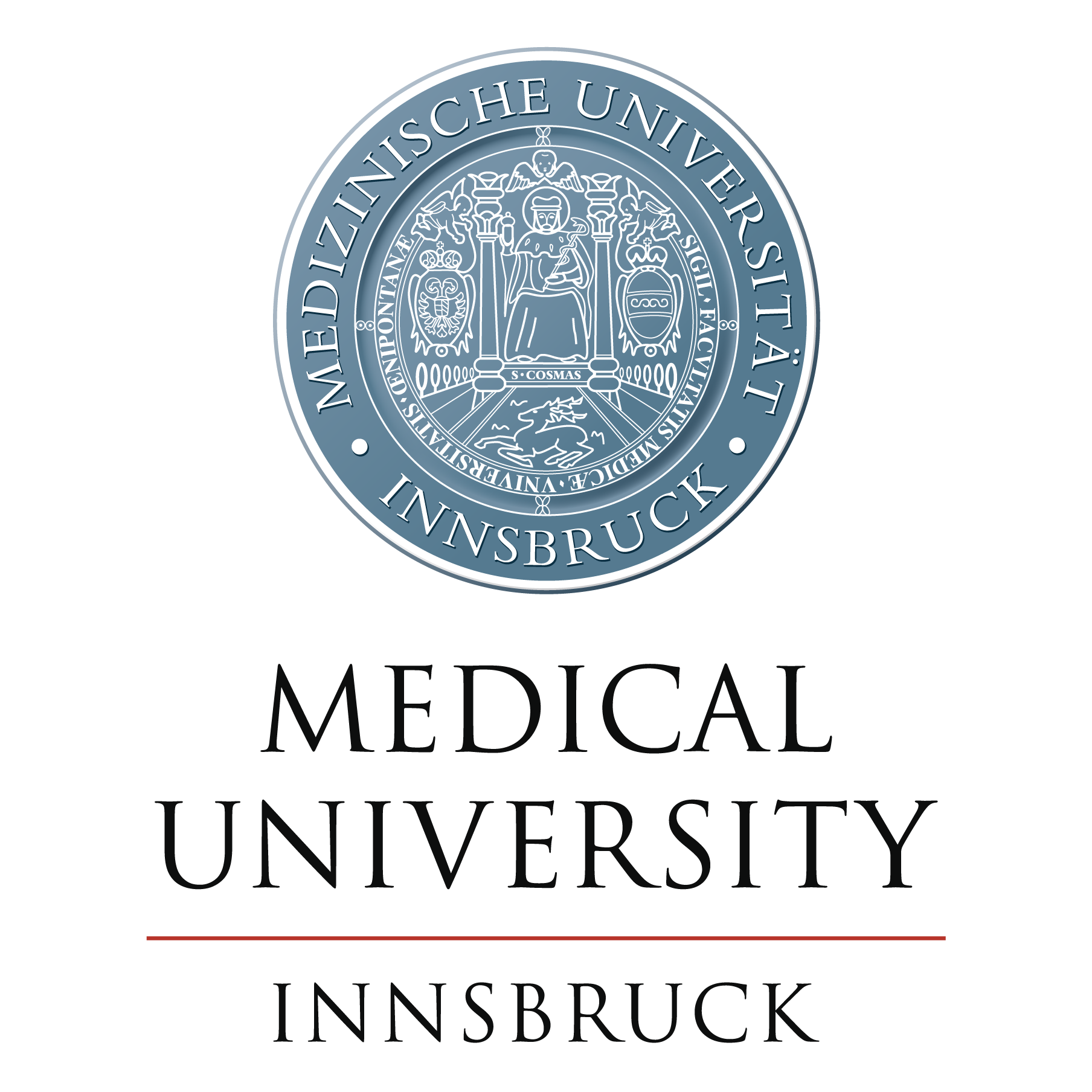
The new semester has started and we are very positive that we will soon come into a “post-pandemic” period. With the new academic year, also four new HOROS Associate students have started/will start very soon. They belong to the last PhD candidates that will be employed within the FWF funded doctoral college HOROS. However, the structure of HOROS will certainly remain at the Medical University of Innsbruck. The four students are: Adriana Koller under supervision of Prof. Kronenberg and Prof. Würzner, Patricia Caballero Fiz under supervision of Prof. Haas, Cristina Schöpf under supervision of Prof. Marx-Ladurner and Hussam Ab Del Halim under supervision of Prof. Weiss, Prof. Lass-Flörl and Prof. Wilflingseder. We wish them a good start into their exciting projects.
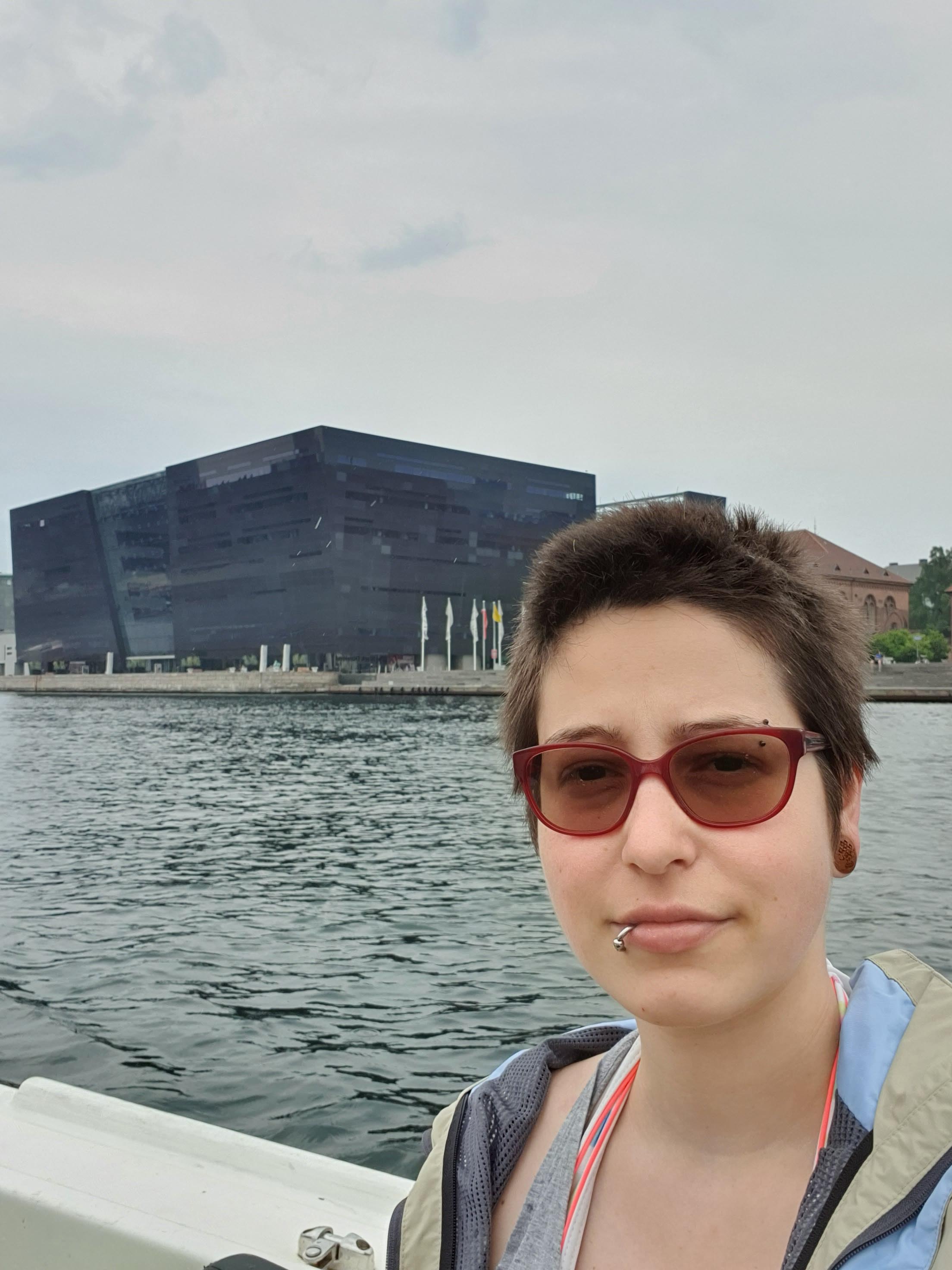
COVID-19 travel restrictions made it unclear whether I can stay abroad at all. Fortunately, 2021 held its promises easing up those restrictions and I was able to travel to Denmark, the land of “Hygge”. I was hosted by the group of Dr. Peter Garred in the immunological research ward of the Rigshospitalet, the university clinic of the University of Copenhagen.
Dr. Peter Garred is a complementologist specialized in one of the complement activation pathways, the lectin pathway. Since my PhD topic is “Complement and complement-based therapy in invasive fungal infections”, we decided to collaborate with his team. The project I worked on in his laboratory was about a novel therapeutic approach for invasive aspergillosis. They identified a protein within the complement system, which binds to the cell surface of Aspergillus species, especially Aspergillus fumigatus, and coupled this protein to a mouse or human antibody. I checked these so-called Peptibodies for their sensitivity, specificity, stability and binding ability at different storage conditions, and the binding ability to different Aspergillus fumigatus strains to determine the Peptibody and the strain we will use for further in vivo experiments. Additionally, I tested the binding of MASP-3, a serine protease of the lectin pathway, to several yeasts and filamentous fungi, namely Cryptococcus species, Aspergillus fumigatus clinical and environmental isolates, and Apophysomyces variabilis.
The working group gave me a warm welcome and showed me around the city using the most popular transport system, the bike. Copenhagen is a beautiful city with a rich history; starting as a Vikings fishing village, going through rough times with epidemics and war, and finally evolving to the most populated city and capital of Denmark, which means there is a lot to explore. The people from the laboratory took me to museums, to some of the many parks, the famous marketplace Kongens Nytrov with the neighboring harbor Nyhavn, the winter residence of the Danish royal family Amalienborg, and many more. After the lockdown was lifted, we all got together for dinner and drinks.
I really enjoyed the stay in Copenhagen and want to thank the Ph.D. program HOROS, and especially Reinhard Würzner, for making it possible for me to gather new experiences in another laboratory and country. Additionally, I want to thank Peter Garred and his working group for their help and the warm goodbye, going out and giving me a scented candle and a nice little figurine with a spring, a so-called Hoptimist, which is now always at my desk in the office remembering me of my time there.
Den lille Havfrue - the little mermaid
The genetically modified little mermaid
The global vizionary - sculpture made of scrap metal
Tristan Otto - Tyrannosaurus rex fossil
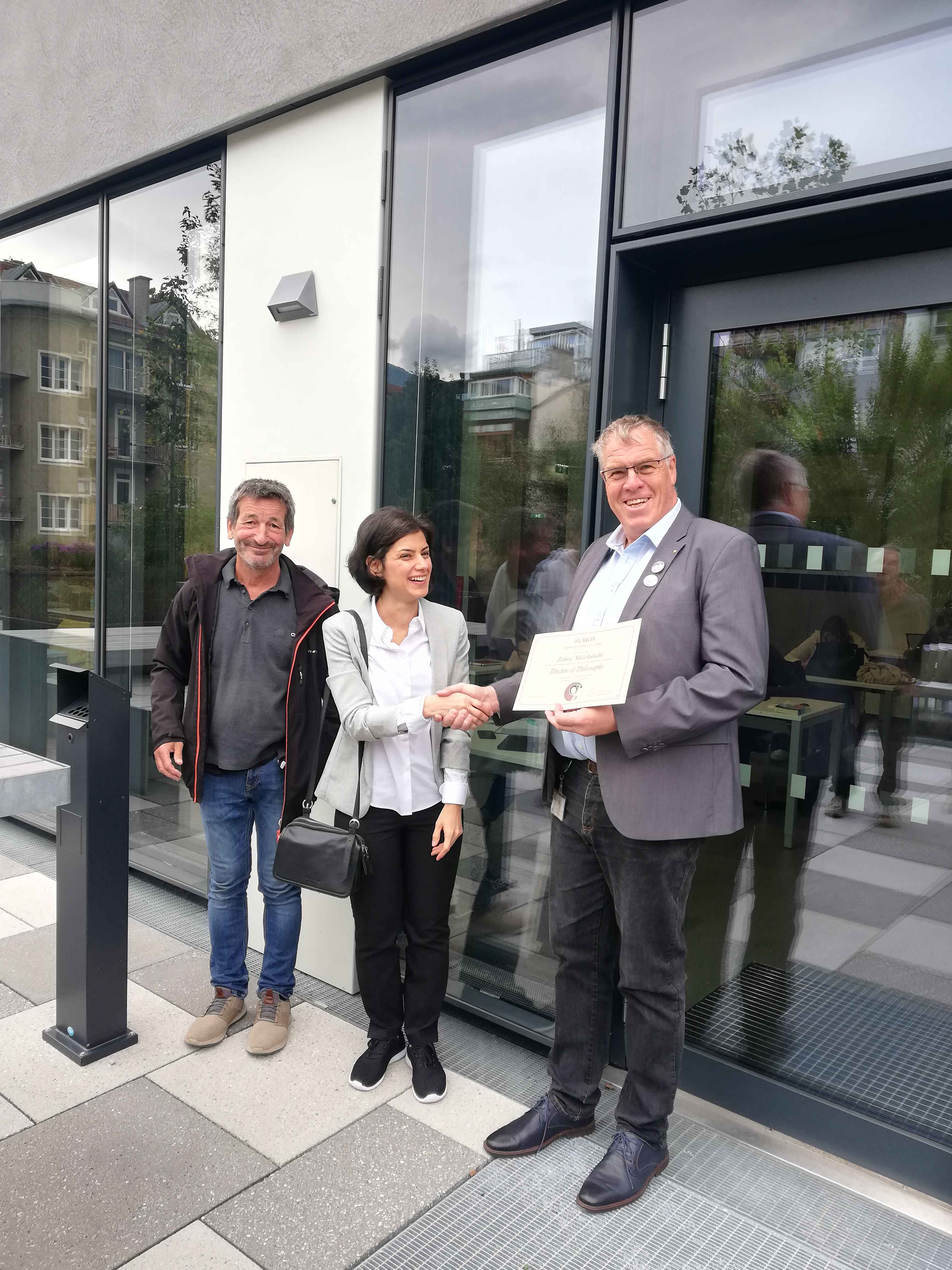
Congratulations to Zahra! She successfully defended her PhD thesis on 04th October 2021. Zahra studied the interaction of ZIKA with the complement system and authored two publications on that topic. More recently, she was also involved in invastigating the interplay of the SARS-CoV-2 virus and complement. We will definitely see more research-output from her in future. We are very happy to have another educated scientist and are curious, how Zahra will develop future - we wish you all the best :-)
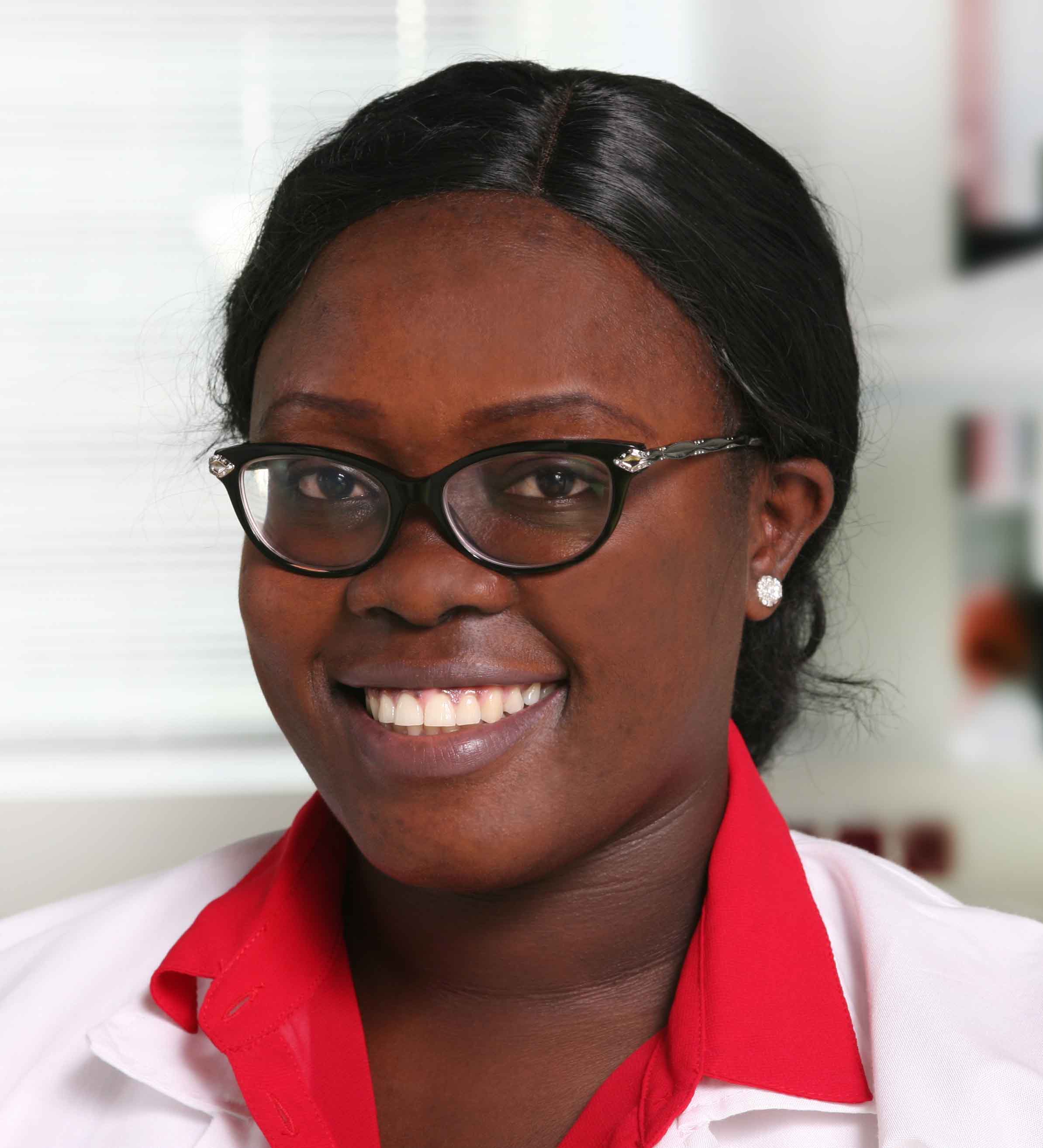
After a successful period of 4 years of working on the effect of corticosteroids on immune cells using a C3 lung model under the supervision of the head of the Institute of Hygiene and Medical Microbiology, Medical University of Innsbruck, Prof. Cornelia Lass-Flörl, Maureen was able to defend her Ph.D. Thesis on 23rd September 2021. As Maureen was already back in Kenya, the Defense was held online in agreement with examiners and the thesis committee. Congratulations and all the best for your future, Maureen!
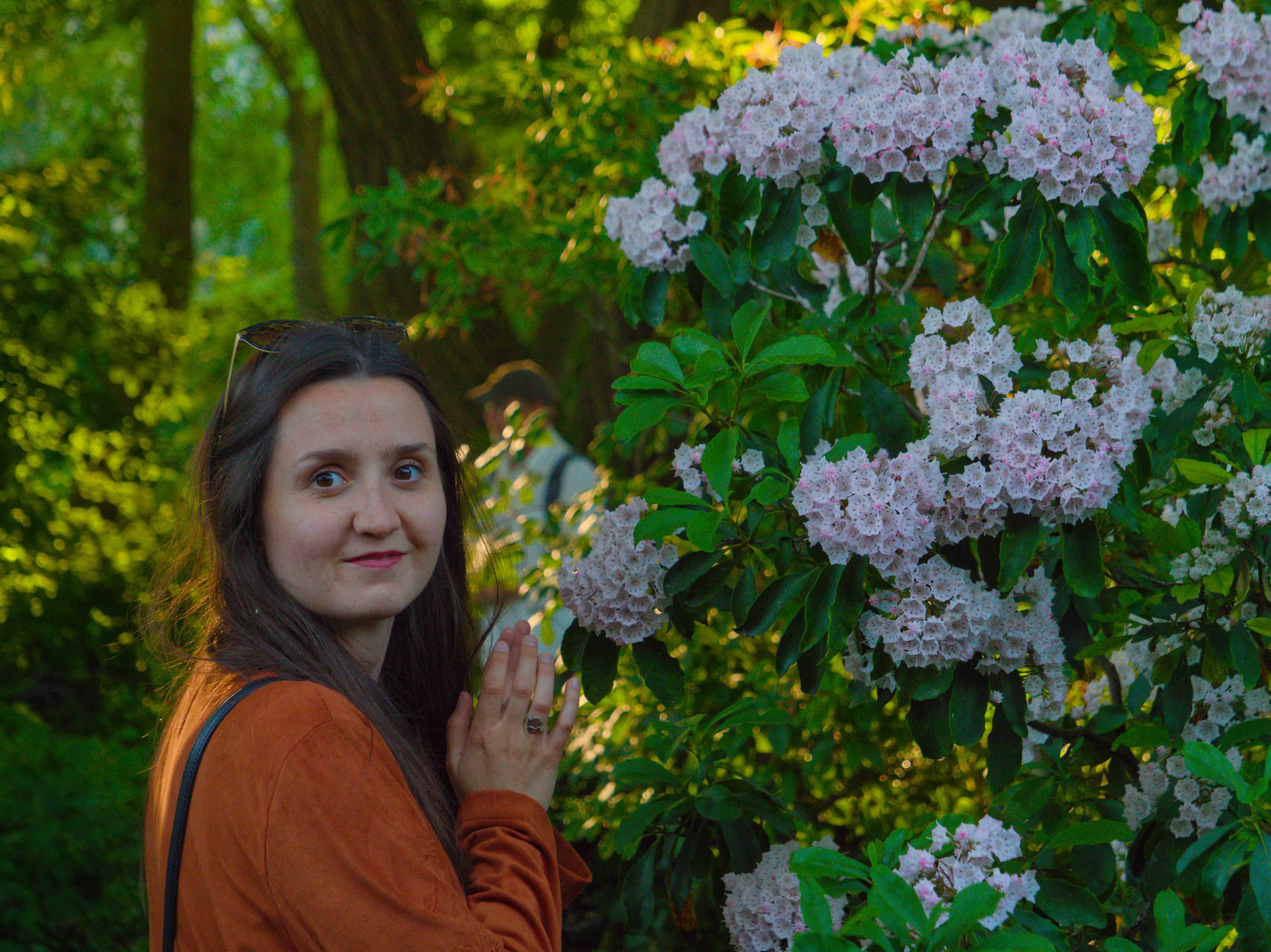
The HOROS PhD Programme gifted me with the opportunity to spend 6 months abroad as a part of my PhD plan. My stay abroad started in May 2021 at Lund University, one of the most prestigious universities of Sweden and recognized worldwide.
My research project was held at Dr. Diana Karpman’s group, at the department of Pediatrics, Clinical Sciences Lund, at Lund University. Dr. Karpman and her group target on the pathogenesis of infectious and inflammatory renal diseases causing acute and chronic renal failure. Within this topic, one of their main projects is focused on enterohemorrhagic Escherichia coli (EHEC) infection and the development of hemolytic uremic syndrome (HUS). My PhD is addressed towards deciphering the role of EHEC’s main virulence factor, Shiga toxin, and other host factors in the development of E. coli-induced HUS (eHUS), therefore a stay at Dr. Karpman’s group was a perfect choice where to gain knowledge and useful techniques to expand my scientific experience in this field. The subproject that I worked on during my stay in Lund focused on investigating the importance of kallikrein-kinin system for the development of eHUS.
My tasks were very well organized since the very beginning to optimize the stay in the lab, however, achieve the objective was just possible thanks to the help of the people from Dr. Karpman’s lab. They taught me the techniques, ordered the necessary material and took their time to frequently discuss with me my results, giving me at the end suggestions how to improve each experiment. Additionally, they also put effort in make me feel comfortable and welcomed in the team, and managed to convert me, a sedentary night owl, into an almost professional paddel player by training me weekly before work, making my stay in Lund remarkable also outside the lab.
Lund is a picturesque city located in the south-west of Sweden. The combination of its old history together with its young spirit obtained from the many students living there, makes Lund a very special place with a distinctive vibe. Despite being small, Lund has several beautiful parks, in which I spent most of my free time during spring and summer, the tulips at the Botanical garden in May were a spectacle on its own (check on the picture below). I will for sure come back in the future to visit this beautiful city again.
I am really grateful to HOROS PhD Program and my supervisor, Dr. Reinhard Würzner, for giving me this unique opportunity. Additionally, I would also like to thank Dr. Diana Karpman and her entire team for accepting this collaboration. It was a memorable experience.
Below find some pictures of my time in Lund:
Botanical Garden - Tulips in June

On rainy September 16, our cohort received a warm welcome at Sandoz, located in Kundl, Tyrol. Sandoz is a division of Novartis, and is specialized in the development and production of generics. These are small molecule drugs which resemble a reference drug of an originator company in all biochemical and biophysical properties. Once the 20-year term of an originator´s patent expires, generics can enter the market to create competition for a specific drug. This is essential to reduce the price of important medicines and increase their accessibility to people in need.
During the visit, students were organized in small groups and were familiarized with the general mission and vision of Sandoz as a company and the developmental process of a generic. All students had the exciting opportunity to be guided through an analytical lab of the pharmaceutical development department and the chance to ask questions regarding career prospects and what it is like to work in the pharmaceutical industry after obtaining a PhD. Some brain fuel in form of a lunch pack from Sandoz was much appreciated by everyone.
The day provided the students with many new insights into the industrial sector as an alternative to an academic career, and emphasized the importance to look at science from a different angle.
We want to give our special thanks to Stace, Selma, Peter, Olga and the rest of the team at Sandoz for this interesting and educative day!
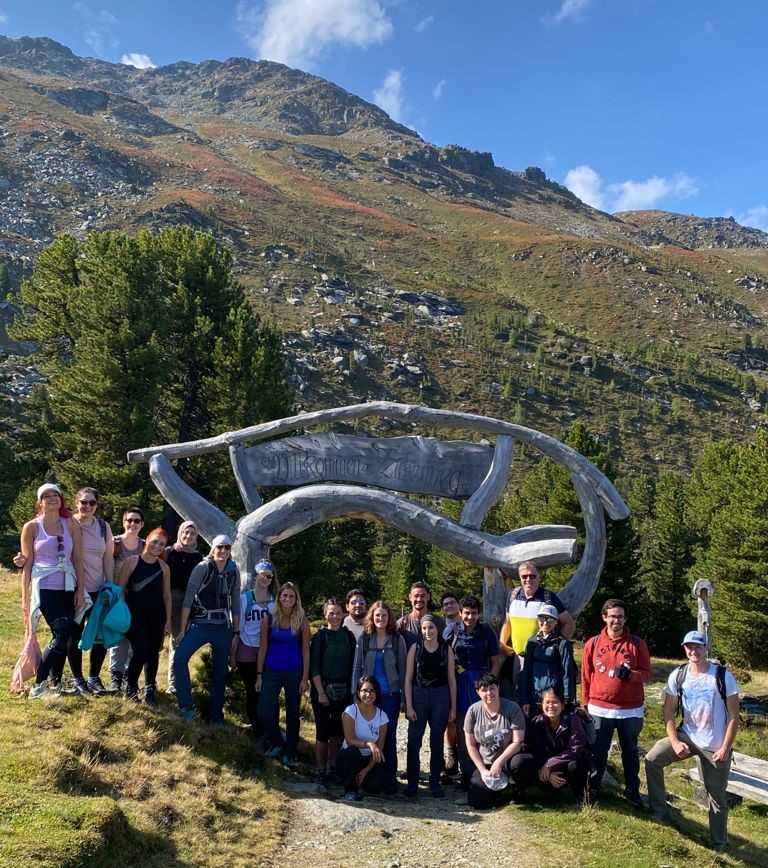
The HOROS, IIT and CORVOS PhD students spent a beautiful and sunny day hiking between Glungezer and Patscherkofel after a year of hiatus from our usual retreats. We arrived bright and early to the Glungezer mountain station, where we took the cable cars to the top to start our hike on the “Zirbenweg” trail. We were surrounded by beautiful panoramic views of the mountain ranges and we had loads of fun catching up with our fellow PhD colleagues. The journey to our first stop, lunch at Boscheben, took us almost 2.5 hours, but it was time well spent breathing in the fresh air and taking in the majestic scenery. Our lunch was followed by a talk by Reinhard, where he firstly welcomed the new HOROS PhD students into the program, and then updated us on the courses planned for next semester and the study abroad programs that will take place within the coming year. After we gave our feet a little break, we headed to our next stop, Patscher Alm. After a 45-minute walk, we arrived to Schutzhaus for coffee and some delicious cake. We had a great time soaking in the sun, cracking jokes, and fueling up on sweets. We finally headed down to go back to Innsbruck, some people decided to catch the cable car from the top all the way down, while others decided to hike an extra 45-minutes to the main cable station. It was a day filled with laughter and good company, and we would like to thank Silke, our very own HOROS/IIT PhD colleague, for planning this remarkable day for us. We hope that our next event is just around the corner!
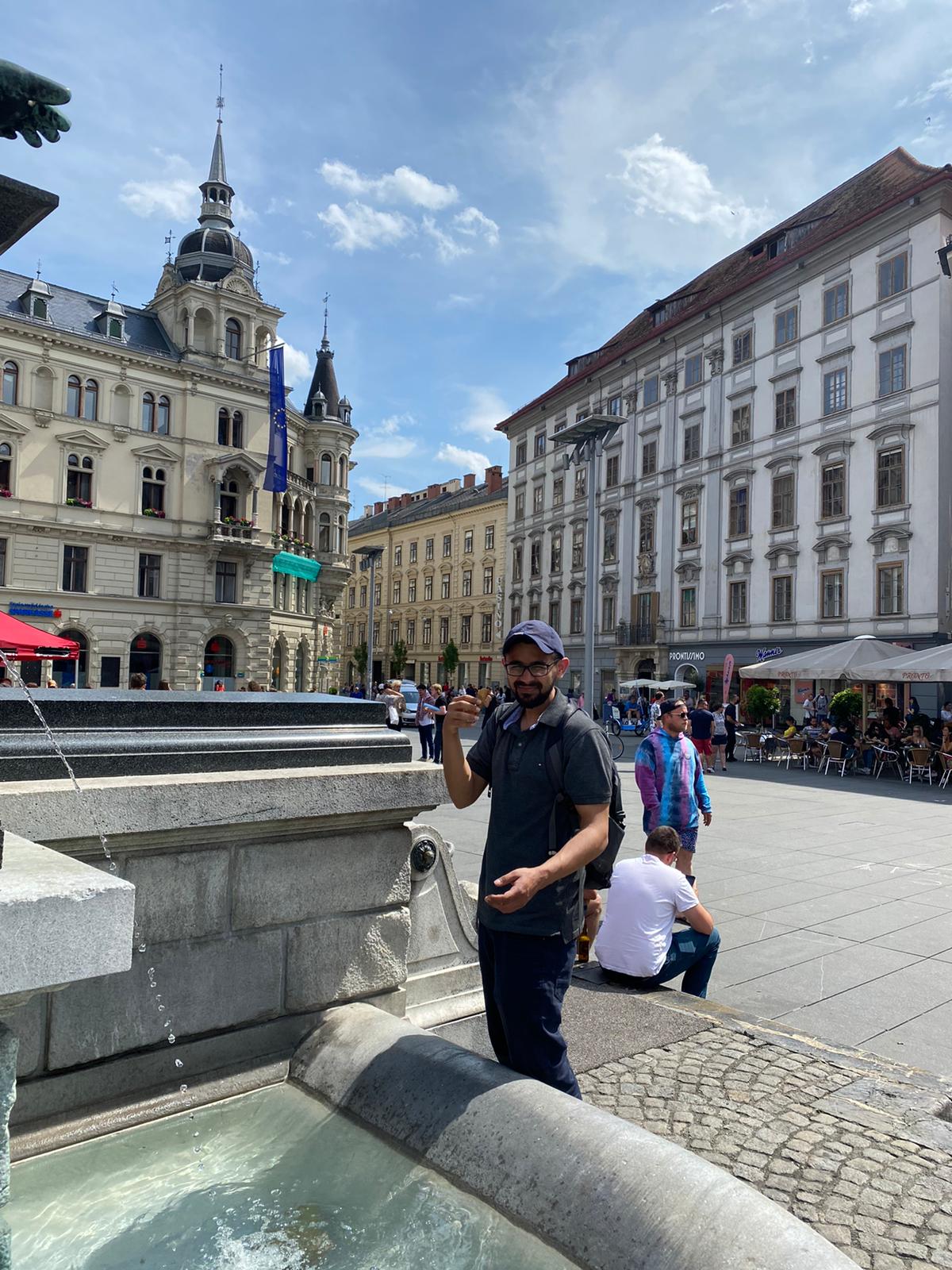
Due to the unwelcome COVID-19 pandemic, my Semester abroad took place in Graz, Austria, even though the original plan was to spend 6 months in Szeged, Hungary. This, however, didn't dampen my spirits, and I was excited about the possibility to spend time in Graz, the cultural capital of Austria. I started the Semester at the University of Graz under the supervision of Dr. Nermina Malanovic, who's group specialises in the field of antimicrobial peptides and their interactions with microbial cell membranes. Antimicrobial peptides are generally seen to exert their influence via cell membrane interactions, and a thorough understanding of the relationship between the two facilitates crucial insights into the peptides mechanism of action.
During the course of my PhD, we identified and characterized two short, positively charged antimicrobial peptides derived from the skin of the European Red Frog, which were extremely effective against the opportunistic human pathogen C. albicans. Our aim was to shed light on their precise mechanism of action, for which we felt Nerminas Group in Graz would be the most suitable, as we would be able to utilize her expertise on yeast cell membranes to determine how our peptides compromise the cell membrane to exert their antifungal effects.
Nerminas Group was extremely welcoming, and, Science aside, took it upon themselves to take me around Graz and show me not just the popular tourist attractions but also the small cafes and restaurants frequented by locals. Unfortunately, at the beginning of the Semester, we were not able to sit and eat or drink at these cafes and restaurants due to the strict lockdown, but this was possible after a couple of months, once the restrictions had eased up. However, due to Graz's lovely old town and the river or 'Mur' that flows through the heart of the city, the lockdown didnt feel so restricted, and I spent long amounts of time exploring the old town and walking along the river. Towards the end of my stay at Graz, we even planned a trip into the beautiful Styrian countryside, famous for its wine plantations, and had a lovely dinner at a traditional Styrian 'Buschenschank', which, roughly translated to English, means wine tavern, where we tried a host of different Styrian wines along with different finger foods, each suited to a particular type of wine.
All in all, despite the lockdown, it was a lovely experience, both scientifically and culturally enriching, and I thoroughly enjoyed my time at Nerminas Lab. I would like to sincerely thank the HOROS Doctoral Program, my Superviser in Innsbruck, Dr. Florentine Marx, and Dr. Nermina Malanovic, for organizing and facilitating this Semester for me.
Below are some pictures of my time in Graz:
Wine tasting in the beautiful Styrian countryside
Say cheese! Cheese platter to go with the wine
Walking through the narrow alleyways in the old town
Gelato in the city centre: perfect for a hot sunny day
Cycling up a hill on the outskirts of Graz: cycling down was a lot more fun!
With the new SARS-CoV-2 wave in Europe, a few days in quarantine and a negative test later I started my 3-months study abroad in November 2020 at the Hans Knöll Institute (HKI) in Jena. It was very kind and generous of the Department of Molecular and applied Microbiology (MAM) and its head Prof. Axel Brakhage to host me, especially in these times full of uncertainty. MAM´s two main areas of research are infection biology of fungi and natural product research.
To guide me further in my search of identifying a transcription factor (TF) involved in iron homeostasis and their respective DNA binding domain there was no better person than Dr. Peter Hortschansky, a wizard in Surface Plasmon Resonance (SPR) and a longtime collaborator of us. The entire MAM team including our HOROS alumni Thomas Orasch were very welcoming and helpful and the department itself is very well organized and their infrastructure is state of the art. Their weekly seminars were very informative giving a sneak peek in their staggering research projects. They also organized a small studio apartment with all the necessary amenities, just a 15-minute walk away from the institute.
Jena, often called the “Green Heart” of Germany, is a small but lively student town. You can relax here, party (if there is no pandemic), play sports and take advantage of a wide array of cultural programs and events. The Saale River runs through the middle and surrounding are the limestone hills, offering great opportunities for mountain hiking, cycling and other activities. As home of two universities, several non university research institutions and companies like Carl Zeiss, Jenoptik and Schott Werke, Jena is the melting spot for research institutes and economy. Distance is not a problem as everything is reachable either by foot, bicycle, or public transport. Jena is also a great starting point for excursions to Weimar, Erfurt, or the metropolitan cities Leipzig, Dresden, Berlin or Munich.
All in all, it was a wonderful experience although our unwelcomed friend made it difficult to experience Jena to its fullest. I was still able to learn new things, make new friends and most importantly learned to pipette correctly. I sincerely thank HOROS and my PIs for giving me this valuable opportunity to widen my horizon both as a person and as a future part of the research community.
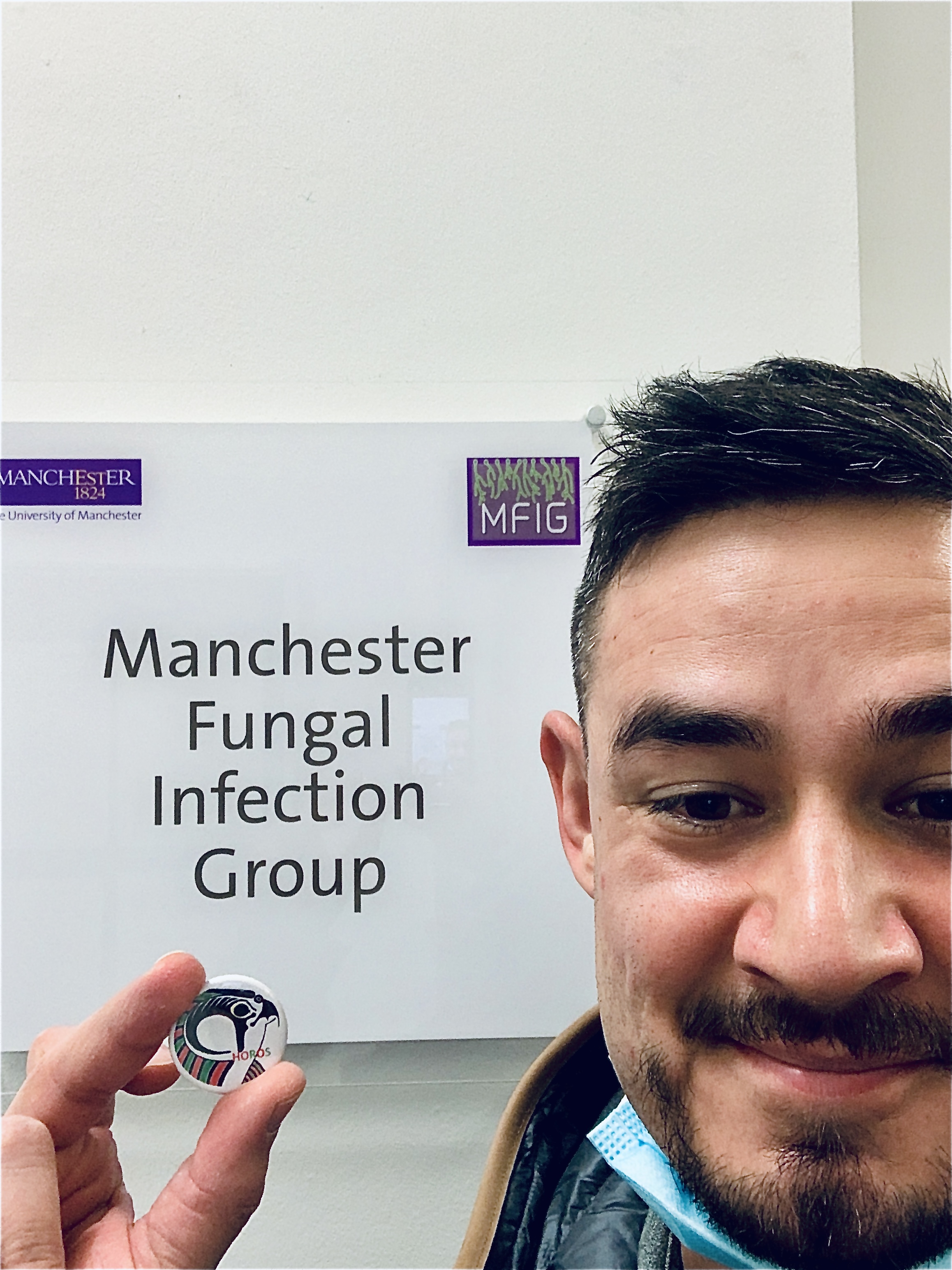
My HOROS study abroad period started in October 2020, and for the following 6 months my research is being conducted at the University of Manchester, UK. More specifically, I have the opportunity to work in one of the major groups for fungal research, the Manchester Infections Fungal Group (MFIG). MFIG is a center for excellence in fungal infection biology and translational antifungal research. It integrates its research with that of clinics and industry.
My work is being advised by Dr. Mike Bromley. His research team discovered and exploited mobilizable genetic elements in A. fumigatus which facilitated discovery of numerous essential genes. His group also developed high-throughput gene replacement strategies for A. fumigatus and chemical genetic screens to identify the mechanism of action of antifungal agents. One of my main tasks here is to characterize the unknown cellular target of an antifungal compound called VL-2397 – a compound that resembles a ferrichrome-type fungal siderophore. Our group in Innsbruck already showed that VL-2397 is also imported by the fungus using a siderophore transporter but still no mode of action is understood. The possible approaches for shedding a light in the cellular target of the compound is the screening of the transcription factors, kinases and/or transposon libraries for resistant clones.
The time here has been quite interesting and a bit challenging. Although lockdown measures have been quite strict during the entire time, I was able to continuously come to the lab. The workplace was well organized and time-structured to keep a safe working environment. The group members are able to organize on-line activities that are amazingly enjoyable and fun. The downside of these strict measurements is the ability to visit iconic places during the stay. I was able however to catch (virtually) a few pints with friends and colleagues and one could still go outside the city limits to visit parks and open spaces. Not to forget the amazing local dishes and iconic beverages of the region (the delivery service here did wonders!).
I am really thankful to the HOROS Doctoral program that provided me with such experience and also, to the entire MFIG team and PIs to allow to be involved in great research during this period. Although times are hard, I believe that, currently, being able to safely work is an underappreciated luxury.
Below are some pictures during my time in the UK:
CTF building (where the MFIG is located)
Construction of mutant libraries
Outskirts of Manchester overlooking Leeds (and waiting for the lockdown to be over)
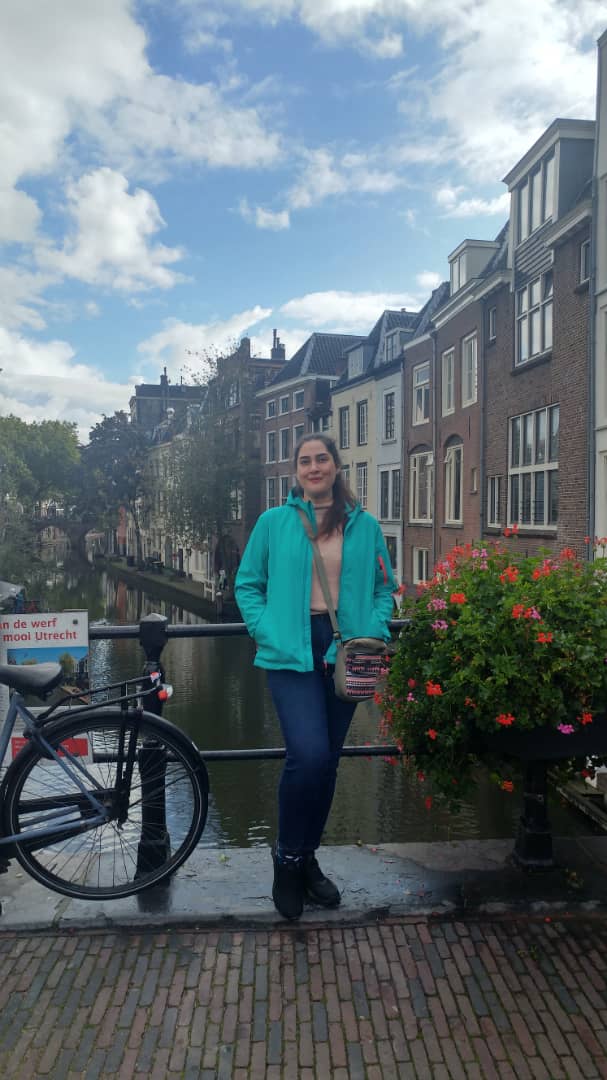
As a part of the HOROS doctoral program exchange study, I have the opportunity to work with Dr. Jos Houbraken at the Applied and Industrial Mycology group of the Westerdijk Fungal Biodiversity Institute. I started working at the Westerdijk Institute on the first of October 2020. Originally, my stay abroad was scheduled for spring 2020, but as soon as I arrived in the Netherlands in March 2020 the Covid-19 pandemic forced me to go back to Innsbruck. The second attempt now looks much better.
The Westerdijk Institute is well known for the high-quality collection of living fungi and related meta-data that contribute to the discovery and understanding of fungi and their biodiversity. Dr. Houbraken's group focuses on the biodiversity, phylogeny, and cell biology of fungi with an emphasis on the genera Aspergillus, Penicillium, Paecilomyces, and Talaromyces.
One of my PhD-projects has focused on the description of species within the Aspergillus section Terrei, and for this purpose there was no better opportunity for me than the lab of Dr. Jos Houbraken. Additionally, I am attending weekly research seminars of different groups, which give me a broader perspective towards understanding several aspects of mycology, including clinical and industrial.
I have found my supervisor and colleagues very welcoming and helpful in the work-place and even outside. If I need support in anything, everyone is willing to assist me. Unfortunately, due to SARS-CoV-2, we are not allowed to get together and having outside plans. But we have a refreshing time together at our lunch and coffee breaks. I never felt like a guest/student as they always involved me in all their activities, such as the new year and Christmas events.
Besides work, Utrecht is one of the most beautiful cities that I have ever seen, especially for the old canal (Oudegracht) and historical architecture in the city center. Also, the Dutch people are so friendly and relaxed. They take the work-life balance very seriously.
To sum up, I am happy with my stay abroad. It provides me the experience to understand how another lab works and how living is in another country. I would like to thank HOROS and my supervisor Prof. Lass-Floerl for this worthwhile opportunity. Also special thanks to Dr. Houbraken and Martin Meijer, my daily supervisor, and the Westerdijke Institute that accepted this collaboration.
Some pictures from Utrecht and my work-place there are provided, which explains more the beauty:
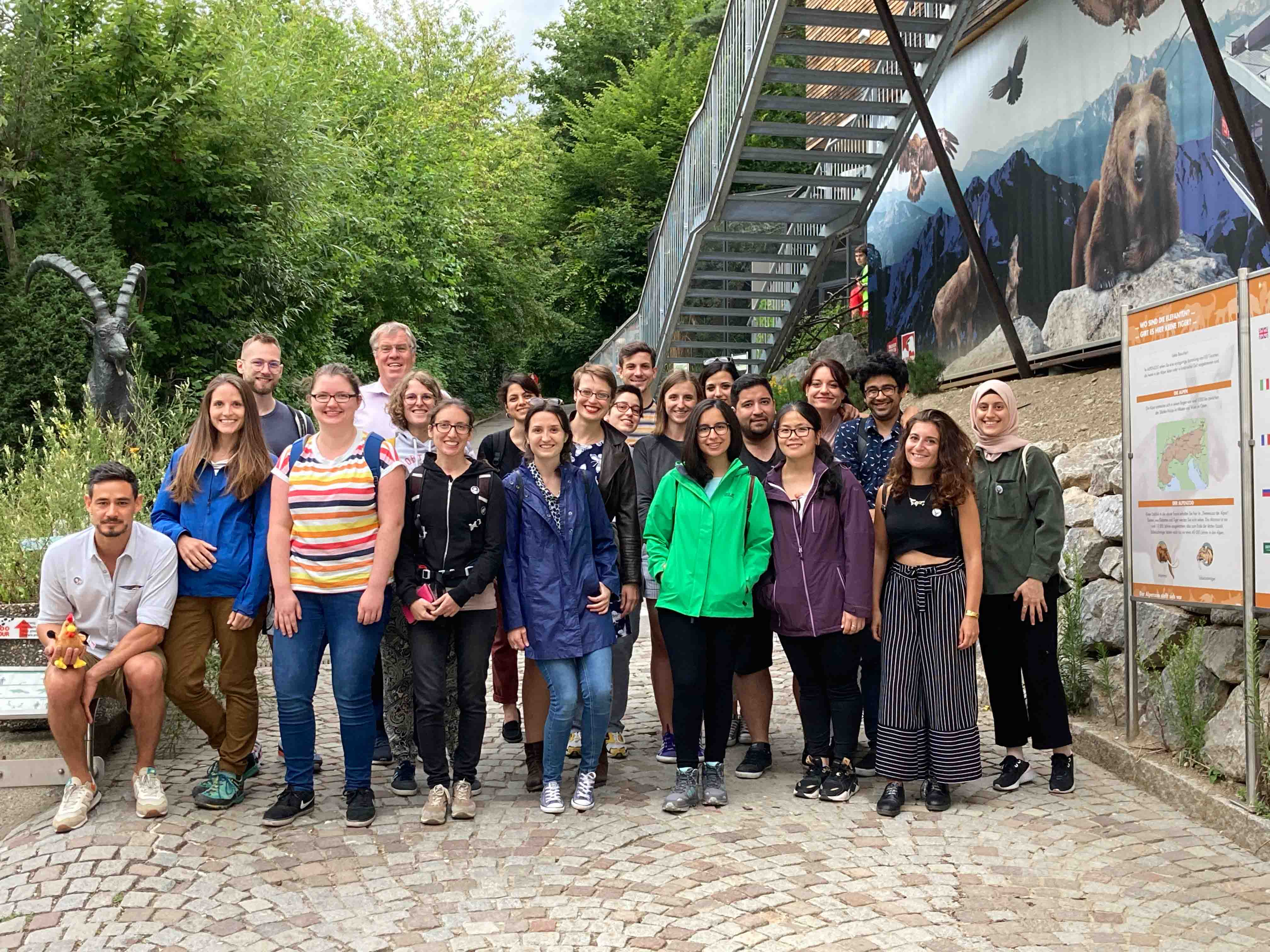
Due to the unprecedented times we have experienced during the COVID-19 pandemic, social gatherings were inevitably suspended. However, as the region of Tirol gradually saw a decrease in the number of cases, establishments in Innsbruck started to slowly open while adhering to safety measures. Thus, what better way to kick off our first social event than by visiting the Alpine Zoo! Our day was filled with delicious food, great company and a tour of some of the most interesting animals. We began our program with lunch at Gastgarten zur Eiche, were we had their specialty dish; Flammkuchen. This was followed by a talk by Reinhard, as he updated us on the PhD program courses for the next semester and study abroad plans. We then walked up to the Alpine Zoo, where we were greeted by the director of the zoo, Dr. André Stadler. The Alpine Zoo is unique in that it only showcases animals that are found in the Alpine region. André gave us an informative and engaging tour, as we saw some of the most endangered species, and we were also lucky enough to see a newborn baby lynx! Of course, we could not end the tour without taking a look at the godparent of CORVOS, the Corvus corax. After the end of the tour, we had enough time to take a look at the animals that we were personally interested in, until it was time to head to our next and final destination, dinner at Fischerhäusl. The restaurant was situated in the Old Town and it served exquisite traditional Austrian dishes. It was a special day as PhD students from HORORS, IIT and CORVOS were able to reconnect and spend a pleasant day together. We would like to thank our student representative, Franz, as well as Reinhard for organizing this day for us. We certainly cannot wait for our next event!
HOROS students were also busy during the SARS-CoV-2-crisis. Antonio Perez Hansen successfully defended his PhD thesis on 26th March. The defensio was held in the new Audimax of the Medical University of Innsbruck. It was a little strange, as only a very few HOROS students were present, due to a major quarantine in Tirol. The Audimax was almost empty and the examiners, thesis committee, family members and the students were distributed. However, Antonio did a great job and defended his work rare yeast species professionally – he can call himself “Dr. Perez-Hansen” – chapeau! Unfortunately, the celebration has to wait until we can team-up again. All the best for your next steps, Antonio!
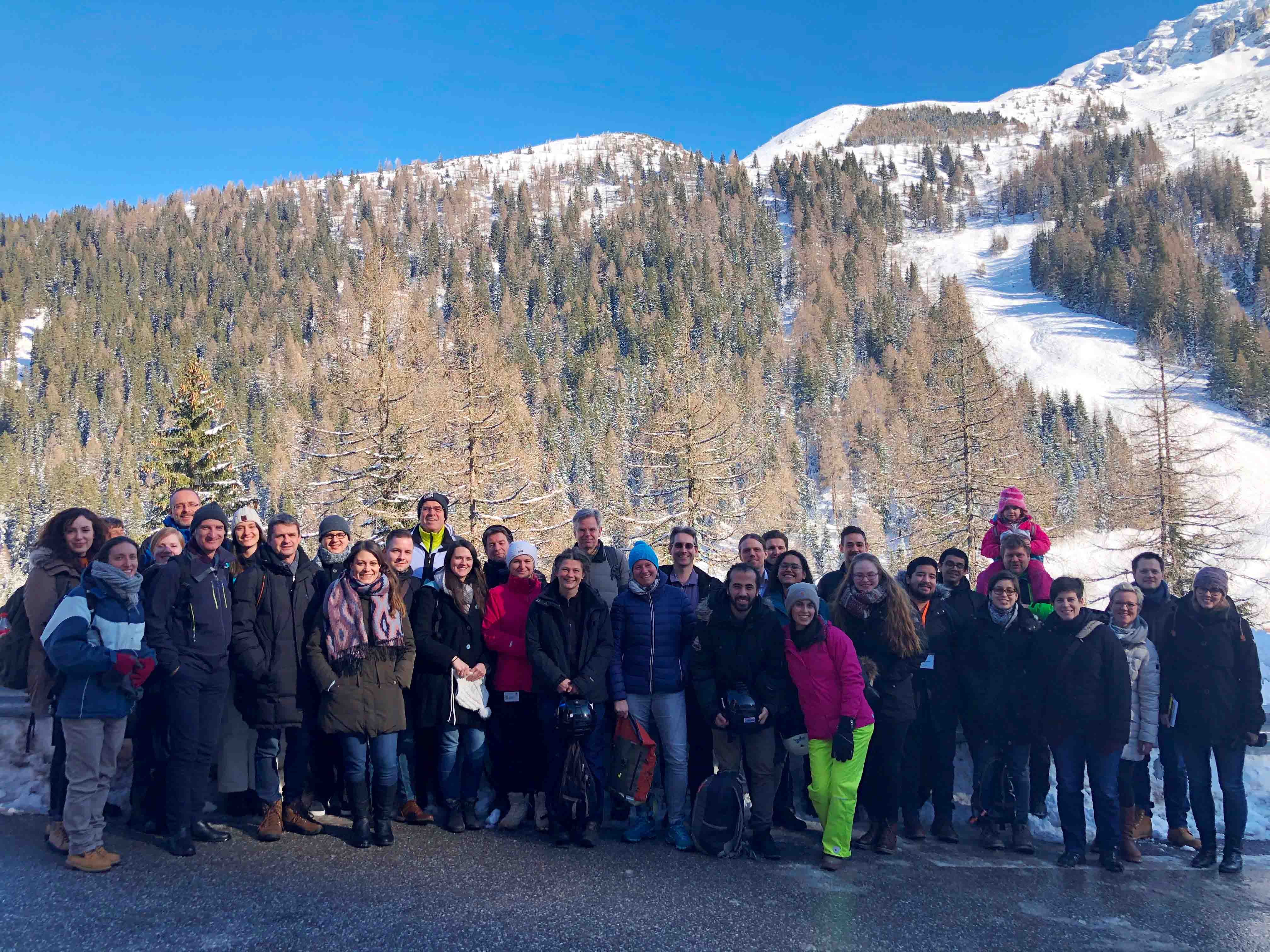
The working group “Eukaryotic pathogens“ of the German Society on Microbiology and Hygiene (DGMH) held its annual meeting 2020 in Innsbruck and Axamer Lizum – for the second time in Tyrol (after 2004). Reinhard Würzner was the congress president. As a co-founder, he created this working group more than 20 years ago. On 6 February almost a dozen short presentations evaluated the advances in basic research of eukaryotic pathogens. This working group is unique as it combines research in both, fungi and parasites. The additional benefit of this mutual approach is that these pathogens have much more in common, than, e.g., fungi and bacteria. The next day continued with topics on mucormycetes, opportunistic yeasts and plasmodia, crowned with the “Invited HOROS talk” on “Candidalysin” by Julian Naglik, King’s College London. He presented different functions of this multifaceted peptide. In the evening, the group went for a full moon night hike with torches to Hämmermoos Alm, Leutasch. After an educating lecture on pneumococcal vaccination, and a frugal dinner, we enjoyed the sledging experience down the slope.
The next day, this workshop continued in Lizum 1600, adjacent to the ski slopes of the Axamer Lizum. Another set of short presentations completed this highly interesting symposium, focusing again on Candida albicans, but also Aspergillus. Whereas most participants went straight back home, about a third enjoyed the mountainous surroundings with or without skiing adventure, followed by Aprés Ski in a bar tent near the slopes and a dinner with colleagues near the Golden Roof in the restaurant of the very same name in the Innsbruck Altstadt. Eight talks in the programme were submitted by Innsbruck researchers, four of them by HOROS students.
HOROS was one of the very strong influencers for the creation of the Marie Sklodowska Curie doctoral programme CORVOS (www.corvos.eu) and thus it appears logic to plan a visit to the patron of this pan-European endeavor, the raven in the alpine zoo of Innsbruck. CORVOS involves 10 universities and 10 other partners, such as hospitals, pharmaceutical companies and research institutes. The coordinator of CORVOS (who is also the speaker HOROS) has just renewed the godparentship for the raven. On the occasion of this visit, planned on the 6th of July, an internal review of the programme will be held to reveal possible areas of improvement.
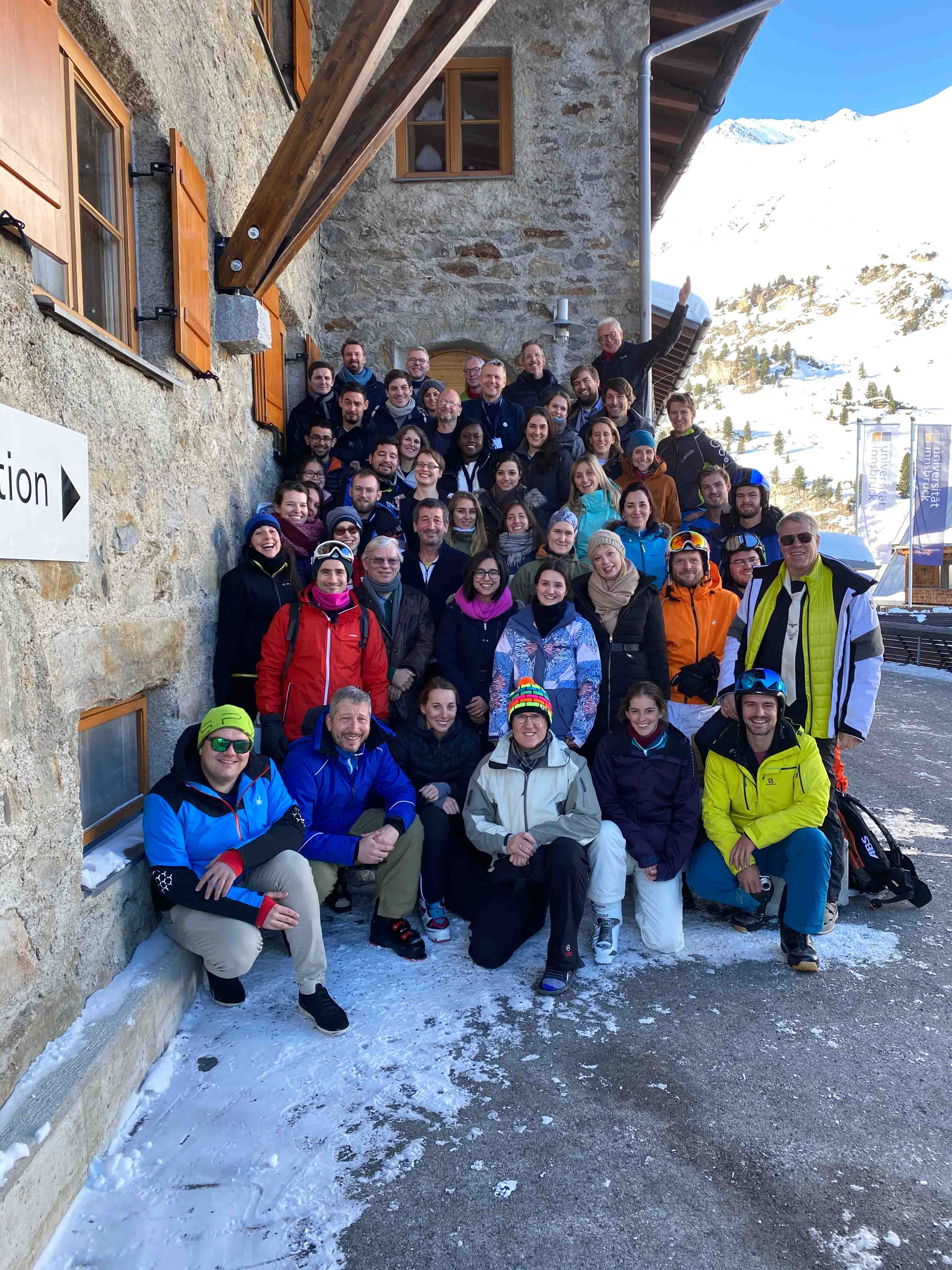
We started the year 2020 in a good manner with the annual retreat to Obergurgl, which took place from the 4th to the 9th of January. The retreat was attended by students from different PhD-programs: MOLIN (MOLecular fundamentals of INflammation, Graz, Austria), IRTG1911 (Immunoregulation of inflammation in allergy and infection, Lübeck, Germany), IIT (Infection, Immunity and Transplantation, Innsbruck, Austria) and HOROS. They were provided with the great opportunity to present and discuss their research in front of renowned scientists from all over Europe and even America, such as Akos Heinemann (Graz, Austria), Jörg Köhl (Lübeck, Germany), Stefan Niemann (Lübeck, Germany), Seppo Meri (Helsinki, Finland), Tom Eirik Mollnes (Oslo, Norway), Peter Garred (Copenhagen, Denmark), David Hildeman (Cincinatti, USA) and of course the HOROS faculty. The topics of the presentations were broad and ranged from intracellular infections to vaccination and treatment. In parallel to some presentations several topics about the upcoming PhD-program CORVOS (COmplement Regulation and Variations in Opportunistic infectionS) were presented by Reinhard Würzner (Innsbruck, Austria), our speaker & president of European Complement Network, and discussed with the CORVOS partners. Although the program of the lectures was quite challenging, there was still time for networking and team building with other PhD students and principal investigators. While some participants went for hiking or sledging, the majority enjoyed skiing at the beautiful surrounding slopes or helped each other out in learning how to ski. No matter what kind of sport was preferred, all of them were perfect for connecting with other scientists.
Finally we want to thank Reinhard Würzner and Marco Grasse for organizing this wonderful retreat. It gave us the great opportunity to meet and network with students of other PhD programs and renowned scientists.
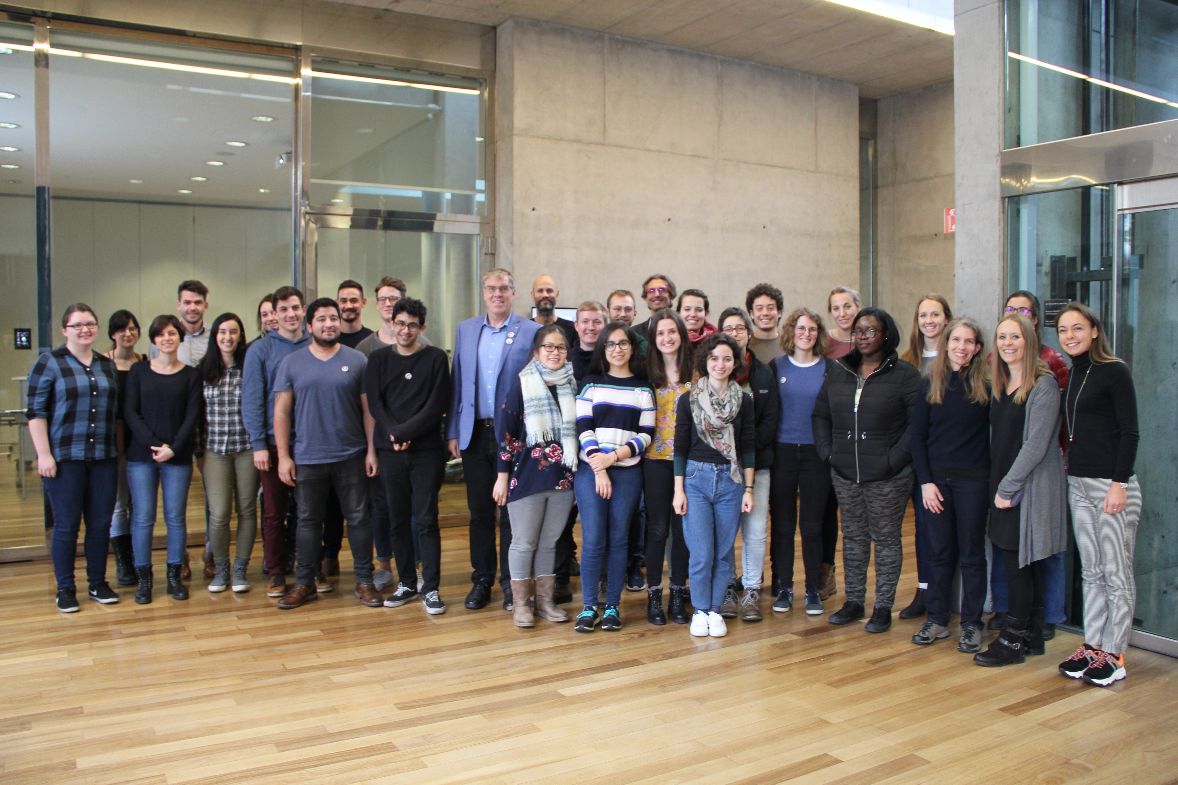
Within a few weeks from finishing this year, the course “Population-based studies in the –omics era”, organized by our EURAC research colleagues at Bolzano, was successfully held one more time. During the 28th and 29th of November we had the opportunity to learn how to handle and exploit our experimental data to the fullest: from how to properly handle samples and interpret results and further more. But since not everything in life is work, after the course we spent a good time enjoying Glühwein in the Christmas Market of this pretty city, followed by a delicious dinner in an Italian restaurant recommended by our warm hosts. Thanks a lot to our EURAC Research colleagues for all attention and for the nice lectures. Our warm thanks Reinhard for giving us the opportunity to attend this valuable course, we are looking forward for the next HOROS adventures!
.jpg)
Wednesday the 30th of October was earmarked for yet another HOROS social event, as our student representatives Franz and Natasha had organized a fun filled evening of bowling followed by a traditional Austrian dinner. We met at the Hollywood Bowling where two lanes were booked exclusively for us. We stayed there for two hours, enjoying the bowling and catching up with each other. After this, we built up our appetite with a short walk to the Theresienbräu, a popular Austrian restaurant, where we learnt about the different vaccination options available for meningitis thanks to a informative talk by Reinhard. This was followed by a delicious, traditional dinner. Thank you, Franz, Natasha and Reinhard for organizing this enjoyable evening for us, and we eagerly look forward to the next HOROS event!
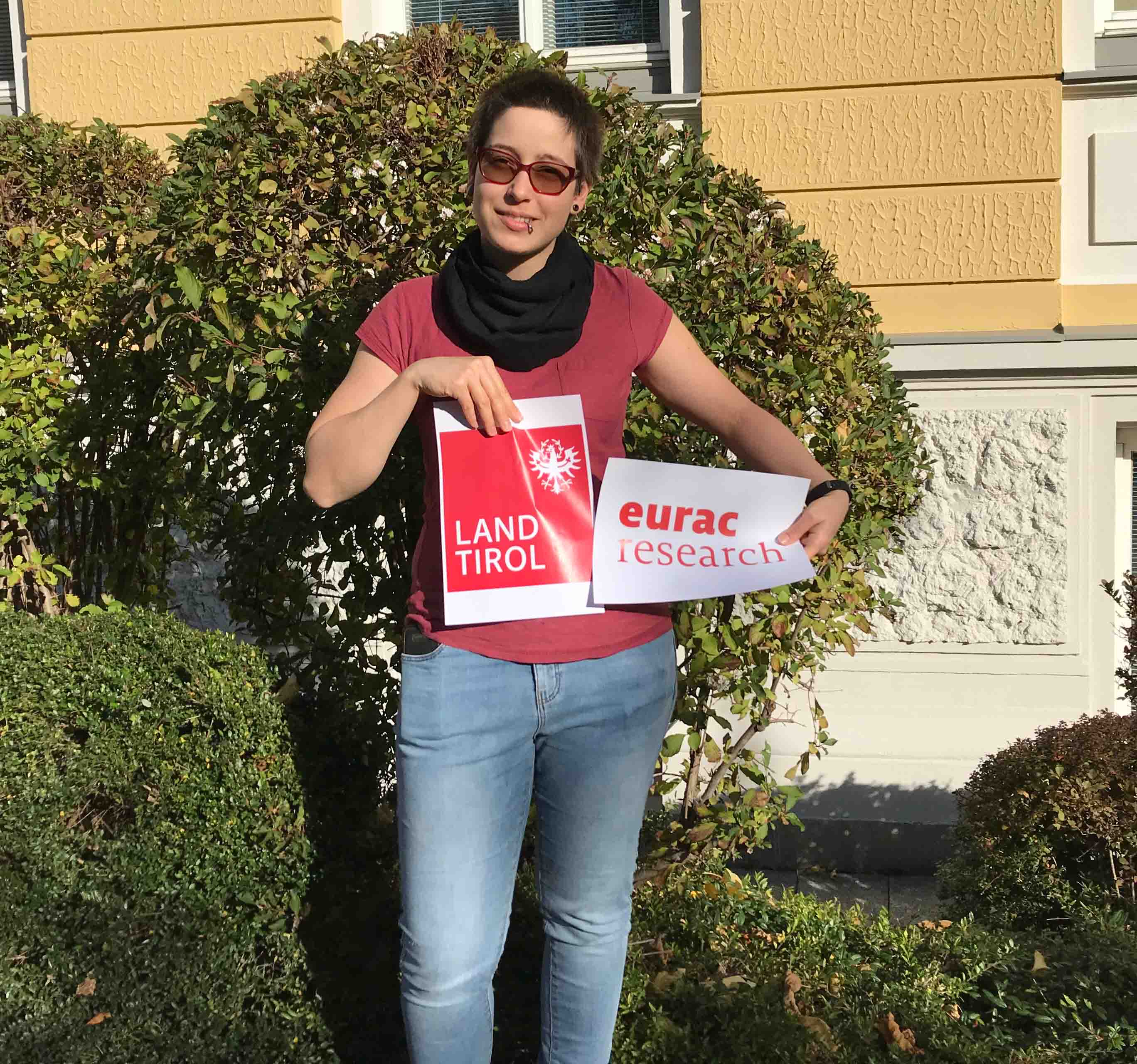
Already in the past, there have been several interactions between HOROS and EURAC under the wings of Land Tirol. Land Tirol is regularly sponsoring studentships for PhD students from Medical University of Innsbruck collaborating with EURAC in Bozen, including those studying in the FWF-funded PhD programme HOROS. Presently, Verena Harpf is a Land Tirol-funded HOROS PhD student, deciphering the host response against fungi, which cause severe and life-threatening opportunistic infections. Even more precisely, she is studying evasion mechanisms that fungi employ to escape the immune system. One of her dissertation committee members is the HOROS Visiting-Professor Peter Garred from Copenhagen, another one the EURAC senior scientist Dr. Christian Weichenberger. This set-up enables multiple international and interdisciplinary interactions.
A second major point of collaboration involves the teaching seminar that EURAC is offering for HOROS students. In 2017, 11 PhD students attended the graduate course on biobanks and population-based studies on 30th November and 1st December in Bozen. This year, EURAC is offering a similar seminar focusing on “Population-based studies in the -omics era”. This seminar will take place on 29th and 30th November with 20 PhD students from the programmes HOROS and IIT.
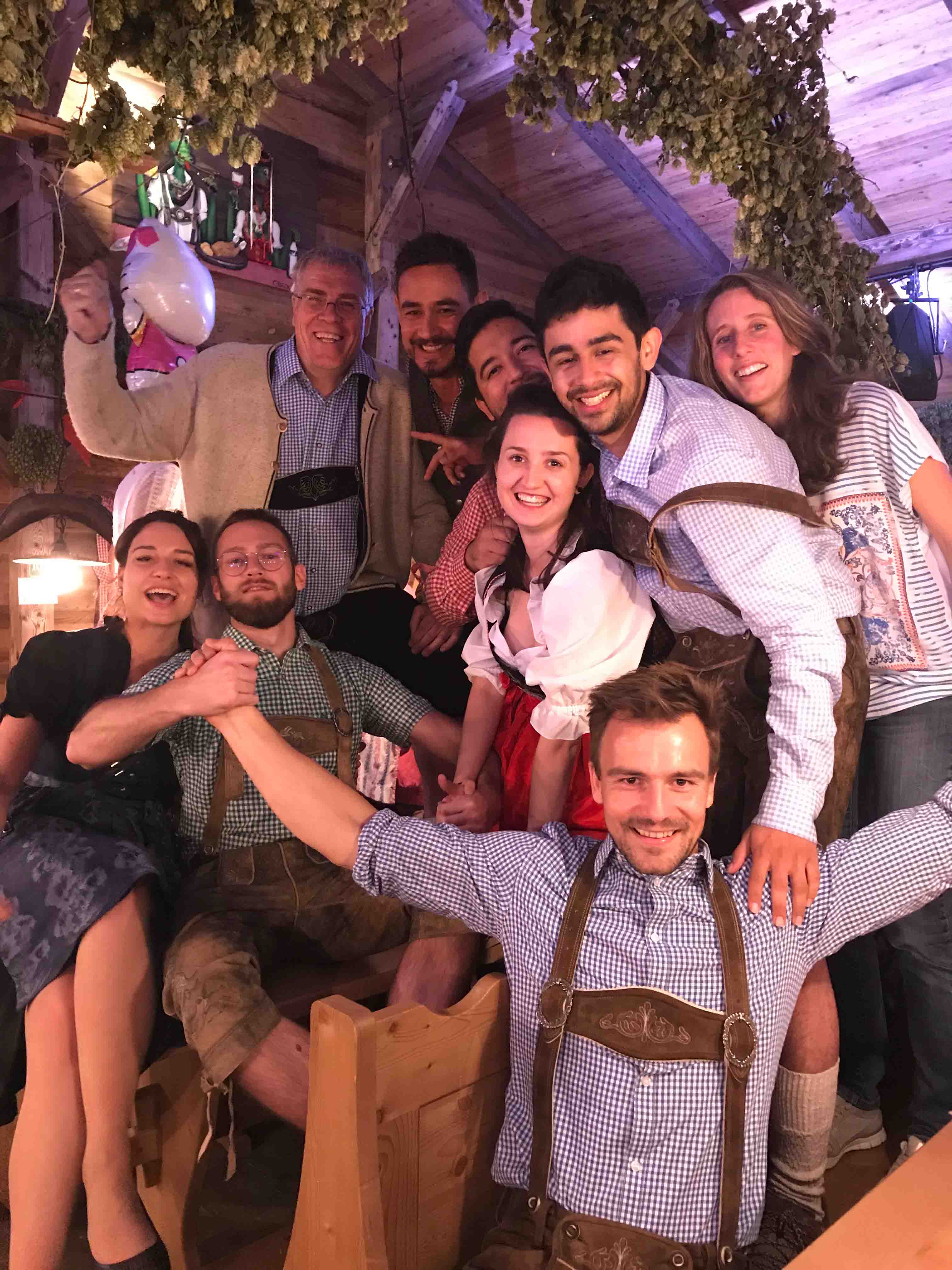
The southern part of Germany and some regions of Austria celebrate the start of the autumn. The most famous celebration is the “Oktoberfest” in Munich/Germany. HOROS and IIT students went to the “Herbstfest” in Rosenheim/Germany this monday, the 2nd largest autumn celebration. The former administrator of HOROS, Ben Hetzer, organized a bus shuttle that took us together with a few clinicians from the University Hospital after work to Rosenheim. We enjoyed the traditional food and beer, as well as a few rounds of roller coaster. Many thanks to Ben!!! It was a very nice social event and we are already looking forward to next year.
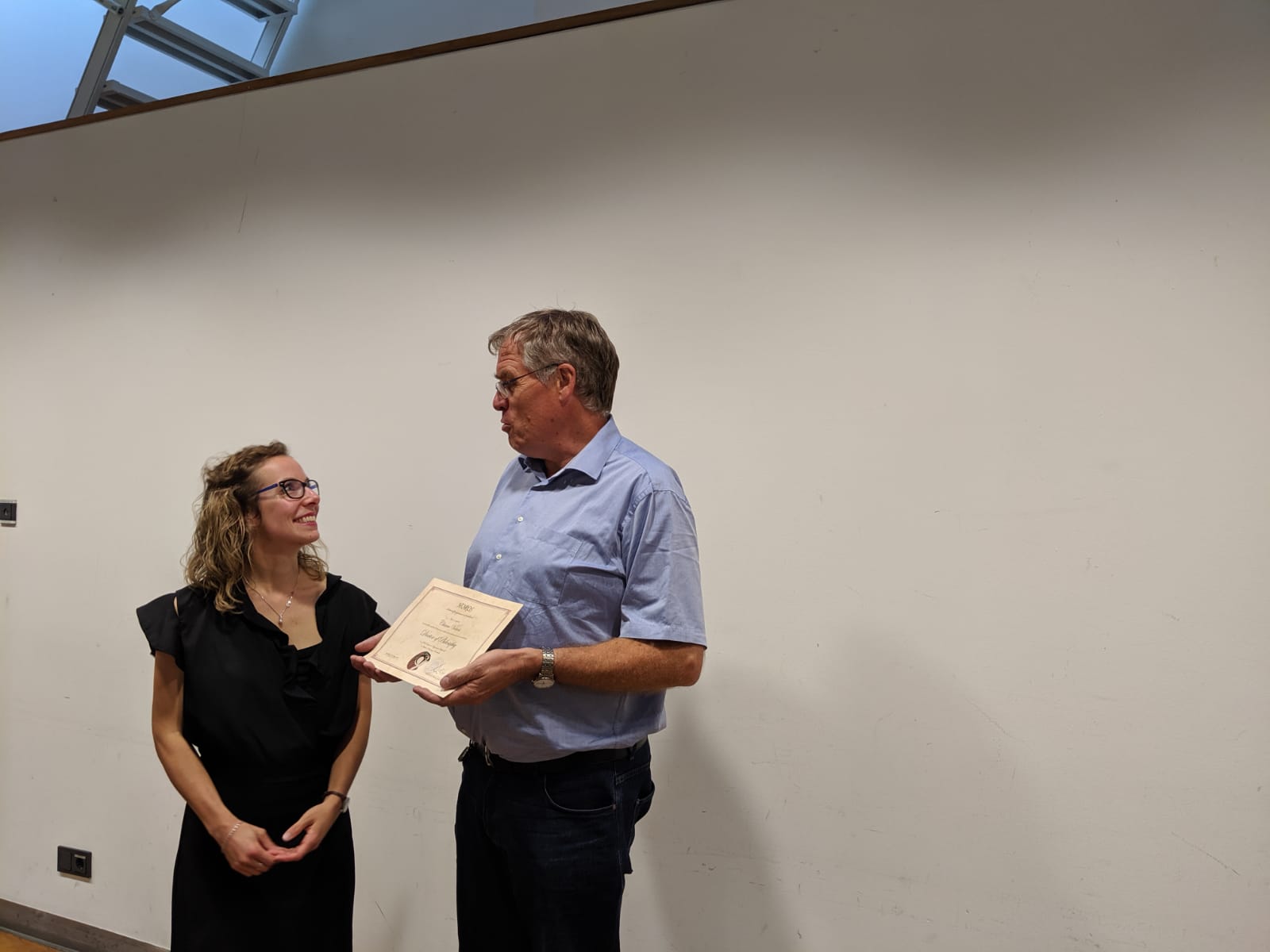
On the 13th of August 2019, Chiara Volani presented her work on the effects of iron imbalances on mitochondrial activity in vivo. She explained thoroughly how changes in iron levels must be tightly regulated. Otherwise, it would lead to a loss of energy production by mitochondria or to an overproduction of harmful substances (such as Reactive Oxygen Species). Her presentation was very well designed - through self-made drawings, she could bring the importance of her work across. The defensio was her last act at the Medical University of Innsbruck.
Chiara spent during her PhD some time at the EURAC in Bolzano. Now, she has the opportunity to continue her work there as a Post-Doc. We wish her all the best for her future and many great findings.
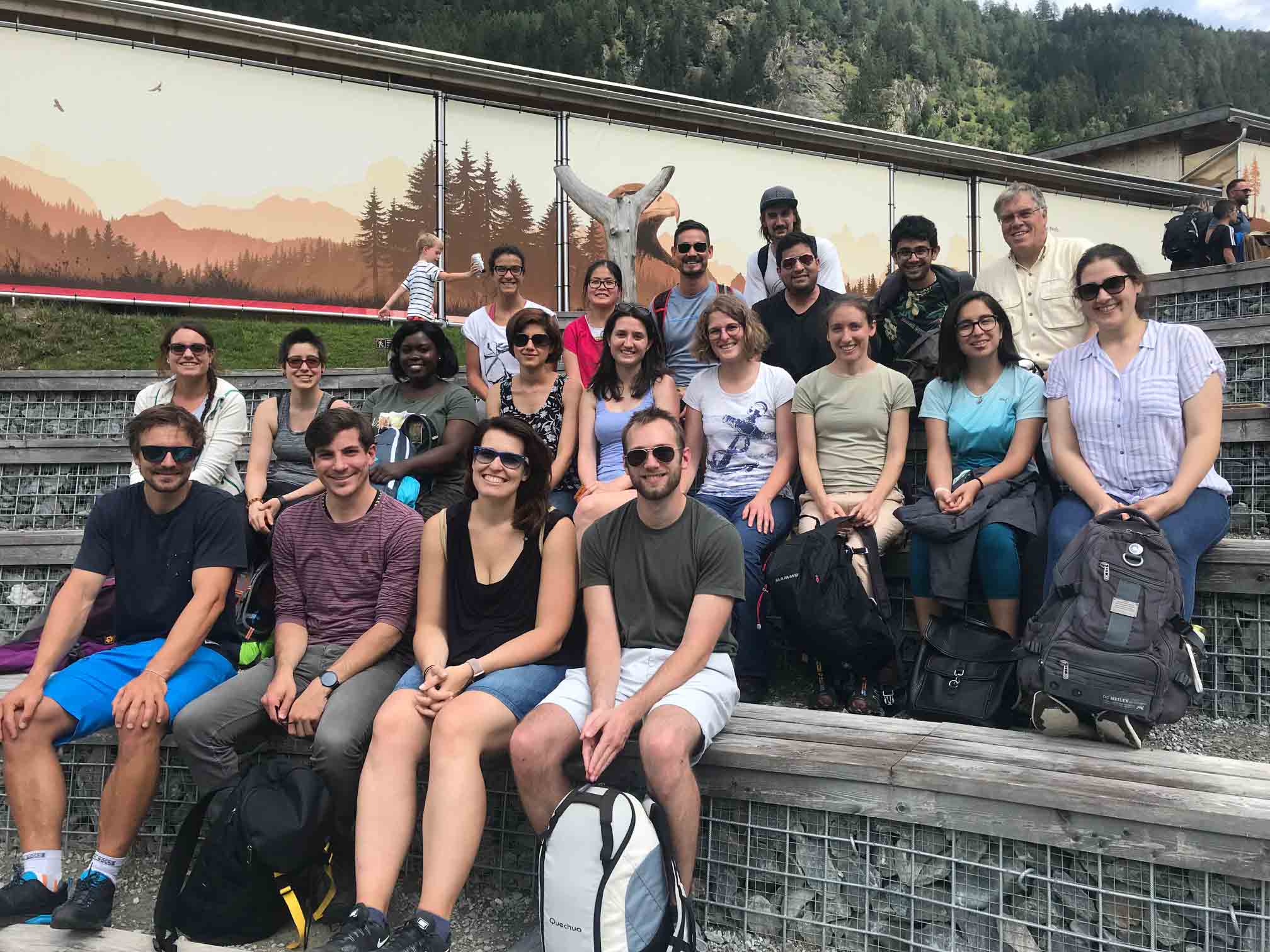
On the 5th of August the HOROS & IIT PhD students went on a one day summer retreat to Stuibenfall waterfall, Umhausen. The main agenda for the outing was to discuss matters concerning student affairs such as changes in the study plan, courses, student body leaders, as well as study abroad guidelines. It also served as a great opportunity to have a team building experience as a group.
The trip began by taking a bus ride to Umhausen, Ötztal, where we had lunch at the “La Cascata”, which is a beautiful restaurant overlooking a small lake. The restaurant’s outdoor platform along with the delicious cuisine made for a cozy, relaxing setting, which was just perfect for interacting and having general discussions. We then proceeded to go on a short walk towards the cross-birds park where we experienced a spectacular bird show showcasing the talents of the local “birds of prey” (see pictures). It was amazing to experience the eagles, falcons and vultures flying in such short proximity.
We later hiked uphill the Stuibenfall (stairs, 250m in height), which was quite a task. However, the reward for all the hard work was a lovely dinner and a pleasant evening at the top in the “Gasthof Stuibenfall”. Unfortunately, the retreat had to come to an end but we are undoubtedly grateful to Reinhard, Marco and Franz for organizing the event, but more importantly to FWF for sponsoring the entire trip. We eagerly look forward to the next one.
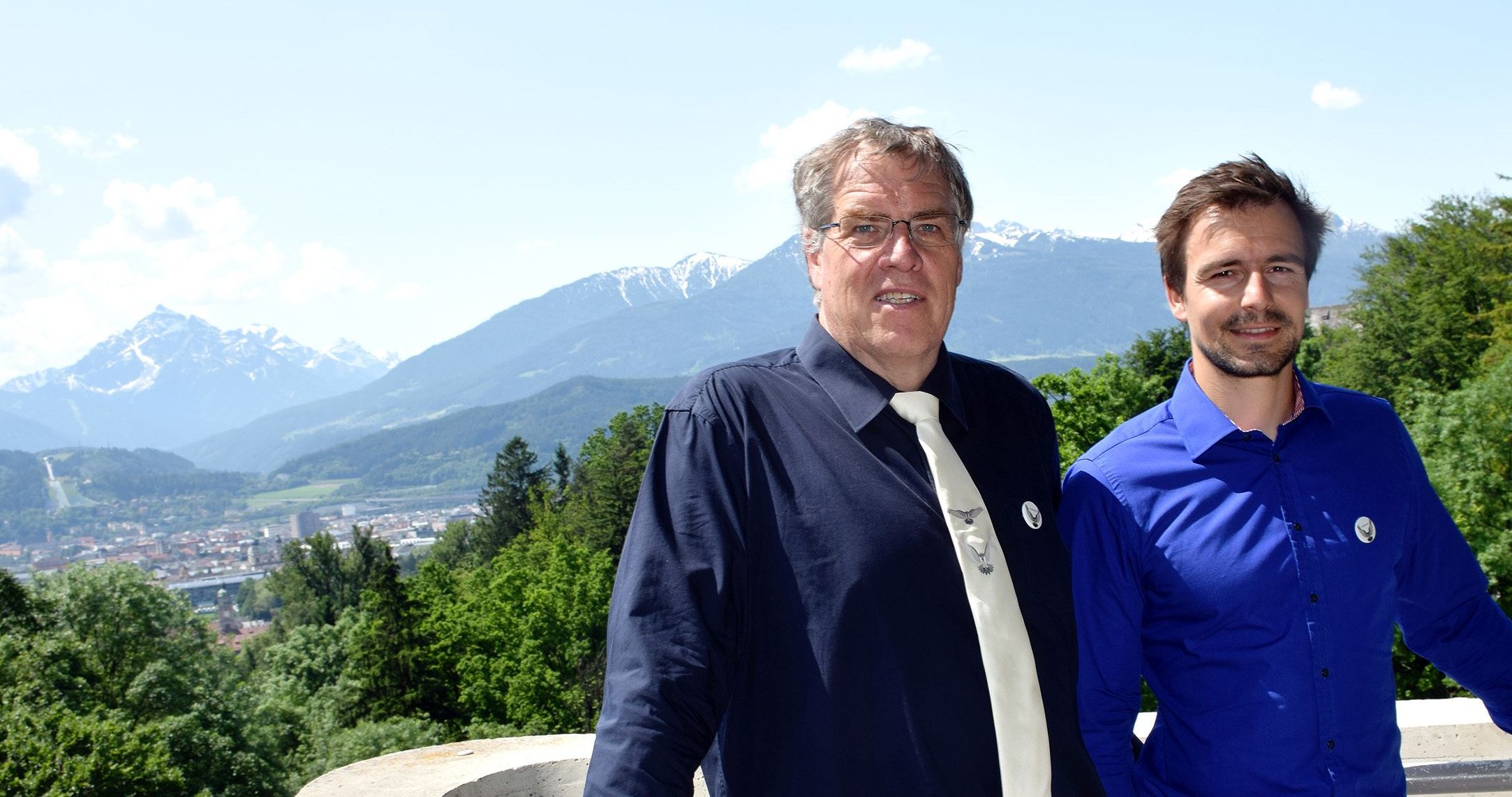
HOROS expects to internationalize its programme further due to the granted and now in part running CORVOS programme:
The European joint doctorate CORVOS, which was proposed for the MARIE SKLODOWSKA-CURIE ACTIONS Innovative Training Network (ITN) within the Horizon2020 project got approved! The acronym CORVOS stands for COmplement Regulation and Variations in Opportunistic infectionS. The pan-European initiative of 10 European universities, 3 biomedical companies, 2 research institutes and 3 hospitals comprises an interdisciplinary doctoral programme including cross-sectoral secondments and training in transferrable skills. CORVOS will educate 15 highly motivated PhD students to fill the current scientific gap in the understanding of the role of complement in opportunistic infections. The young scientists will become creative alumni equipped with entrepreneurial and clinical skills, making them attractive human resources to academia and industry alike. The European Union provides 4.1 mio. € for this ambitious programme, which will be coordinated from the Medical University of Innsbruck.
The speaker of HOROS, Reinhard Würzner wrote this proposal with the help of the HOROS administrator, Marco Grasse. Both are very excited about this fantastic scientific initiative and the positive perspectives for HOROS.
Picture: Reinhard Würzner (left), Marco Grasse; by D.Bullock
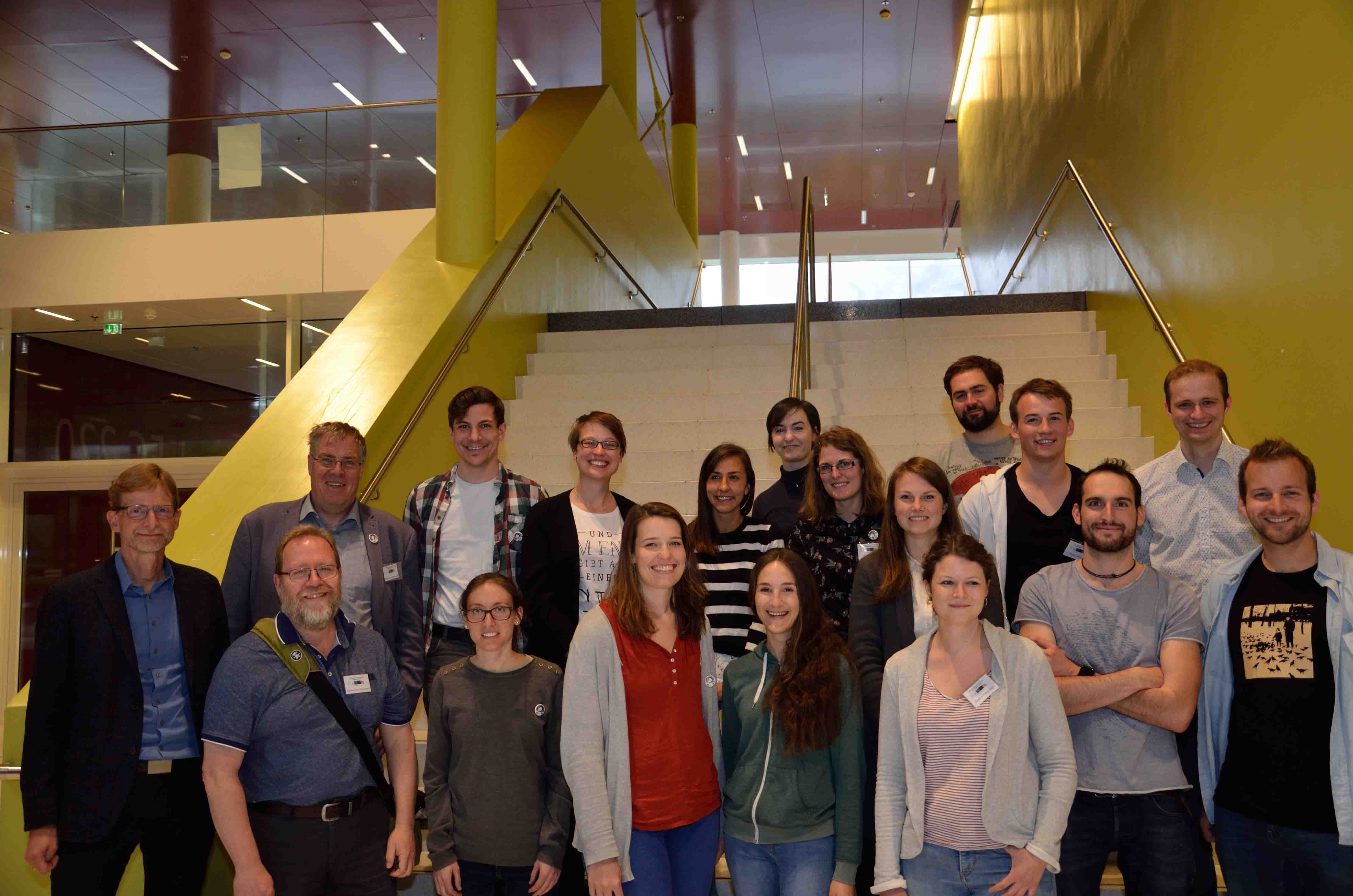
The Life Science PhD Meeting was held at the Centre for Chemistry and Biomedicine (CCB) in Innsbruck for the fourth time. From the 25.04-26.04 students and faculty members presented their newest findings in the form of flash talks, short oral presentations and posters. Members of HOROS and the IIT PhD programmes showed their latest achievements to the local audience, consisting mainly of PhD and Master students. Two members of the HOROS/IIT programmes were awarded for their great performance. Felix Grabherr was awarded for his short talk and Natascha Brigo received a prize for her poster presentation.
Next to the outstanding presentations of the students, each FWF funded doctoral programme invited a keynote speaker. The HOROS invited speaker was Ralf Amann from the University of Tübingen, Germany. He gave an interesting talk on "Next generation vaccines: Modifying immunity with novel orf virus vector concepts”. The meeting was a great success and we are looking forward to a follow up.
Picture: Organizing committee
On April 5th this year, HOROS said congratulations and farewell to Carina Miggitsch, who successfully completed her Ph.D. defense. Carina delivered a wonderful presentation on the distinct immune regulatory properties of human bone marrow adipocytes, an exciting and unique topic for HOROS and the Institute for Biomedical Aging Research. As well as a fine display of her in depth research and knowledge on adipocytes in the bone marrow, Carina was also able to share some of her incredible imaging skills, with images of immune cell-adipocyte interactions taken using the confocal microscope Cell Voyager CV1000. Carina, who is now 10 years in Innsbruck, a venerable Innsbruck local, would like to stay in Innsbruck working in either Academic or Industrial research. We wish her every success!
Erin Courtney Naismith successfully defended her Ph.D with an excellent talk on the 28th of March. Erin investigated the phenotype and function of innate and adaptive immune cell populations isolated from the human bone marrow and peripheral blood to highlight the importance of the long-term maintenance of immunological memory in the BM in old age. Her research focused on the accumulation of highly differentiated and senescent T and B cells, and their limiting effect on the maintenance or functions of other immune cells. HOROS and the Institute for Biomedical Aging would like to thank Erin for her excellent scientific input and her great enthusiasm. Erin, originally from Melbourne, enjoyed the last years in Innsbruck and would like to stay in Austria working in Industrial research. We wish you all the best for your future, Erin!
Today, it was the big day of Samyr. He defended his PhD in front of his examiners and the HOROS/IIT students. He studied Factor H binding molecules from opportunistic pathogens, such as Candida albicans or Aspergillus fumigatus. Among others, Samyr identified the “High affinity glucose transporter 1” (Hgt1p) from C. albicans as a Factor H binding, and thus also as complement evasion molecule. He published these findings in Frontiers in Microbiology. Samyr already has a postdoc position at the University of Lübeck, Germany. We wish you a great scientific career, Samyr!
Seven new HOROS students started their PhD with the beginning of March. We welcomed them with a sledging event. We drove by car into the Sellrain and walked 45min to the beautiful Gleirschalm. Already the walk to the hut was very cosy - we had an excellent winter-wonder-land with lots of snow. The atmosphere in the hut was also amazing. Prof. Würzner gave a small lecture on tick-borne encephalitis, before we had our well deserved dinner. The way down on our sledges was great fun. The new students liked it a lot.
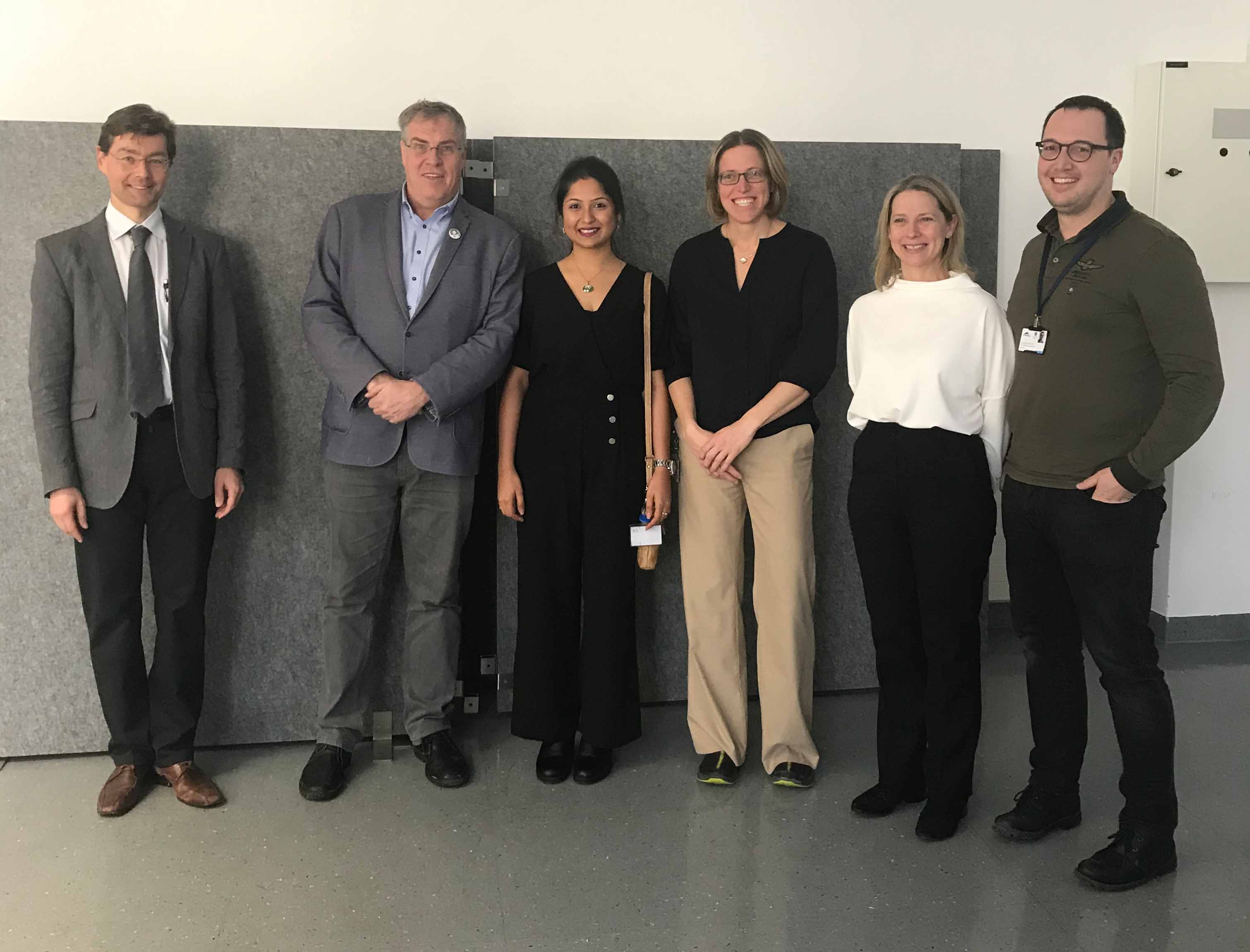
Another great HOROS student finished today. Sneha defended her thesis with an excellent talk and question/answer session afterwards. Sneha investigated interaction of virulence factors from enterohemorrhagic Escherichia coli bacteria and the innate immune system. She mainly focused on E. coli produced Shiga toxin 2a, which belongs to the worldwide most potent toxins.
Sneha will take some time after her PhD for enjoying her family back in India. She will come back to Europe, soon - We wish you all the best for your future applications!
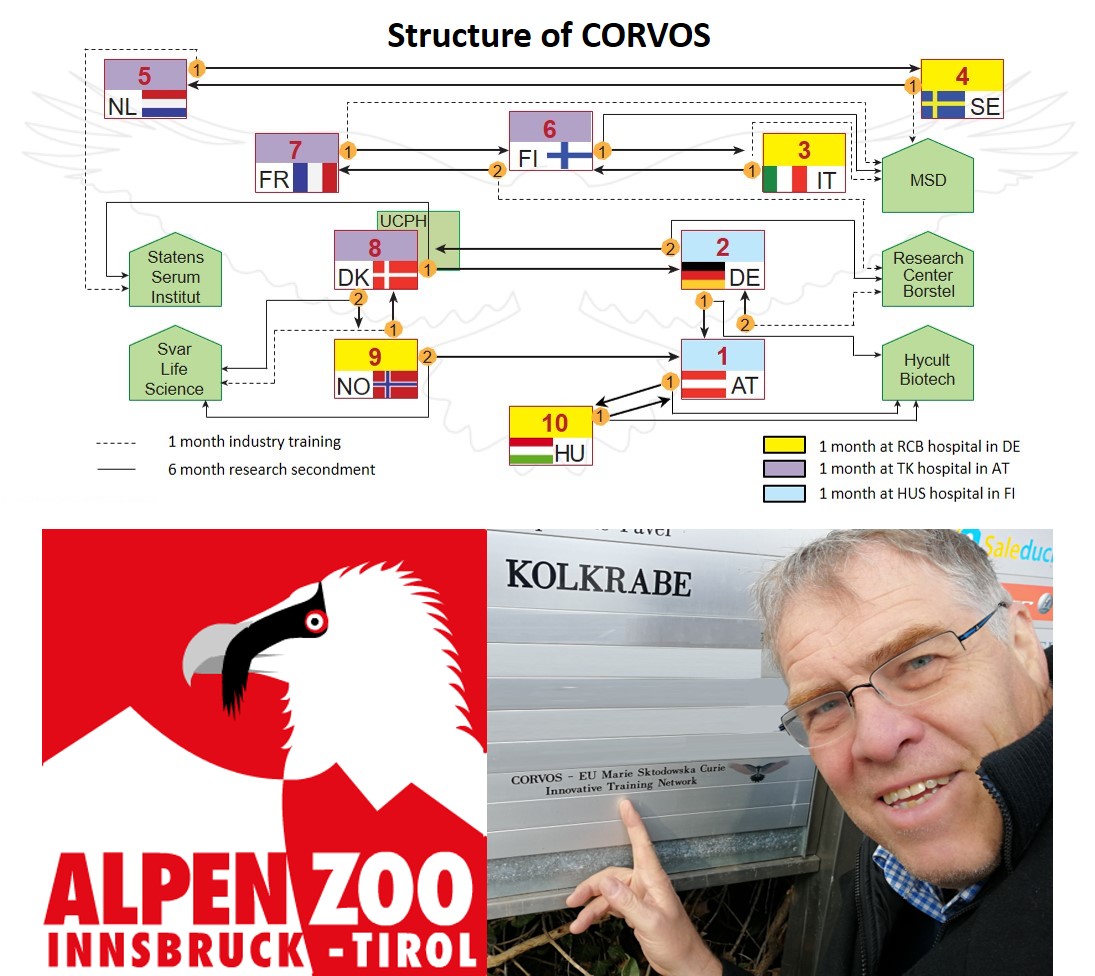
Europeans top complementologists joined forces and proposed an Innovative Training Network (ITN) for the MARIE SKLODOWSKA-CURIE ACTIONS within the Horizon2020 project under the acronym CORVOS, for COmplement Regulation and Variations in Opportunistic infectionS. This proposal consists of a European network of 10 universities, 3 biomedical companies, 2 research institutes and 3 hospitals and is aiming to train and educate 15 international PhD students in the field of complement and opportunistic infections. Opportunistic pathogens cause primarily infections in immunocompromised subjects and are the top 2 killer worldwide. Complement as a chief conductor of innate immunity plays a crucial role in immune defence against opportunistic pathogens. Research in this field is exploding, but also suffers from poorly coordinated intersectoral training of new researchers.
The CORVOS doctoral and research training programme is ultimately aiming to enable intersectoral research together with the transfer and exploitation of knowledge required to develop diagnostic and treatment options to save millions of lives currently lost to opportunistic infections.
The partners of CORVOS are: (1) Medical University Innsbruck, (2) University of Lübeck, (3) Humanitas University Milano, (4) University of Lund, (5) Utrecht University, (6) University of Helsinki, (7) Sorbonne University Paris, (8) Region Hovedstaden/University of Copenhagen, (9) University of Oslo, (10) Semmelweis University Budapest; as well as: Hycult Biotechnology, MSD Finnland (Merck&Co), Svar Life Science AB, Statens Serum Institut, Research Centre Borstel (RCB), RCB-Clinics, Hospital District of Helsinki and Uusima and Tirol Kliniken.
Prof. Würzner, the proposed speaker of this submitted European doctoral programme, took over the godfathership for a raven (German: Kolkrabe; Latin: Corvus corax) in the Alpine Zoo Innsbruck - named CORVOS, godchild and patron of programme. We keep fingers crossed and would very much appreciate the acceptance of this wonderful proposal.
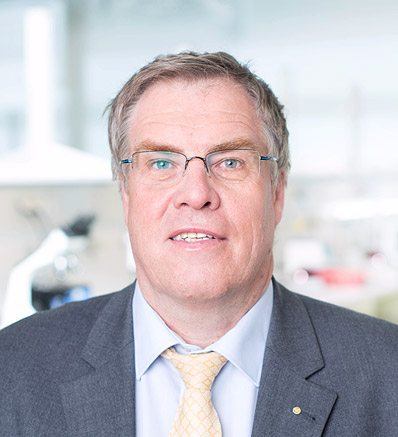
Our speaker, Prof. Reinhard Würzner has been announced as director of PhD studies of the Medical University Innsbruck. His main duties are coordination and development of the current PhD studies, organization of activities across the different programmes, as well as to ensure the sustainability of all the PhD studies. Congratulations - we are proud to have him as our HOROS speaker!
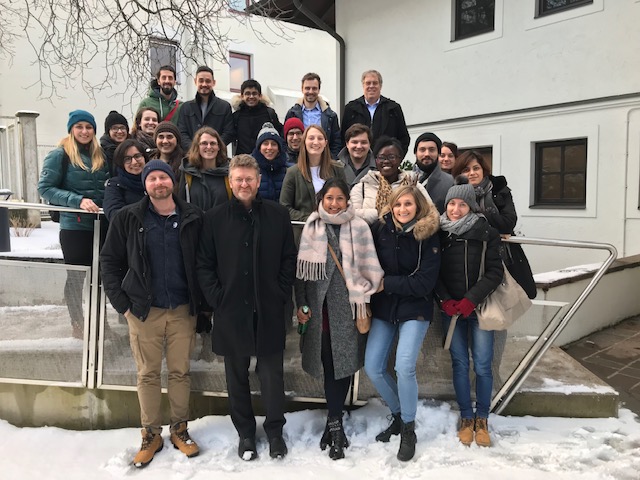
On Tuesday the 15th of January the HOROS PhD students embarked on an educational excursion to the headquarters of Sandoz Austria GmbH, located in Kundl, Austria. Sandoz is a division of the pharmaceutical giant Novartis whose primary focus is on generic pharmaceuticals and biosimilars - from research and development all the way to production. This trip was a valuable opportunity to understand the layout and functioning of a large pharmaceutical company, and perfectly complemented the last field trip to Montavit, a relatively small, family owned pharmaceutical. We were divided into small groups, each headed by a senior employee who took us for a tour of all the different departments of Sandoz, including R&D, analytics, quality control, and production. Everyone had the opportunity to interact with the staff, understand the working principles of the equipment used, and, most importantly, ask all the questions that their curious minds could come up with.
This was followed by a scrumptious lunch buffet, after which Sandoz organized an extremely helpful interactive session, where the heads of all the different departments gathered into one room with the students for a ´behind the scenes´ discussion about their respective roles in the company. Trips like this play a crucial role in the all-round development of the PhD students, as it helps to bridge the gap between academia and industry and provides them with the opportunity to network and form connections that would be very useful further down in their careers. A big thank you to Sandoz, who hosted us very kindly with huge efforts – we really enjoyed this day. Also many thanks to the FWF, Reinhard Würzner, Franz Melzer, Marco Grasse for organizing this fascinating excursion.
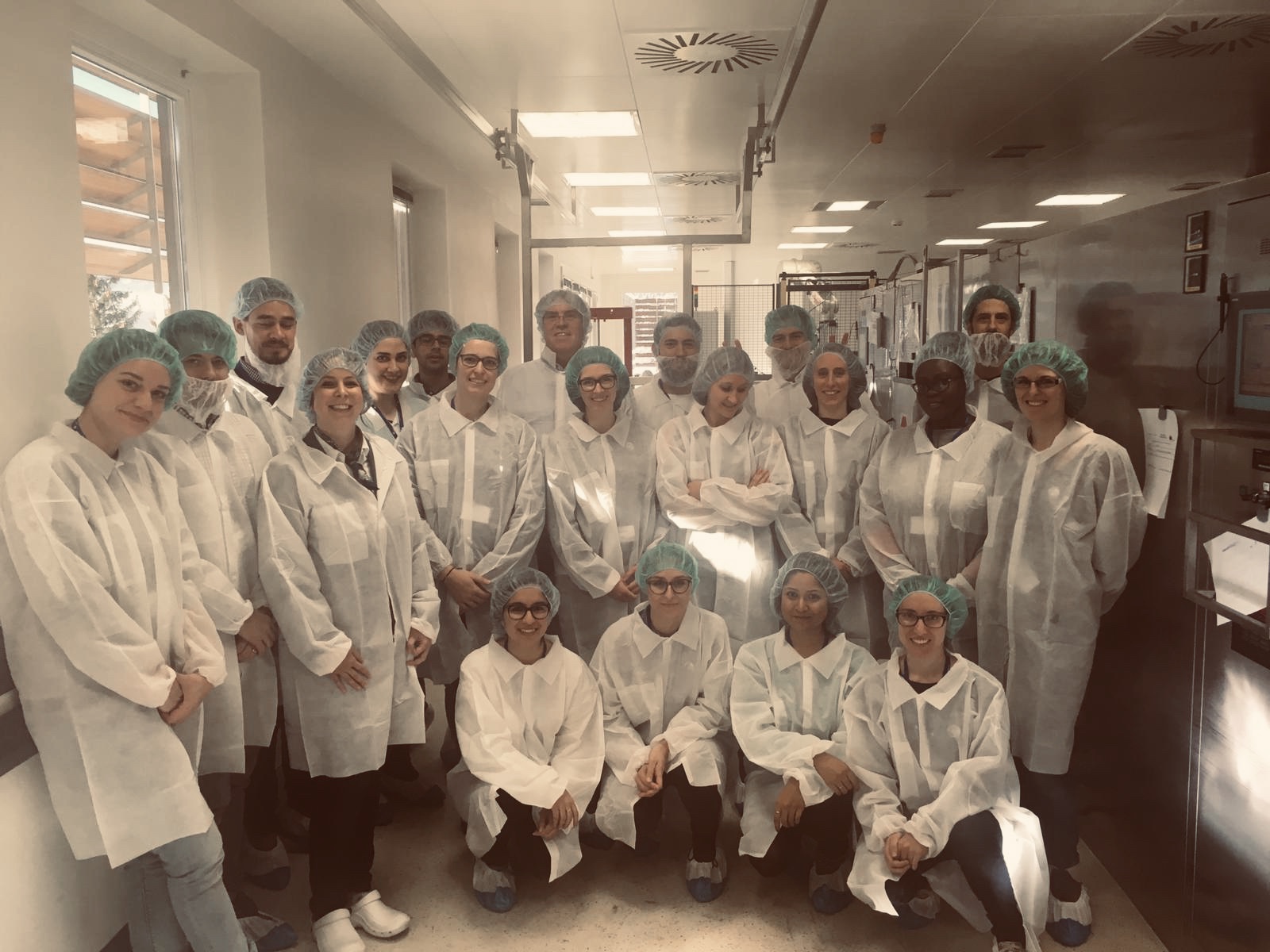
On Tuesday 18th of December, the HOROS PhD students went on a trip to Montavit. Montavit is a pharmaceutical company established in 1945 and its headquarter is located in Absam. This trip has been very beneficial as it gave an insight onto how a successful industrial family business in Tyrol is structured and managed. Katherina Schmidt, a general manager and owner of Montavit, introduced the company to us. We were then guided through the company’s campus to see the machines, robots, manufacturing processes and the general work environment in a pharmaceutical industry. The students had a chance to also meet Dr. Oswald Mayr (owner and general manager of the company) who kindly explained his experiences and how the company was first developed. Also, they invited HOROS for lunch where further discussions took place.
The visit to Montavit provided a great opportunity for HOROS students to experience a different work environment other than academia. In addition, like other brilliant events organized by HOROS, this trip allowed students to do some networking which would be very helpful for their scientific career. Many thanks to the FWF and Reinhard Würzner for making the trip to Montavit possible and as a valuable event for the HOROS Ph.D. students.
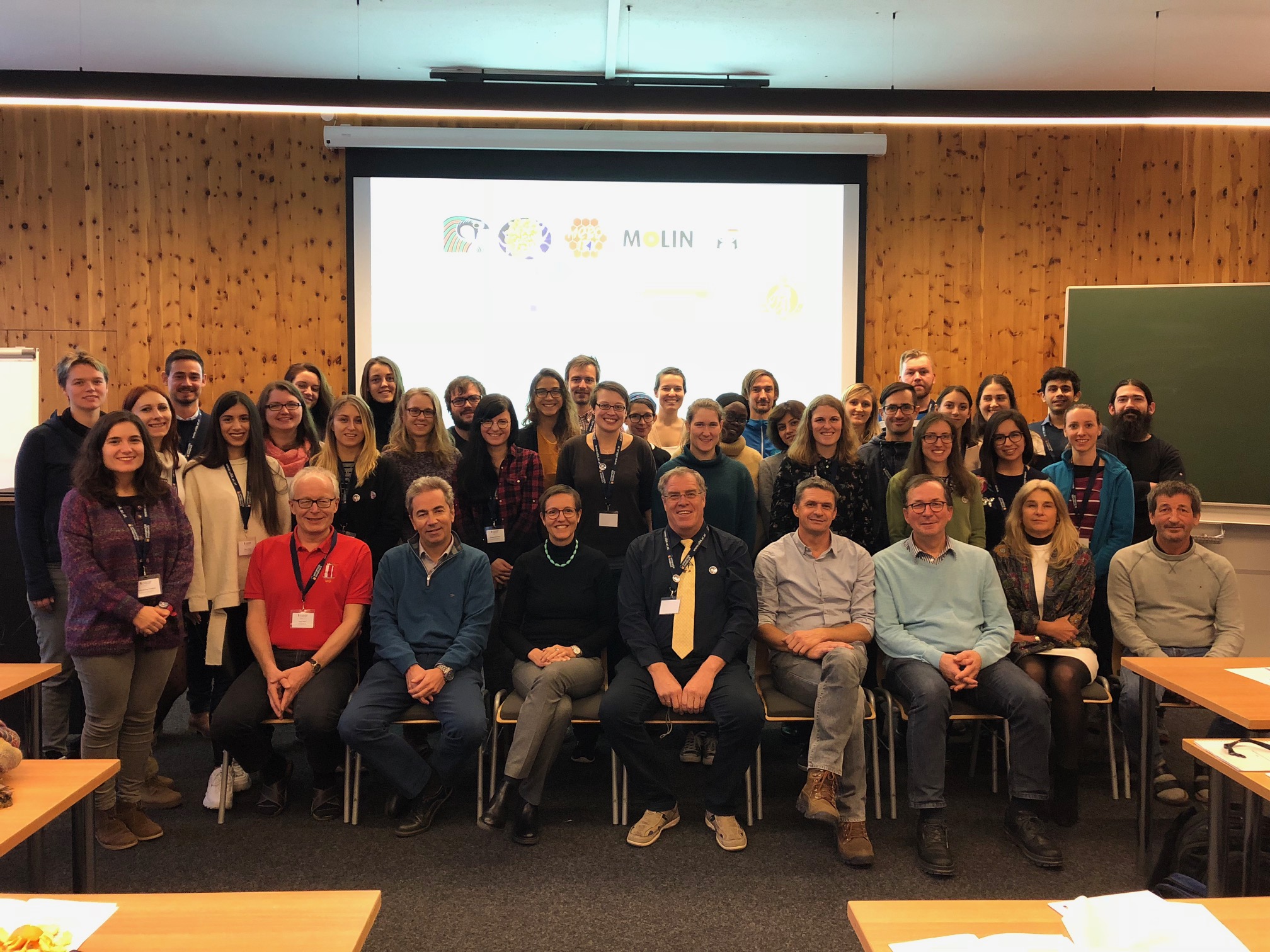
From the 29th of November until the 3rd of December 2018 we went on a retreat to the lovely conference center in Obergurgl. HOROS and IIT students were accompanied by students of other doctoral programmes: MCBO (Molecular Cell Biology and Oncology, Innsbruck, Austria), MOLIN (MOLecular fundamentals of INflammation, Graz, Austria), IRTG1911 (Immunoregulation of inflammation in allergy and infection, Lübeck, Germany), as well as students from University of Oslo (Norway) and University of Helsinki (Finland). Furthermore, the big shots from the complement field were also present: Jörg Köhl (Lübeck, Germany), Peter Garred (Copenhagen, Denmark), Seppo Meri (Helsinki, Finland), Tom Eirik Mollnes (Oslo, Norway) and of course our speaker & president of European Complement Network Reinhard Würzner (Innsbruck, Austria). Everyone got the chance to present their projects and received valuable feedback during discussions right after the talk, at the bar and also while skiing. Yes, SKIING – which was a really great atmosphere for networking with other scientist! A new European grant application CORVOS (COmplement Regulation and Variations in Opportunistic infectionS) was discussed and presented in parallel by Reinhard Würzner and the big shots from the complement-scene.
We say thank you to the FWF, Reinhard Würzner and Marco Grasse for making this retreat possible. It was a great opportunity to deepen our knowledge in the field of immunity in allergy and infection and to meet new friends and potential collaboration partners!
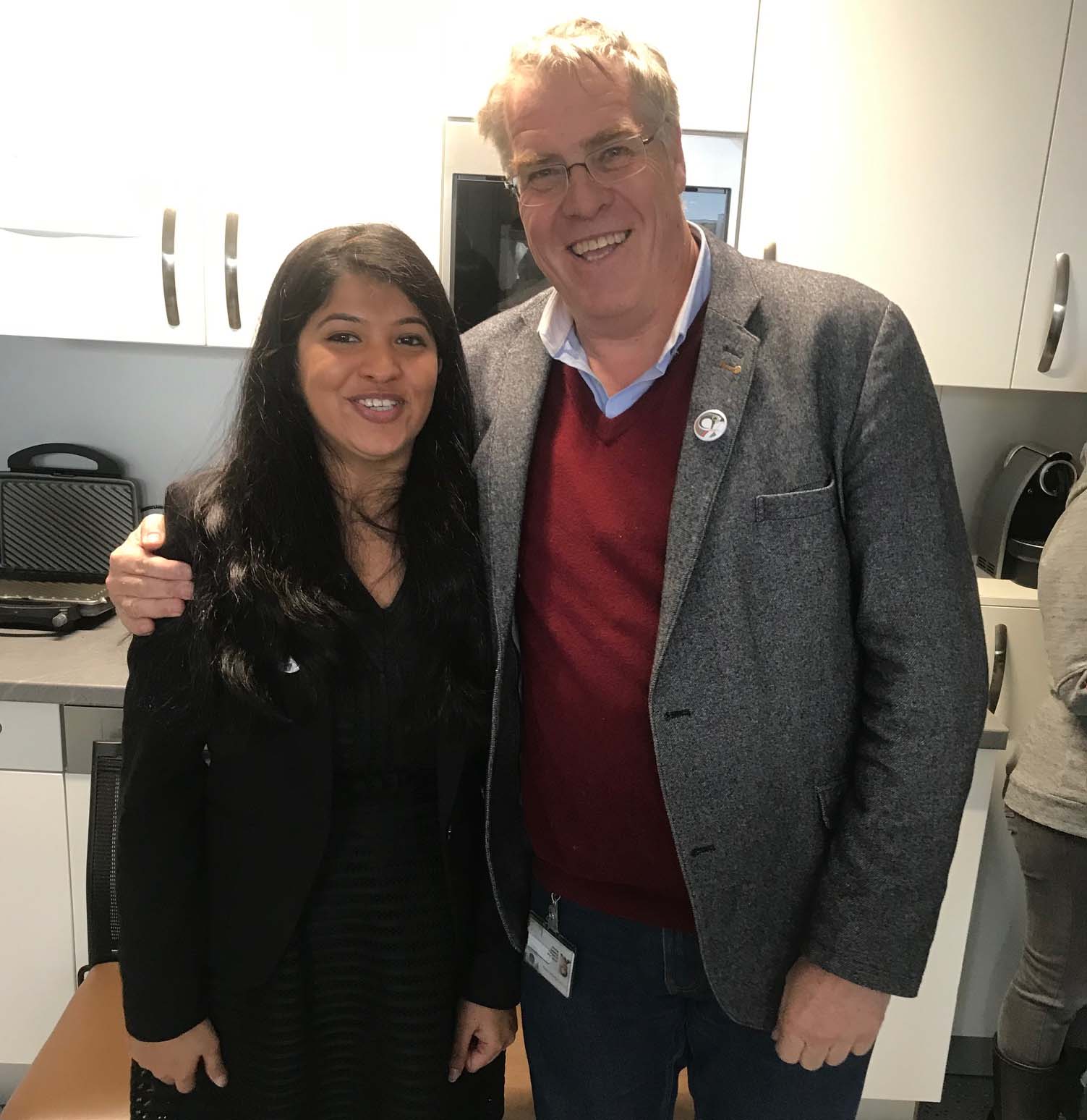
Busy days for the study office – also Parul finished her PhD successfully with a very impressive defense. Her thesis dealt with the development of an in vitro 3D human lung tissue model to study opportunistic fungal infections. She managed to publish this model in Nature Scientific Reports, thereby giving an important contribution to the concept of 3Rs (replacement, reduction, refinement) and animal welfare. Parul would like to do a postdoc in Germany and will maybe follow Thomas to Jena or somewhere else. But for the first she will go back to India to celebrate her wedding – We will all miss you, Parul! We wish you the very best for your future, hopefully we will see each other one day!
With her supervisors Prof. Lass-Flörl and Prof. Wilflingseder
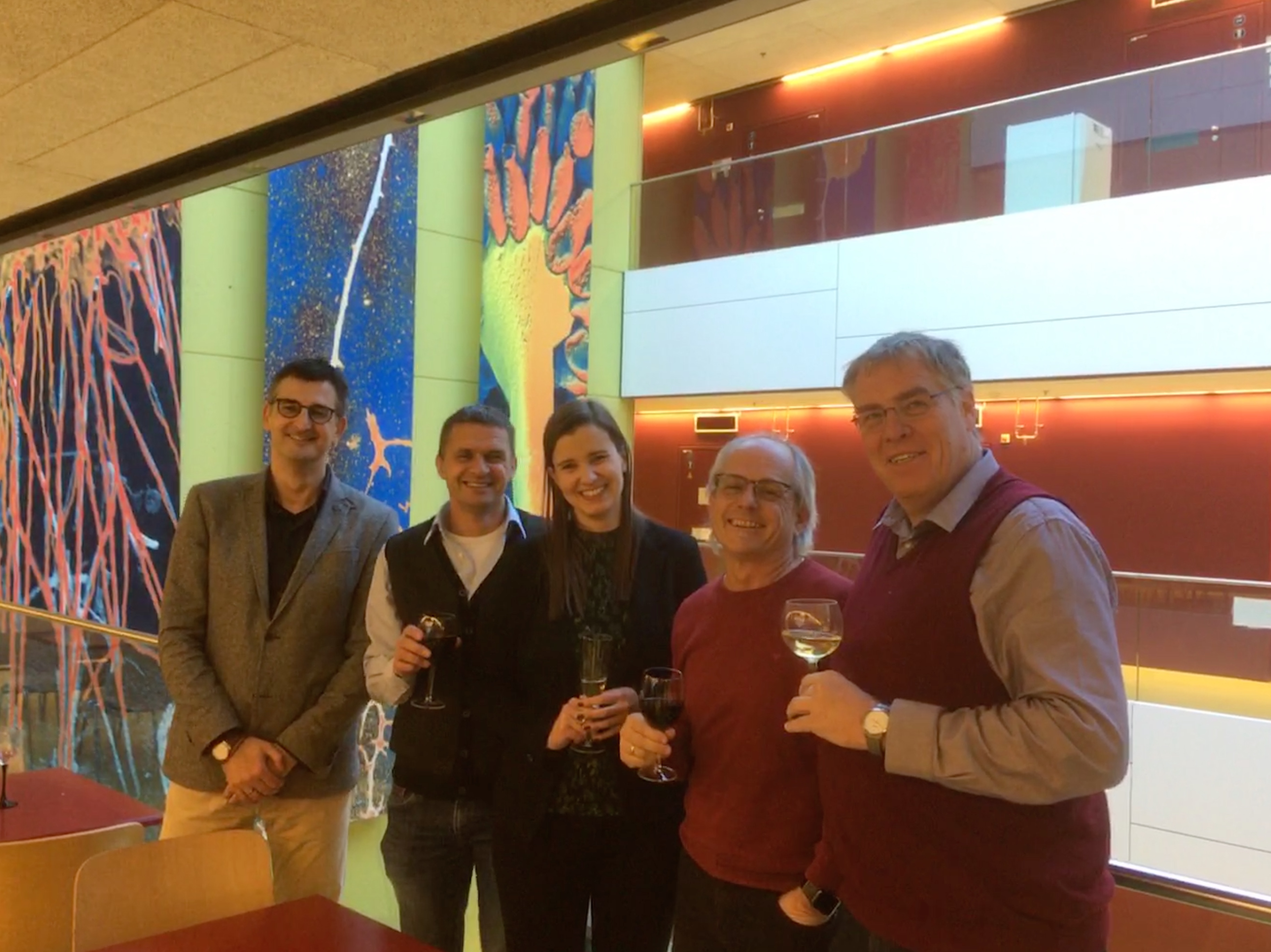
Anna-Maria Dietl defended her thesis with an excellent presentation of her results on Tuesday, 20.11.2018. Her research focused on the opportunistic pathogen Aspergillus fumigatus. Her aim was to explore the metabolism of the mold to define potential antifungal drug targets. She identified the biosynthesis of histidine, arginine, riboflavin as suitable target to develop a treatment against A. fumigatus. Her work resulted in three first-author and two co-author publications – congratulations for this great work!!!
Mia is now the 6th HOROS alumni. She will stay at the Medical University Innsbruck and continue as postdoc in the lab of Hubertus Haas. We wish you all the best for the future and keep fingers crossed for your career in academia.

Thomas Orasch was the next HOROS student who finished successfully his PhD. Since October 2014 he was working in the lab of Univ.-Prof. Mag. Dr. rer. nat Hubertus Haas and investigated the siderophore mediated diagnosis of fungal infections. His main goals were the analysis of the potential of siderophores as specific biomarkers for Aspergillus and the role of leucine biosynthesis in the virulence and as antifungal drug target. Thomas went 5 months abroad to the Department of Molecular and applied Microbiology at the Hans-Knöll-Institute in Jena. At the lab of Dr. Peter Hortschansky he investigated the interaction of proteins with DNA binding domains, which completed his thesis. On the 13th of September he defended his thesis in front of his examiners: Univ. Prof. Mag. Dr. Susanne Zeilinger-Migsich, Prof. Dr. Ilse Denise Jacobsen and Univ.-Prof. Mag. Dr. rer. nat. Stefan Grässle.
HOROS wishes Thomas all the best for his PostDoc in Jena!
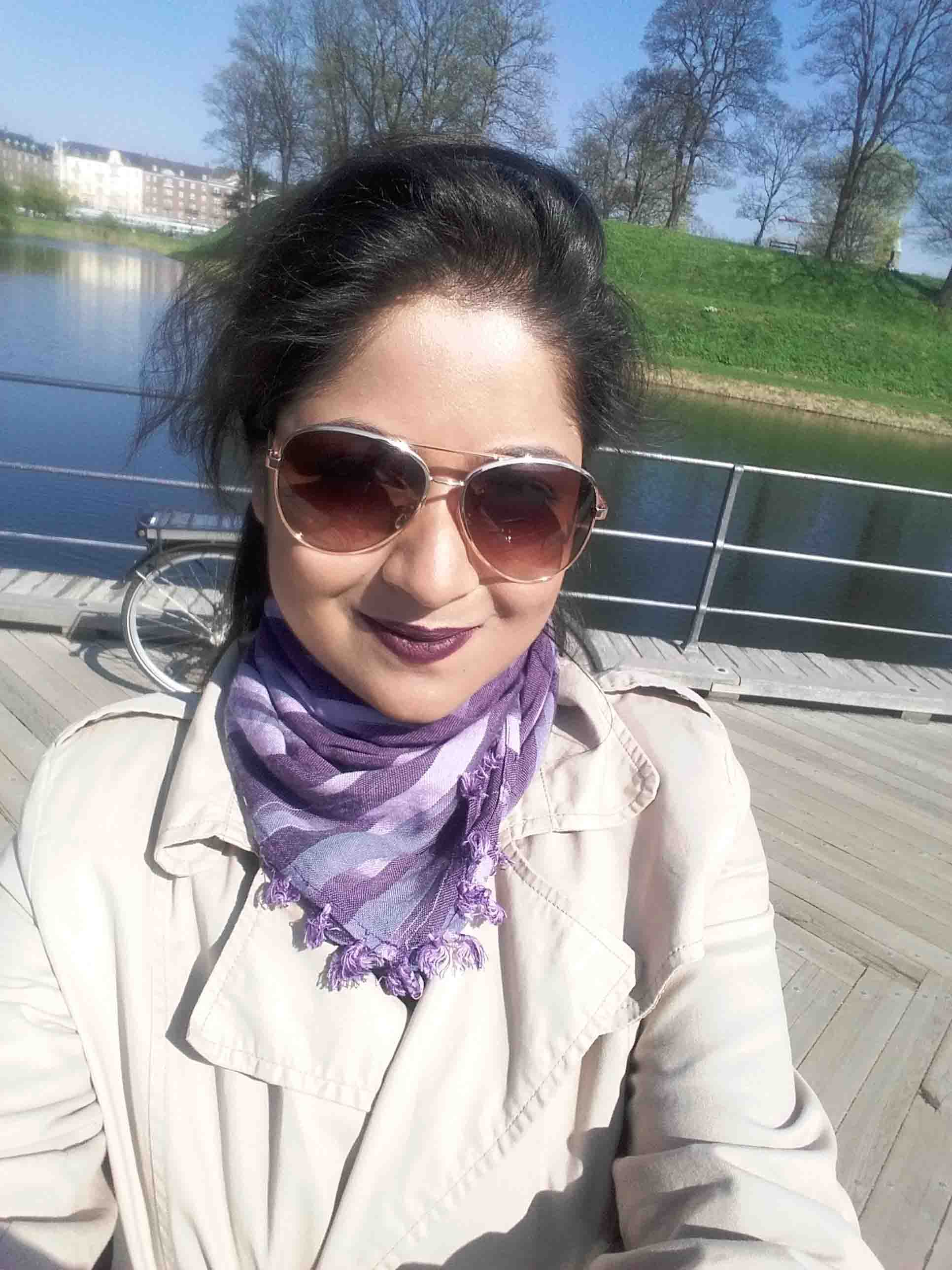
As a HOROS associate student, I got the opportunity to gain research experience in Prof. Peter Garred’s Laboratory of Molecular Medicine at the Department of Clinical Immunology, Rigshospitalet, University of Copenhagen. His group works on understanding the structure and molecular genetics of the complement system. I started my work in his lab in the mid of April and focused mainly on the effect of Shiga toxin on the intracellular complement profile of the human proximal renal tubular epithelial cells, HK-2, which compliments my PhD project in Innsbruck, titled “Interaction of EHEC virulence factor Shiga toxin with the innate immune system”. In particular, the aim of this study was to investigate the role of complement, with special emphasis on the expression of the pivotal complement proteins of the alternative pathway, in the renal epithelial cell line HK-2 and its further implications upon stimulation with Stx2a.
The work culture in Copenhagen and from what I learnt, in Denmark, in general, is quite relaxed and cosmopolitan. My colleagues were extremely warm and welcoming. This being an exceptionally sunny summer in Copenhagen, we spent a lot of time in the sun having weekly cakes, Danish pastries and ice cream “work meetings”, a tradition of the lab. The same fashion extended on the streets with large number of people sitting by the canals or riding bikes by the famous lakes of Copenhagen, basking in the sun in what is known as one of the most bike-friendly cities in the word. Street parties, in numerous tiny wine parlours, cafes and eateries with all types of cuisines, Copenhagen seemed like a worldly cultural city.
Personally, the experience, both work wise and living wise, has been extremely valuable to me. I am thankful to HOROS for giving me this wonderful experience.

Stefanie Dichtl started her PhD in October 2014 in the lab of Univ.-Prof. Dr. med. Günter Weiss and worked on the regulation of Dopamine of iron homeostasis and innate immune responses of macrophages to Salmonella infection. During that time, she investigated the effects of catecholamines on the regulation of iron in wild type and lipocalin-2 knockout bone marrow derived macrophages. Steffi had the chance to go abroad for six months and work in the lab of Dr. Peter Murray at the Max-Planck Institute of Biochemistry in Munich. During her stay, she could use already acquired knowledge and learn new methods. On the 8th of August she defended her thesis excellent in front of her examiners Univ.-Prof. Mag. Dr. rer. nat. Hubertus Haas and Univ.-Prof. Mag. rer. nat. Dr. phil. Dietmar Fuchs.
Steffi all the best for your future in Munich from all HOROS!
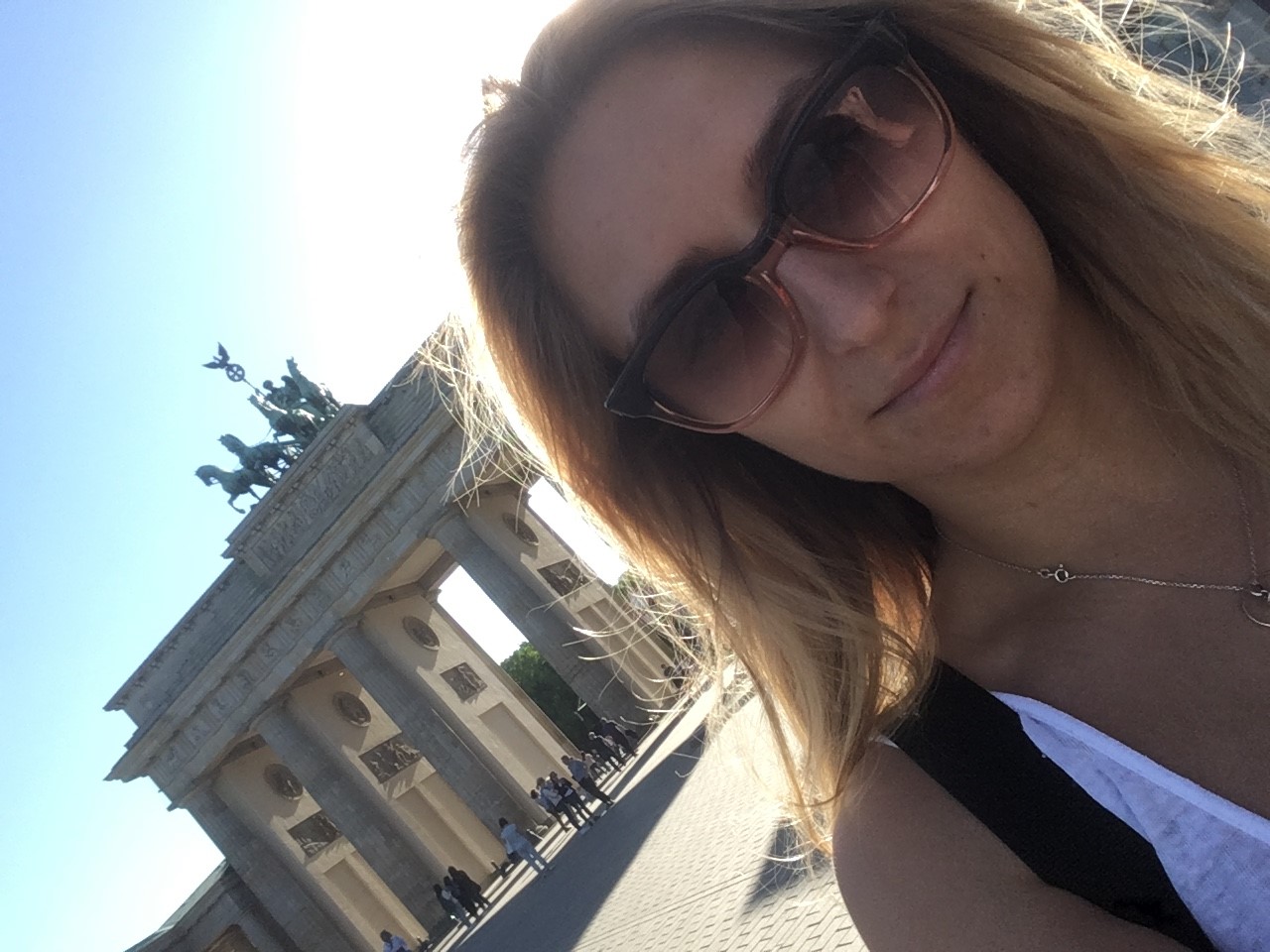
Through the PhD program HOROS I had the great opportunity to go three month abroad to join a world-renowned institute called ‘Deutsches Rheuma-Forschungszentrum’ in Berlin situated at the Charitè under the direction of Andreas Radbruch. There I joined the group of Anja Hauser and Raluca Niesner, which is focusing on advanced intra vital and in vivo microscopy to visualize and quantify immune dynamic processes of cell subsets in the living organism.
At the DRFZ, I’m the first one to work with the light sheet fluorescence microscope visualizing murine myeloid cell subsets within cleared bone tissues in 3D. Due to age-related changes of the efficiency of our immune system a reduced defensive and phagocytic capability regarding macrophages was already observed. Different populations of macrophages are responsible for several important functions in bone regeneration, which gets disturbed during aging. The aim of my project is to characterize and quantify macrophage subsets in young and old mice and compare the density of these cells between different cohorts. Furthermore, we will visualize the spatial localization of adipocytes and possible interactions with macrophages within the bone tissue as well.
I’m currently living in the friendly and trendy district, Kreuzberg. I have learned that Berlin is not only one big city; it consists of little different villages within a city and every district has its charm and mentality. One favorite part of the day is riding my bike to work, because I’m passing all the great sightseeing places early in the morning when tourists are still sleeping. Berlin is a city with thousands of different activities and sightseeing spots that you can do after work. I’m one of the lucky persons who can experience Berlin with one of the best summers of the last years. But it is hard to find a lake or pool to cool down that is not overloaded with people. Since I’m here I’m testing all the different bouldering gyms Berlin has to offer, so I won’t get homesick.
Within these three month I have extended my knowledge in my field of research as well as in others like physics. With this really short summary of three month I’m grateful to have had this great opportunity and I will definitely not forget the friends that I made and the time that I had in Berlin.
On my way to work passing the Reichstag and the Kanzlerviertel
Some of my lab colleagues at the DRFZ after a fire alarm exercise
‘Ride for silence’ event with friends and work colleagues
After work beach volleyball session in Berlin Mitte. Sporty lab colleagues!
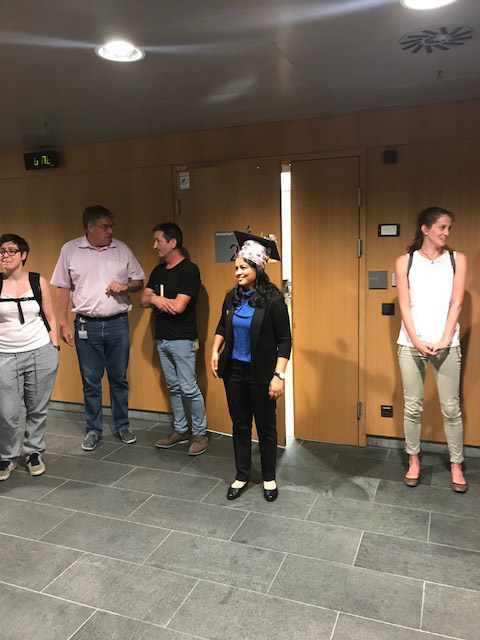
More and more students finish their studies - this time it was Hemalata Deshmukh (Priya), who defended her PhD thesis on the 12th of July in front of a huge audience. Priya started with her project as one of the first HOROS students in autumn 2014. Her thesis investigated the relevance of platelets and complement for the pathogenesis of invasive fungal infections. She did very well in presenting her results. We wish you also the best for your future, Priya!
I am working at the Memorial Sloan Kettering Cancer Research Hospital. It is one of the most renowned Cancer hospitals in the United States, where I have a fantastic array of resources at my disposal. My PhD project (in IBK) involves immune cells in the ageing bone marrow (human) and their ability to survive for long periods of time, here at MSK I am working with thymi (mice), an organ crucial for T cell development which is known to involute with age. In particular the work is focused on understanding the role of certain immune cells in the Thymus, ie Macrophages, after Sub lethal irradiation, and the process of regeneration and repair. The overall goal is to understand ways in which we can help the immune system repair itself when patients receive the harsh treatments commonly associated with cancer.
I am currently staying in east Harlem, which is known as Spanish Harlem, largely for its central American demographic. The Latin music plays loud in the streets, and the area is alive and friendly. In true Innsbruck fashion, I have invested in a bicycle, and I ride everyday approximately 20 minutes to the Hospital. It is a little dangerous in comparison to the lovely safe bike paths by the Inn, but don’t worry, I have a helmet!
The New York work mentality is out of this world! But when I do get some time to myself I work out in central park, meet up with friends at the plethora of bars and restaurants available in Manhattan, or visit the Beach in Coney Island.
Overall this experience has been invaluable to me as a student for its learning and networking opportunities. I have made some wonderful friends, and it’s something I will never forget.
Some lab members at after work drinks on the river
Watching the soccer with the boss in his office
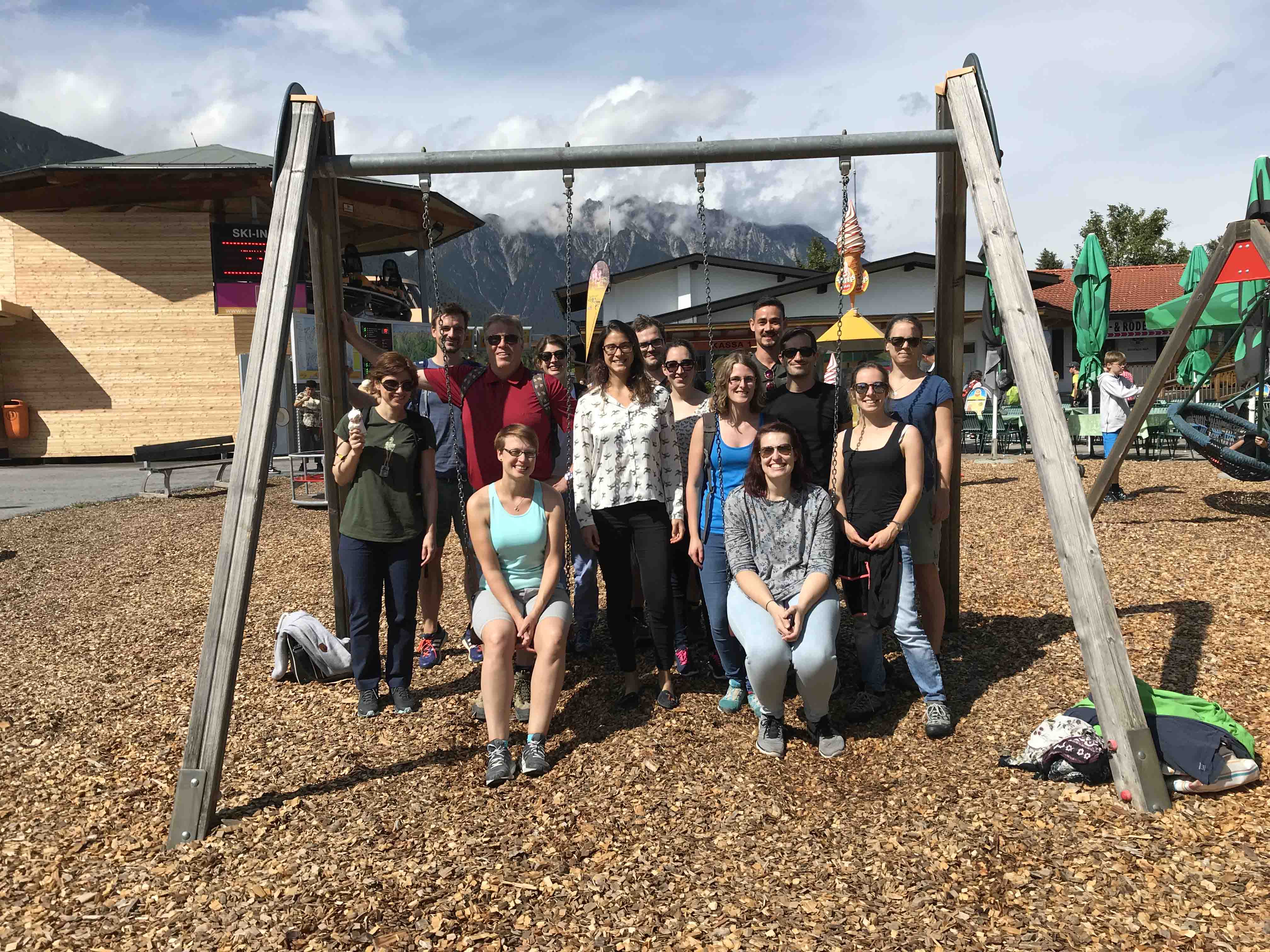
On the 4thJuly, a Bus picked us up at the University hospital and brought us to Imst, where we started to hike through the beautiful canyon Rosengartenschlucht. It was very sunny and warm, and some of us were attempted to jump into the river for a short refreshment. Unfortunately, no one was willing to go first, and thus we all stayed dry…After the hike, we had lunch together and discussed many different topics with our speaker Reinhard Würzner. After we finished that official part, some of us went further up the mountain by cable car to then go down with a roller-coaster – that was fun :-) Finally, the bus brought all of us with a smile on our face back to Innsbruck.
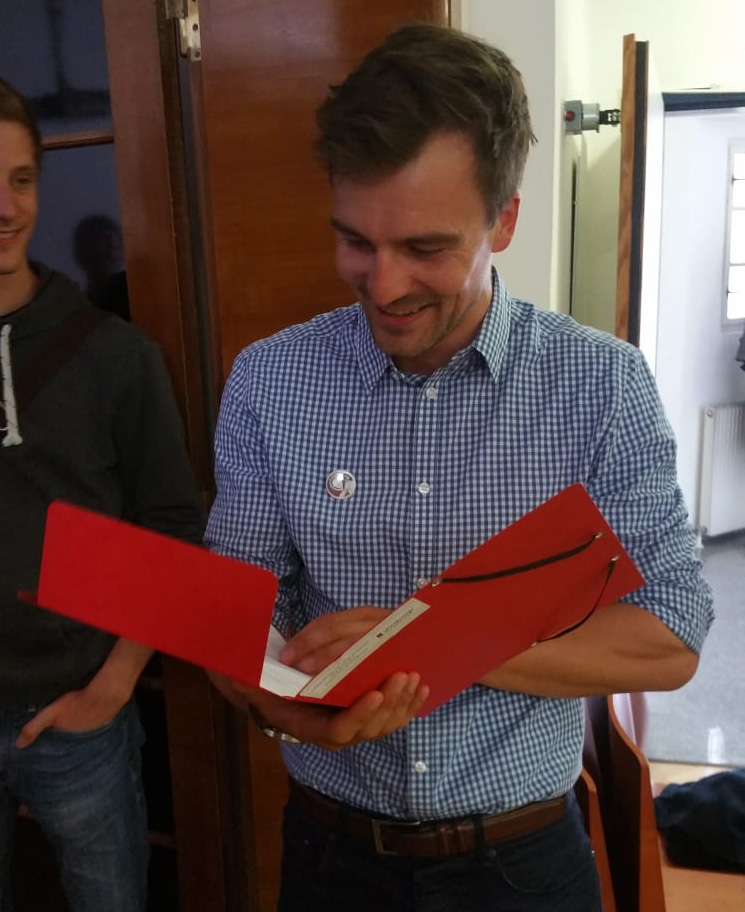
Marco Grasse is the second HOROS student, who defended his PhD thesis on the 28thof June in front of many HOROS students and his examiners Univ.-Prof.Dr.rer.nat. Heribert Stoiber, Univ.-Prof.Dr.rer.nat. Nikolaus Romani and his supervisor Univ.-Prof.Dr.med. Beatrix Grubeck-Loebenstein. He started his PhD studies in autumn 2014 and investigated immune responses following tetanus and diphtheria vaccination in humans and mice of different ages. Marco went during his studies for 6 months to the Statens Serum Institut in Copenhagen, Denmark, where he gained a lot of knowledge on vaccinology. His work resulted in three publications so far. The Defense was very well and we wish you all the best for your future, Marco!
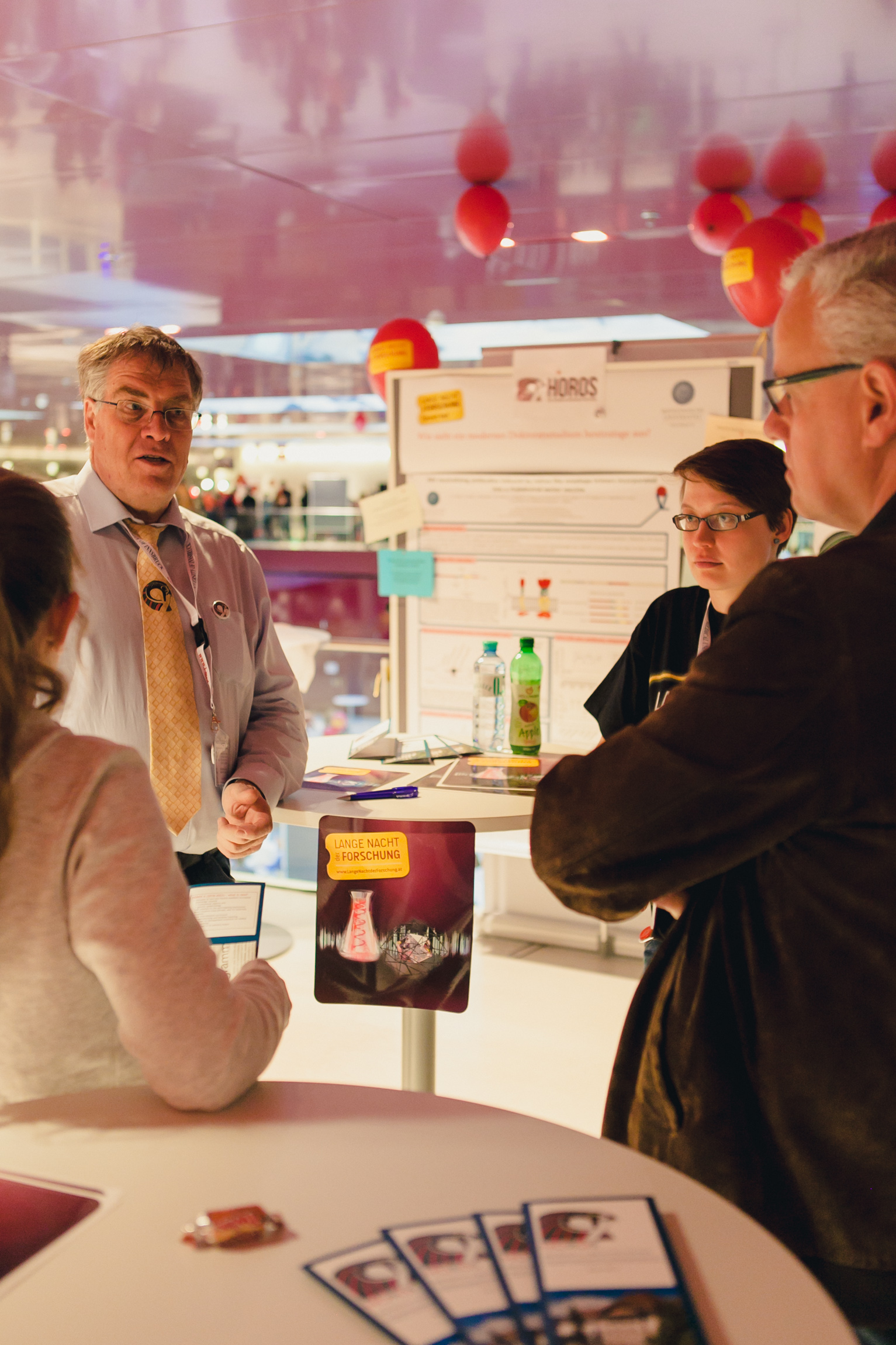
On the 13th of April the Long Night of Research took place. More than 14.000 visitors came along and took the possibility to visit different exhibitors of the Medical University of Innsbruck. They had the chance to perform experiments by themselves, ask questions and get in touch with scientist on more than 250 booths.
HOROS had an info booth as well, where students got an overview about our PhD program. We informed them about how to apply, the key subjects of our program and the possibilities to go abroad during the study. We had visitors from all ages. Young pupils and even seniors were interested in doing a PhD.
Taken together it was a successful night for medical science in Innsbruck and HOROS!
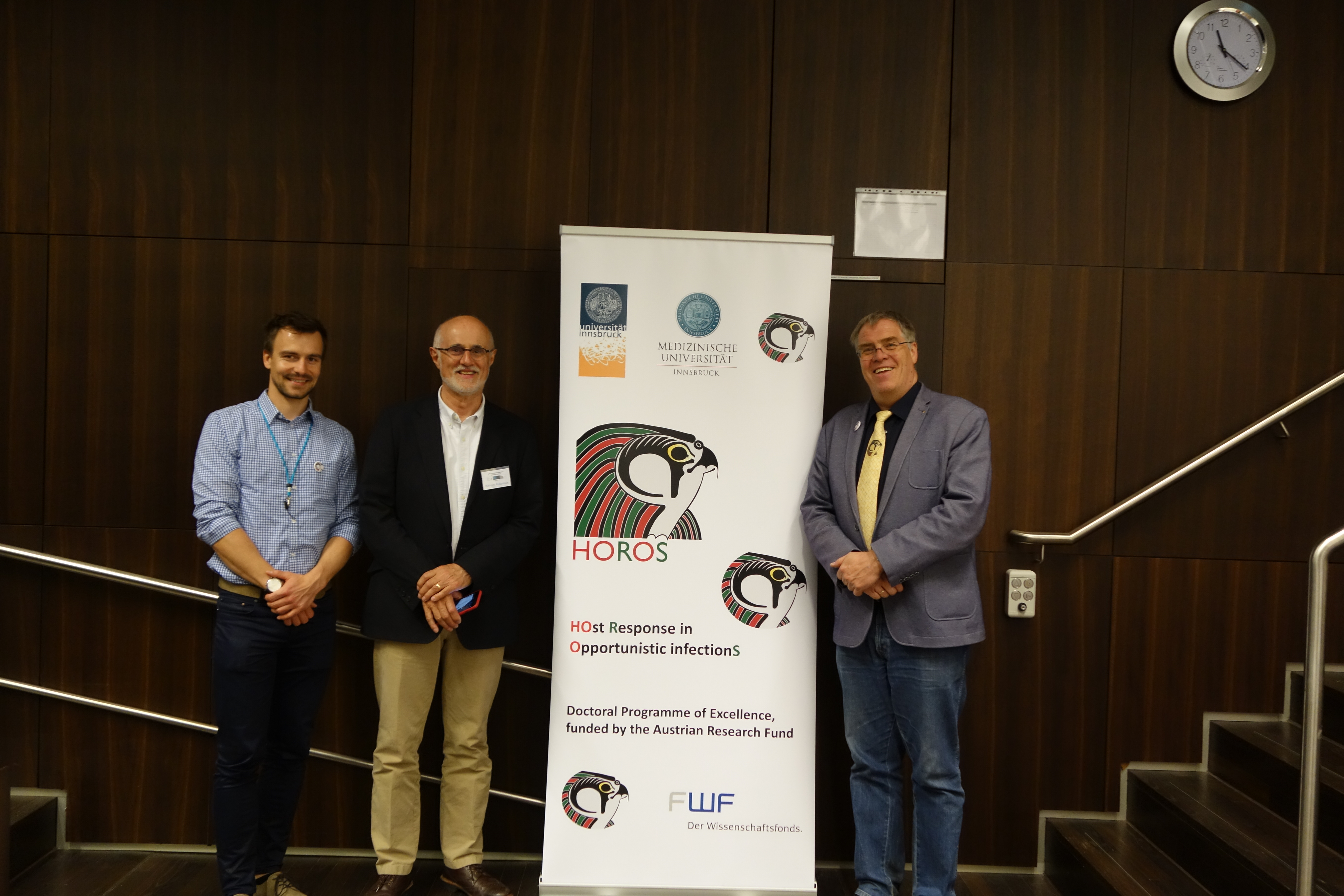
Plenty of students from the research area "life science" presented their results in front of each other. The meeting was held at the CCB in Innsbruck from 05.04.-06.04.2018. A lot of HOROS students participated, and among them Samyr Kenno, Parul Chandorkar and Marco Grasse were allowed to present their results in short oral presentations. The others presented a poster. Anna-Maria Dietl got awarded for her poster and Parul won a price in the category "Best Microscopy Picture". Next to the outstanding presentations of the students, each FWF funded doctoral program invited a keynote speaker. The HOROS invited speaker was Malcolm Richardson from Manchester, UK. He gave an interesting talk on "The mycobiome of the respiratory tract: does it reflect what you breath in?". There was a nice come together after the meeting.
Picture: M.Grasse, M.Richardson, R.Würzner (left to right)
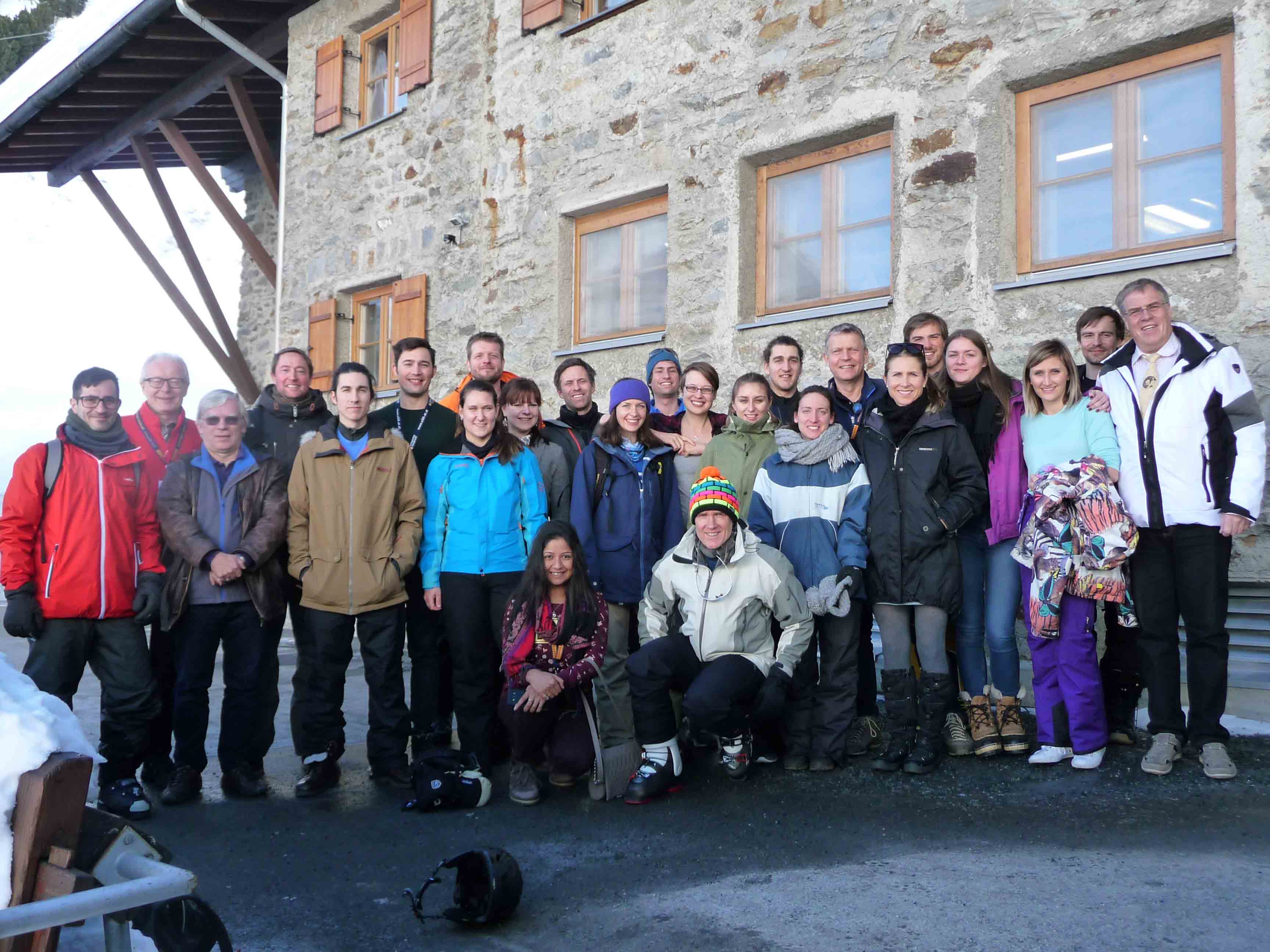
We had again a really wonderful retreat at the Innsbruck University conference center in Obergurgl from 28.01.-01.02.2018. HOROS as well as Infection, Immunity & Transplantation students went there together with other PhD students and Postdocs from Denmark, Norway, Finnland and United Kingdom. Everyone gave very interesting talks on different topics of innate and adaptive immunity. Furthermore, a couple of Keynote speakers were invited: Jörg Köhl – University of Lübeck, Stefan Niemann – Forschungszentrum Borstel, Doris Wilflingseder – Medical University of Innsbruck, Peter Garred – University of Copenhagen, Seppo Meri – University of Helsinki and Tom Eirik Mollnes – University of Oslo. The invited speakers discussed together with our HOROS coordinator Reinhard Würzner a strategy for a joint EU-grant application: CORVOS (COmplement Regulation and Variation in Opportunistic infectionS), which is going to be submitted in January 2019.
Next to the interesting talks and discussions we also found the time for skiing sessions, which everyone enjoyed a lot. There was plenty of sun, snow and good mood in the air. We are very thankful for having such nice scientific retreats and chances to build up new friendships and cooperation partners – Many thanks to the FWF and Reinhard Würzner for making this possible!
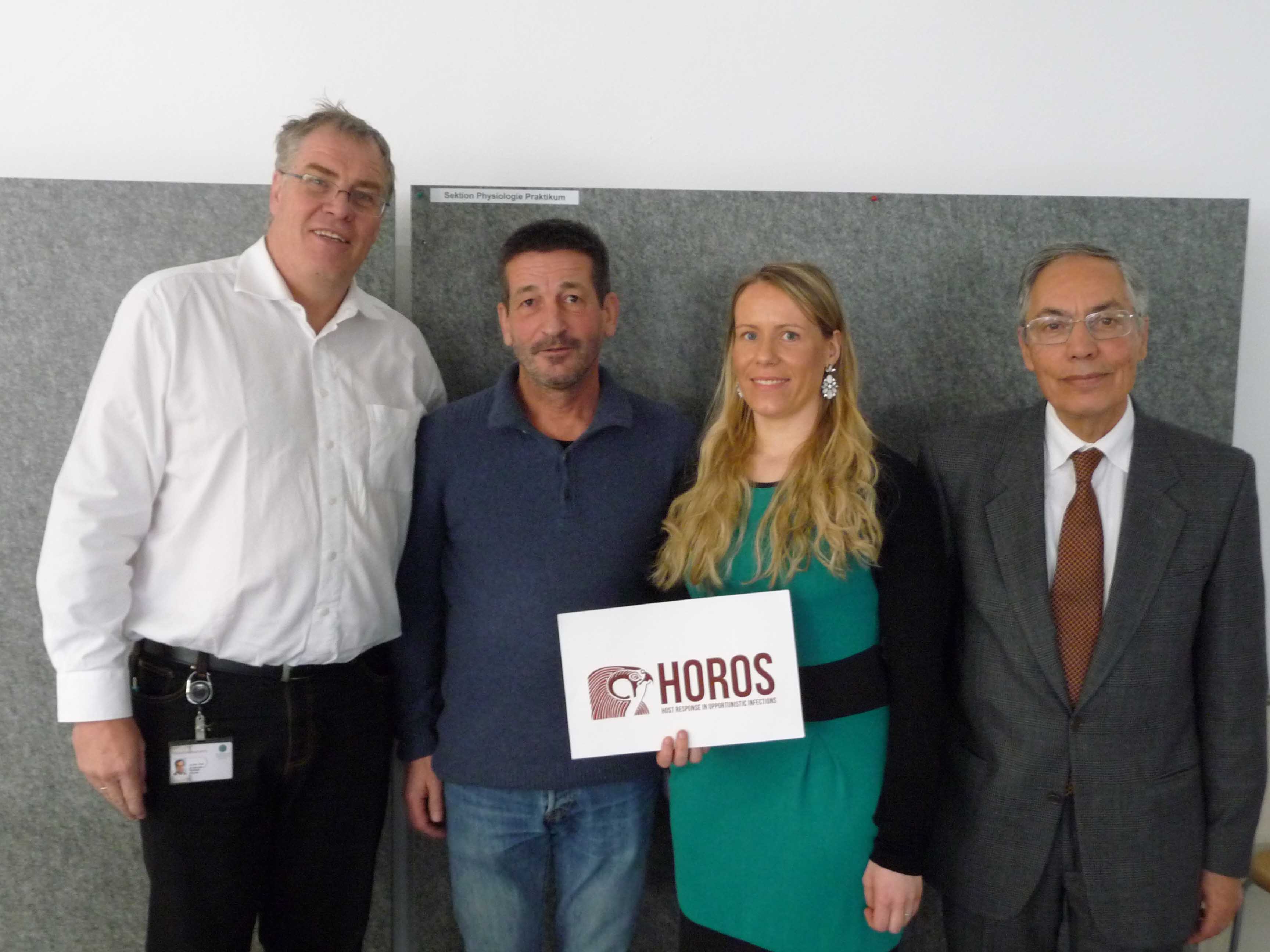
Britta Schiela is the first HOROS student who successfully finished her PhD. Since 2014 she extensively investigated the topic: “Interactions of ZIKA viruses with the complement system” under the supervision of Univ.-Prof. Dr. rer. nat. Heribert Stoiber. During her PhD she went to Twincore in Hannover, Germany, for 3 months to learn new methods, which helped her on further investigations of ZIKA virus. On 26th of January, she defended her PhD in front of her supervisor and external examiner Prof. Francesco Tedesco (Trieste, Italy) and did very well.
Congratulations Britta!!! HOROS wishes you all the best for you future.
Picture (left to right): R. Würzner, H. Stoiber, B. Schiela, F. Tedesco
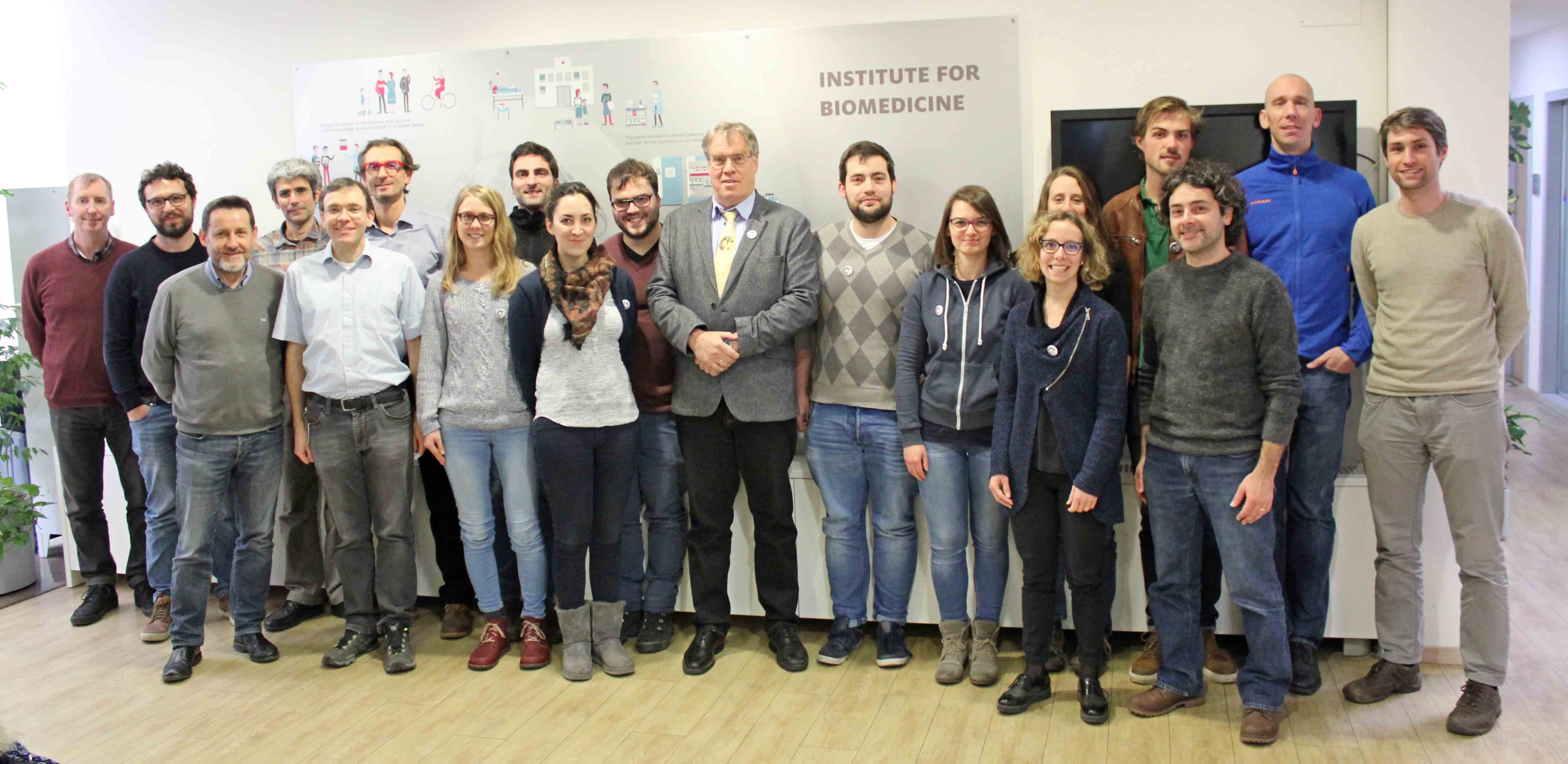
The BI-DOC programme was established as a scientific exchange between Bozen/Italy and Innsbruck years ago. Plenty of students from the Free University of Bozen came to Innsbruck for visiting lectures. However, only a few Innsbruck students took the chance to go to Bozen by now. This has been changed by the end of November. Eleven students of the PhD programmes Infection, Immunity & Transplantation (IIT) and HOROS went to Bozen for a two-day course on “Population-based studies and biobanks in the –omic era”. All students passed the examination with “excellent” or “good” - it was very interesting and useful for the students' further studies. Thus, our visit in Bozen was definitely worth it and we are positive that many other students will take this chance in the future!
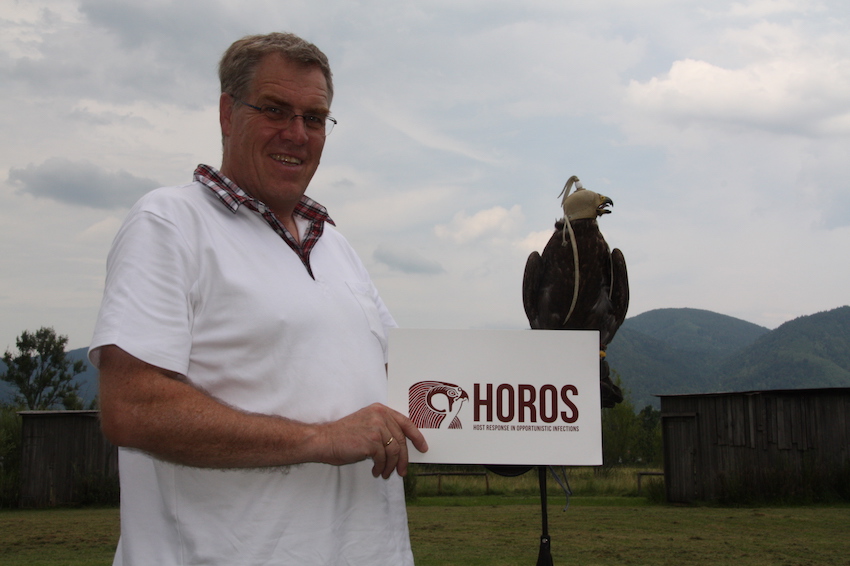
We are very happy to announce that the flight of HOROS will continue! The FWF and the involved international reviewers have very positively evaluated our report of the first period, HOROS I, and granted a prolongation for further 4 years – 01.03.2018 will be the official start of HOROS II.
In addition to accepting 5 of our recent faculty members and projects for the next period, two further FMs and projects have also been very positively evaluated and so HOROS welcomes Florian Kronenberg and Florentine Marx-Ladurner as new faculty members. This is the first, but also final extension by law, but a run off period of approximately 18 months may be added, so that HOROS II will likely fly until September 2023.
With the help of HOROS, I had the great opportunity to work in the Immunregulatory group of Dr. Peter Murray at the Max-Planck Institute of Biochemistry in Munich. Due to the fact that the lab moved from the St. Jude children's research hospital in Memphis to the Max-Planck Institute of Biochemistry in Munich with the begin of May, I learned a lot what it means to set up a new lab. The Max-Planck Institute of Biochemistry is mainly focused on protein and immune biochemistry, and therefore it is a great place for scientific exchange.
During my stay abroad I worked a lot on the role of TNFα in inhibiting M2 macrophage polarization. By working on this and other projects I could use already acquired knowledge from my lab in Innsbruck as well as new methods I learned and got focused on new research fields in Munich. This was the basis for a great time with a lot of interesting discussions and meetings. The immunregulatory group is really international and therefore we had a great mixture of Australian, French, German and Austrian people.
It was great that my colleagues weren’t only workmates but also friends. So we went e.g. to a wine tasting together or visited the Oktoberfest. We also jointed a soccer team on the summer festival of the Max-Planck Institute of Biochemistry and so it was the first time I played soccer myself. Munich is not that far away from Innsbruck but I never visited the city in detail before my stay abroad. On weekends I was given the opportunity to change this and visited many tourist highlights. For example I went to the Tollwood festival (where you can try food from all over the world), the Frühlingsfest (a kind of small Oktoberfest) or I also visited the Deutsches Museum or Sealife. One of my personal highlights was to visit a Champions league game of the soccer club FC Bayern Munich. Altogether Munich is a great city with really nice people and lots of places worth visiting.
I enjoyed the time in Munich a lot. It was very interesting to learn how another lab works and due to HOROS I had the opportunity to make new cooperation partners and friends hopefully for a long time.
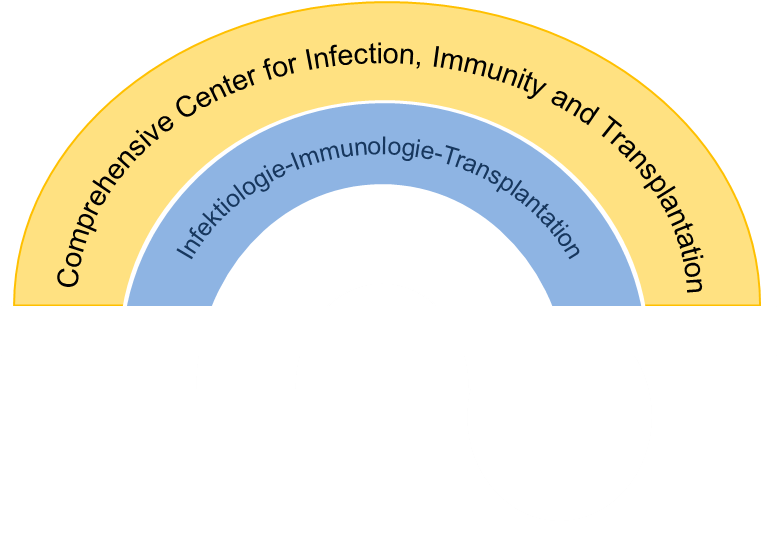
Last week Reinhard Würzner was elected as speaker of the Medical University of Innsbruck (MUI) PhD programme "Infection, Immunity & Transplantation" (IIT) - He is now speaker of HOROS, IIT and also the coordinator of all doctoral programmes at MUI, congratulations! IIT and HOROS are very closely connected doctoral programmes. HOROS arose as kind of excellence cluster from the IIT. Students from both programmes are collaborating and meet each other on a regulary basis. Timon Adolph, a relatively young faculty member of IIT was elected as deputy speaker.
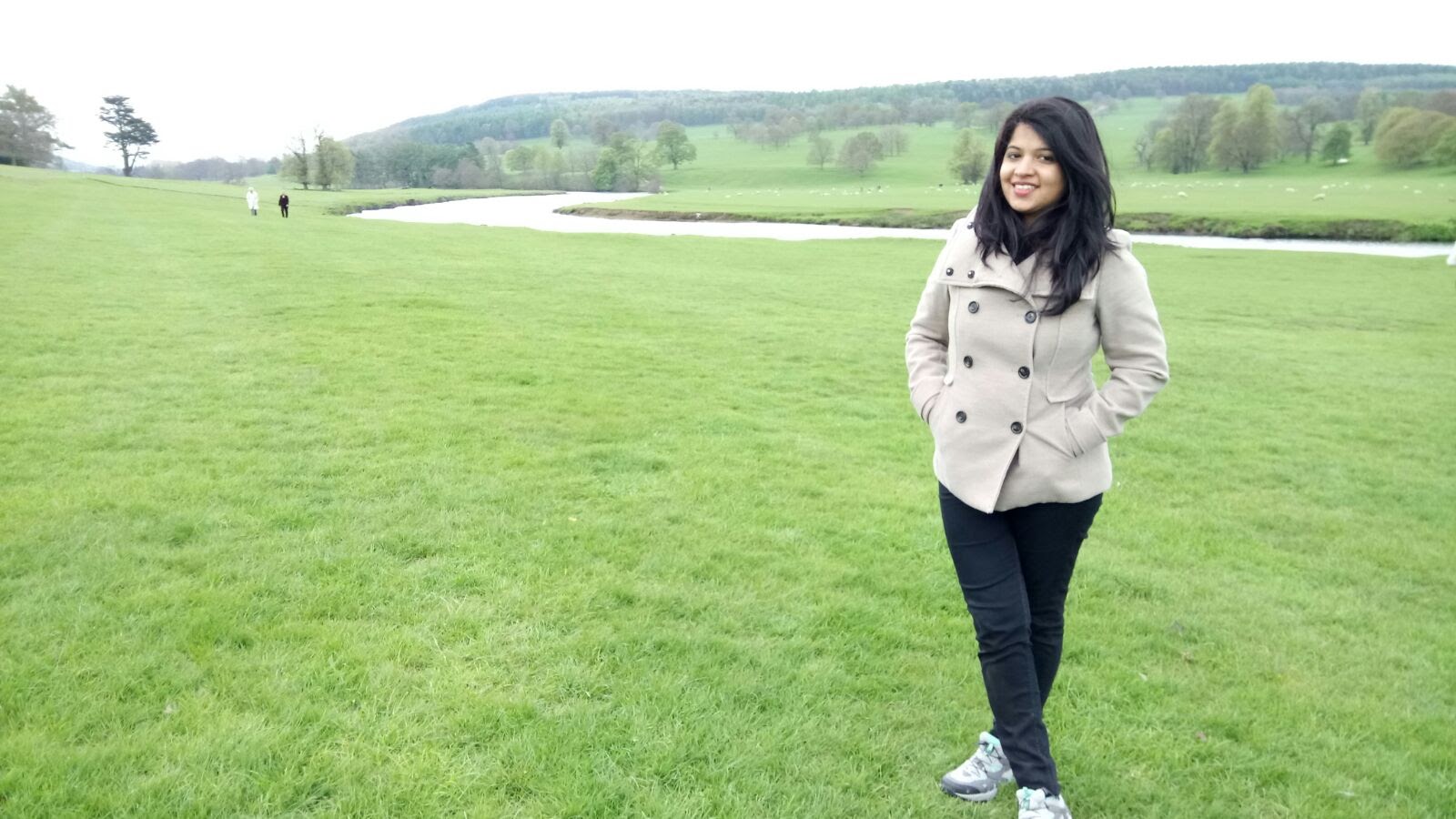
As part of the HOROS Laboratory exchange, I was fortunate to have the opportunity to work with Prof. Malcolm Richardson at the Mycology Reference Centre Manchester, in the University Hospital of South Manchester. I started working at MRCM during the end of April. This opportunity of working in a clinical setting at the UHSM and more closely dealing with Aspergillus patients was the best step forward to hone my skills and gain maximum knowledge in the field of Infectious diseases. At MRCM, I could apply practical and theoretical knowledge from bench to bedside.
My work was mainly focused on learning the molecular diagnostic techniques and serological assays used for identification of medically important yeasts and moulds. Additionally I attended Patient clinics for Allergic Bronchopulmonary Aspergillosis and Chronic Pulmonary Aspergillosis with Prof. David Denning. Attending clinics and thereby interacting with patients has given me a broader perspective towards understanding “Aspergillosis”. I also had the chance to attend clinics for Candidiasis with Dr. Riina Richardson. Apart from the lab work, I was actively involved in the weekly lab meetings, the meetings with clinicians and research seminars. I was assigned a task to give a talk at the Support meetings for Aspergillosis patients, which was a challenging one as I had to present my work in a non-scientific manner. Additionally, I also took up scientific writing to my interest and could contribute to the News section of the LIFE (Leading International Fungal Education) website. The friendly and helpful nature of my colleagues at MRCM and willingness to share their knowledge contributed positively to my stay in Manchester. We had a very good time together at our lunch breaks and also had a few lab outings. It was great to be a part of the team here at MRCM where everyone has been extremely kind and supportive and I never felt like a Visiting Student as they always actively involved me in all their activities.
Manchester is a great city especially for the Football lovers. It is a city where the old meets the new, where different cultures come together and the people are really friendly and welcoming. Since the University of Manchester is the second largest University in the UK, one can see a large student population in the city. The city is notable for its architecture, culture, music exports, sports clubs and scientific and industrial outputs. The name of the city originates from the Latin name Mancunium and the citizens are referred to as Mancunians.
While the Manchester city centre offers unique and eclectic restaurants, bars, shops, museums, galleries and hotels, the surrounding Greater Manchester boroughs offer a patch-work of visitor experiences including quaint market towns, traditional pubs, beautiful green spaces and waterways. Additionally the wide range of world class events and festivals hosted by the city make it an attractive destination for visitors.
All in all, Manchester has been a great place to live and there is a lot I have taken back with me both at a professional and personal level, making my six months stay a productive and memorable one!
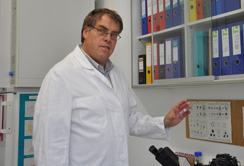
Congratulations to our HOROS-speaker Ao.Univ.-Prof. DDr. Reinhard Würzner who was elected as president of the European Complement Network during the annual meeting in the middle of September in Copenhagen. The European Complement Network was founded 20 years ago, with the aim to indicate the relevance and also to promote the scientific research in the area of the complement system.
Complement is understood as efficient, tightly regulated innate immune barrier against invading pathogens. Some pathogens, such as Escherichia coli, can release factors that interrupt the regulation of complement, thereby leading to manifestations of diseases such as hemolytic uremic syndrome (HUS). Complement is also one main research topic of our doctoral programme, making the presidentship a well-fitting honor for our HOROS-speaker!

On Saturday, 16.09., the HOROS-family started to a retreat to the conference center of the University of Innsbruck in Obergurgl. We had a few things on our agenda. All students gave an update on their PhD-projects with a special focus on the methods performed in the different HOROS-labs. We also discussed internal issues of our PhD-programme, such as stays abroad, prolongation of the study time and planning of upcoming events. But most importantly we prepared for the hearing of our HOROS II application that will be in Vienna on the 25.09. Six students and the faculty members will go to there to represent our programme in front of 6 reviewers invited by the FWF.
Unfortunately we had quite cold weather including snow and rain. However, we went one afternoon to a cozy hut where we enjoyed a typical Austrian hut dinner. We keep fingers crossed that our outstanding doctoral programme will be prolonged for a second period.
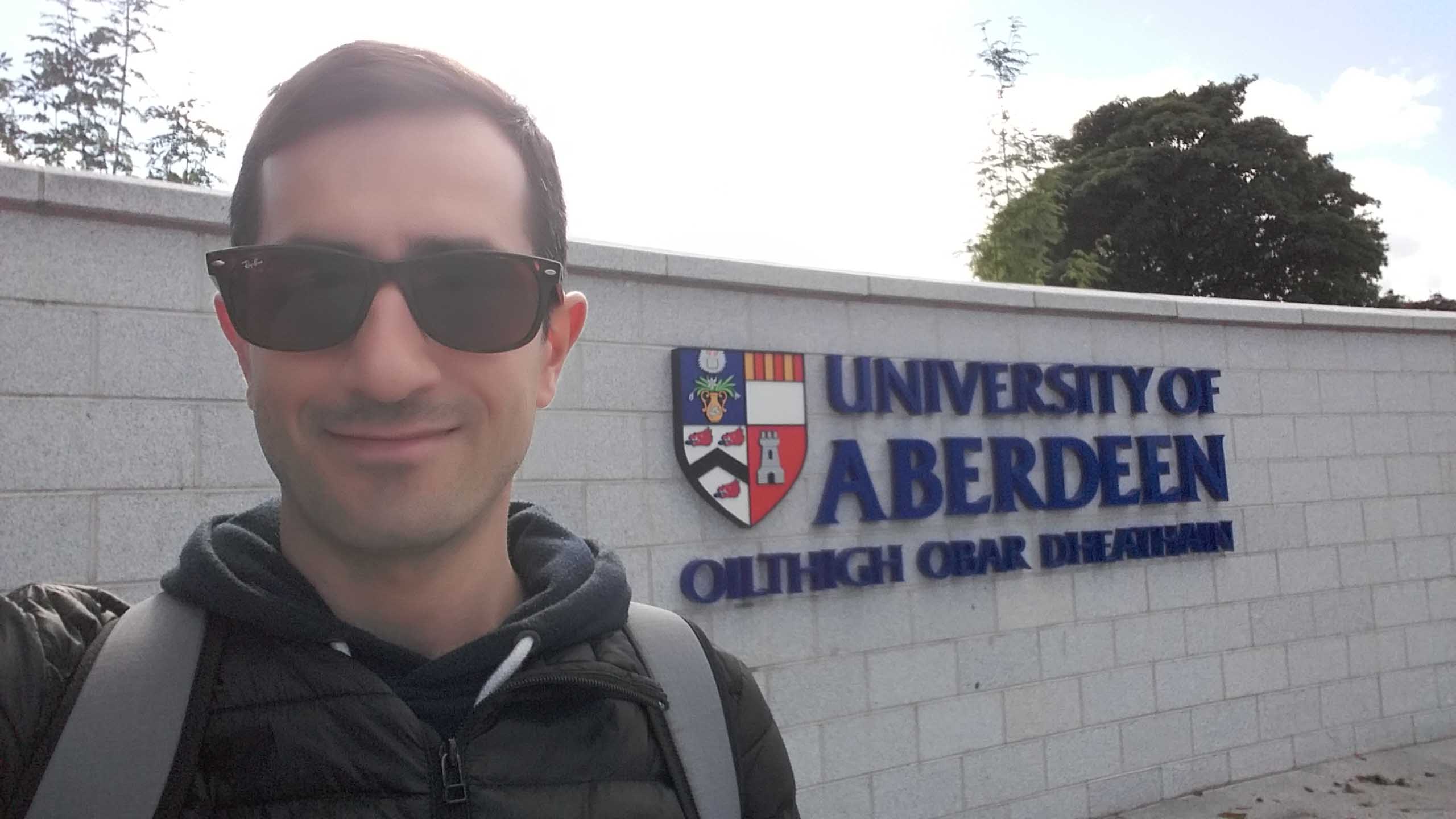
The HOROS doctoral program gave me the opportunity to attend international conferences on medical mycosis and to meet so many speakers from around the world. It was a chance to get to know the Aberdeen Fungal Group (AFG) from University of Aberdeen, Scotland UK. I was interested by their impressive talks, some of which were strongly related to my PhD project. The AFG is one of the largest centres on medical mycosis in the world. It consists of 12 different groups, operating on many aspects of fungal infection and disease. The students enrolled in AFG are strongly motivated and supported and mentored by PIs internationally recognised as leaders in fungal immunology. With the beginning of March 2017 I had the pleasure, and honour, to be a part of them in Prof. Neil Gow‘s group. He is an international leader on fungal genetic cell wall biosynthesis and on immunology of fungal-immune cell interactions. My project is to highlight a new category of virulence factors expressed in C. albicans that is recognised as a cell membrane protein, but seems to have functions related to the cell wall. Supported by Prof. N. Gow and its group I assessed, by electronic and confocal microscopy, the distribution of this virulence factor and its role on immune inhibition. I also demonstrated a potential therapeutic effect by blocking this factor with the means of specific antibodies in vitro. In doing this a potential window on a new drug treatment of fungal disease was opened. I have appreciated the very useful suggestions from Prof. N. Gow during my stay. It was also a pleasure to have daily discussions with my lab colleagues to optimize and perform the experiments. I attended lab seminars every week, and they all were very helpful to me. Thanks to AFG I markedly increased my knowledge in this field. AFG has also helped me greatly in designing experiments to investigate my research topic.
I am very happy for my choice and I want strongly say THANK YOU to the HOROS doctoral program and my supervisor Prof. Reinhard Wurzner for this amazing opportunity. We have operated in connection by creating a virtual bridge between Aberdeen and Innsbruck. A SPECIAL THANKS to Prof. Neil Gow and his amazing group, to AFG (all of them) and University of Aberdeen that accepted this collaboration which significantly increased my skills in medical mycology.
I provide some pictures that show the beauty of Aberdeen and Scotland. I hope these will inspire my peers to a trip, I strongly recommend it!
King’s College, University of Aberdeen: The campus born in an amazing atmosphere
Urquhart Castle on Lockness, Iverness: Trying to see Nessie in a very mysterious atmosphere
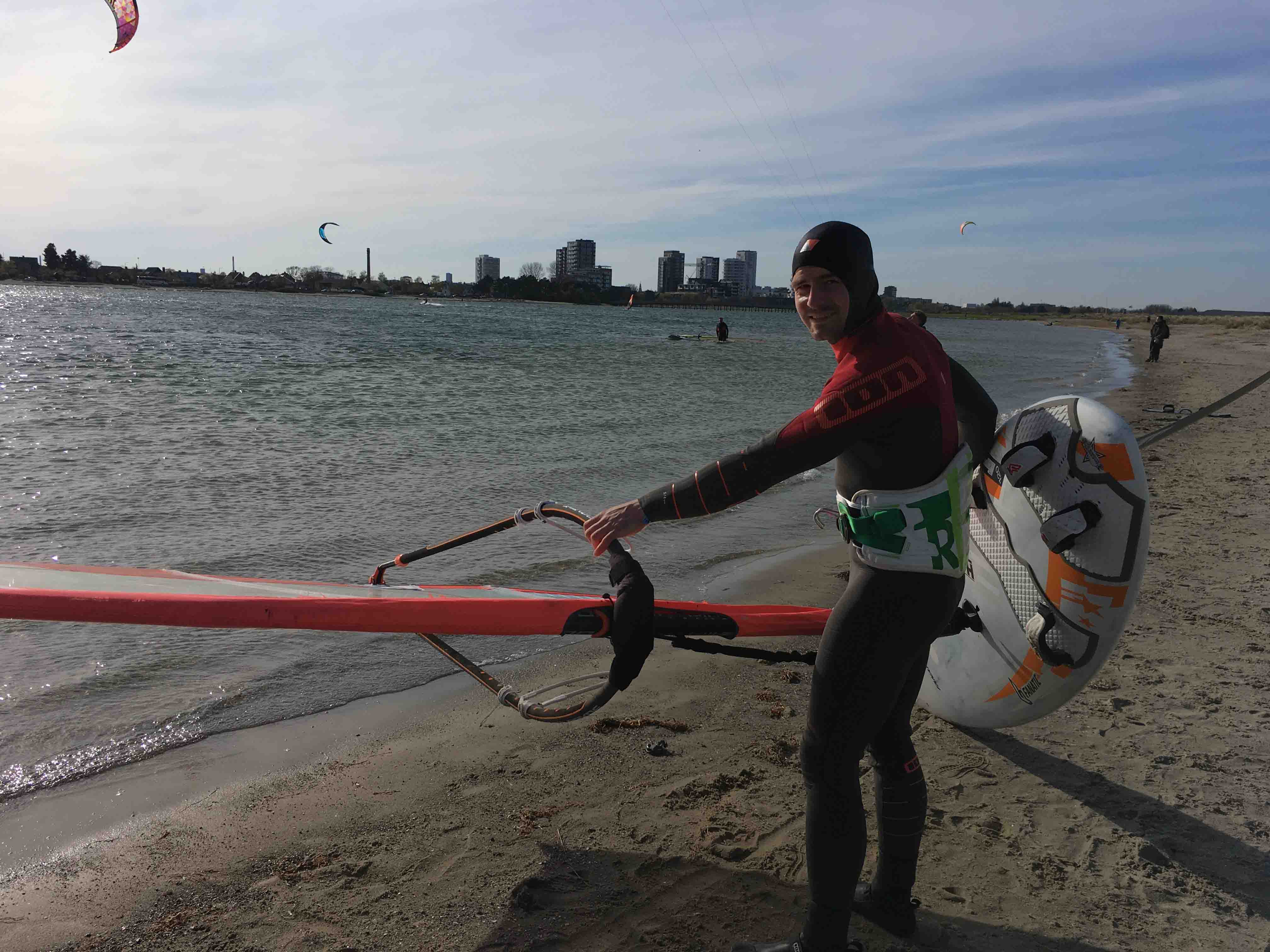
By the end of February I started a research stay at the Statens Serum Institut (SSI) in Copenhagen, Denmark. The SSI is known best for its history and still ongoing research in vaccine development against various diseases. I joined a group that focusses on the development of a vaccine against chlamydia. My project deals with the development of flow cytometry based functional antibody assays, with the aim to characterize antibodies that derive from various vaccine candidates. It is really fun to play around with such a library of different antibodies. I got responsibility and had intense discussions with my supervisor from the first day on. My colleagues are very friendly. Every Friday we have breakfast together and if I need assistance in anything, everyone is willing to help me – it feels like a family, the SSI-familyJ. The Danes take care of their employees, we get constantly supply of coffee, tee and fresh fruits and there are also different sport activities that you can do on the SSI campus, such as yoga-lessons, tennis, badminton, running clubs or just a regular workout in the gym.
The Danish people seem to be a happy folk - I can see them always smiling - and they seem to be so relaxed. They have a code of behavior that is called “janteloven” (=law of Jante), which basically means that you should not think you are better than others. A medical doctor has the same social reputation as a facility manager. As a result, no one is taking himself too serious.
But not only the people, the city is also very beautiful. It is up to you, whether you would like to do some sightseeing, shopping, to take a walk in the park or just to hang around with friends and to feel the atmosphere of the many water-located places in Copenhagen. They have a nice mixture of new designed buildings and old industrial constructions that get reanimated by trendy pubs, cafés, stores or housing space. I spend most of my time off with friends either in cafés, parks or on my windsurf-board. When the wind is strong enough, I try to go on the water as often as possible.
All in all, I am very happy with my stay abroad, I get lots of input for my scientific expertise, but I experience a different way of living, too. I would like to give a big THANK YOU to HOROS & my supervisor Beatrix Grubeck-Loebenstein who enabled me this nice trip! I definitely recommend and encourage others to do a stay abroad if they a chance to do so – it is absolutely worth it!
Pictures can say more than 100 words, enjoy…J
Den Lille Havfrue - Copenhagens most famous woman
View from "Det kongelige Teater" to the canal
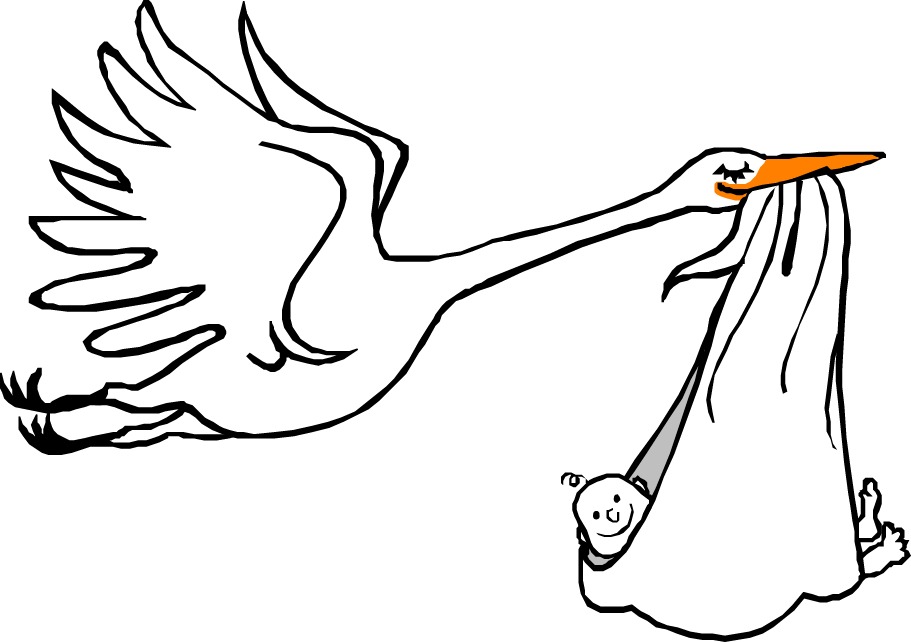
The HOROS Associate student Daniela Bichler has given birth to Leon. He was born on 20.06.2017. We wish him all the best, luck, health and happiness. Daniela is fine and busy with her new task, but is already looking forward to continue her interesting project eventually. But for now the HOROS family wishes her and her son peaceful and enjoying next weeks and is very optimistic that Daniela will organize her new task as effiently as her research.
Picture: www.taufe-texte.de
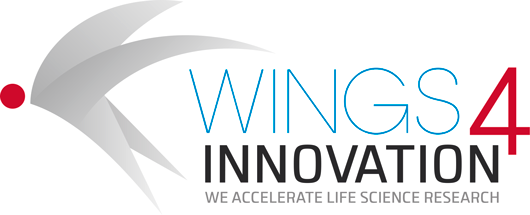
Wings4innovation (w4i) is an initiative of 17 Austrian academic research institutions that aims at establishing an independent Translational Research Centre (TRC) in the field of Life Sciences in Austria to transfer breakthrough basic research into commercially valuable assets. The main focus of this new organization will lie in early stage development of innovative small molecule and biologic drug candidates for human diseases with a high medical need. Once it is fully operative, the TRC intends to become the one-stop-shop for Life Sciences innovation in the region. At present, w4i is exclusively sponsored with € 1,500,000 EUR by the Austrian Federal Ministry of Science, Research and Economy (BMWFW). In order to virtually demonstrate a typical development workflow of promising early stage academic projects in the planned TRC, w4i called Austrian-wide for suitable demo-projects. We are pleased that the HOROS project “Therapeutic development for Candidiasis”, which is basically Samyr Kenno’s PhD project, was eventually selected by the management team of w4i. With contributions from various academic partners, a comprehensive research plan was developed by w4i aiming at validating the biological hypothesis of the project until the generation of first hit candidates. The research plan may now be used as valuable guidance for w4i's other development plans; however, once the TRC is starting its operations and calls for first projects, w4i strongly recommends to submit the Candidiasis project for being selected for 'translation'.

The 6th world congress on hemolytic uremic syndrome (HUS) was held in Innsbruck-Igls from the 11.06. - 13.06.2017. The conference was hosted by the HUS team Innsbruck & HOROS. 150 experts from all over the world presented and discussed their latest research findings. The participants traveled from Africa, Asia, Australia, North- & South-America as well as from Europe to the heart of the Alps.
There were many interesting talks and poster presentations. One highlight were studies showing promising results from a therapy with humanized monoclonal antibodies. Also HOROS students presented their newest achievements. Sneha Chatterjee received a poster price for her work - congratulations, well done, Sneha!
Here you can find a link to the HUS homepage and the programme of the meeting.
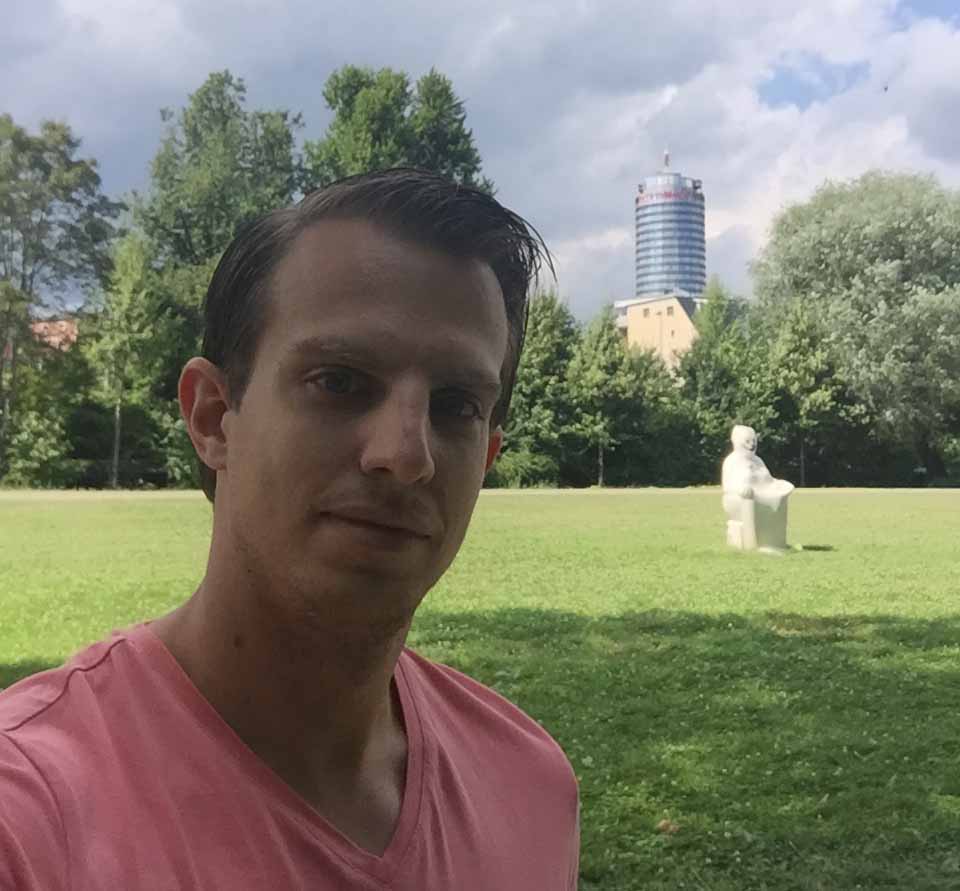
I got the chance to stay for five months at the HKI in Jena in the department of Molecular and applied Microbiology (MAM). One of my PhD-projects is about the interaction of proteins with DNA binding domains and for this issue, there was no better address for me than the lab of Dr. Peter Hortschansky. Jena is a small city, about the size of Innsbruck, located in the east of Germany and a typical student city with lots of pubs and outdoor activities in the surrounding. It offers also a lot of cultural things on german history mostly related to Goethe and Schiller (Weimar is just 25 km ahead) and of course to Carl Zeiss, Ernst Abbe and Otto Schott, who built the base for modern optics and manufacturing (it seems every second street or place here in Jena is named after something, which has to do with the Zeiss manufacture). And last but not least the first thing everybody sees, when one comes to Jena is the Jentower, with a restaurant and a panorama platform in the top of the tower, from where you have an amazing view over Jena and the surrounding hills. The people of the MAM are all very nice and helpful and after some starting problems the work was really successful so far and will hopefully end in a joint paper. Even if Jena is not that far away for a stay abroad, I really enjoy my stay here and it helped me a lot to proceed with my work. So thanks HOROS for giving me this opportunity.
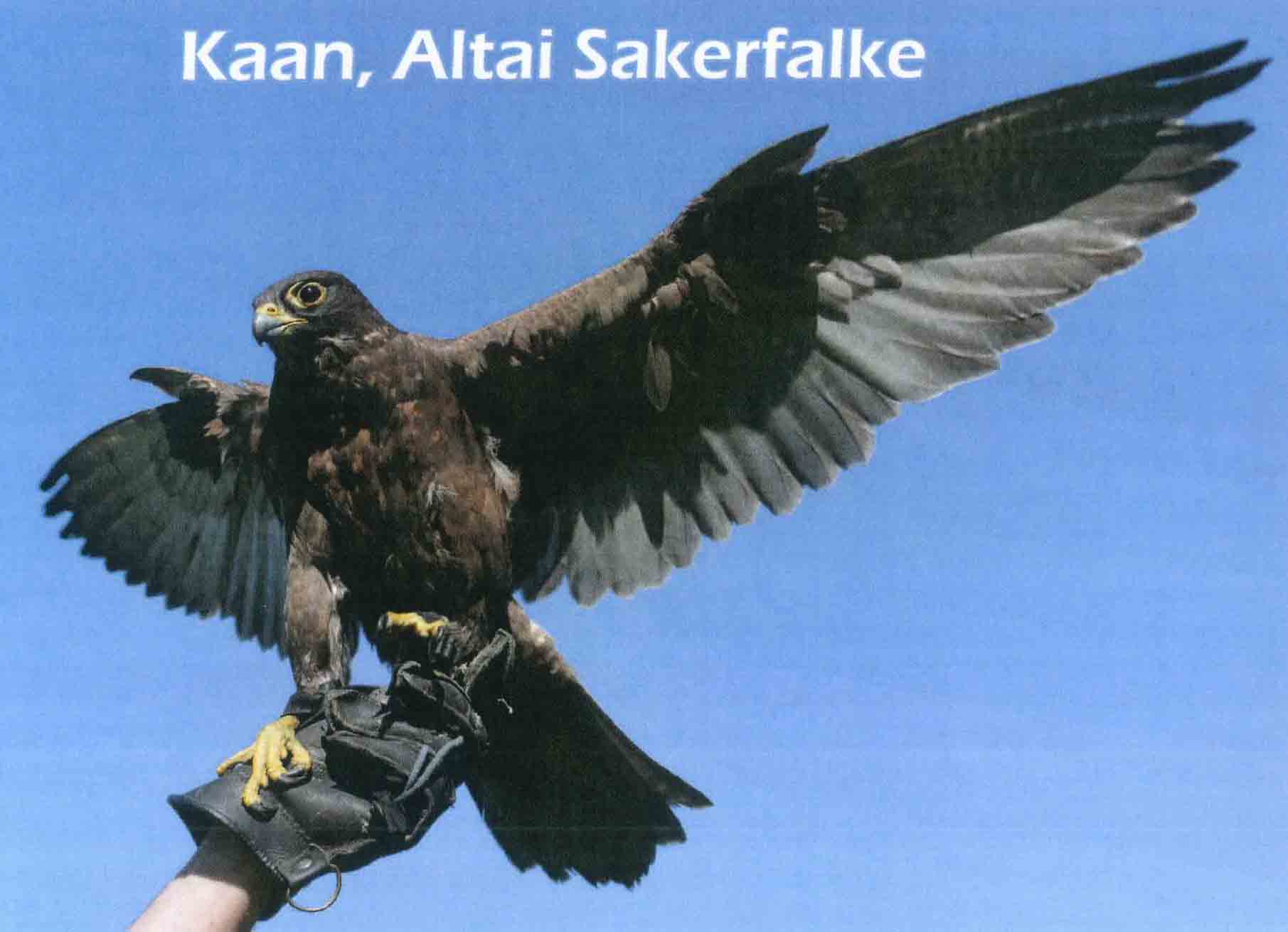
In summer 2016 we went on a day retreat to the Tegernsee region (Germany). One highlight of this day was our meeting with the falcon Kaan. HOROS members collected money and took over a godfathership for 2017. We are happy to have him in our HOROS family:-)
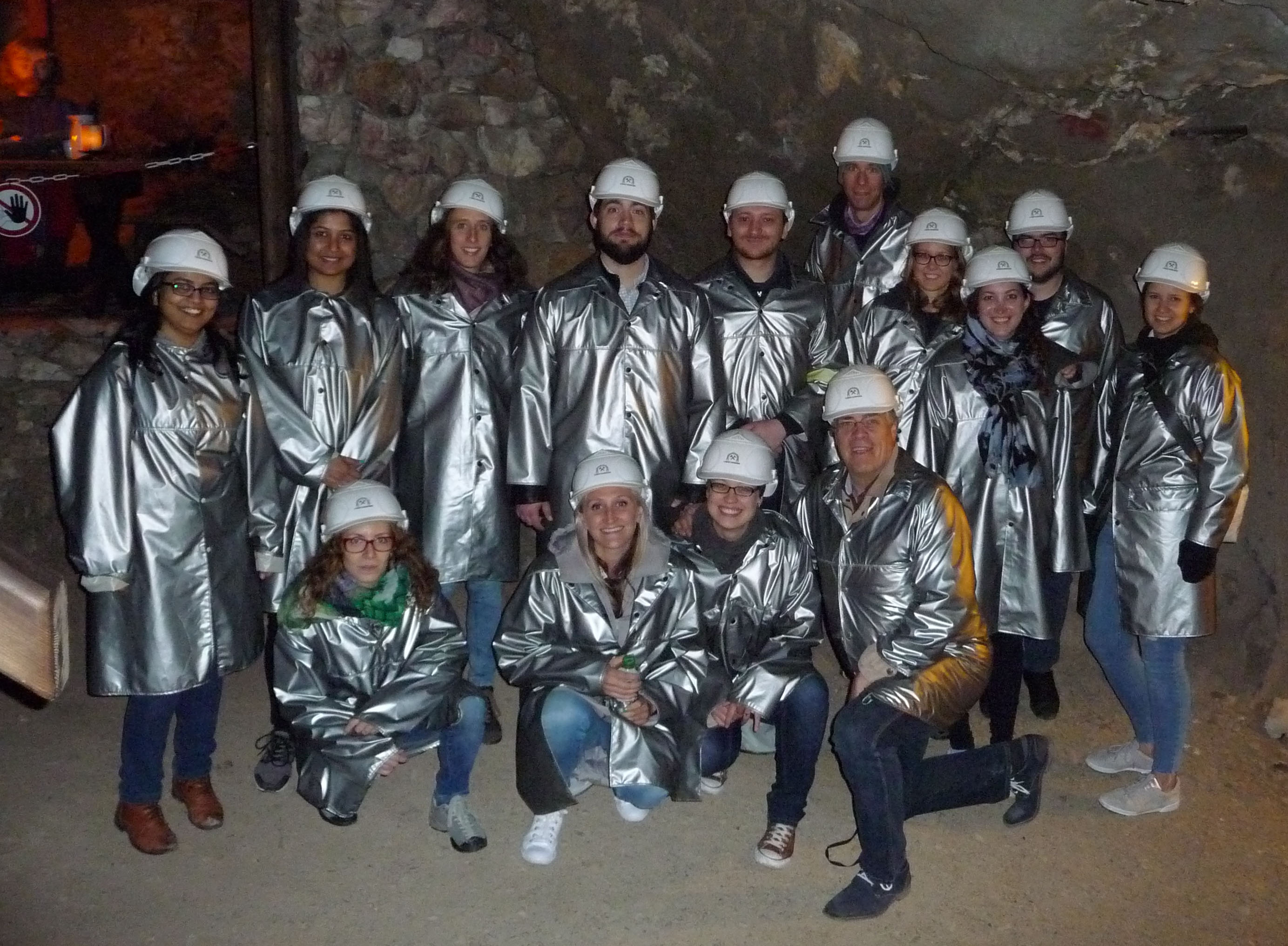
On the 9th of May several HOROS Associated students participated in a day retreat accompanied by some students of the related Infectious Disease PhD programme. The retreat was held in Schwaz and was a perfect opportunity for all new students to get to know the senior students and ask them questions about the HOROS programme. During the retreat there was a 2 hour meeting on housekeeping items, including the schedule for the HOROS retreat in Obergurgl and the HOROS FWF hearing in Vienna, both in September. After the business part most of the students went for a walk through the spring fields and all took a guided tour by mine train and foot into the old silver mine of Schwaz which at it heights accounted for 85% of the total annual silver production in the world.
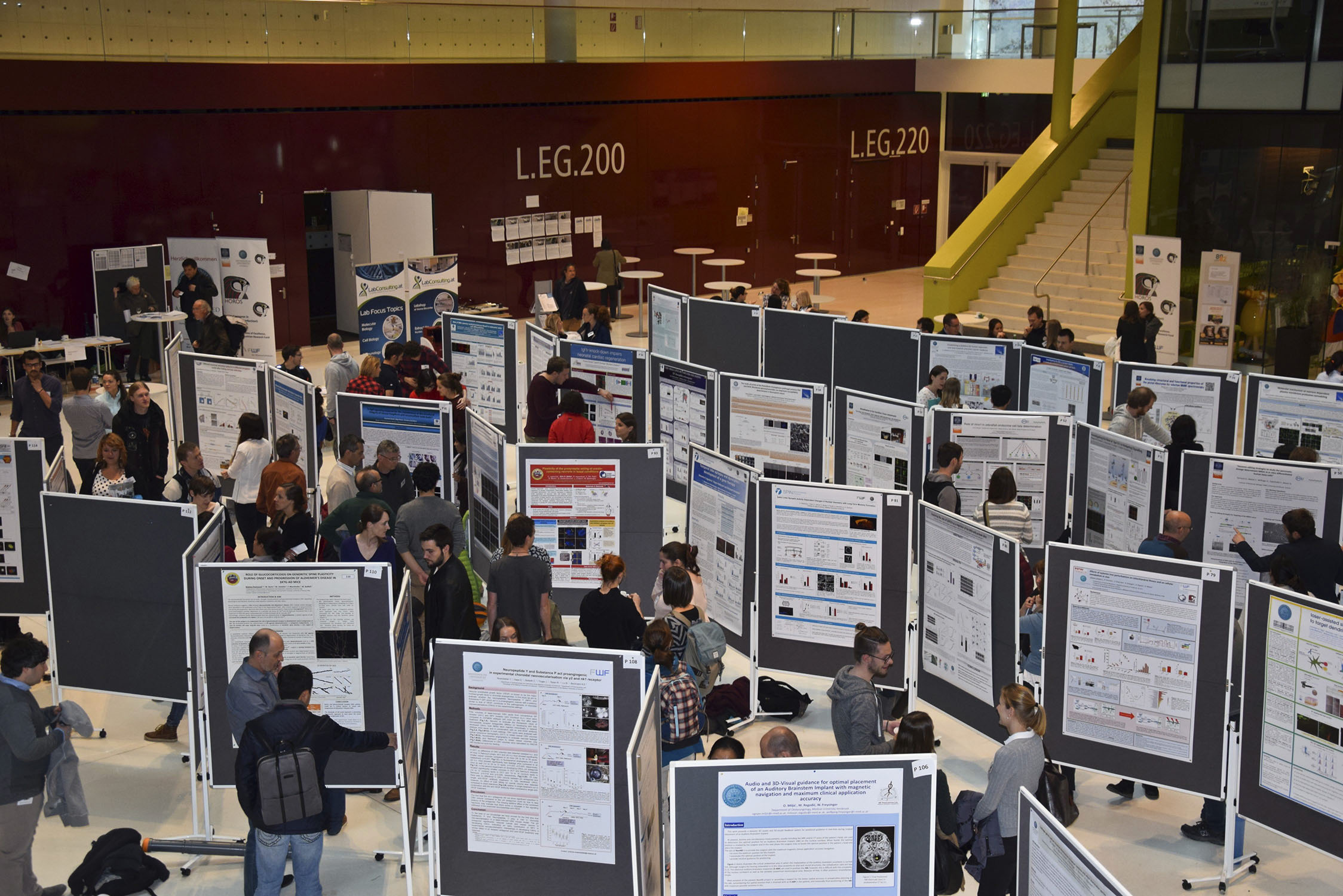
The second Life Science PhD Meeting was even bigger than the first one last year. The meeting was held at the CCB immediately after Easter, on the 18th and 19th of April. All PhD and Master students as well as Post docs from the two Innsbruck Universities who are working in the field of Life Science were invited to participate.. It was intended to provide a platform for students from various scientific backgrounds to facilitate exchange of their knowledge, experience and critical thinking.
As already mentioned in an older news entry we had excellent keynote speakers: C. Becker from University of Edinburgh, J. Köhl from University of Lübeck (who was invited by HOROS, talking on the role of complement in Gaucher’s disease), J.v. Blume from MPI of Biochemistry, Martinsried and A. Sonnenberg from the Netherlands Cancer Institute, Amsterdam. Another highlight was the Careers in Industry Workshop which aimed to introduce Tyrol-based Life Science and Med-Tech companies as potential future employers.
As for the previous meeting selected students got a chance to present their scientific work as short oral presentations in two sessions. The best talk of each session (composed of 12 presentations) was awarded a price - our HOROS student Carina Miggitsch was one of the two awardees, with a talk on the influence of bone marrow adipose tissue on the immune system, Congratulations!!! Another HOROS student, Anna-Maria (Mia) Dietl, was also selected to present her work on virulence factors of the fungus Aspergillus fumigatus. Mia already published some of her data. She did a really great job in presenting as well. Our HOROS speaker, Reinhard Würzner was the chair of the poster evaluation committee. The Life Science PhD Meeting was well percepted and will certainly take place again next year
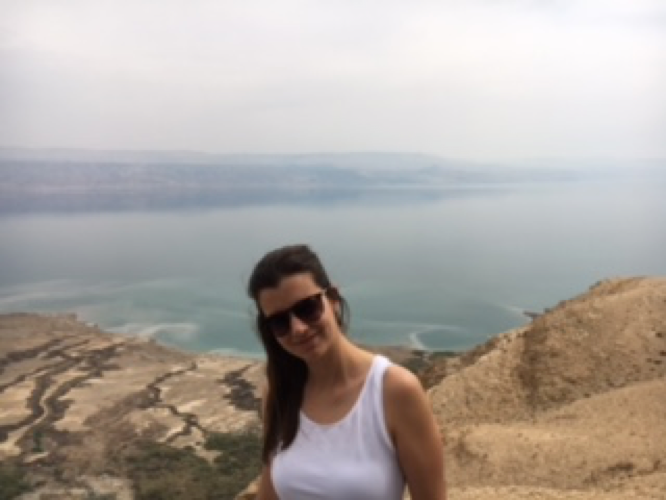
by Anna-Maria Dietl
Already in autumn 2015 I got the chance to stay for one month at Prof. Nir Osherov's laboratory at the Sackler School of Medicine, department of clinical microbiology and immunology in Tel Aviv. Since the beginning of my PhD project with the main focus on the identification and characterization of novel antifungal drug targets, Prof. Nir Osherov has been a close collaboration partner. Therefore, and also because my first stay in 2015 was really inspiring, instructive and forming, I was happy to revisit Tel Aviv and the laboratory group for another two months. The University of Tel Aviv offers small guest appartments at the student dorms (1300 students are living there!) right next to the University campus. The University as well as the student dorms are located in the north of Tel Aviv. Within a 10 minutes bicycle ride you can reach the port of Tel Aviv, beautiful beaches and the city center. In general, israelii people are very sincere, open-hearted and "more relaxed", particularly in the lab and at work (but not on the road traffic!). One thing I definitely learned here in the lab is, for achieving good results you don’t always need to follow the exact protocol. It simply was not possible because compounds were not available, material not washed or autoclaved. So on one hand this allows me to be more creative and interactive and on the other hand I really start to appreciate the working situations in our lab in Innsbruck ;-). So far, the lab work here in Tel Aviv was a success and the collaboration will hopefully result in a joint paper. Beside work, Tel Aviv and Israel offer tons of cool things to do. Therefore, every weekend I take the chance to visit places like Haifa, Jerusalem, the dead sea and the dessert or Akko. Besides that, I am really happy to have amazing lab mates which provide me an insight into typical israelii culture including food, drinks, nightlife and concerts. All in all I am having a great and instructive time in the lab as well as in my spare-time and I am more than happy that HOROS enabled this stay abroad.
View from the lab from the Sackler School of Medicine to the campus
Netanya beach (a city north of Tel Aviv)
Judean dessert , East of Jerusalem and close to the death sea
Homemade pita bread with hummus & dead sea in the background
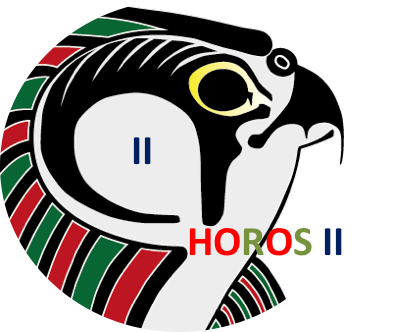
The HOROS faculty, which has lost its faculty member (FM) Katja Kotsch to Berlin last year, is presently applying for a second and unfortunately - due to the new FWF regulations - final period. For this reason we are happy to announce that two of our previous affilate members, Cornelia Speth and Florian Kronenberg will join in as full FMs, as well as Florentine Marx-Ladurner. HOROS-II will be even more concentrating on innate immunity, fungal infections and also epidemiological and innovative translational aspects. As another significant improvement, HOROS-II will include training in clinical medicine and in entrepreneurship, in cooperation with university hospital and local biomedical companies. At present, seven PhD students are directly FWF-funded, but further 11 benefit from educational support and additionally 28 (from the related “Infectious Disease” doctoral programme) from participating in the same improved much more practical teaching courses. In total 46 students are more or less flying with HOROS, presently.
We will have our final rehearsal at our retreat in Obergurgl in front of all HOROS and infectious disease students on the weekend 16/17 SEP 2017. The decisive hearing at the FWF in Vienna will be on 25 SEP 2017. Let's hope for a go-around to new hights.
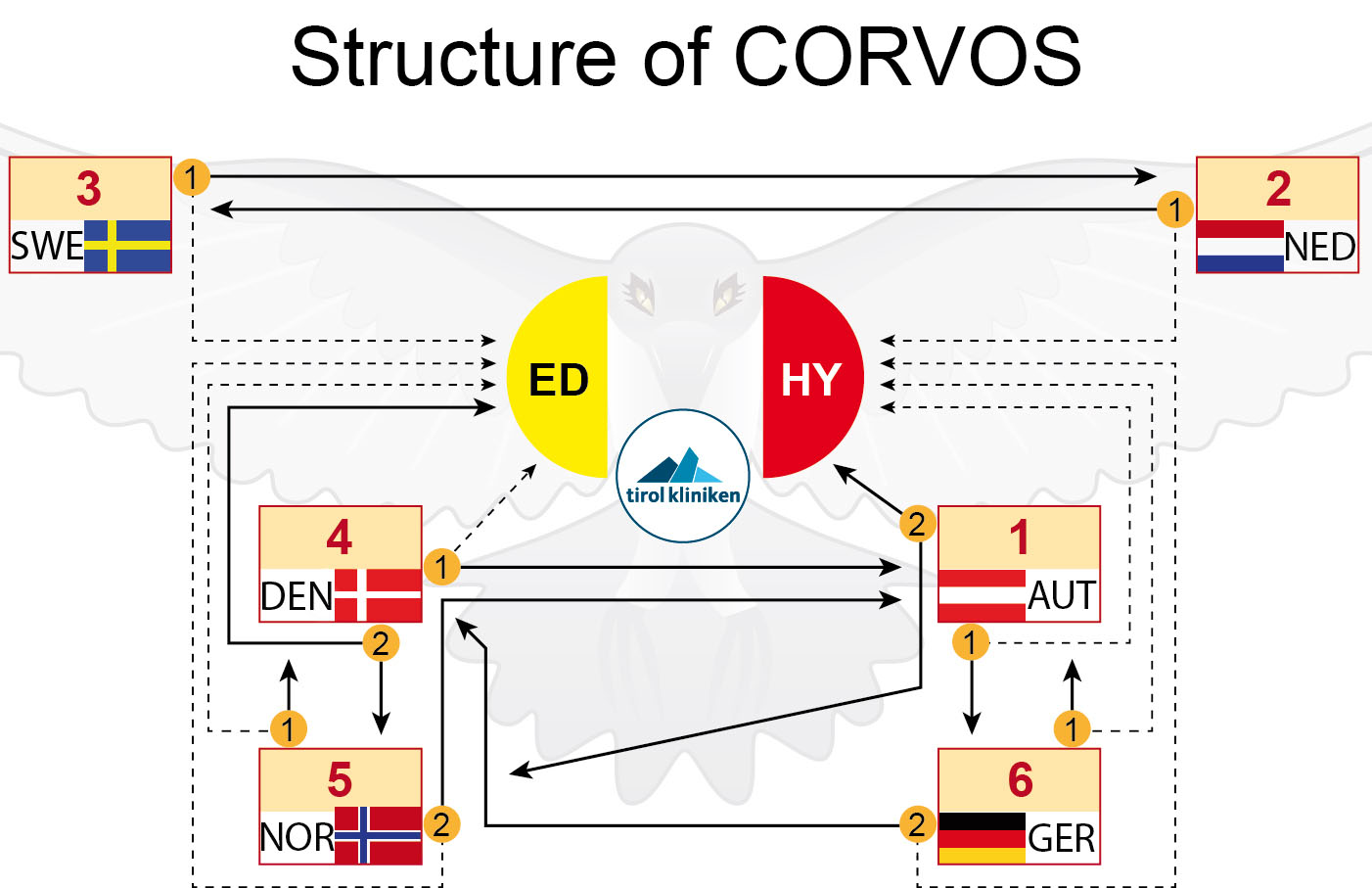
Six acknowledged European universities (Innsbruck (AUT), Utrecht (NED), Lund (SWE), Copenhagen (DEN), Oslo (NOR) and Jena (GER)) from six countries, two biomedical companies (Euro Diagnostica (ED) and Hycult (HY)) and an university hospital (Tirol Kliniken Innsbruck) have applied for an ambitious European Joint Doctorate programme involving innovative science and interdisciplinary training with the acronym CORVOS - for COmplement Regulation and Variations in Opportunistic infectionS - the decision whether this ambitious Horizon 2020 project will be funded, will be in June.
The research objective of CORVOS is to study complement (CO), a chief conductor in the immune defense orchestra, and its regulation and variations in opportunistic infections. The major aim is to find therapeutic ways to support the action of CO and to interfere with its abuse by pathogens to save millions of lives.
Four ambitious research work packages (WPs) are envisaged and the research goals run along the major training objective: Educate ten widely recruited, highly motivated and mobile PhD students to creative sought-after alumni with transferable and entrepreneurial competences.
Research and training will be conveyed by this scientifically well recognized faculty in a collaborative effort. All PhD students will be enrolled in existing interdisciplinary doctoral programmes and which will all award joint PhDs.
CORVOS will involve multiple and also long research and training stays at the different consortium members, including intersectoral ones at two industrial partners and an university clinic. Let's hope for a highly cooperative tandem flight with HOROS.
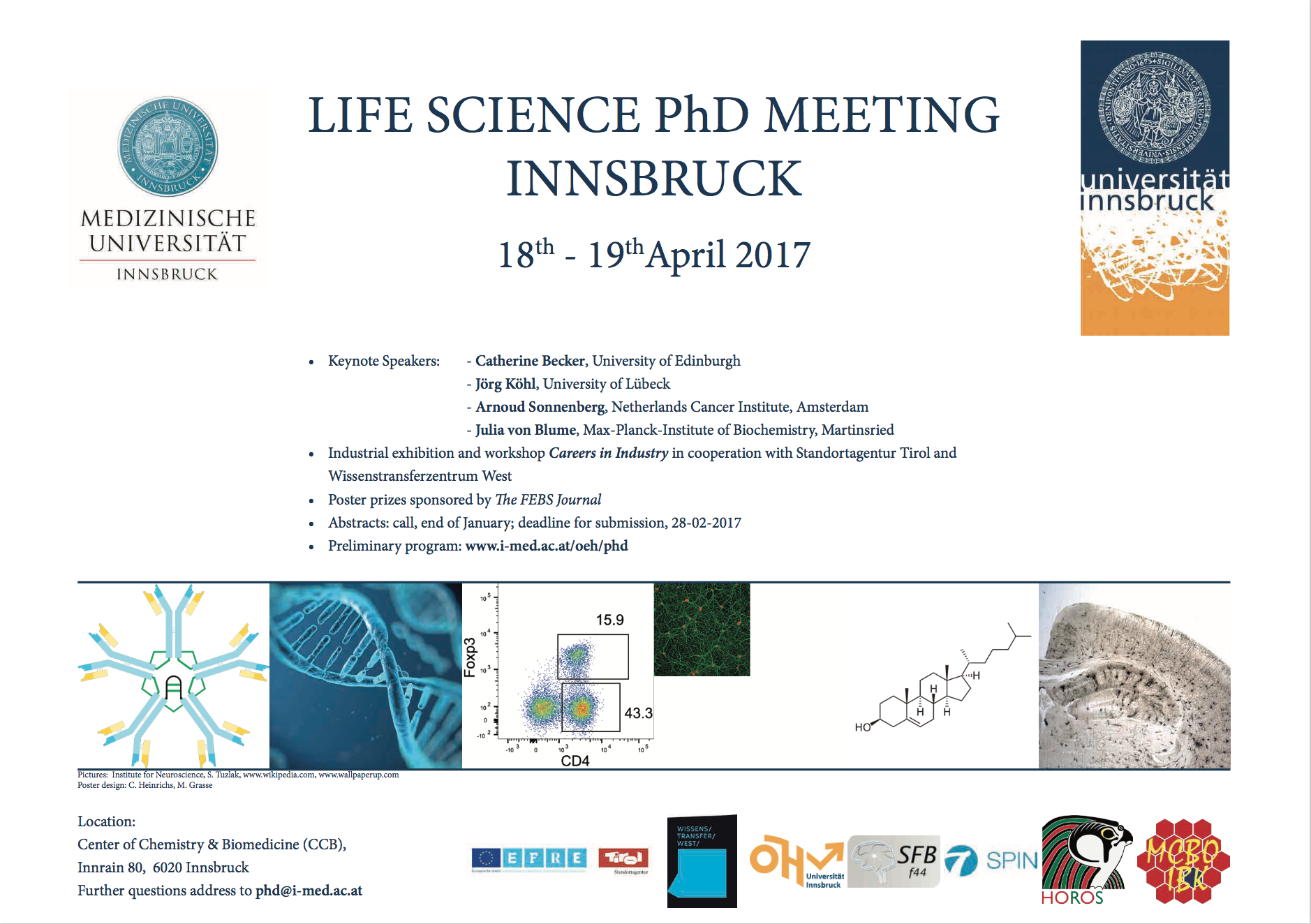
This year's Life Science PhD Meeting will take place from 18.04. to 19.04. at the CCB Innsbruck. It is organised again by HOROS in cooperation with the other FWF-funded PhD programs of Innsbruck, Neurospin and MCBO. Next to the four outstanding keynote speakers listed below, there will be a "Careers in Industry" workshop and 24 short presentations, that are selected from the submitted abstracts. Thus, it is absolutely worth to register and submit an abstract! You can find the abstract form here. The submission deadline is the 28.02.2017.
The keynotespeakers:
Julia von Blume Max-Planck-Institute of Biochemistry, Martinsried
Catherine Becker University of Edinburgh
Jörg Köhl University of Lübeck
Arnoud Sonnenberg Netherlands Cancer Institute, Amsterdam

Within the scope of our beautiful PhD-programme, the HOROS students have the possibility to go abroad for up to half a year. Some students went already to foreign labs to learn new techniques or to broaden their horizon of their thesis-topic. They came back with really nice impressions.
Very soon, a couple of our students will start their journeys to different labs, more or less simultaneously. Here is a quick overview who is going when to which place:
Anna Maria Dietl Sackles School of Medicine, Tel Aviv, Israel - 12.02.-13.04.17
Marco Grasse Statens Serum Institut, Copenhagen, Denmark - 24.02.-31.08.17
Thomas Orasch Hans-Knöll-Institut, Jena, Germany - 01.03.-31.07.17
Samyr Kenno University of Aberdeen, Aberdeen, Schottland - 01.03.-03.09.17
Stefanie Dichtl Max-Planck-Institut, München, Germany - 01.05.-31.10.17
We will have a blog where every student will report his/her impressions from the lab, city & country he/she is working.
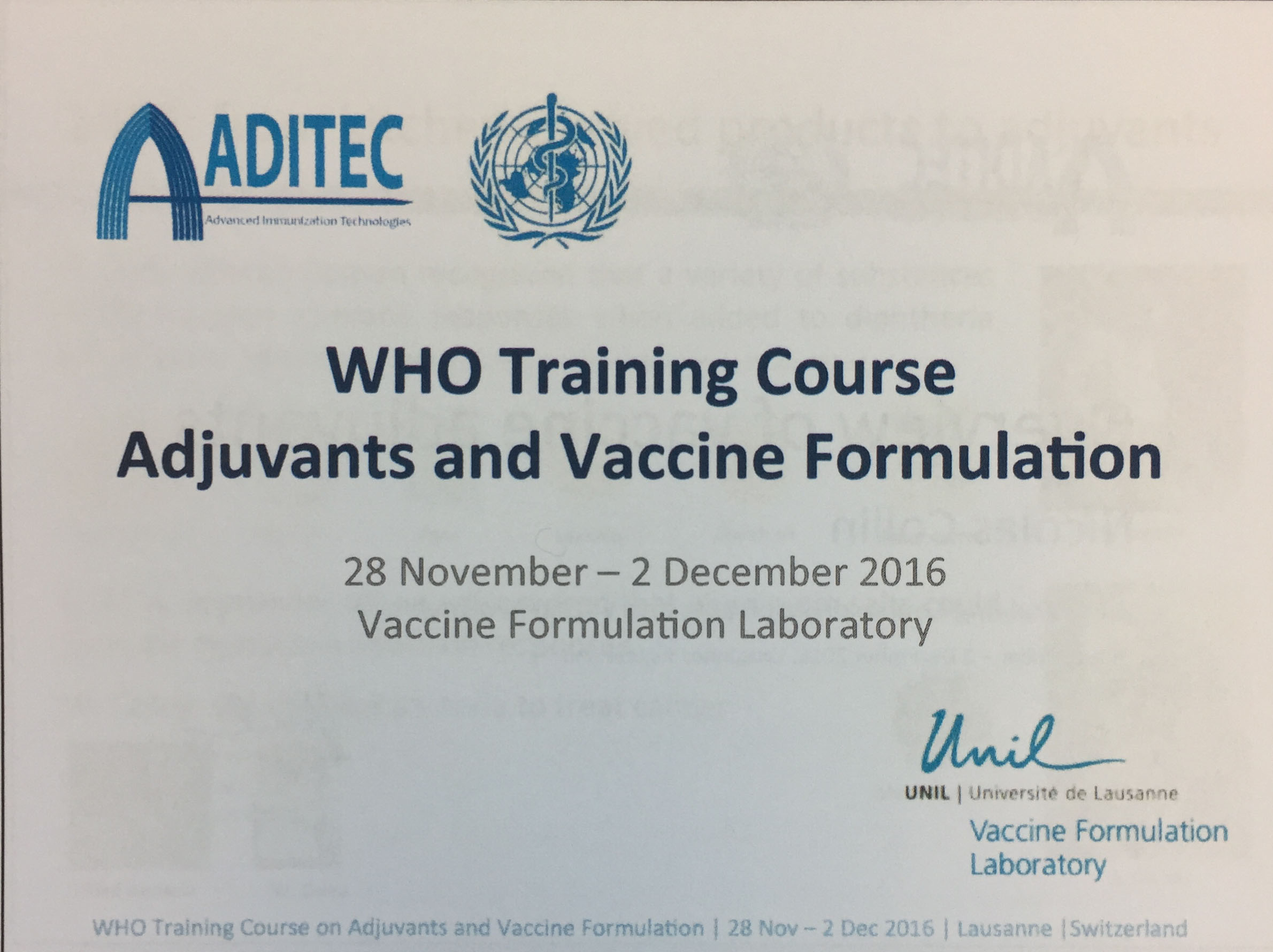
Marco Grasse has been to an adjuvant-vaccine formulation course in Lausanne, Switzerland from 28.11. to 02.12.16. The course was organized by the World Health Organization and the University of Lausanne. Marco learned how to formulate vaccines with different adjuvant systems, such as Aluminium salts, Water-in-oil emulsions, Liposomes and some more. It was an intense and practical orientated course, and Marco is happy that he could participate.
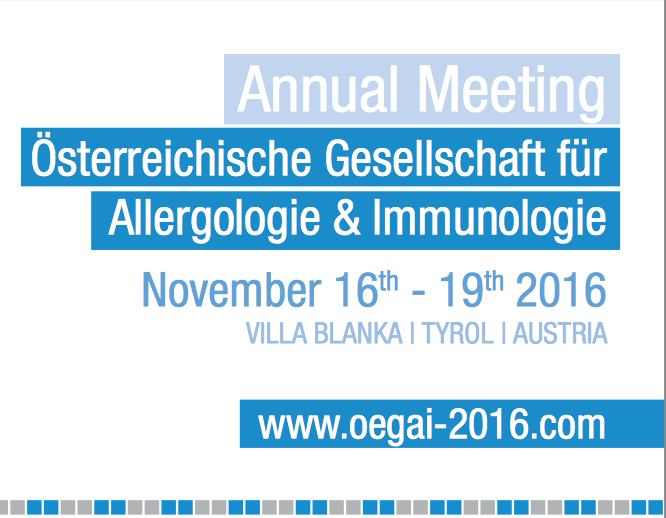
The Austrian Society for Allergology and Immunology (ÖGAI) held its annual meeting in Innsbruck this year. It was a conference with around 200 participants from all over Austria, that took place at the Villa Blanka from 16th November till 19th November, 2016. There were plenty of interesting oral as well as poster presentations. One of our HOROS students, Parul Chandorkar, gave an amazing talk about a 3D in vitro lung tissue model that she developed. With this model one is able to study pathogen - epithelial - immune interactions. The audience was very interested in her work and we are looking forward to read her newest publication very soon!
One highlight of this meeting was (espacially for the students) the social evening on Thursday. New concepts of scientific cooperations were discussed and also the exchange of the latest dancing skills took place. All in all it was an important, nice balanced event.
Our students Carina and Erin recently attended a 4 day summer school in Durres, Albania. The meeting was the 8th EFIS-EJI South Eastern European Immunology School. The girls received training in fluorescence microspcopy and flow cytometry. They met nice people and enjoyed their stay in Albania. Here, you can find more information about the summer school.
On the 11th of July, all HOROS students went on a Day retreat. The meeting was held in the picturesque Tegernsee region of Germany. We had nice talks and interesting discussions. The highlight was our meeting with Kahn, the friendly falcon that is now adopted in a Godparentship, sponsored by the HOROS members. The meaning of HOROS in greek is Falcon, and the HOROS PhD Program is represented by a Falcon as their emblem. Here you can watch some impressions:
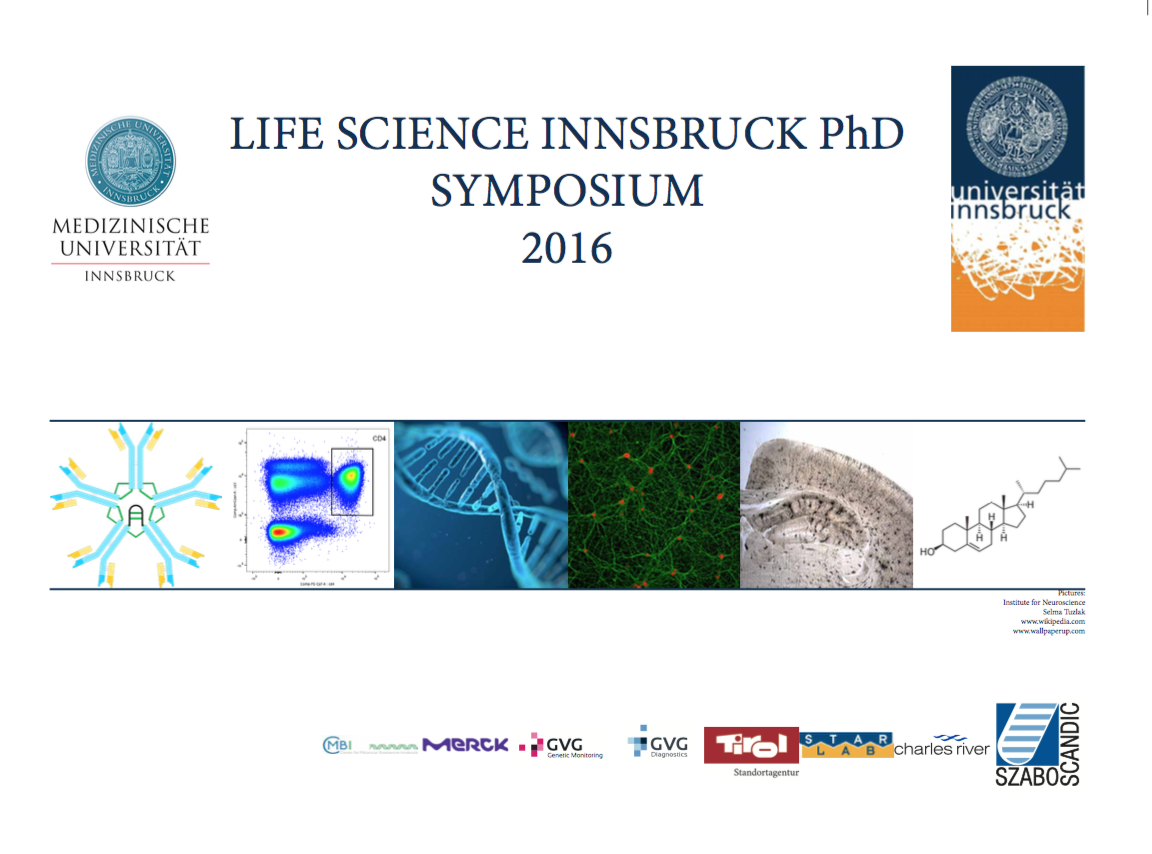
From the 31.03. - 01.04.2016 Innsbrucks PhD students, Postdocs and group leaders working in the fields of cell biology, immunology and neuro science came together on a two day symposium in the new Biocenter Innsbruck (CCB). We had several talks and poster sessions. The best talks and poster presentations were awarded with a small gift. Among the awardee was the HOROS student Anna-Maria Dietl with her poster "Identification and characterization of antifungal drug targets in Aspergillus fumigates“ - congratulation!
The symposium was organized by the student representatives of the PhD programs MCBO, SPIN and HOROS. Here, you can find the abstract book.
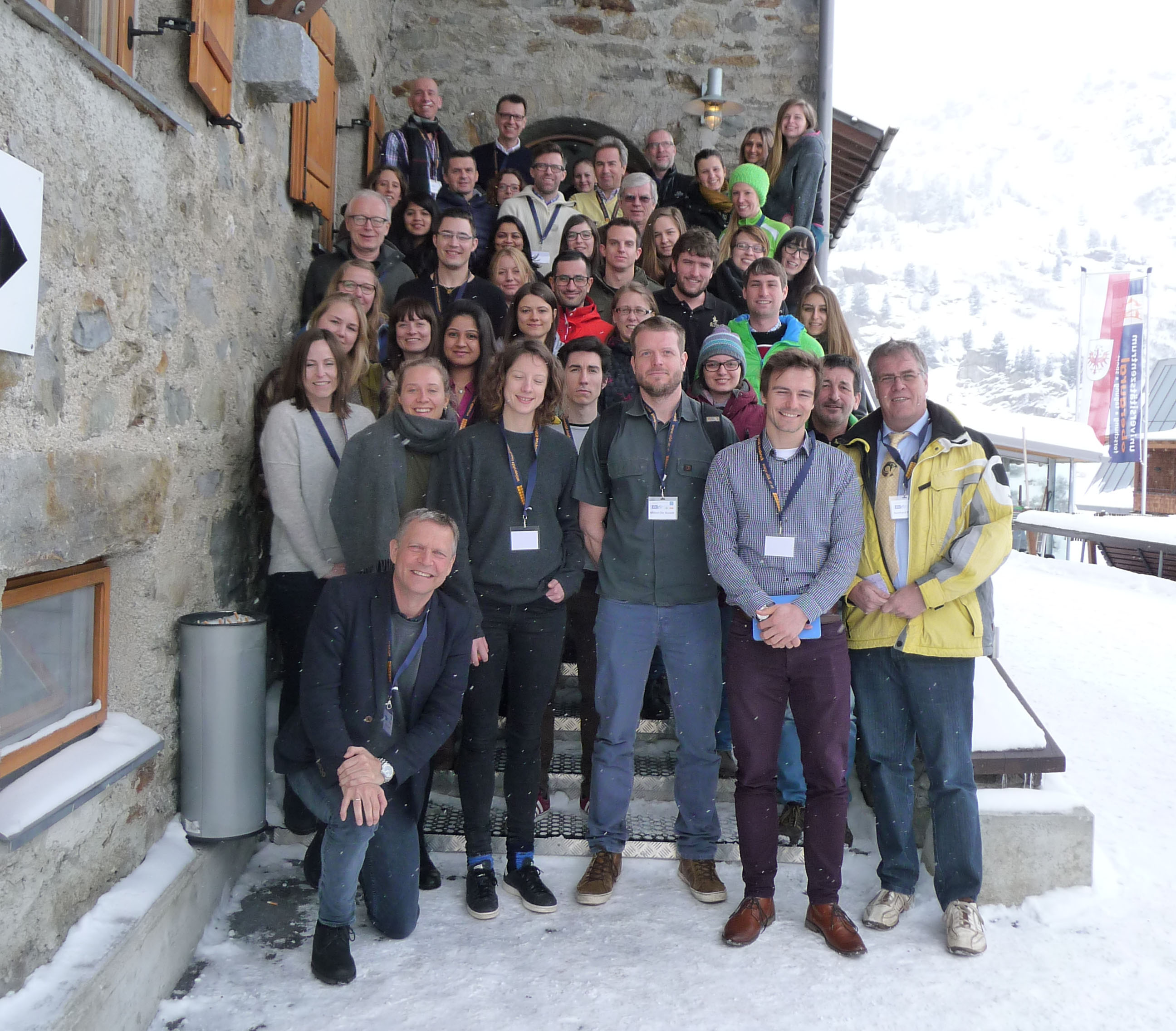
Our PhD program had an amazing retreat to the convention centre of the University of Innsbruck, located in Obergurgl from 06.03.-10.03.2016. We have been there together with PhD students from Copenhagen, Helsinki, Olso and Erlangen. Next to highly demanding debates on innate and adaptive immune responses to infectious diseases we had some hands on opprtunities to meet the ski area Obergurgl/Hochgurgl. All in all we had a great scientific exchange and made many new friends. The students are looking forward to the nex retreat!!!
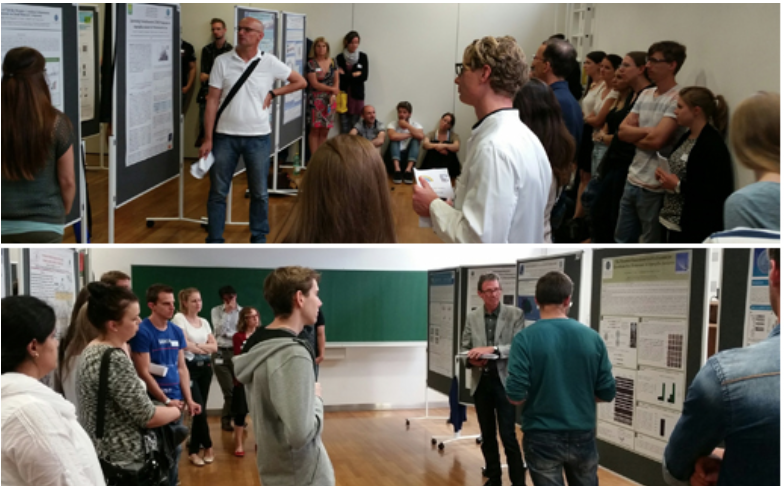
HOROS decided to hold already its very first Science Day together with the CIIT (Comprehensive Center for Infection, Immunity and Transplantation). This event attracted a lot of PhD students also from other doctoral programmes and 48 posters were presented. The highlight was the very interesting lecture by Prof. Martin Röcken, Tübingen, on "Translational development of immunotherapies". Further discussions followed at a light buffet with drinks.
Be up to date! Have a look at our most recent news.

November was Enrique’s month to shine and finally finish his PhD studies by defending his thesis. In the past years, he was developing novel 5-flucotosine-based antifungal therapeutics under the supervision of Prof. Fabio Gsaller at the Department of Molecular Biology, Medical University of Innsbruck. Congratulations Enrique! Good luck with your future work life in the pharmaceutical industry.

In October 2023, it was Annie’s turn to defend her PhD thesis. Under the supervision of Prof. Hubertus Haas, her work at the Department of Molecular Biology, Medical University of Innsbruck was focused on analyzing molecular mechanisms for the adaptation of Aspergillus fumigatus to iron starvation. We welcome Annie to the club of Alumni and wish her all the best for her future.

This year's summer retreat indeed lived up to its name. It was cozy, warm, and exceptionally beautiful—a description that perfectly captures the feelings we experienced while conquering the mountain trails. The day before our departure, it had been raining incessantly. However, as luck would have it, good people tend to have good fortune, and the weather transformed from dreary to irresistibly sunny.
Though we were only a group of five, we initially thought that postponing the retreat to September, when all the PhD students had returned from their vacations, was the right decision. But no. Despite our small number, there was no shortage of lively conversations and a fantastic atmosphere. Our journey commenced with a boat tour from Pertisau, finishing at Scholastika station. During our hike, we enjoyed breathtaking views of Achensee, with its deep blue and turquoise waters. The Mariensteig trail provided a viewpoint higher than the lake, offering an especially captivating view. To the left, the rugged and gray Karwendel mountains contrasted with the vibrant colors of Achensee.
After walking approximately 5 km and immersing ourselves in the Tyrolean landscapes and panoramas, we indulged in a well-deserved meal at a local restaurant in Gaisalm. There, we savored soup with Knödel and each relished fresh trout, undoubtedly fished from the nearby lake.
Without a doubt, we couldn't resist the allure of the lake. Statistics suggest that 6 out of 10 of us dipped our toes in its refreshing waters. It was an undeniable success, and following our swim, we embarked on a further run to warm up. Upon reaching the parking area, we decided to take a break at a café by the embankment to reflect on our tour and discuss upcoming scientific plans, all while savoring delicious ice cream.
Seven hours later, we returned to Innsbruck, brimming with great emotions and invigorated by the abundant oxygen. Such a delightful and vibrant trip would not have been possible without the meticulous organization of Frederik Radvan and Prof. Würzner.

We are thrilled to announce that Azin has successfully defended her PhD on the 5th of September. This long-awaited moment marked the culmination of her studies, and it was truly a cause for celebration. Surrounded by friends, family, and esteemed colleagues, Azin's achievement was met with great joy and pride. Azin was supervised by Prof. Florian Kronenberg, Institute of Genetic Epidemiology. Over the last years, her research has been centered on PCSK9, leading to significant findings that have enhanced our understanding of its regulation and impact on disease. We congratulate Azin on her impressive success and wish her all the best for her future.

In the past years, Lara performed comparative analysis of pharmacokinetics and therapeutic efficacy of new oral and intravenous iron preparations in anemia of chronic disease (ACD) with and without combined true iron deficiency. Some days ago, Lara could successfully defend her PhD thesis to join the growing group of HOROS Alumni. We are very happy for you and wish you good luck for your future path.

In the middle of August 2023, the day of Natascha's defense finally arrived. Natascha's reserach focused on infection with the intracelluclar bacteria Salmonella to uncover molecular mechanisms leading to an inhibition of certain genes which favours infection. Congratulations and all the best for your future!

In the middel of summer, Verena had her defense and subsequent celebration to her newly acquired PhD title. How what an amazing journey you spent the past four years and congratulations to this excellent defense within the field of medical mycology. Thanks to connections made via HOROS and CORVOS, Verena got the chance to pursue a postdoc fellowship in Copenhagen - all the best for that.
September 21st, 2023 - the day of Mario's defense. After doing reserach about the molecular characterization of siderophore uptake in Aspergillus fumigatus for the past couple of years, this summer it was time for Mario to shine and proudly present his thesis to the public. Well done and all the best for your future.

The doctoral programme HOROS (host response in opportunistic infections, www.horos.at), coordinated by the Medical University of Innsbruck, which was approved by the Austrian Science Fund FWF in 2013, later successfully re-evaluated for another four years, and finally granted a transitional phase of 18 months, will now officially end on 31.08.2023. To mark this occasion, the HOROS Faculty invited to a ceremony on 30.06.23 at the AudiMax. Thanks to additional financial support from the MUI, HOROS, whose logo is the falcon, will be able to "fly" for another year until 31.08.24.
HOROS investigates the host-specific factors in infections with pathogens that usually do not kill immunocompetent patients but often cause life-threatening complications in immunocompromised individuals. In the multidisciplinary excellence doctoral programme HOROS, the genetic basis and molecular causes of these so-called opportunistic infections have been increasingly studied for 9½ years. Seven lecturers from the Medical University and Birgit Weinberger, who followed the retiered Beatrix-Grubeck-Loebenstein, from the Leopold-Franzens University, formed the dedicated teaching staff of natural scientists and medical doctors.
At the ceremony, which was musically accompanied by the Anna Schnegg Duo, HOROS speaker Reinhard Würzner from the Institute of Hygiene and Medical Microbiology welcomed all those present and presented small gifts to three of the four previous or present administrators, Benjamin Hetzer, Marco Grasse and Silke Huber, as well as to the pioneer of doctoral programmes in Innsbruck, Bernhard Flucher, whose signature is also visible in the HOROS programme. He and Francesco Ferraguti gave short presentations on the first two FWF-funded doctoral programmes integrated at the MUI, MCBO and SPIN. Flucher also shed light on the beginnings of the doctoral programme culture at the start of the millennium and what it was like before. HOROS benefited from both programmes, but especially from MCBO. Following these two presentations, Würzner presented the special features of HOROS in his short talk, such as
HOROS as a model for CORVOS: Würzner detailed how HOROS became more and more international and how the experiences of HOROS were helpful in applying for CORVOS. CORVOS, with the raven as its logo, is now conducting international research in host response focused on the complement system in opportunistic infections. This programme, approved in 2019, supports 15 PhD students across Europe in an EU-funded Marie Skłodowska Curie Horizon 2020 Innovative Training Network at 10 European universities. Two of the MUI students spent half a year each in Budapest or Lübeck, while three students from Budapest and Lübeck, but also Oslo, spent half a year in Innsbruck - all of them are to receive a "Double PhD" degree from two universities each after successful completion of their studies.
Bridging HOROS to the clinic and the Leopold-Franzens University: A trademark of HOROS is to build a translational bridge between basic research and clinical application. Günter Weiss, Director of the Innsbruck University Clinic for Internal Medicine II (focus on infectiology, immunology, pneumology and rheumatology) and Cornelia Lass-Flörl, Director of the Institute for Hygiene and Medical Microbiology, stand for this. Hubertus Haas and Florentine Marx-Ladurner from the Institute of Molecular Biology are on the team for basic mycological research. Florian Kronenberg represents genetics, another MUI focus. Beatrix Grubeck-Loebenstein from the Research Institute for Biomedical Ageing Research at the University of Innsbruck, who has been the deputy spokesperson for many years, and now Birgit Weinberger, have bridged the gap to the LFU.
Benchmarks for HOROS: HOROS was ultimately supported with over 5 million euros, with 60 students being financed with congress trips, stays abroad at renowned institutes - often for several months. Furthermore, some received transitional funding after completing their studies, 14 students were financed for the entire 4 years with salary and research consumables. In total, even more than 100 students at the Innsbruck campus have benefited from this PhD programme and especially from the practical training. "The feedback from our PhD students has mostly been enthusiastic," explains HOROS speaker Würzner, "so we are pleased to be able to look back on almost 10 years of successful PhD training.
Students' view and look into the future: The last presentation was given by the students, represented by Hussam Abd El Halim and Cristina Schöpf, who reported on the various retreats, excursions and company visits in a beautifully illustrated talk. Würzner also presented them with a small gift. At the end of the festive programme, as in between, harmonious pieces by the musical duo, most of which were also about birds, rounded off the festive programme. There was an opportunity for personal exchange and a look into the future - during which the importance of the HOROS badges for the 'corporate identity' of the emerging alumni network was emphasised - at the subsequent standing reception in front of the AudiMax with buffet, where many celebrants enjoyed themselves for a long time.
Tasks of a Doctoral College: Doctoral colleges (DKs) are intended to form training centers for highly qualified young academics from the national and international scientific community. They should support the development of scientific priorities at Austrian research institutions and promote the continuity and impact of such priorities. A doctoral college can only be anchored at research institutions with the right to award doctorates. Further information: https://www.fwf.ac.at/de/forschungsfoerderung/fwf-programme/dks/

On June 19th, 2023 Lisa was the first of our excellent CORVOS students to defend her thesis. In the past three years, she developed immunoassays for the measurement of C1s/C1-INH complex and MASP-1/C1-INH complex in human serum and plasma. Finally, these assays were characterized and validated in cohorts of COVID-19 and sepsis patients. Both complexes were proven to be specific biomarkers for early classical and early lectin pathway activation. Lisa was supervised by Prof. Zoltán Prohászka, MD, PhD from the Doctoral School of Theoretical and Translational Medicine Semmelweis University, Budapest, Hungary and Prof. Reinhard Würzner, MD, PhD from the Institute of Hygiene and Medical Microbiology, Medical University of Innsbruck, Innsbruck, Austria. In addition to her main studies in Budapest, Lisa spend 6 months at the Medical University of Innsbruck (Austria), did 1 month clinical training at the University Hospital in Helsinki (Finland), did 1 month of industrial entrepreneurship and 6 months industrial secondment at Hycult Biotech (The Netherlands). Congratulations, welcome to the Alumni club and all the best for your future.

June 14th, 2023 was Anant’s big day!!! He finally defended his PhD thesis. after many years of hard work in the lab where he tested fungal-derived antimicrobial proteins and small antimicrobial peptides as potential treatment for fungal infections. Anant was supervised by Prof. Dr. Marx-Ladurner, Institute of Molecular Biology, Medical University of Innsbruck. Congratulations!!! We wish you all the best in your future industrial career in Munich and hope you come back for a visit.

In March 2019 HOROS Student Sára started as a PhD candidate at the Institute of Hygiene and Medical Microbiology. Her studies were focused on the structure of Shiga toxin 2a, the main virulence factor in EHEC infections potentially causing severe disease, and their interaction with human host factors. On the 20th of April 2023, the long-awaited moment of the end of her PhD studies in the form of her defense happened. With an excellent talk and a great discussion, she successfully finished her PhD studies. We wish all the best for your exciting future in Vienna.

We started our retreat with a scenic car ride to the charming Kühtai and then walked for 45 minutes to reach the Graf-Ferdinand-Haus. The walk was enchanting with the snow-clad surroundings creating an idyllic winter-wonderland experience. After Prof. Würzner conducted an enlightening lecture on tick-borne encephalitis, we had a cozy dinner and engaged in some friendly conversation. We were already looking forward to the sledging adventure that awaited us. As expected, the exhilarating sledging downhill was an absolute blast!

After 4 years, on 25th of January 2023, Roya successfully defended her PhD thesis. Supervised by Prof. Dr. Cornelia Lass-Flörl, she investigated Aspergillus terreus using a model to study in vitro and in vivo persistence, tolerance, and resistance to drugs at the Institute of Hygiene and Medical Microbiology, Medical University of Innsbruck. Thanks to HOROS, Roya was able to spend 6 months at collaboration partners at the Westerdijk Fungal Biodiversity Institute, Utrecht, Netherlands, were she focused on the description of species within the Aspergillus section Terrei. However, congratulation Roya, we are happy that you did this great job and will keep on working on this project as a postdoctoral researcher.
With great pleasure, HOROS can report from the latest Entrepreneurship visit at MED-EL in Innsbruck on Thursday 2nd of February. The company is world-leading in the design and production of hearing implants supporting people suffering from hearing loss to (re-)enjoy sound. Their hearing solutions for young and old include a wide range of products, from cochlear implants to bone conduction systems.
To learn more about hearing, hearing loss, and respective solutions, we visited the Audioversum Science Center beforehand and enjoyed a great tour throughout this interactive exhibition. Lastly, we entered the MED-EL world and got familiar with mission, history, and products of this company. To discuss our impressions and experiences we had dinner at a very nice restaurant in the heart of Innsbruck.
The next day, Mrs. Ursula Bayer, Project Manager for Education & Training at MED-EL, hosted us and gave us an interesting and interactive presentation of the company followed by a fascinating factory tour. The latter gave us insights into the technical background of designing and producing hearing implants. Lastly, we had the chance to talk to Mrs. Caroline Schenk and Anna Himmler from Human Resources who showed us interesting career options in different departments at MED-EL.
We are grateful that MED-EL hosted us and organized such a pleasant event – we’ll be back!

For the first time after 3 years our annual Retreat to the beautiful Obergurgl could be held from 07th to 9th of January 2023 without restrictions. Once again members of two PhD programmes of excellence, HOROS (Host response in opportunistic infections) and CORVOS (Complement regulation and variations in opportunistic infections) as well as local PhD candidates from the IIT (Infection, Immunology, and Transplantation, Innsbruck, Austria) program came together to enjoy scientific discussions and do networking to push their research projects forward. Renowned scientists from across Europe, including Jörg Köhl (Lübeck, Germany), Seppo Meri (Helsinki, Finland), Tom Eirik Mollnes (Oslo, Norway), Peter Garred (Copenhagen, Denmark), Zoltán Prohászka (Budapest, Hungary) Mohamend R. Daha (Leiden, Netherlands) representing CORVOS as well as Christian Karsten (Lübeck, Germany) and Mikkel-Ole Skjødt, both member of the HOROS advisory board, participated and inspired with their talks. Especially for our PhD candidates it was a perfect environment to prove their scientific and presentational skills in front of experts in the field of opportunistic infections and immunology in a relaxed and private atmosphere. Additionally, representatives of the CORVOS industrial partner Hycult Biotechnology (Uden, Netherlands), namely Loek Willems, Eirik Toonen, and the CEO & Owner Ronald de Niet as well as of the company Novartis (Schaftenau, Austria), Marco Grasse (former CORVOS Administrator) were present.
Besides a tight schedule, there was still time for networking and team building with PhD students and principal investigators. The majority of participants enjoyed skiing at the lovely nearby slopes or assisted one another in learning how to ski while some went hiking or sledding. Another highlight was ice-skating were we played the popular Hungarian “catch on ice” game. No matter the favorite sport, they were all ideal for interacting with other scientists.

After one year of incertanty concerning a stay abroad due to the COVID-19 pandemic, I could succssefully go to Oeiras-Portugal for 3 months , from April to July 2021. There, I was lucky to join the Inflammation Laboratory of Prof. Miguel Soares as a HOROS Student, in the Instituto Gulbenkian de Ciencia. I worked aside with the post-doc Qian Wu, in an interesting project about the interaction of Primary Renal Proximal Tubule Epithelial Cells (RPTEC) and malarial anemia.
The whole group from Prof. Miguel Soares was very nice and welcomed me with opened arms, as I was one of their students. Especially, Qian Wu taught me a lot about his project and I quickly became a part of it. I was able to perform previously known methods as flow cytometry analysis, RT-PCRs, Western Blots, c-DNA preparation and quatification, as well as new methods like the isolation of kidney macrophages and RPTEC. Most importantly, I learned a lot about their malaria mouse model, which was a new animal model for me.
I am happy to say that my stay in Portugal allowed me not only to reinforce the use of previously known methods in another laboratory with other equipments, but also to acquire theoretical and practical knowlegde about malaria and a malaria mouse model.
The country and the people treated me very well and I felt every day very lucky to be there!

Innsbruck has a long history of training PhD candidates in biomedicine. Initiatives to build an "international state of the art" in PhD education were started even two years before the Medical University of Innsbruck was founded in 2004. Last week, 20 years of effective PhD education in Innsbruck were celebrated!
Vice-Rector Bandtlow emphasized Georg Wick's exceptional achievement in convincing the relevant ministry to fund doctoral programs at Austrian institutions between 2003 and 2005 while serving as the President of the Austrian Science Fund (FWF). After all, the Medical Institution of Innsbruck was the first Austrian medical university to provide an FWF-funded Doctoral College, and the program's success ultimately helped universities to further establish organized doctorates.
The doctoral programs at the Medical University of Innsbruck that have been and are still being funded by the FWF and the EU are known by the acronyms MCBO, SPIN, HOROS, CORVOS, as well as CavX, IGDT+, and CBD. Some of these programs have been run in collaboration with the University of Innsbruck, hastening the internationalization of doctoral training.
Besides Bernhard Flucher whose PhD college MCBO was seen as a “role model” for other Austrian medical graduate colleges, Reinhard Würzner’s dedication to doctoral education by being the speaker of HOROS and the first EU doctoral college in the life sciences sector coordinated by an Austrian university, CORVOS, was particularly highlighted.
Photo: D. Bullock, MUI

What better occasion to walk in the snow for the first time of the year than a Summer Retreat? On September 28th HOROS/CORVOS/IIT students embarked for the annual retreat, in the direction of Sölden in the Öztal valley, Austria. Their mission? The 007 Elements, a James Bond cinematic installation on the top of Gaislachkogel.
As they arrived in the valley of Ötzi, they were led to a local pizzeria minutely chosen by Hussam (HOROS) where they had early meal. This pit stop was also the occasion for Prof. Reinhard Würzner to update students on various matters such as lectures, publications, social media or secondments.
After refuel, the group headed to the gondola to access the 007 Elements, overhanging the valley at 3.040m. Originally, it was planned to hike up to the top, however, it had snowed during the week in Sölden and therefore, the idea was abandoned. And indeed at the Bergstation, some realized that actually skiing clothes could have been a serious option.
007 Elements stands as a memory of the James Bond movie SPECTRE scenes that were filmed in Sölden. The premises take the visitors through different rooms to discover the James Bond saga origins but also reveal the making of some iconic stage sets or action scenes, with a focus on the SPECTRE movie. Fans would have also appreciated the display of famous objects such as the golden gun or the explosive watch.
Ending the visit, the group was greeted outside by snowfall. Probably a good way to signify the end of this lovely Summer Retreat.
On the 16th of September 2022 researchers from the Medical University of Innsbruck met at the 8th CIIT Science Day with HOROS & CORVOS, which had been organized with great commitment by Thomas Sonnweber, Doris Wilfingseder and Wilfried Posch. In the seminar rooms of the MZA, allocated researchers and PhD students presented almost 50 current research projects in demanding poster sessions. Additionally, Univ.-Prof. Dr. Andreas Bergthaler from the Institute of Hygiene and Applied Immunology (Medical University of Vienna) was invited to the event and delivered an exceptional keynote lecture. The lively scientific exchange followed by a light buffet with drinks made this year’s Science Day a resounding success. We want to thank all people involved in the organization and the participants for this interesting and stimulating meeting.

On September 19th, 2022, members of the CORVOS and HOROS programmes visited the Meinhardinum in Stams, a high school located in the heart of Tyrol, Austria, to bring pupils closer to research and scientific work. After an introduction about the CORVOS and HOROS programmes by Prof. Würzner, the speaker of CORVOS and HOROS, in front of three final-year classes, PhD students individually presented their cultural background and their motivation to achieve a PhD. This was done in smaller groups, i.e. in three class rooms. Since all PhD students were female, pupils got the view that everybody, independent of gender, can find a place in science. In addition, the role of females in science was particularly discussed. Furthermore, students talked about their experiences and acquisition of subject-specific and soft skills during their studies. Finally, pupils had the chance to ask any questions regarding their potential scientific future. We hope that our enthusiasm for research inspired some of the pupils to strive for a career in science and to aim for a doctoral degree. Overall, it was a very nice experience for both sides, pupils and PhD students.

In 2021 I had the chance to travel to Amsterdam for a 3 months secondment (October-December). As HOROS associate student I was excited to join the lab of Pr. Teunis B. H. Geijtenbeek at the Amsterdam University Medical Centers. Their expertise lies in dendritic cells-pathogen interactions that they investigate using infection model such as ex vivo human tissue or relevant cells. For instance, a really cool technique they do is an extraction of primary Langerhans cells from human skin to better understand the role of this specific subset of dendritic cells during mucosa-associated infection. My stay was an opportunity to learn about dendritic cells during infection and signaling but also to witness the exciting environment and opportunities the close connection Lab – Hospital setting brings. Thanks to Marta Bermejo-Jambrina, PhD, who helped me, I could start working with our 3D cystic fibrosis lung tissue model to characterize cytokines and other genes expression upon SARS-CoV-2 infection.
Not only could I enjoy the lab and the lovely people, but I could also wander in Amsterdam and surroundings. The city is beautiful and very lively as well as international, which make it easy to live in. Definitely, I will remember at least canals, bikes, cheese, tulips and oliebollen (taste much better than it looks). I was happy that family and friends could come and enjoy with me, and despite tough regulations due to COVID-19, I felt lucky being there.

As a HOROS associated student, I was given the chance to go for a 3 months exchange program (October to December 2021). This was brilliant, because I had the opportunity to join Prof. Christoph Binder’s group at the Medical University of Vienna. Joining Binder’s lab was a great experience for me as I could learn tremendously from their expertise in the role of immune responses in atherosclerosis. Therefore, in Vienna I worked on a different research topic: OSE-specific immune responses in patients with age-related macular degeneration and controls from the AugUR study. During my 3 months stay, with the help of Mrs. Maria Ozsvar Kozma, we performed six different ELISA assays on approximately 2,000 samples. Although my stay in Vienna was for a short period, I successfully achieved my aims and made the most out of it. I could only achieve this because of the friendly environment in the laboratory. All members of Binder’s lab were very welcoming and always involved me in their social activities.
Aside from work, I also had some time to explore Vienna. It has now become one of my favorite cities. Some of my friends from Innsbruck visited me, which made it even better! Overall, I am grateful for this opportunity as it allowed me to gain a new set of skills in one of the best labs in Vienna. Additionally, I also made wonderful friends with whom I will stay in touch and hope to see them very soon.

From July to December 2021, I had the chance to do part of my Ph.D. thesis in the Netherlands. I joined Prof. Dr. Patrick Rensen’s group at the Leiden University Medical Center. As in Innsbruck, I work with cholesterol metabolism in infectious diseases, and being part of Patrick’s group for six months was the perfect opportunity. The Rensen Laboratory focuses on glucose and lipid metabolism and its connections with metabolic diseases. They have the APOE*3-Leiden.CETP mice, a unique tool in the study of cardiovascular and metabolic diseases. I could use this model in my research and obtain very interesting results. I learned many new techniques there and had a great time with Patrick and all the other people from the group, who are all very kind.
Life in the Netherlands was great, despite the rainy weather. I enjoyed the food, the nature, the architecture, and the culture. Leiden is a small but very international university city, which carries a lot of history. Although I worked there, I was living in The Hague, the administrative and royal capital of the Netherlands. Also, I could visit a lot around, as many interesting cities are nearby and the country has an amazing railway network.
I feel very lucky for this great experience, and especially for being able to have my family there with me.

On Tuesday 12th of July, the HOROS, IIT and CORVOS PhD students went on a trip to Roche, located in Penzberg, Germany. Our excursion started with a general introduction about the history and the enterprise philosophy of the biotechnology company that by now has over 7,200 employees in Penzberg. We learned that Roche is one of the world’s largest biotech companies that is well known for providing a broad range of pharma products and in-vitro diagnostics. Dr. Klaus Reichert guided us through the campus and we got to see where the manufacturing processes take place. At the end of the guided tour, we enjoyed the view over the campus from the top floor of one of the main buildings.
As the last item on the agenda, we enjoyed a very interesting talk by Dr. Pavel Kubalec who gave us insights on in-vitro diagnostics. He demonstrated the entire process of an assay development and we had the chance to ask all of our questions. We have learned that the company provides a broad spectrum of perspectives for us as PhDs, starting with Manufacturing, Data Science or Research and Development. After a two hours bus ride, we arrived in Innsbruck again and discussed our visit at Roche over dinner at Stiegl-Bräu.
Special thanks to Frederik, Silke and Reinhard for organizing this event and of course, we want to thank the team at Roche for providing us interesting insights into their company.

On 07th July 2022, it was time for Alex to be in the spotlight for his final challenge before receiving his Ph.D. degree – the defense! Under the supervision of Prof. Dr. Günter Weiss, he achieved his degree at the Department of Internal Medicine II, Medical University of Innsbruck, by investigating differences in a host’s metabolic response pattern and the effect of iron supplementation when infected with intra- or extracellular bacteria. Great job, Alex! We wish you a lot of fun on your well-deserved trip.

Despite technical challenges caused by the cyber attack on the IT infrastructure of the Medical University of Innsbruck, Silke was able to defend her Ph.D. Thesis on 20th June 2022. Her work was focused on improvements and novel insights into the diagnosis of bloodstream infections (BSIs) by identifying blood components interfering with a certain molecular-based assay, investigating extracellular vesicles as a potential biomarker for BSI, and the genomic and phenotypic analysis of linezolid-resistant Staphylococcus epidermidis using whole genome sequencing. Silke will continue working in the same research group as the new administrator of HOROS after Marco has started to work in the industry.

On the 20th May 2022 the doctoral programmes of excellence, HOROS and CORVOS, joined the Long Night of Research, where teams of researchers made the fascinating world of science visible for the interested general public through experiments, workshops and live presentations in different institutes all around Austria.
At our booth at the Centre for Chemistry and Biochemistry (CCB) in Innsbruck we guided people into our world, showing what our research can do and to which innovations we contribute with our everyday work. From establishing tridimensional lung models to distinguishing healthy or infected tissues under a microscope or checking how many microorganisms we have on our hands, everybody, from children to adults, could actually play with science.
In addition to this, HOROS students Christina Schöpf and Verena Harpf and CORVOS student Giulia Bertacchi presented their PhD programmes together with the coordinator Reinhard Würzner, explaining what it means to be a PhD student and guiding people, especially young women, and made them interested in pursuing a PhD of their choice.
.png)
The Pint of Science festival strives to provide engaging and relevant discussions on cutting-edge research to the general public — and this in bars, pubs, cafes, and other public areas. Beginning of May, scientists from the Medical University of Innsbruck, including Dr. Guido Wollmann, Dr. Zlatko Trajanoski, Dr. Hesso Farhan, Dr. Oliver Schmidt, Dr. Doris Wilflingseder, and Dr. Victoria Klepsch presented their research topics within the fields of Cancer, Immunology, Virology, and Mycology in a relaxed atmosphere at Tribaun. HOROS was part of this unique event by providing organizational and financial support.
This year, the Life Science PhD Meeting could be held again as an in-person event at the Center for Chemistry and Biomedicine (CCB) in Innsbruck from the 20th to the 22nd of April. Students presented their projects and findings during these days in the form of posters or short presentations. One of our IIT students, Viktoria Zaderer, was awarded first place for her poster presentation and one of our HOROS students, Anant Kakar, reached third place in his poster session.
In addition to the students' presentations, Jerome Mertens (University of Innsbruck), Ulrike Schleicher (Universitätsklinikum Erlangen), Diether Lambrechts (KU Leuven Center of Cancer Biology), Peter Penzes (Northwestern University, Chicago), Charlotte Simmler (Mediterranean Institute of Marine and Terrestrial Biodiversity and Ecology, Marseille) and Manuel Mayr (King’s College London) were invited to give plenary lectures on their fields of expertise. The HOROS program welcomed Thomas Orasch as speaker for the HOROS Alumni-talk. He provided insights into his current field of research at the Leibniz Institute for Natural Product Research and Infection Biology - Hans Knöll Institute by giving an excellent talk on the potential use of nanoparticles in antifungal applications.
Hereby we would like to thank our HOROS students Franz Melzer, Natascha Brigo, Cristina Schöpf, and Hussam Abd El Halim for contributing in the organization of the event, which also means that HOROS represented more than a quarter of the organization committee. We were all really looking forward to this being an in-person event after the long drawn COVID-19 pandemic and we are happy to say it was a resounding success.

Congratulations Johanna – you did it! 11th April 2022 was the day of Johanna’s defense in which she presented impressive data about her research over the past four years. Her studies about reverse cholesterol transport and its impact on a host’s susceptibility to infection were performed at the Institute of Genetic Epidemiology, Medical University of Innsbruck under the supervision of Prof. Florian Kronenberg. Johanna became an indispensable part of the group and will continue her work as a PostDoc. All the best for your future as a postdoctoral researcher.
.jpg)
Plan A for my HOROS abroad stay was Seattle, but due to COVID-19, it was postponed and postponed until it finally was canceled. As an alternative, I was able to visit Prof. Bumann’s lab in Basel. Here in Innsbruck, I work with bacterial infections and iron metabolism with a focus on the host side. In Basle the work on the same field but with the focus on the pathogen side. Therefore, it was the perfect complement to my research. I learned a lot about bacterial iron metabolism, how to knock out genes in Salmonella and how to create reporter plasmids to get a better understanding of the gene expression under specific conditions.
Basel itself is a beautiful old and international city that is placed in a border triangle of Switzerland, Germany, and France. With a bike ride, you can visit within 30 minutes all three countries. As it gets quite hot during summer the river Rhein is a perfect cool down and “Rheinschwimmen” is kind of a local tradition. Even at the registration for the university, you get a dry bag for Rheinschwimmen.
A special experience was the EURO2020 as Switzerland reached the quarterfinals and everyone was in the streets until late at night celebrating the success of the national team.
The area around Basel itself is flat, but with a short car or bus drive, you can reach the hills of the Jura that are perfect for climbing, hiking, and paragliding. I was able to get some airtime with a fabulous view of Basel.

COVID-19 restrictions made it unclear, whether the Obergurgl Retreat could take place from 5th -10th January 2022 after a one year break. After all, the existing regulations at this time in Austria made this event possible under specific hygiene concepts. Due to the organization efforts of Reinhard Würzner, Marco Grasse and Silke Huber, CORVOS (Complement regulation and variations in opportunistic infections) and HOROS (Host response in opportunistic infections) members could meet for the first time together with the students from the IIT (Infection, Immunity and Transplantation) program at Obergurgl. It was a great occasion to also welcome the new HOROS, CORVOS and IIT students. Together with the other PhD candidates as well as the HOROS and CORVOS faculty, they had the opportunity to present and discuss their research. Guest talks were held by renowned scientists such as Stefan Niemann (Borstel, Germany), Seppo Meri (Helsinki, Finland), Rafael Bayarri Olmos (Copenhagen, Denmark), Jörg Köhl (Lübeck, Germany), Tom Eirik Mollnes (Bodø/Oslo, Norway), Serena Bettoni (Lund, Sweden), Peter Garred (Copenhagen, Denmark), Zoltan Prohaszka (Budapest, Hungary), Willfried Posch, Doris Wilflingseder and Heribert Stoiber (all Innsbruck, Austria) and by an industry representative Loek Willems (Hycult, Uden, Netherlands).
This year’s talks were mainly related to the current COVID-19 pandemic as well as the complement system, however, other topics like fungal infections or clinical aspects in the specific fields of the members were covered.
A special occasion this year was the extension of the HOROS program until 2023 and the presentation of the Gold medal of the European Complement Network (ECN) to Tom Eirik Mollnes for his exquisite scientific works on the complement system. The committee of the ECN was thereby virtually present.
Despite a strict program, there was some time for networking under the CORVOS, HOROS and IIT students as well as among the other scientists and to perform or learn activities such as skiing, sledging, snowshoeing or ice skating.
Hereby, we want to thank the program coordinator Reinhard Würzner, as well as Marco Grasse and Silke Huber for the great organization and execution of the retreat and the huge occasion to meet and to interconnect with respected scientists and with students of other PhD programs.

Tuesday, the 14th of December marked another successful date on the HOROS/CORVOS/IIT social calendar, which turned out to be an extraordinary event! In order to keep in line with current COVID related safety guidelines, only fully vaccinated people were allowed to participate. In addition, every participant was tested (RT-PCR) the evening before the event. There was a nice nip in the air when we congregated at the City Center of Hall in Tirol, a small town near Innsbruck. We started by warming ourselves up with Glühwein, a delectable mulled wine which was served steaming hot, before getting transported back to an archaic era through a Medieval dinner at the renowned Ritterkuchl restaurant. We were joined by two clinical lecturers for the CORVOS PhD Program, Dr. Moritz Kummann from Radiology and Dr. Peter Kaiser from Traumatology. Sitting in mixed groups to facilitate the interactions between the students from all the three different PhD Programs, we indulged in exquisite food and drinks in traditional medieval style, using our hands instead of silverware.
The most entertaining part was being led through medieval practices and customs by a Noble, who sang old, hilarious songs with his guitar-like instrument and chose diners at random to participate in various skits for the evening. The first participants were Enrique and Anant who had to arduously compete with each other to win the title of “The Strong Man”, who was made to beat a large drum every 15 minutes. After his expected defeat, Anant was awarded the title of “Knight” as a consolation prize, and to preserve it he had to swig down an entire jug of ‘The Sacred Elixir’ , better known as Mead, in order to embolden himself to be able to court Vicky, a beautiful damsel ,who had no choice but to resign to his serenading. To close the exciting event with a flourish, our mighty Knight Anant designated Roya as a Harlequin, who enraptured us with a traditional medieval dance, symbolizing joy and hope for the future. On a more serious note, this dinner earned yet another five-star accolade for the HOROS/CORVOS/IIT social event records. Thank you very much Franz, Marco, Silke and Reinhard for organizing this marvelous, memorable event!

Damia’s research was committed to identifying variants within genes encoding complement proteins C3 and C7 as well as complement regulatory protein Factor H predisposing individuals to develop cardiovascular diseases or infections as well as their association with aging. On 18th October 2021, Damia defended her work in an online meeting where she presented her work to her thesis committee, examiners, and fellow Ph.D. students. Well done – we wish you all the best for your upcoming steps!

From the beginning of May until the end of July I was fortunate enough to go abroad to Erlangen, Germany. I was able to join the group of Prof. Dr. Christian Bogdan, institute chief of the Mikrobiologisches Institut - Klinische Mikrobiologie, Immunologie und Hygiene Universitätsklinikum Erlangen.
The group around Prof. Dr. Bogdan focuses on the function of the innate immune system and the control against intracellular pathogens like Leishmania. They discovered a central regulatory mechanism in the immune system through the deactivation of phagocytes by the cytokine interleukin-10. In addition, they determined that a deletion of Arginase1 and the corresponding upregulation of inducible nitric oxide synthase reduces pathogen levels.
My supervisor Prof. Dr. Weiss suggested to join the research group of Prof. Dr. Bogdan due to the fact that my PhD project is focusing on macrophages and Salmonella infection. The very talented technicians in the research group showed me a new way of generating bone-marrow derived macrophages by using Teflon-bags and not normal cell culture dishes. Moreover, I was able to perform experiments with peritoneal macrophages to determine if the infection profile is similar to bone-marrow derived macrophages. I was shown various techniques how to measure Arginase1 activity in vitro and in vivo. In addition the scientific exchange between myself and the group of Prof. Dr. Bogdan was very enlightening. During my stay in Erlangen I was able to dive deeper into the mechanism how macrophages try to kill pathogens and on the other hand how pathogens try to evade their killing.
Erlangen is a relatively small city in Germany. I enjoyed walking through the old town and seeing some sights. In the first month of my stay all shops and restaurants were closed due to COVID-19 governmental regulations. However, as soon as everything opened. I really enjoyed the city with its good food and beer breweries. I was even able to go climbing with members of my research group. On my last day in Erlangen, I was fortunate enough to join the institute on their annual company excursion. The motivated ones rode their bike to a small town next to Erlangen, where we enjoyed a typical Bavarian dinner and some good company.
I am grateful to the PhD program HOROS for giving me the opportunity and possibility to spent 3 months in Erlangen. Furthermore, a huge thank you goes to the research group of Prof. Dr. Bogdan for giving me a wonderful working environment with lots of laughs an scientifical exchanges. Last but not least, I am thankful to my supervisor Prof. Dr. Weiss and Prof. Dr. Bogdan for supporting me in my decision to go abroad.

When the Covid-19 pandemic arrived Europe, we had the desire to transfer my PhD project of CD8+ HLA-DR+ Regulatory T cells in old age into children. HOROS enabled me to connect with the largest research hospital in North America “SickKids” – part of the University of Toronto - located in Toronto, Ontario in Canada. I am more than grateful that Prof. Dr. C. Licht, the director of Nephrology at SickKids, agreed on a collaboration and he invited me to work with him in the department of Cell Biology in Canada. However, the spreading of the new SARS-CoV-2 virus made it very hard with bureaucratic matters and it took me almost a full year to arrive in Canada.
After I got the green light from the government to entry Canada, it took two negative tests in Europe and two weeks of quarantine including a final negative Covid-19 test in Canada to start my first day of work for the coming six months. Back then in February 2021, I made my walk from the student residency I stayed in through the snow white Downtown of Toronto and the famous Canadian freezing cold to get to the clinic. From the first day, Dr. Licht and his team welcomed and integrated me as warmly into the team as one could wish. I directly felt at home surrounded by very kind and dedicated international students and researches from all over the world, same as in Austria with HOROS.
With establishing CD8+ HLA-DR+ Regulatory T cells in healthy children, we wanted to compare the new insights with our data from healthy young and old adults in Austria. As we and Dr. Licht got interested in the potential role of autoimmune disease in my cell subset, especially in regard of nephrology, we worked and gained ethical REB approval in Canada to include SLE suffering children as well as IgA Nephropathy suffering children. Besides that, I collaborated in several complement research projects: Covid-19, aHUS single case iPSC generation to study rare kidney diseases and skeletal muscle injury and repair via C3. With all these projects I was able to learn and get licenses for newest techniques of cell culture in handling endothelial cells and iPSCs from fibroblasts, immune fluorescent assays as well as WesternBlots, scratch assays and FACS sorting with most modern FACS systems.
The city of Toronto is known to be highest diverse in ethnicity all over Canada, as thousands of immigrants come via Toronto to Canada and often remain living in this beautiful and green metropole. The best thing is, that every resident is not only aware of the high immigration but also really wants to help newcomers in the kindest way as possible. It´s the biggest city in Canada in residents but not its capitol. The industry and expansion of new café´s and restaurants is incredible, although the pandemic caused a long lockdown until June 2021.
All in all, it was an amazing time and a life experience, that I will never forget. I am more than grateful to HOROS, to Dr. Reinhard Würzner as supervisor and contact creator, my supervisor Dr. Birgit Weinberger and of course to Dr. Licht and his great team to realize my stay abroad at such a well-established institution during the pandemic. I am also really grateful for my new friends I was able to get to know there and can´t wait to see all of them again, hopefully sooner than later.

The new semester has started and we are very positive that we will soon come into a “post-pandemic” period. With the new academic year, also four new HOROS Associate students have started/will start very soon. They belong to the last PhD candidates that will be employed within the FWF funded doctoral college HOROS. However, the structure of HOROS will certainly remain at the Medical University of Innsbruck. The four students are: Adriana Koller under supervision of Prof. Kronenberg and Prof. Würzner, Patricia Caballero Fiz under supervision of Prof. Haas, Cristina Schöpf under supervision of Prof. Marx-Ladurner and Hussam Ab Del Halim under supervision of Prof. Weiss, Prof. Lass-Flörl and Prof. Wilflingseder. We wish them a good start into their exciting projects.

COVID-19 travel restrictions made it unclear whether I can stay abroad at all. Fortunately, 2021 held its promises easing up those restrictions and I was able to travel to Denmark, the land of “Hygge”. I was hosted by the group of Dr. Peter Garred in the immunological research ward of the Rigshospitalet, the university clinic of the University of Copenhagen.
Dr. Peter Garred is a complementologist specialized in one of the complement activation pathways, the lectin pathway. Since my PhD topic is “Complement and complement-based therapy in invasive fungal infections”, we decided to collaborate with his team. The project I worked on in his laboratory was about a novel therapeutic approach for invasive aspergillosis. They identified a protein within the complement system, which binds to the cell surface of Aspergillus species, especially Aspergillus fumigatus, and coupled this protein to a mouse or human antibody. I checked these so-called Peptibodies for their sensitivity, specificity, stability and binding ability at different storage conditions, and the binding ability to different Aspergillus fumigatus strains to determine the Peptibody and the strain we will use for further in vivo experiments. Additionally, I tested the binding of MASP-3, a serine protease of the lectin pathway, to several yeasts and filamentous fungi, namely Cryptococcus species, Aspergillus fumigatus clinical and environmental isolates, and Apophysomyces variabilis.
The working group gave me a warm welcome and showed me around the city using the most popular transport system, the bike. Copenhagen is a beautiful city with a rich history; starting as a Vikings fishing village, going through rough times with epidemics and war, and finally evolving to the most populated city and capital of Denmark, which means there is a lot to explore. The people from the laboratory took me to museums, to some of the many parks, the famous marketplace Kongens Nytrov with the neighboring harbor Nyhavn, the winter residence of the Danish royal family Amalienborg, and many more. After the lockdown was lifted, we all got together for dinner and drinks.
I really enjoyed the stay in Copenhagen and want to thank the Ph.D. program HOROS, and especially Reinhard Würzner, for making it possible for me to gather new experiences in another laboratory and country. Additionally, I want to thank Peter Garred and his working group for their help and the warm goodbye, going out and giving me a scented candle and a nice little figurine with a spring, a so-called Hoptimist, which is now always at my desk in the office remembering me of my time there.
Den lille Havfrue - the little mermaid
The genetically modified little mermaid
The global vizionary - sculpture made of scrap metal
Tristan Otto - Tyrannosaurus rex fossil

Congratulations to Zahra! She successfully defended her PhD thesis on 04th October 2021. Zahra studied the interaction of ZIKA with the complement system and authored two publications on that topic. More recently, she was also involved in invastigating the interplay of the SARS-CoV-2 virus and complement. We will definitely see more research-output from her in future. We are very happy to have another educated scientist and are curious, how Zahra will develop future - we wish you all the best :-)

After a successful period of 4 years of working on the effect of corticosteroids on immune cells using a C3 lung model under the supervision of the head of the Institute of Hygiene and Medical Microbiology, Medical University of Innsbruck, Prof. Cornelia Lass-Flörl, Maureen was able to defend her Ph.D. Thesis on 23rd September 2021. As Maureen was already back in Kenya, the Defense was held online in agreement with examiners and the thesis committee. Congratulations and all the best for your future, Maureen!

The HOROS PhD Programme gifted me with the opportunity to spend 6 months abroad as a part of my PhD plan. My stay abroad started in May 2021 at Lund University, one of the most prestigious universities of Sweden and recognized worldwide.
My research project was held at Dr. Diana Karpman’s group, at the department of Pediatrics, Clinical Sciences Lund, at Lund University. Dr. Karpman and her group target on the pathogenesis of infectious and inflammatory renal diseases causing acute and chronic renal failure. Within this topic, one of their main projects is focused on enterohemorrhagic Escherichia coli (EHEC) infection and the development of hemolytic uremic syndrome (HUS). My PhD is addressed towards deciphering the role of EHEC’s main virulence factor, Shiga toxin, and other host factors in the development of E. coli-induced HUS (eHUS), therefore a stay at Dr. Karpman’s group was a perfect choice where to gain knowledge and useful techniques to expand my scientific experience in this field. The subproject that I worked on during my stay in Lund focused on investigating the importance of kallikrein-kinin system for the development of eHUS.
My tasks were very well organized since the very beginning to optimize the stay in the lab, however, achieve the objective was just possible thanks to the help of the people from Dr. Karpman’s lab. They taught me the techniques, ordered the necessary material and took their time to frequently discuss with me my results, giving me at the end suggestions how to improve each experiment. Additionally, they also put effort in make me feel comfortable and welcomed in the team, and managed to convert me, a sedentary night owl, into an almost professional paddel player by training me weekly before work, making my stay in Lund remarkable also outside the lab.
Lund is a picturesque city located in the south-west of Sweden. The combination of its old history together with its young spirit obtained from the many students living there, makes Lund a very special place with a distinctive vibe. Despite being small, Lund has several beautiful parks, in which I spent most of my free time during spring and summer, the tulips at the Botanical garden in May were a spectacle on its own (check on the picture below). I will for sure come back in the future to visit this beautiful city again.
I am really grateful to HOROS PhD Program and my supervisor, Dr. Reinhard Würzner, for giving me this unique opportunity. Additionally, I would also like to thank Dr. Diana Karpman and her entire team for accepting this collaboration. It was a memorable experience.
Below find some pictures of my time in Lund:

On rainy September 16, our cohort received a warm welcome at Sandoz, located in Kundl, Tyrol. Sandoz is a division of Novartis, and is specialized in the development and production of generics. These are small molecule drugs which resemble a reference drug of an originator company in all biochemical and biophysical properties. Once the 20-year term of an originator´s patent expires, generics can enter the market to create competition for a specific drug. This is essential to reduce the price of important medicines and increase their accessibility to people in need.
During the visit, students were organized in small groups and were familiarized with the general mission and vision of Sandoz as a company and the developmental process of a generic. All students had the exciting opportunity to be guided through an analytical lab of the pharmaceutical development department and the chance to ask questions regarding career prospects and what it is like to work in the pharmaceutical industry after obtaining a PhD. Some brain fuel in form of a lunch pack from Sandoz was much appreciated by everyone.
The day provided the students with many new insights into the industrial sector as an alternative to an academic career, and emphasized the importance to look at science from a different angle.
We want to give our special thanks to Stace, Selma, Peter, Olga and the rest of the team at Sandoz for this interesting and educative day!

The HOROS, IIT and CORVOS PhD students spent a beautiful and sunny day hiking between Glungezer and Patscherkofel after a year of hiatus from our usual retreats. We arrived bright and early to the Glungezer mountain station, where we took the cable cars to the top to start our hike on the “Zirbenweg” trail. We were surrounded by beautiful panoramic views of the mountain ranges and we had loads of fun catching up with our fellow PhD colleagues. The journey to our first stop, lunch at Boscheben, took us almost 2.5 hours, but it was time well spent breathing in the fresh air and taking in the majestic scenery. Our lunch was followed by a talk by Reinhard, where he firstly welcomed the new HOROS PhD students into the program, and then updated us on the courses planned for next semester and the study abroad programs that will take place within the coming year. After we gave our feet a little break, we headed to our next stop, Patscher Alm. After a 45-minute walk, we arrived to Schutzhaus for coffee and some delicious cake. We had a great time soaking in the sun, cracking jokes, and fueling up on sweets. We finally headed down to go back to Innsbruck, some people decided to catch the cable car from the top all the way down, while others decided to hike an extra 45-minutes to the main cable station. It was a day filled with laughter and good company, and we would like to thank Silke, our very own HOROS/IIT PhD colleague, for planning this remarkable day for us. We hope that our next event is just around the corner!

Due to the unwelcome COVID-19 pandemic, my Semester abroad took place in Graz, Austria, even though the original plan was to spend 6 months in Szeged, Hungary. This, however, didn't dampen my spirits, and I was excited about the possibility to spend time in Graz, the cultural capital of Austria. I started the Semester at the University of Graz under the supervision of Dr. Nermina Malanovic, who's group specialises in the field of antimicrobial peptides and their interactions with microbial cell membranes. Antimicrobial peptides are generally seen to exert their influence via cell membrane interactions, and a thorough understanding of the relationship between the two facilitates crucial insights into the peptides mechanism of action.
During the course of my PhD, we identified and characterized two short, positively charged antimicrobial peptides derived from the skin of the European Red Frog, which were extremely effective against the opportunistic human pathogen C. albicans. Our aim was to shed light on their precise mechanism of action, for which we felt Nerminas Group in Graz would be the most suitable, as we would be able to utilize her expertise on yeast cell membranes to determine how our peptides compromise the cell membrane to exert their antifungal effects.
Nerminas Group was extremely welcoming, and, Science aside, took it upon themselves to take me around Graz and show me not just the popular tourist attractions but also the small cafes and restaurants frequented by locals. Unfortunately, at the beginning of the Semester, we were not able to sit and eat or drink at these cafes and restaurants due to the strict lockdown, but this was possible after a couple of months, once the restrictions had eased up. However, due to Graz's lovely old town and the river or 'Mur' that flows through the heart of the city, the lockdown didnt feel so restricted, and I spent long amounts of time exploring the old town and walking along the river. Towards the end of my stay at Graz, we even planned a trip into the beautiful Styrian countryside, famous for its wine plantations, and had a lovely dinner at a traditional Styrian 'Buschenschank', which, roughly translated to English, means wine tavern, where we tried a host of different Styrian wines along with different finger foods, each suited to a particular type of wine.
All in all, despite the lockdown, it was a lovely experience, both scientifically and culturally enriching, and I thoroughly enjoyed my time at Nerminas Lab. I would like to sincerely thank the HOROS Doctoral Program, my Superviser in Innsbruck, Dr. Florentine Marx, and Dr. Nermina Malanovic, for organizing and facilitating this Semester for me.
Below are some pictures of my time in Graz:
Wine tasting in the beautiful Styrian countryside
Say cheese! Cheese platter to go with the wine
Walking through the narrow alleyways in the old town
Gelato in the city centre: perfect for a hot sunny day
Cycling up a hill on the outskirts of Graz: cycling down was a lot more fun!
With the new SARS-CoV-2 wave in Europe, a few days in quarantine and a negative test later I started my 3-months study abroad in November 2020 at the Hans Knöll Institute (HKI) in Jena. It was very kind and generous of the Department of Molecular and applied Microbiology (MAM) and its head Prof. Axel Brakhage to host me, especially in these times full of uncertainty. MAM´s two main areas of research are infection biology of fungi and natural product research.
To guide me further in my search of identifying a transcription factor (TF) involved in iron homeostasis and their respective DNA binding domain there was no better person than Dr. Peter Hortschansky, a wizard in Surface Plasmon Resonance (SPR) and a longtime collaborator of us. The entire MAM team including our HOROS alumni Thomas Orasch were very welcoming and helpful and the department itself is very well organized and their infrastructure is state of the art. Their weekly seminars were very informative giving a sneak peek in their staggering research projects. They also organized a small studio apartment with all the necessary amenities, just a 15-minute walk away from the institute.
Jena, often called the “Green Heart” of Germany, is a small but lively student town. You can relax here, party (if there is no pandemic), play sports and take advantage of a wide array of cultural programs and events. The Saale River runs through the middle and surrounding are the limestone hills, offering great opportunities for mountain hiking, cycling and other activities. As home of two universities, several non university research institutions and companies like Carl Zeiss, Jenoptik and Schott Werke, Jena is the melting spot for research institutes and economy. Distance is not a problem as everything is reachable either by foot, bicycle, or public transport. Jena is also a great starting point for excursions to Weimar, Erfurt, or the metropolitan cities Leipzig, Dresden, Berlin or Munich.
All in all, it was a wonderful experience although our unwelcomed friend made it difficult to experience Jena to its fullest. I was still able to learn new things, make new friends and most importantly learned to pipette correctly. I sincerely thank HOROS and my PIs for giving me this valuable opportunity to widen my horizon both as a person and as a future part of the research community.

My HOROS study abroad period started in October 2020, and for the following 6 months my research is being conducted at the University of Manchester, UK. More specifically, I have the opportunity to work in one of the major groups for fungal research, the Manchester Infections Fungal Group (MFIG). MFIG is a center for excellence in fungal infection biology and translational antifungal research. It integrates its research with that of clinics and industry.
My work is being advised by Dr. Mike Bromley. His research team discovered and exploited mobilizable genetic elements in A. fumigatus which facilitated discovery of numerous essential genes. His group also developed high-throughput gene replacement strategies for A. fumigatus and chemical genetic screens to identify the mechanism of action of antifungal agents. One of my main tasks here is to characterize the unknown cellular target of an antifungal compound called VL-2397 – a compound that resembles a ferrichrome-type fungal siderophore. Our group in Innsbruck already showed that VL-2397 is also imported by the fungus using a siderophore transporter but still no mode of action is understood. The possible approaches for shedding a light in the cellular target of the compound is the screening of the transcription factors, kinases and/or transposon libraries for resistant clones.
The time here has been quite interesting and a bit challenging. Although lockdown measures have been quite strict during the entire time, I was able to continuously come to the lab. The workplace was well organized and time-structured to keep a safe working environment. The group members are able to organize on-line activities that are amazingly enjoyable and fun. The downside of these strict measurements is the ability to visit iconic places during the stay. I was able however to catch (virtually) a few pints with friends and colleagues and one could still go outside the city limits to visit parks and open spaces. Not to forget the amazing local dishes and iconic beverages of the region (the delivery service here did wonders!).
I am really thankful to the HOROS Doctoral program that provided me with such experience and also, to the entire MFIG team and PIs to allow to be involved in great research during this period. Although times are hard, I believe that, currently, being able to safely work is an underappreciated luxury.
Below are some pictures during my time in the UK:
CTF building (where the MFIG is located)
Construction of mutant libraries
Outskirts of Manchester overlooking Leeds (and waiting for the lockdown to be over)

As a part of the HOROS doctoral program exchange study, I have the opportunity to work with Dr. Jos Houbraken at the Applied and Industrial Mycology group of the Westerdijk Fungal Biodiversity Institute. I started working at the Westerdijk Institute on the first of October 2020. Originally, my stay abroad was scheduled for spring 2020, but as soon as I arrived in the Netherlands in March 2020 the Covid-19 pandemic forced me to go back to Innsbruck. The second attempt now looks much better.
The Westerdijk Institute is well known for the high-quality collection of living fungi and related meta-data that contribute to the discovery and understanding of fungi and their biodiversity. Dr. Houbraken's group focuses on the biodiversity, phylogeny, and cell biology of fungi with an emphasis on the genera Aspergillus, Penicillium, Paecilomyces, and Talaromyces.
One of my PhD-projects has focused on the description of species within the Aspergillus section Terrei, and for this purpose there was no better opportunity for me than the lab of Dr. Jos Houbraken. Additionally, I am attending weekly research seminars of different groups, which give me a broader perspective towards understanding several aspects of mycology, including clinical and industrial.
I have found my supervisor and colleagues very welcoming and helpful in the work-place and even outside. If I need support in anything, everyone is willing to assist me. Unfortunately, due to SARS-CoV-2, we are not allowed to get together and having outside plans. But we have a refreshing time together at our lunch and coffee breaks. I never felt like a guest/student as they always involved me in all their activities, such as the new year and Christmas events.
Besides work, Utrecht is one of the most beautiful cities that I have ever seen, especially for the old canal (Oudegracht) and historical architecture in the city center. Also, the Dutch people are so friendly and relaxed. They take the work-life balance very seriously.
To sum up, I am happy with my stay abroad. It provides me the experience to understand how another lab works and how living is in another country. I would like to thank HOROS and my supervisor Prof. Lass-Floerl for this worthwhile opportunity. Also special thanks to Dr. Houbraken and Martin Meijer, my daily supervisor, and the Westerdijke Institute that accepted this collaboration.
Some pictures from Utrecht and my work-place there are provided, which explains more the beauty:

Due to the unprecedented times we have experienced during the COVID-19 pandemic, social gatherings were inevitably suspended. However, as the region of Tirol gradually saw a decrease in the number of cases, establishments in Innsbruck started to slowly open while adhering to safety measures. Thus, what better way to kick off our first social event than by visiting the Alpine Zoo! Our day was filled with delicious food, great company and a tour of some of the most interesting animals. We began our program with lunch at Gastgarten zur Eiche, were we had their specialty dish; Flammkuchen. This was followed by a talk by Reinhard, as he updated us on the PhD program courses for the next semester and study abroad plans. We then walked up to the Alpine Zoo, where we were greeted by the director of the zoo, Dr. André Stadler. The Alpine Zoo is unique in that it only showcases animals that are found in the Alpine region. André gave us an informative and engaging tour, as we saw some of the most endangered species, and we were also lucky enough to see a newborn baby lynx! Of course, we could not end the tour without taking a look at the godparent of CORVOS, the Corvus corax. After the end of the tour, we had enough time to take a look at the animals that we were personally interested in, until it was time to head to our next and final destination, dinner at Fischerhäusl. The restaurant was situated in the Old Town and it served exquisite traditional Austrian dishes. It was a special day as PhD students from HORORS, IIT and CORVOS were able to reconnect and spend a pleasant day together. We would like to thank our student representative, Franz, as well as Reinhard for organizing this day for us. We certainly cannot wait for our next event!
HOROS students were also busy during the SARS-CoV-2-crisis. Antonio Perez Hansen successfully defended his PhD thesis on 26th March. The defensio was held in the new Audimax of the Medical University of Innsbruck. It was a little strange, as only a very few HOROS students were present, due to a major quarantine in Tirol. The Audimax was almost empty and the examiners, thesis committee, family members and the students were distributed. However, Antonio did a great job and defended his work rare yeast species professionally – he can call himself “Dr. Perez-Hansen” – chapeau! Unfortunately, the celebration has to wait until we can team-up again. All the best for your next steps, Antonio!

The working group “Eukaryotic pathogens“ of the German Society on Microbiology and Hygiene (DGMH) held its annual meeting 2020 in Innsbruck and Axamer Lizum – for the second time in Tyrol (after 2004). Reinhard Würzner was the congress president. As a co-founder, he created this working group more than 20 years ago. On 6 February almost a dozen short presentations evaluated the advances in basic research of eukaryotic pathogens. This working group is unique as it combines research in both, fungi and parasites. The additional benefit of this mutual approach is that these pathogens have much more in common, than, e.g., fungi and bacteria. The next day continued with topics on mucormycetes, opportunistic yeasts and plasmodia, crowned with the “Invited HOROS talk” on “Candidalysin” by Julian Naglik, King’s College London. He presented different functions of this multifaceted peptide. In the evening, the group went for a full moon night hike with torches to Hämmermoos Alm, Leutasch. After an educating lecture on pneumococcal vaccination, and a frugal dinner, we enjoyed the sledging experience down the slope.
The next day, this workshop continued in Lizum 1600, adjacent to the ski slopes of the Axamer Lizum. Another set of short presentations completed this highly interesting symposium, focusing again on Candida albicans, but also Aspergillus. Whereas most participants went straight back home, about a third enjoyed the mountainous surroundings with or without skiing adventure, followed by Aprés Ski in a bar tent near the slopes and a dinner with colleagues near the Golden Roof in the restaurant of the very same name in the Innsbruck Altstadt. Eight talks in the programme were submitted by Innsbruck researchers, four of them by HOROS students.
HOROS was one of the very strong influencers for the creation of the Marie Sklodowska Curie doctoral programme CORVOS (www.corvos.eu) and thus it appears logic to plan a visit to the patron of this pan-European endeavor, the raven in the alpine zoo of Innsbruck. CORVOS involves 10 universities and 10 other partners, such as hospitals, pharmaceutical companies and research institutes. The coordinator of CORVOS (who is also the speaker HOROS) has just renewed the godparentship for the raven. On the occasion of this visit, planned on the 6th of July, an internal review of the programme will be held to reveal possible areas of improvement.

We started the year 2020 in a good manner with the annual retreat to Obergurgl, which took place from the 4th to the 9th of January. The retreat was attended by students from different PhD-programs: MOLIN (MOLecular fundamentals of INflammation, Graz, Austria), IRTG1911 (Immunoregulation of inflammation in allergy and infection, Lübeck, Germany), IIT (Infection, Immunity and Transplantation, Innsbruck, Austria) and HOROS. They were provided with the great opportunity to present and discuss their research in front of renowned scientists from all over Europe and even America, such as Akos Heinemann (Graz, Austria), Jörg Köhl (Lübeck, Germany), Stefan Niemann (Lübeck, Germany), Seppo Meri (Helsinki, Finland), Tom Eirik Mollnes (Oslo, Norway), Peter Garred (Copenhagen, Denmark), David Hildeman (Cincinatti, USA) and of course the HOROS faculty. The topics of the presentations were broad and ranged from intracellular infections to vaccination and treatment. In parallel to some presentations several topics about the upcoming PhD-program CORVOS (COmplement Regulation and Variations in Opportunistic infectionS) were presented by Reinhard Würzner (Innsbruck, Austria), our speaker & president of European Complement Network, and discussed with the CORVOS partners. Although the program of the lectures was quite challenging, there was still time for networking and team building with other PhD students and principal investigators. While some participants went for hiking or sledging, the majority enjoyed skiing at the beautiful surrounding slopes or helped each other out in learning how to ski. No matter what kind of sport was preferred, all of them were perfect for connecting with other scientists.
Finally we want to thank Reinhard Würzner and Marco Grasse for organizing this wonderful retreat. It gave us the great opportunity to meet and network with students of other PhD programs and renowned scientists.

Within a few weeks from finishing this year, the course “Population-based studies in the –omics era”, organized by our EURAC research colleagues at Bolzano, was successfully held one more time. During the 28th and 29th of November we had the opportunity to learn how to handle and exploit our experimental data to the fullest: from how to properly handle samples and interpret results and further more. But since not everything in life is work, after the course we spent a good time enjoying Glühwein in the Christmas Market of this pretty city, followed by a delicious dinner in an Italian restaurant recommended by our warm hosts. Thanks a lot to our EURAC Research colleagues for all attention and for the nice lectures. Our warm thanks Reinhard for giving us the opportunity to attend this valuable course, we are looking forward for the next HOROS adventures!
.jpg)
Wednesday the 30th of October was earmarked for yet another HOROS social event, as our student representatives Franz and Natasha had organized a fun filled evening of bowling followed by a traditional Austrian dinner. We met at the Hollywood Bowling where two lanes were booked exclusively for us. We stayed there for two hours, enjoying the bowling and catching up with each other. After this, we built up our appetite with a short walk to the Theresienbräu, a popular Austrian restaurant, where we learnt about the different vaccination options available for meningitis thanks to a informative talk by Reinhard. This was followed by a delicious, traditional dinner. Thank you, Franz, Natasha and Reinhard for organizing this enjoyable evening for us, and we eagerly look forward to the next HOROS event!

Already in the past, there have been several interactions between HOROS and EURAC under the wings of Land Tirol. Land Tirol is regularly sponsoring studentships for PhD students from Medical University of Innsbruck collaborating with EURAC in Bozen, including those studying in the FWF-funded PhD programme HOROS. Presently, Verena Harpf is a Land Tirol-funded HOROS PhD student, deciphering the host response against fungi, which cause severe and life-threatening opportunistic infections. Even more precisely, she is studying evasion mechanisms that fungi employ to escape the immune system. One of her dissertation committee members is the HOROS Visiting-Professor Peter Garred from Copenhagen, another one the EURAC senior scientist Dr. Christian Weichenberger. This set-up enables multiple international and interdisciplinary interactions.
A second major point of collaboration involves the teaching seminar that EURAC is offering for HOROS students. In 2017, 11 PhD students attended the graduate course on biobanks and population-based studies on 30th November and 1st December in Bozen. This year, EURAC is offering a similar seminar focusing on “Population-based studies in the -omics era”. This seminar will take place on 29th and 30th November with 20 PhD students from the programmes HOROS and IIT.

The southern part of Germany and some regions of Austria celebrate the start of the autumn. The most famous celebration is the “Oktoberfest” in Munich/Germany. HOROS and IIT students went to the “Herbstfest” in Rosenheim/Germany this monday, the 2nd largest autumn celebration. The former administrator of HOROS, Ben Hetzer, organized a bus shuttle that took us together with a few clinicians from the University Hospital after work to Rosenheim. We enjoyed the traditional food and beer, as well as a few rounds of roller coaster. Many thanks to Ben!!! It was a very nice social event and we are already looking forward to next year.

On the 13th of August 2019, Chiara Volani presented her work on the effects of iron imbalances on mitochondrial activity in vivo. She explained thoroughly how changes in iron levels must be tightly regulated. Otherwise, it would lead to a loss of energy production by mitochondria or to an overproduction of harmful substances (such as Reactive Oxygen Species). Her presentation was very well designed - through self-made drawings, she could bring the importance of her work across. The defensio was her last act at the Medical University of Innsbruck.
Chiara spent during her PhD some time at the EURAC in Bolzano. Now, she has the opportunity to continue her work there as a Post-Doc. We wish her all the best for her future and many great findings.

On the 5th of August the HOROS & IIT PhD students went on a one day summer retreat to Stuibenfall waterfall, Umhausen. The main agenda for the outing was to discuss matters concerning student affairs such as changes in the study plan, courses, student body leaders, as well as study abroad guidelines. It also served as a great opportunity to have a team building experience as a group.
The trip began by taking a bus ride to Umhausen, Ötztal, where we had lunch at the “La Cascata”, which is a beautiful restaurant overlooking a small lake. The restaurant’s outdoor platform along with the delicious cuisine made for a cozy, relaxing setting, which was just perfect for interacting and having general discussions. We then proceeded to go on a short walk towards the cross-birds park where we experienced a spectacular bird show showcasing the talents of the local “birds of prey” (see pictures). It was amazing to experience the eagles, falcons and vultures flying in such short proximity.
We later hiked uphill the Stuibenfall (stairs, 250m in height), which was quite a task. However, the reward for all the hard work was a lovely dinner and a pleasant evening at the top in the “Gasthof Stuibenfall”. Unfortunately, the retreat had to come to an end but we are undoubtedly grateful to Reinhard, Marco and Franz for organizing the event, but more importantly to FWF for sponsoring the entire trip. We eagerly look forward to the next one.

HOROS expects to internationalize its programme further due to the granted and now in part running CORVOS programme:
The European joint doctorate CORVOS, which was proposed for the MARIE SKLODOWSKA-CURIE ACTIONS Innovative Training Network (ITN) within the Horizon2020 project got approved! The acronym CORVOS stands for COmplement Regulation and Variations in Opportunistic infectionS. The pan-European initiative of 10 European universities, 3 biomedical companies, 2 research institutes and 3 hospitals comprises an interdisciplinary doctoral programme including cross-sectoral secondments and training in transferrable skills. CORVOS will educate 15 highly motivated PhD students to fill the current scientific gap in the understanding of the role of complement in opportunistic infections. The young scientists will become creative alumni equipped with entrepreneurial and clinical skills, making them attractive human resources to academia and industry alike. The European Union provides 4.1 mio. € for this ambitious programme, which will be coordinated from the Medical University of Innsbruck.
The speaker of HOROS, Reinhard Würzner wrote this proposal with the help of the HOROS administrator, Marco Grasse. Both are very excited about this fantastic scientific initiative and the positive perspectives for HOROS.

The Life Science PhD Meeting was held at the Centre for Chemistry and Biomedicine (CCB) in Innsbruck for the fourth time. From the 25.04-26.04 students and faculty members presented their newest findings in the form of flash talks, short oral presentations and posters. Members of HOROS and the IIT PhD programmes showed their latest achievements to the local audience, consisting mainly of PhD and Master students. Two members of the HOROS/IIT programmes were awarded for their great performance. Felix Grabherr was awarded for his short talk and Natascha Brigo received a prize for her poster presentation.
Next to the outstanding presentations of the students, each FWF funded doctoral programme invited a keynote speaker. The HOROS invited speaker was Ralf Amann from the University of Tübingen, Germany. He gave an interesting talk on "Next generation vaccines: Modifying immunity with novel orf virus vector concepts”. The meeting was a great success and we are looking forward to a follow up.
Picture: Organizing committee
On April 5th this year, HOROS said congratulations and farewell to Carina Miggitsch, who successfully completed her Ph.D. defense. Carina delivered a wonderful presentation on the distinct immune regulatory properties of human bone marrow adipocytes, an exciting and unique topic for HOROS and the Institute for Biomedical Aging Research. As well as a fine display of her in depth research and knowledge on adipocytes in the bone marrow, Carina was also able to share some of her incredible imaging skills, with images of immune cell-adipocyte interactions taken using the confocal microscope Cell Voyager CV1000. Carina, who is now 10 years in Innsbruck, a venerable Innsbruck local, would like to stay in Innsbruck working in either Academic or Industrial research. We wish her every success!
Erin Courtney Naismith successfully defended her Ph.D with an excellent talk on the 28th of March. Erin investigated the phenotype and function of innate and adaptive immune cell populations isolated from the human bone marrow and peripheral blood to highlight the importance of the long-term maintenance of immunological memory in the BM in old age. Her research focused on the accumulation of highly differentiated and senescent T and B cells, and their limiting effect on the maintenance or functions of other immune cells. HOROS and the Institute for Biomedical Aging would like to thank Erin for her excellent scientific input and her great enthusiasm. Erin, originally from Melbourne, enjoyed the last years in Innsbruck and would like to stay in Austria working in Industrial research. We wish you all the best for your future, Erin!
Today, it was the big day of Samyr. He defended his PhD in front of his examiners and the HOROS/IIT students. He studied Factor H binding molecules from opportunistic pathogens, such as Candida albicans or Aspergillus fumigatus. Among others, Samyr identified the “High affinity glucose transporter 1” (Hgt1p) from C. albicans as a Factor H binding, and thus also as complement evasion molecule. He published these findings in Frontiers in Microbiology. Samyr already has a postdoc position at the University of Lübeck, Germany. We wish you a great scientific career, Samyr!
Seven new HOROS students started their PhD with the beginning of March. We welcomed them with a sledging event. We drove by car into the Sellrain and walked 45min to the beautiful Gleirschalm. Already the walk to the hut was very cosy - we had an excellent winter-wonder-land with lots of snow. The atmosphere in the hut was also amazing. Prof. Würzner gave a small lecture on tick-borne encephalitis, before we had our well deserved dinner. The way down on our sledges was great fun. The new students liked it a lot.

Another great HOROS student finished today. Sneha defended her thesis with an excellent talk and question/answer session afterwards. Sneha investigated interaction of virulence factors from enterohemorrhagic Escherichia coli bacteria and the innate immune system. She mainly focused on E. coli produced Shiga toxin 2a, which belongs to the worldwide most potent toxins.
Sneha will take some time after her PhD for enjoying her family back in India. She will come back to Europe, soon - We wish you all the best for your future applications!

Europeans top complementologists joined forces and proposed an Innovative Training Network (ITN) for the MARIE SKLODOWSKA-CURIE ACTIONS within the Horizon2020 project under the acronym CORVOS, for COmplement Regulation and Variations in Opportunistic infectionS. This proposal consists of a European network of 10 universities, 3 biomedical companies, 2 research institutes and 3 hospitals and is aiming to train and educate 15 international PhD students in the field of complement and opportunistic infections. Opportunistic pathogens cause primarily infections in immunocompromised subjects and are the top 2 killer worldwide. Complement as a chief conductor of innate immunity plays a crucial role in immune defence against opportunistic pathogens. Research in this field is exploding, but also suffers from poorly coordinated intersectoral training of new researchers.
The CORVOS doctoral and research training programme is ultimately aiming to enable intersectoral research together with the transfer and exploitation of knowledge required to develop diagnostic and treatment options to save millions of lives currently lost to opportunistic infections.
The partners of CORVOS are: (1) Medical University Innsbruck, (2) University of Lübeck, (3) Humanitas University Milano, (4) University of Lund, (5) Utrecht University, (6) University of Helsinki, (7) Sorbonne University Paris, (8) Region Hovedstaden/University of Copenhagen, (9) University of Oslo, (10) Semmelweis University Budapest; as well as: Hycult Biotechnology, MSD Finnland (Merck&Co), Svar Life Science AB, Statens Serum Institut, Research Centre Borstel (RCB), RCB-Clinics, Hospital District of Helsinki and Uusima and Tirol Kliniken.
Prof. Würzner, the proposed speaker of this submitted European doctoral programme, took over the godfathership for a raven (German: Kolkrabe; Latin: Corvus corax) in the Alpine Zoo Innsbruck - named CORVOS, godchild and patron of programme. We keep fingers crossed and would very much appreciate the acceptance of this wonderful proposal.

Our speaker, Prof. Reinhard Würzner has been announced as director of PhD studies of the Medical University Innsbruck. His main duties are coordination and development of the current PhD studies, organization of activities across the different programmes, as well as to ensure the sustainability of all the PhD studies. Congratulations - we are proud to have him as our HOROS speaker!

On Tuesday the 15th of January the HOROS PhD students embarked on an educational excursion to the headquarters of Sandoz Austria GmbH, located in Kundl, Austria. Sandoz is a division of the pharmaceutical giant Novartis whose primary focus is on generic pharmaceuticals and biosimilars - from research and development all the way to production. This trip was a valuable opportunity to understand the layout and functioning of a large pharmaceutical company, and perfectly complemented the last field trip to Montavit, a relatively small, family owned pharmaceutical. We were divided into small groups, each headed by a senior employee who took us for a tour of all the different departments of Sandoz, including R&D, analytics, quality control, and production. Everyone had the opportunity to interact with the staff, understand the working principles of the equipment used, and, most importantly, ask all the questions that their curious minds could come up with.
This was followed by a scrumptious lunch buffet, after which Sandoz organized an extremely helpful interactive session, where the heads of all the different departments gathered into one room with the students for a ´behind the scenes´ discussion about their respective roles in the company. Trips like this play a crucial role in the all-round development of the PhD students, as it helps to bridge the gap between academia and industry and provides them with the opportunity to network and form connections that would be very useful further down in their careers. A big thank you to Sandoz, who hosted us very kindly with huge efforts – we really enjoyed this day. Also many thanks to the FWF, Reinhard Würzner, Franz Melzer, Marco Grasse for organizing this fascinating excursion.

On Tuesday 18th of December, the HOROS PhD students went on a trip to Montavit. Montavit is a pharmaceutical company established in 1945 and its headquarter is located in Absam. This trip has been very beneficial as it gave an insight onto how a successful industrial family business in Tyrol is structured and managed. Katherina Schmidt, a general manager and owner of Montavit, introduced the company to us. We were then guided through the company’s campus to see the machines, robots, manufacturing processes and the general work environment in a pharmaceutical industry. The students had a chance to also meet Dr. Oswald Mayr (owner and general manager of the company) who kindly explained his experiences and how the company was first developed. Also, they invited HOROS for lunch where further discussions took place.
The visit to Montavit provided a great opportunity for HOROS students to experience a different work environment other than academia. In addition, like other brilliant events organized by HOROS, this trip allowed students to do some networking which would be very helpful for their scientific career. Many thanks to the FWF and Reinhard Würzner for making the trip to Montavit possible and as a valuable event for the HOROS Ph.D. students.

From the 29th of November until the 3rd of December 2018 we went on a retreat to the lovely conference center in Obergurgl. HOROS and IIT students were accompanied by students of other doctoral programmes: MCBO (Molecular Cell Biology and Oncology, Innsbruck, Austria), MOLIN (MOLecular fundamentals of INflammation, Graz, Austria), IRTG1911 (Immunoregulation of inflammation in allergy and infection, Lübeck, Germany), as well as students from University of Oslo (Norway) and University of Helsinki (Finland). Furthermore, the big shots from the complement field were also present: Jörg Köhl (Lübeck, Germany), Peter Garred (Copenhagen, Denmark), Seppo Meri (Helsinki, Finland), Tom Eirik Mollnes (Oslo, Norway) and of course our speaker & president of European Complement Network Reinhard Würzner (Innsbruck, Austria). Everyone got the chance to present their projects and received valuable feedback during discussions right after the talk, at the bar and also while skiing. Yes, SKIING – which was a really great atmosphere for networking with other scientist! A new European grant application CORVOS (COmplement Regulation and Variations in Opportunistic infectionS) was discussed and presented in parallel by Reinhard Würzner and the big shots from the complement-scene.
We say thank you to the FWF, Reinhard Würzner and Marco Grasse for making this retreat possible. It was a great opportunity to deepen our knowledge in the field of immunity in allergy and infection and to meet new friends and potential collaboration partners!

Busy days for the study office – also Parul finished her PhD successfully with a very impressive defense. Her thesis dealt with the development of an in vitro 3D human lung tissue model to study opportunistic fungal infections. She managed to publish this model in Nature Scientific Reports, thereby giving an important contribution to the concept of 3Rs (replacement, reduction, refinement) and animal welfare. Parul would like to do a postdoc in Germany and will maybe follow Thomas to Jena or somewhere else. But for the first she will go back to India to celebrate her wedding – We will all miss you, Parul! We wish you the very best for your future, hopefully we will see each other one day!

Anna-Maria Dietl defended her thesis with an excellent presentation of her results on Tuesday, 20.11.2018. Her research focused on the opportunistic pathogen Aspergillus fumigatus. Her aim was to explore the metabolism of the mold to define potential antifungal drug targets. She identified the biosynthesis of histidine, arginine, riboflavin as suitable target to develop a treatment against A. fumigatus. Her work resulted in three first-author and two co-author publications – congratulations for this great work!!!
Mia is now the 6th HOROS alumni. She will stay at the Medical University Innsbruck and continue as postdoc in the lab of Hubertus Haas. We wish you all the best for the future and keep fingers crossed for your career in academia.

Thomas Orasch was the next HOROS student who finished successfully his PhD. Since October 2014 he was working in the lab of Univ.-Prof. Mag. Dr. rer. nat Hubertus Haas and investigated the siderophore mediated diagnosis of fungal infections. His main goals were the analysis of the potential of siderophores as specific biomarkers for Aspergillus and the role of leucine biosynthesis in the virulence and as antifungal drug target. Thomas went 5 months abroad to the Department of Molecular and applied Microbiology at the Hans-Knöll-Institute in Jena. At the lab of Dr. Peter Hortschansky he investigated the interaction of proteins with DNA binding domains, which completed his thesis. On the 13th of September he defended his thesis in front of his examiners: Univ. Prof. Mag. Dr. Susanne Zeilinger-Migsich, Prof. Dr. Ilse Denise Jacobsen and Univ.-Prof. Mag. Dr. rer. nat. Stefan Grässle.
HOROS wishes Thomas all the best for his PostDoc in Jena!

As a HOROS associate student, I got the opportunity to gain research experience in Prof. Peter Garred’s Laboratory of Molecular Medicine at the Department of Clinical Immunology, Rigshospitalet, University of Copenhagen. His group works on understanding the structure and molecular genetics of the complement system. I started my work in his lab in the mid of April and focused mainly on the effect of Shiga toxin on the intracellular complement profile of the human proximal renal tubular epithelial cells, HK-2, which compliments my PhD project in Innsbruck, titled “Interaction of EHEC virulence factor Shiga toxin with the innate immune system”. In particular, the aim of this study was to investigate the role of complement, with special emphasis on the expression of the pivotal complement proteins of the alternative pathway, in the renal epithelial cell line HK-2 and its further implications upon stimulation with Stx2a.
The work culture in Copenhagen and from what I learnt, in Denmark, in general, is quite relaxed and cosmopolitan. My colleagues were extremely warm and welcoming. This being an exceptionally sunny summer in Copenhagen, we spent a lot of time in the sun having weekly cakes, Danish pastries and ice cream “work meetings”, a tradition of the lab. The same fashion extended on the streets with large number of people sitting by the canals or riding bikes by the famous lakes of Copenhagen, basking in the sun in what is known as one of the most bike-friendly cities in the word. Street parties, in numerous tiny wine parlours, cafes and eateries with all types of cuisines, Copenhagen seemed like a worldly cultural city.
Personally, the experience, both work wise and living wise, has been extremely valuable to me. I am thankful to HOROS for giving me this wonderful experience.

Stefanie Dichtl started her PhD in October 2014 in the lab of Univ.-Prof. Dr. med. Günter Weiss and worked on the regulation of Dopamine of iron homeostasis and innate immune responses of macrophages to Salmonella infection. During that time, she investigated the effects of catecholamines on the regulation of iron in wild type and lipocalin-2 knockout bone marrow derived macrophages. Steffi had the chance to go abroad for six months and work in the lab of Dr. Peter Murray at the Max-Planck Institute of Biochemistry in Munich. During her stay, she could use already acquired knowledge and learn new methods. On the 8th of August she defended her thesis excellent in front of her examiners Univ.-Prof. Mag. Dr. rer. nat. Hubertus Haas and Univ.-Prof. Mag. rer. nat. Dr. phil. Dietmar Fuchs.
Steffi all the best for your future in Munich from all HOROS!

Through the PhD program HOROS I had the great opportunity to go three month abroad to join a world-renowned institute called ‘Deutsches Rheuma-Forschungszentrum’ in Berlin situated at the Charitè under the direction of Andreas Radbruch. There I joined the group of Anja Hauser and Raluca Niesner, which is focusing on advanced intra vital and in vivo microscopy to visualize and quantify immune dynamic processes of cell subsets in the living organism.
At the DRFZ, I’m the first one to work with the light sheet fluorescence microscope visualizing murine myeloid cell subsets within cleared bone tissues in 3D. Due to age-related changes of the efficiency of our immune system a reduced defensive and phagocytic capability regarding macrophages was already observed. Different populations of macrophages are responsible for several important functions in bone regeneration, which gets disturbed during aging. The aim of my project is to characterize and quantify macrophage subsets in young and old mice and compare the density of these cells between different cohorts. Furthermore, we will visualize the spatial localization of adipocytes and possible interactions with macrophages within the bone tissue as well.
I’m currently living in the friendly and trendy district, Kreuzberg. I have learned that Berlin is not only one big city; it consists of little different villages within a city and every district has its charm and mentality. One favorite part of the day is riding my bike to work, because I’m passing all the great sightseeing places early in the morning when tourists are still sleeping. Berlin is a city with thousands of different activities and sightseeing spots that you can do after work. I’m one of the lucky persons who can experience Berlin with one of the best summers of the last years. But it is hard to find a lake or pool to cool down that is not overloaded with people. Since I’m here I’m testing all the different bouldering gyms Berlin has to offer, so I won’t get homesick.
Within these three month I have extended my knowledge in my field of research as well as in others like physics. With this really short summary of three month I’m grateful to have had this great opportunity and I will definitely not forget the friends that I made and the time that I had in Berlin.
On my way to work passing the Reichstag and the Kanzlerviertel
Some of my lab colleagues at the DRFZ after a fire alarm exercise
‘Ride for silence’ event with friends and work colleagues
After work beach volleyball session in Berlin Mitte. Sporty lab colleagues!

More and more students finish their studies - this time it was Hemalata Deshmukh (Priya), who defended her PhD thesis on the 12th of July in front of a huge audience. Priya started with her project as one of the first HOROS students in autumn 2014. Her thesis investigated the relevance of platelets and complement for the pathogenesis of invasive fungal infections. She did very well in presenting her results. We wish you also the best for your future, Priya!
I am working at the Memorial Sloan Kettering Cancer Research Hospital. It is one of the most renowned Cancer hospitals in the United States, where I have a fantastic array of resources at my disposal. My PhD project (in IBK) involves immune cells in the ageing bone marrow (human) and their ability to survive for long periods of time, here at MSK I am working with thymi (mice), an organ crucial for T cell development which is known to involute with age. In particular the work is focused on understanding the role of certain immune cells in the Thymus, ie Macrophages, after Sub lethal irradiation, and the process of regeneration and repair. The overall goal is to understand ways in which we can help the immune system repair itself when patients receive the harsh treatments commonly associated with cancer.
I am currently staying in east Harlem, which is known as Spanish Harlem, largely for its central American demographic. The Latin music plays loud in the streets, and the area is alive and friendly. In true Innsbruck fashion, I have invested in a bicycle, and I ride everyday approximately 20 minutes to the Hospital. It is a little dangerous in comparison to the lovely safe bike paths by the Inn, but don’t worry, I have a helmet!
The New York work mentality is out of this world! But when I do get some time to myself I work out in central park, meet up with friends at the plethora of bars and restaurants available in Manhattan, or visit the Beach in Coney Island.
Overall this experience has been invaluable to me as a student for its learning and networking opportunities. I have made some wonderful friends, and it’s something I will never forget.
Some lab members at after work drinks on the river
Watching the soccer with the boss in his office
Chrysler tower, my favourite building

On the 4thJuly, a Bus picked us up at the University hospital and brought us to Imst, where we started to hike through the beautiful canyon Rosengartenschlucht. It was very sunny and warm, and some of us were attempted to jump into the river for a short refreshment. Unfortunately, no one was willing to go first, and thus we all stayed dry…After the hike, we had lunch together and discussed many different topics with our speaker Reinhard Würzner. After we finished that official part, some of us went further up the mountain by cable car to then go down with a roller-coaster – that was fun :-) Finally, the bus brought all of us with a smile on our face back to Innsbruck.

Marco Grasse is the second HOROS student, who defended his PhD thesis on the 28thof June in front of many HOROS students and his examiners Univ.-Prof.Dr.rer.nat. Heribert Stoiber, Univ.-Prof.Dr.rer.nat. Nikolaus Romani and his supervisor Univ.-Prof.Dr.med. Beatrix Grubeck-Loebenstein. He started his PhD studies in autumn 2014 and investigated immune responses following tetanus and diphtheria vaccination in humans and mice of different ages. Marco went during his studies for 6 months to the Statens Serum Institut in Copenhagen, Denmark, where he gained a lot of knowledge on vaccinology. His work resulted in three publications so far. The Defense was very well and we wish you all the best for your future, Marco!

On the 13th of April the Long Night of Research took place. More than 14.000 visitors came along and took the possibility to visit different exhibitors of the Medical University of Innsbruck. They had the chance to perform experiments by themselves, ask questions and get in touch with scientist on more than 250 booths.
HOROS had an info booth as well, where students got an overview about our PhD program. We informed them about how to apply, the key subjects of our program and the possibilities to go abroad during the study. We had visitors from all ages. Young pupils and even seniors were interested in doing a PhD.
Taken together it was a successful night for medical science in Innsbruck and HOROS!

Plenty of students from the research area "life science" presented their results in front of each other. The meeting was held at the CCB in Innsbruck from 05.04.-06.04.2018. A lot of HOROS students participated, and among them Samyr Kenno, Parul Chandorkar and Marco Grasse were allowed to present their results in short oral presentations. The others presented a poster. Anna-Maria Dietl got awarded for her poster and Parul won a price in the category "Best Microscopy Picture". Next to the outstanding presentations of the students, each FWF funded doctoral program invited a keynote speaker. The HOROS invited speaker was Malcolm Richardson from Manchester, UK. He gave an interesting talk on "The mycobiome of the respiratory tract: does it reflect what you breath in?". There was a nice come together after the meeting.
Picture: M.Grasse, M.Richardson, R.Würzner (left to right)

We had again a really wonderful retreat at the Innsbruck University conference center in Obergurgl from 28.01.-01.02.2018. HOROS as well as Infection, Immunity & Transplantation students went there together with other PhD students and Postdocs from Denmark, Norway, Finnland and United Kingdom. Everyone gave very interesting talks on different topics of innate and adaptive immunity. Furthermore, a couple of Keynote speakers were invited: Jörg Köhl – University of Lübeck, Stefan Niemann – Forschungszentrum Borstel, Doris Wilflingseder – Medical University of Innsbruck, Peter Garred – University of Copenhagen, Seppo Meri – University of Helsinki and Tom Eirik Mollnes – University of Oslo. The invited speakers discussed together with our HOROS coordinator Reinhard Würzner a strategy for a joint EU-grant application: CORVOS (COmplement Regulation and Variation in Opportunistic infectionS), which is going to be submitted in January 2019.
Next to the interesting talks and discussions we also found the time for skiing sessions, which everyone enjoyed a lot. There was plenty of sun, snow and good mood in the air. We are very thankful for having such nice scientific retreats and chances to build up new friendships and cooperation partners – Many thanks to the FWF and Reinhard Würzner for making this possible!

Britta Schiela is the first HOROS student who successfully finished her PhD. Since 2014 she extensively investigated the topic: “Interactions of ZIKA viruses with the complement system” under the supervision of Univ.-Prof. Dr. rer. nat. Heribert Stoiber. During her PhD she went to Twincore in Hannover, Germany, for 3 months to learn new methods, which helped her on further investigations of ZIKA virus. On 26th of January, she defended her PhD in front of her supervisor and external examiner Prof. Francesco Tedesco (Trieste, Italy) and did very well.
Congratulations Britta!!! HOROS wishes you all the best for you future.
Picture (left to right): R. Würzner, H. Stoiber, B. Schiela, F. Tedesco

The BI-DOC programme was established as a scientific exchange between Bozen/Italy and Innsbruck years ago. Plenty of students from the Free University of Bozen came to Innsbruck for visiting lectures. However, only a few Innsbruck students took the chance to go to Bozen by now. This has been changed by the end of November. Eleven students of the PhD programmes Infection, Immunity & Transplantation (IIT) and HOROS went to Bozen for a two-day course on “Population-based studies and biobanks in the –omic era”. All students passed the examination with “excellent” or “good” - it was very interesting and useful for the students' further studies. Thus, our visit in Bozen was definitely worth it and we are positive that many other students will take this chance in the future!

We are very happy to announce that the flight of HOROS will continue! The FWF and the involved international reviewers have very positively evaluated our report of the first period, HOROS I, and granted a prolongation for further 4 years – 01.03.2018 will be the official start of HOROS II.
In addition to accepting 5 of our recent faculty members and projects for the next period, two further FMs and projects have also been very positively evaluated and so HOROS welcomes Florian Kronenberg and Florentine Marx-Ladurner as new faculty members. This is the first, but also final extension by law, but a run off period of approximately 18 months may be added, so that HOROS II will likely fly until September 2023.
With the help of HOROS, I had the great opportunity to work in the Immunregulatory group of Dr. Peter Murray at the Max-Planck Institute of Biochemistry in Munich. Due to the fact that the lab moved from the St. Jude children's research hospital in Memphis to the Max-Planck Institute of Biochemistry in Munich with the begin of May, I learned a lot what it means to set up a new lab. The Max-Planck Institute of Biochemistry is mainly focused on protein and immune biochemistry, and therefore it is a great place for scientific exchange.
During my stay abroad I worked a lot on the role of TNFα in inhibiting M2 macrophage polarization. By working on this and other projects I could use already acquired knowledge from my lab in Innsbruck as well as new methods I learned and got focused on new research fields in Munich. This was the basis for a great time with a lot of interesting discussions and meetings. The immunregulatory group is really international and therefore we had a great mixture of Australian, French, German and Austrian people.
It was great that my colleagues weren’t only workmates but also friends. So we went e.g. to a wine tasting together or visited the Oktoberfest. We also jointed a soccer team on the summer festival of the Max-Planck Institute of Biochemistry and so it was the first time I played soccer myself. Munich is not that far away from Innsbruck but I never visited the city in detail before my stay abroad. On weekends I was given the opportunity to change this and visited many tourist highlights. For example I went to the Tollwood festival (where you can try food from all over the world), the Frühlingsfest (a kind of small Oktoberfest) or I also visited the Deutsches Museum or Sealife. One of my personal highlights was to visit a Champions league game of the soccer club FC Bayern Munich. Altogether Munich is a great city with really nice people and lots of places worth visiting.
I enjoyed the time in Munich a lot. It was very interesting to learn how another lab works and due to HOROS I had the opportunity to make new cooperation partners and friends hopefully for a long time.

Last week Reinhard Würzner was elected as speaker of the Medical University of Innsbruck (MUI) PhD programme "Infection, Immunity & Transplantation" (IIT) - He is now speaker of HOROS, IIT and also the coordinator of all doctoral programmes at MUI, congratulations! IIT and HOROS are very closely connected doctoral programmes. HOROS arose as kind of excellence cluster from the IIT. Students from both programmes are collaborating and meet each other on a regulary basis. Timon Adolph, a relatively young faculty member of IIT was elected as deputy speaker.

As part of the HOROS Laboratory exchange, I was fortunate to have the opportunity to work with Prof. Malcolm Richardson at the Mycology Reference Centre Manchester, in the University Hospital of South Manchester. I started working at MRCM during the end of April. This opportunity of working in a clinical setting at the UHSM and more closely dealing with Aspergillus patients was the best step forward to hone my skills and gain maximum knowledge in the field of Infectious diseases. At MRCM, I could apply practical and theoretical knowledge from bench to bedside.
My work was mainly focused on learning the molecular diagnostic techniques and serological assays used for identification of medically important yeasts and moulds. Additionally I attended Patient clinics for Allergic Bronchopulmonary Aspergillosis and Chronic Pulmonary Aspergillosis with Prof. David Denning. Attending clinics and thereby interacting with patients has given me a broader perspective towards understanding “Aspergillosis”. I also had the chance to attend clinics for Candidiasis with Dr. Riina Richardson. Apart from the lab work, I was actively involved in the weekly lab meetings, the meetings with clinicians and research seminars. I was assigned a task to give a talk at the Support meetings for Aspergillosis patients, which was a challenging one as I had to present my work in a non-scientific manner. Additionally, I also took up scientific writing to my interest and could contribute to the News section of the LIFE (Leading International Fungal Education) website. The friendly and helpful nature of my colleagues at MRCM and willingness to share their knowledge contributed positively to my stay in Manchester. We had a very good time together at our lunch breaks and also had a few lab outings. It was great to be a part of the team here at MRCM where everyone has been extremely kind and supportive and I never felt like a Visiting Student as they always actively involved me in all their activities.
Manchester is a great city especially for the Football lovers. It is a city where the old meets the new, where different cultures come together and the people are really friendly and welcoming. Since the University of Manchester is the second largest University in the UK, one can see a large student population in the city. The city is notable for its architecture, culture, music exports, sports clubs and scientific and industrial outputs. The name of the city originates from the Latin name Mancunium and the citizens are referred to as Mancunians.
While the Manchester city centre offers unique and eclectic restaurants, bars, shops, museums, galleries and hotels, the surrounding Greater Manchester boroughs offer a patch-work of visitor experiences including quaint market towns, traditional pubs, beautiful green spaces and waterways. Additionally the wide range of world class events and festivals hosted by the city make it an attractive destination for visitors.
All in all, Manchester has been a great place to live and there is a lot I have taken back with me both at a professional and personal level, making my six months stay a productive and memorable one!

Congratulations to our HOROS-speaker Ao.Univ.-Prof. DDr. Reinhard Würzner who was elected as president of the European Complement Network during the annual meeting in the middle of September in Copenhagen. The European Complement Network was founded 20 years ago, with the aim to indicate the relevance and also to promote the scientific research in the area of the complement system.
Complement is understood as efficient, tightly regulated innate immune barrier against invading pathogens. Some pathogens, such as Escherichia coli, can release factors that interrupt the regulation of complement, thereby leading to manifestations of diseases such as hemolytic uremic syndrome (HUS). Complement is also one main research topic of our doctoral programme, making the presidentship a well-fitting honor for our HOROS-speaker!

On Saturday, 16.09., the HOROS-family started to a retreat to the conference center of the University of Innsbruck in Obergurgl. We had a few things on our agenda. All students gave an update on their PhD-projects with a special focus on the methods performed in the different HOROS-labs. We also discussed internal issues of our PhD-programme, such as stays abroad, prolongation of the study time and planning of upcoming events. But most importantly we prepared for the hearing of our HOROS II application that will be in Vienna on the 25.09. Six students and the faculty members will go to there to represent our programme in front of 6 reviewers invited by the FWF.
Unfortunately we had quite cold weather including snow and rain. However, we went one afternoon to a cozy hut where we enjoyed a typical Austrian hut dinner. We keep fingers crossed that our outstanding doctoral programme will be prolonged for a second period.

The HOROS doctoral program gave me the opportunity to attend international conferences on medical mycosis and to meet so many speakers from around the world. It was a chance to get to know the Aberdeen Fungal Group (AFG) from University of Aberdeen, Scotland UK. I was interested by their impressive talks, some of which were strongly related to my PhD project. The AFG is one of the largest centres on medical mycosis in the world. It consists of 12 different groups, operating on many aspects of fungal infection and disease. The students enrolled in AFG are strongly motivated and supported and mentored by PIs internationally recognised as leaders in fungal immunology. With the beginning of March 2017 I had the pleasure, and honour, to be a part of them in Prof. Neil Gow‘s group. He is an international leader on fungal genetic cell wall biosynthesis and on immunology of fungal-immune cell interactions. My project is to highlight a new category of virulence factors expressed in C. albicans that is recognised as a cell membrane protein, but seems to have functions related to the cell wall. Supported by Prof. N. Gow and its group I assessed, by electronic and confocal microscopy, the distribution of this virulence factor and its role on immune inhibition. I also demonstrated a potential therapeutic effect by blocking this factor with the means of specific antibodies in vitro. In doing this a potential window on a new drug treatment of fungal disease was opened. I have appreciated the very useful suggestions from Prof. N. Gow during my stay. It was also a pleasure to have daily discussions with my lab colleagues to optimize and perform the experiments. I attended lab seminars every week, and they all were very helpful to me. Thanks to AFG I markedly increased my knowledge in this field. AFG has also helped me greatly in designing experiments to investigate my research topic.
I am very happy for my choice and I want strongly say THANK YOU to the HOROS doctoral program and my supervisor Prof. Reinhard Wurzner for this amazing opportunity. We have operated in connection by creating a virtual bridge between Aberdeen and Innsbruck. A SPECIAL THANKS to Prof. Neil Gow and his amazing group, to AFG (all of them) and University of Aberdeen that accepted this collaboration which significantly increased my skills in medical mycology.
I provide some pictures that show the beauty of Aberdeen and Scotland. I hope these will inspire my peers to a trip, I strongly recommend it!
King’s College, University of Aberdeen: The campus born in an amazing atmosphere
Urquhart Castle on Lockness, Iverness: Trying to see Nessie in a very mysterious atmosphere

By the end of February I started a research stay at the Statens Serum Institut (SSI) in Copenhagen, Denmark. The SSI is known best for its history and still ongoing research in vaccine development against various diseases. I joined a group that focusses on the development of a vaccine against chlamydia. My project deals with the development of flow cytometry based functional antibody assays, with the aim to characterize antibodies that derive from various vaccine candidates. It is really fun to play around with such a library of different antibodies. I got responsibility and had intense discussions with my supervisor from the first day on. My colleagues are very friendly. Every Friday we have breakfast together and if I need assistance in anything, everyone is willing to help me – it feels like a family, the SSI-familyJ. The Danes take care of their employees, we get constantly supply of coffee, tee and fresh fruits and there are also different sport activities that you can do on the SSI campus, such as yoga-lessons, tennis, badminton, running clubs or just a regular workout in the gym.
The Danish people seem to be a happy folk - I can see them always smiling - and they seem to be so relaxed. They have a code of behavior that is called “janteloven” (=law of Jante), which basically means that you should not think you are better than others. A medical doctor has the same social reputation as a facility manager. As a result, no one is taking himself too serious.
But not only the people, the city is also very beautiful. It is up to you, whether you would like to do some sightseeing, shopping, to take a walk in the park or just to hang around with friends and to feel the atmosphere of the many water-located places in Copenhagen. They have a nice mixture of new designed buildings and old industrial constructions that get reanimated by trendy pubs, cafés, stores or housing space. I spend most of my time off with friends either in cafés, parks or on my windsurf-board. When the wind is strong enough, I try to go on the water as often as possible.
All in all, I am very happy with my stay abroad, I get lots of input for my scientific expertise, but I experience a different way of living, too. I would like to give a big THANK YOU to HOROS & my supervisor Beatrix Grubeck-Loebenstein who enabled me this nice trip! I definitely recommend and encourage others to do a stay abroad if they a chance to do so – it is absolutely worth it!
Pictures can say more than 100 words, enjoy…J
Den Lille Havfrue - Copenhagens most famous woman
View from "Det kongelige Teater" to the canal
Surfsession at the northern part of Sealand

The HOROS Associate student Daniela Bichler has given birth to Leon. He was born on 20.06.2017. We wish him all the best, luck, health and happiness. Daniela is fine and busy with her new task, but is already looking forward to continue her interesting project eventually. But for now the HOROS family wishes her and her son peaceful and enjoying next weeks and is very optimistic that Daniela will organize her new task as effiently as her research.
Picture: www.taufe-texte.de

Wings4innovation (w4i) is an initiative of 17 Austrian academic research institutions that aims at establishing an independent Translational Research Centre (TRC) in the field of Life Sciences in Austria to transfer breakthrough basic research into commercially valuable assets. The main focus of this new organization will lie in early stage development of innovative small molecule and biologic drug candidates for human diseases with a high medical need. Once it is fully operative, the TRC intends to become the one-stop-shop for Life Sciences innovation in the region. At present, w4i is exclusively sponsored with € 1,500,000 EUR by the Austrian Federal Ministry of Science, Research and Economy (BMWFW). In order to virtually demonstrate a typical development workflow of promising early stage academic projects in the planned TRC, w4i called Austrian-wide for suitable demo-projects. We are pleased that the HOROS project “Therapeutic development for Candidiasis”, which is basically Samyr Kenno’s PhD project, was eventually selected by the management team of w4i. With contributions from various academic partners, a comprehensive research plan was developed by w4i aiming at validating the biological hypothesis of the project until the generation of first hit candidates. The research plan may now be used as valuable guidance for w4i's other development plans; however, once the TRC is starting its operations and calls for first projects, w4i strongly recommends to submit the Candidiasis project for being selected for 'translation'.

The 6th world congress on hemolytic uremic syndrome (HUS) was held in Innsbruck-Igls from the 11.06. - 13.06.2017. The conference was hosted by the HUS team Innsbruck & HOROS. 150 experts from all over the world presented and discussed their latest research findings. The participants traveled from Africa, Asia, Australia, North- & South-America as well as from Europe to the heart of the Alps.
There were many interesting talks and poster presentations. One highlight were studies showing promising results from a therapy with humanized monoclonal antibodies. Also HOROS students presented their newest achievements. Sneha Chatterjee received a poster price for her work - congratulations, well done, Sneha!
Here you can find a link to the HUS homepage and the programme of the meeting.

I got the chance to stay for five months at the HKI in Jena in the department of Molecular and applied Microbiology (MAM). One of my PhD-projects is about the interaction of proteins with DNA binding domains and for this issue, there was no better address for me than the lab of Dr. Peter Hortschansky. Jena is a small city, about the size of Innsbruck, located in the east of Germany and a typical student city with lots of pubs and outdoor activities in the surrounding. It offers also a lot of cultural things on german history mostly related to Goethe and Schiller (Weimar is just 25 km ahead) and of course to Carl Zeiss, Ernst Abbe and Otto Schott, who built the base for modern optics and manufacturing (it seems every second street or place here in Jena is named after something, which has to do with the Zeiss manufacture). And last but not least the first thing everybody sees, when one comes to Jena is the Jentower, with a restaurant and a panorama platform in the top of the tower, from where you have an amazing view over Jena and the surrounding hills. The people of the MAM are all very nice and helpful and after some starting problems the work was really successful so far and will hopefully end in a joint paper. Even if Jena is not that far away for a stay abroad, I really enjoy my stay here and it helped me a lot to proceed with my work. So thanks HOROS for giving me this opportunity.

In summer 2016 we went on a day retreat to the Tegernsee region (Germany). One highlight of this day was our meeting with the falcon Kaan. HOROS members collected money and took over a godfathership for 2017. We are happy to have him in our HOROS family:-)

On the 9th of May several HOROS Associated students participated in a day retreat accompanied by some students of the related Infectious Disease PhD programme. The retreat was held in Schwaz and was a perfect opportunity for all new students to get to know the senior students and ask them questions about the HOROS programme. During the retreat there was a 2 hour meeting on housekeeping items, including the schedule for the HOROS retreat in Obergurgl and the HOROS FWF hearing in Vienna, both in September. After the business part most of the students went for a walk through the spring fields and all took a guided tour by mine train and foot into the old silver mine of Schwaz which at it heights accounted for 85% of the total annual silver production in the world.

The second Life Science PhD Meeting was even bigger than the first one last year. The meeting was held at the CCB immediately after Easter, on the 18th and 19th of April. All PhD and Master students as well as Post docs from the two Innsbruck Universities who are working in the field of Life Science were invited to participate.. It was intended to provide a platform for students from various scientific backgrounds to facilitate exchange of their knowledge, experience and critical thinking.
As already mentioned in an older news entry we had excellent keynote speakers: C. Becker from University of Edinburgh, J. Köhl from University of Lübeck (who was invited by HOROS, talking on the role of complement in Gaucher’s disease), J.v. Blume from MPI of Biochemistry, Martinsried and A. Sonnenberg from the Netherlands Cancer Institute, Amsterdam. Another highlight was the Careers in Industry Workshop which aimed to introduce Tyrol-based Life Science and Med-Tech companies as potential future employers.
As for the previous meeting selected students got a chance to present their scientific work as short oral presentations in two sessions. The best talk of each session (composed of 12 presentations) was awarded a price - our HOROS student Carina Miggitsch was one of the two awardees, with a talk on the influence of bone marrow adipose tissue on the immune system, Congratulations!!! Another HOROS student, Anna-Maria (Mia) Dietl, was also selected to present her work on virulence factors of the fungus Aspergillus fumigatus. Mia already published some of her data. She did a really great job in presenting as well. Our HOROS speaker, Reinhard Würzner was the chair of the poster evaluation committee. The Life Science PhD Meeting was well percepted and will certainly take place again next year

by Anna-Maria Dietl
Already in autumn 2015 I got the chance to stay for one month at Prof. Nir Osherov's laboratory at the Sackler School of Medicine, department of clinical microbiology and immunology in Tel Aviv. Since the beginning of my PhD project with the main focus on the identification and characterization of novel antifungal drug targets, Prof. Nir Osherov has been a close collaboration partner. Therefore, and also because my first stay in 2015 was really inspiring, instructive and forming, I was happy to revisit Tel Aviv and the laboratory group for another two months. The University of Tel Aviv offers small guest appartments at the student dorms (1300 students are living there!) right next to the University campus. The University as well as the student dorms are located in the north of Tel Aviv. Within a 10 minutes bicycle ride you can reach the port of Tel Aviv, beautiful beaches and the city center. In general, israelii people are very sincere, open-hearted and "more relaxed", particularly in the lab and at work (but not on the road traffic!). One thing I definitely learned here in the lab is, for achieving good results you don’t always need to follow the exact protocol. It simply was not possible because compounds were not available, material not washed or autoclaved. So on one hand this allows me to be more creative and interactive and on the other hand I really start to appreciate the working situations in our lab in Innsbruck ;-). So far, the lab work here in Tel Aviv was a success and the collaboration will hopefully result in a joint paper. Beside work, Tel Aviv and Israel offer tons of cool things to do. Therefore, every weekend I take the chance to visit places like Haifa, Jerusalem, the dead sea and the dessert or Akko. Besides that, I am really happy to have amazing lab mates which provide me an insight into typical israelii culture including food, drinks, nightlife and concerts. All in all I am having a great and instructive time in the lab as well as in my spare-time and I am more than happy that HOROS enabled this stay abroad.
View from the lab from the Sackler School of Medicine to the campus
Netanya beach (a city north of Tel Aviv)
Judean dessert , East of Jerusalem and close to the death sea
Homemade pita bread with hummus & dead sea in the background

The HOROS faculty, which has lost its faculty member (FM) Katja Kotsch to Berlin last year, is presently applying for a second and unfortunately - due to the new FWF regulations - final period. For this reason we are happy to announce that two of our previous affilate members, Cornelia Speth and Florian Kronenberg will join in as full FMs, as well as Florentine Marx-Ladurner. HOROS-II will be even more concentrating on innate immunity, fungal infections and also epidemiological and innovative translational aspects. As another significant improvement, HOROS-II will include training in clinical medicine and in entrepreneurship, in cooperation with university hospital and local biomedical companies. At present, seven PhD students are directly FWF-funded, but further 11 benefit from educational support and additionally 28 (from the related “Infectious Disease” doctoral programme) from participating in the same improved much more practical teaching courses. In total 46 students are more or less flying with HOROS, presently.
We will have our final rehearsal at our retreat in Obergurgl in front of all HOROS and infectious disease students on the weekend 16/17 SEP 2017. The decisive hearing at the FWF in Vienna will be on 25 SEP 2017. Let's hope for a go-around to new hights.

Six acknowledged European universities (Innsbruck (AUT), Utrecht (NED), Lund (SWE), Copenhagen (DEN), Oslo (NOR) and Jena (GER)) from six countries, two biomedical companies (Euro Diagnostica (ED) and Hycult (HY)) and an university hospital (Tirol Kliniken Innsbruck) have applied for an ambitious European Joint Doctorate programme involving innovative science and interdisciplinary training with the acronym CORVOS - for COmplement Regulation and Variations in Opportunistic infectionS - the decision whether this ambitious Horizon 2020 project will be funded, will be in June.
The research objective of CORVOS is to study complement (CO), a chief conductor in the immune defense orchestra, and its regulation and variations in opportunistic infections. The major aim is to find therapeutic ways to support the action of CO and to interfere with its abuse by pathogens to save millions of lives.
Four ambitious research work packages (WPs) are envisaged and the research goals run along the major training objective: Educate ten widely recruited, highly motivated and mobile PhD students to creative sought-after alumni with transferable and entrepreneurial competences.
Research and training will be conveyed by this scientifically well recognized faculty in a collaborative effort. All PhD students will be enrolled in existing interdisciplinary doctoral programmes and which will all award joint PhDs.
CORVOS will involve multiple and also long research and training stays at the different consortium members, including intersectoral ones at two industrial partners and an university clinic. Let's hope for a highly cooperative tandem flight with HOROS.

This year's Life Science PhD Meeting will take place from 18.04. to 19.04. at the CCB Innsbruck. It is organised again by HOROS in cooperation with the other FWF-funded PhD programs of Innsbruck, Neurospin and MCBO. Next to the four outstanding keynote speakers listed below, there will be a "Careers in Industry" workshop and 24 short presentations, that are selected from the submitted abstracts. Thus, it is absolutely worth to register and submit an abstract! You can find the abstract form here. The submission deadline is the 28.02.2017.
The keynotespeakers:
Julia von Blume Max-Planck-Institute of Biochemistry, Martinsried
Catherine Becker University of Edinburgh
Jörg Köhl University of Lübeck
Arnoud Sonnenberg Netherlands Cancer Institute, Amsterdam

Within the scope of our beautiful PhD-programme, the HOROS students have the possibility to go abroad for up to half a year. Some students went already to foreign labs to learn new techniques or to broaden their horizon of their thesis-topic. They came back with really nice impressions.
Very soon, a couple of our students will start their journeys to different labs, more or less simultaneously. Here is a quick overview who is going when to which place:
Anna Maria Dietl Sackles School of Medicine, Tel Aviv, Israel - 12.02.-13.04.17
Marco Grasse Statens Serum Institut, Copenhagen, Denmark - 24.02.-31.08.17
Thomas Orasch Hans-Knöll-Institut, Jena, Germany - 01.03.-31.07.17
Samyr Kenno University of Aberdeen, Aberdeen, Schottland - 01.03.-03.09.17
Stefanie Dichtl Max-Planck-Institut, München, Germany - 01.05.-31.10.17
We will have a blog where every student will report his/her impressions from the lab, city & country he/she is working.

Marco Grasse has been to an adjuvant-vaccine formulation course in Lausanne, Switzerland from 28.11. to 02.12.16. The course was organized by the World Health Organization and the University of Lausanne. Marco learned how to formulate vaccines with different adjuvant systems, such as Aluminium salts, Water-in-oil emulsions, Liposomes and some more. It was an intense and practical orientated course, and Marco is happy that he could participate.

The Austrian Society for Allergology and Immunology (ÖGAI) held its annual meeting in Innsbruck this year. It was a conference with around 200 participants from all over Austria, that took place at the Villa Blanka from 16th November till 19th November, 2016. There were plenty of interesting oral as well as poster presentations. One of our HOROS students, Parul Chandorkar, gave an amazing talk about a 3D in vitro lung tissue model that she developed. With this model one is able to study pathogen - epithelial - immune interactions. The audience was very interested in her work and we are looking forward to read her newest publication very soon!
One highlight of this meeting was (espacially for the students) the social evening on Thursday. New concepts of scientific cooperations were discussed and also the exchange of the latest dancing skills took place. All in all it was an important, nice balanced event.
Our students Carina and Erin recently attended a 4 day summer school in Durres, Albania. The meeting was the 8th EFIS-EJI South Eastern European Immunology School. The girls received training in fluorescence microspcopy and flow cytometry. They met nice people and enjoyed their stay in Albania. Here, you can find more information about the summer school.
On the 11th of July, all HOROS students went on a Day retreat. The meeting was held in the picturesque Tegernsee region of Germany. We had nice talks and interesting discussions. The highlight was our meeting with Kahn, the friendly falcon that is now adopted in a Godparentship, sponsored by the HOROS members. The meaning of HOROS in greek is Falcon, and the HOROS PhD Program is represented by a Falcon as their emblem. Here you can watch some impressions:

From the 31.03. - 01.04.2016 Innsbrucks PhD students, Postdocs and group leaders working in the fields of cell biology, immunology and neuro science came together on a two day symposium in the new Biocenter Innsbruck (CCB). We had several talks and poster sessions. The best talks and poster presentations were awarded with a small gift. Among the awardee was the HOROS student Anna-Maria Dietl with her poster "Identification and characterization of antifungal drug targets in Aspergillus fumigates“ - congratulation!
The symposium was organized by the student representatives of the PhD programs MCBO, SPIN and HOROS. Here, you can find the abstract book.

Our PhD program had an amazing retreat to the convention centre of the University of Innsbruck, located in Obergurgl from 06.03.-10.03.2016. We have been there together with PhD students from Copenhagen, Helsinki, Olso and Erlangen. Next to highly demanding debates on innate and adaptive immune responses to infectious diseases we had some hands on opprtunities to meet the ski area Obergurgl/Hochgurgl. All in all we had a great scientific exchange and made many new friends. The students are looking forward to the nex retreat!!!

HOROS decided to hold already its very first Science Day together with the CIIT (Comprehensive Center for Infection, Immunity and Transplantation). This event attracted a lot of PhD students also from other doctoral programmes and 48 posters were presented. The highlight was the very interesting lecture by Prof. Martin Röcken, Tübingen, on "Translational development of immunotherapies". Further discussions followed at a light buffet with drinks.
PROGRAMME SPEAKER
Reinhard Würzner, M.D., Ph.D.
Schöpfstraße 41
A-6020 Innsbruck